Srimad-Bhagavatam
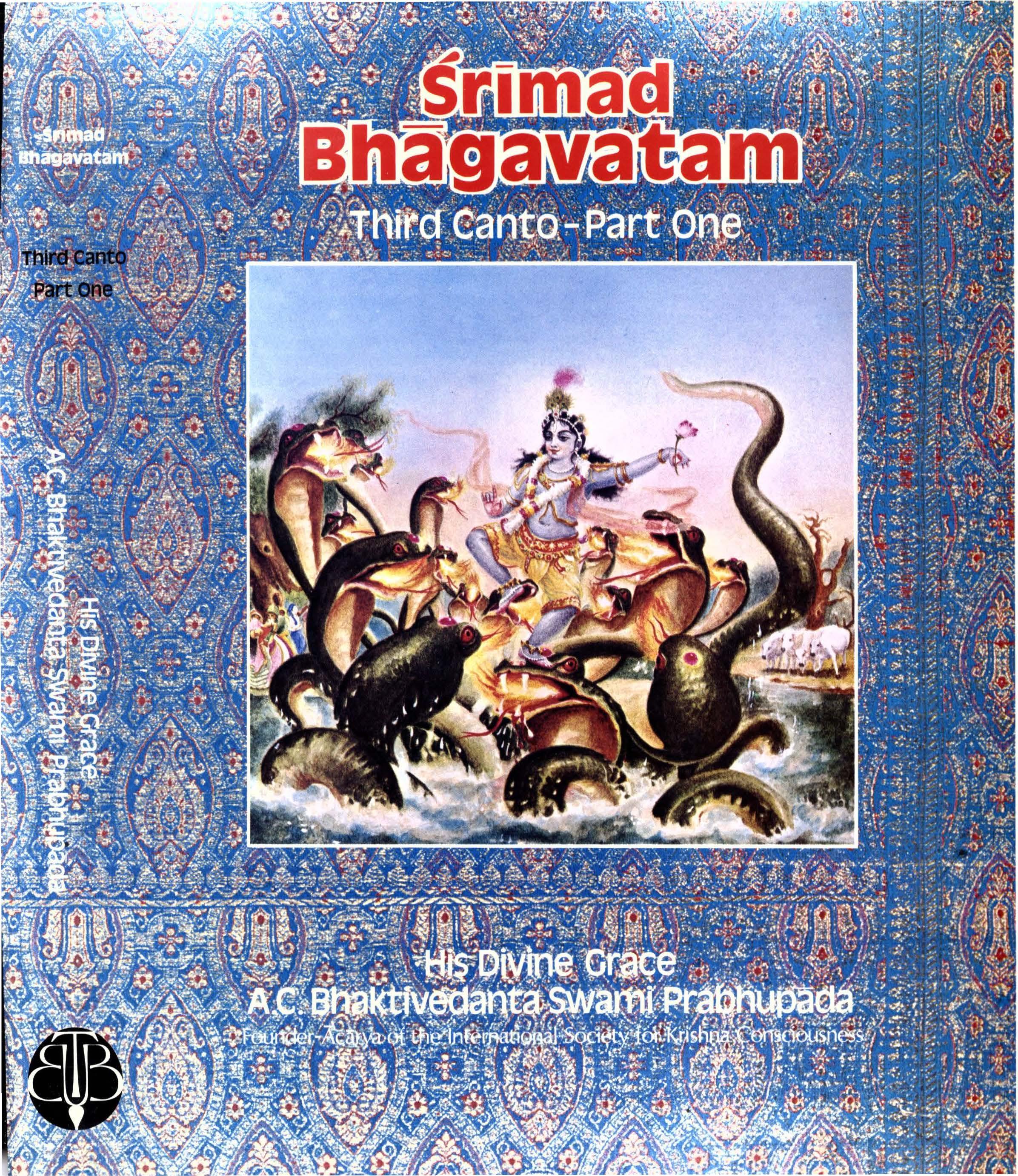
Third Canto
<Part one-Chapters 1-8>

with the original Sanskrit text, its Roman transliteration, word-for-word synonyms, translation and elaborate purports by
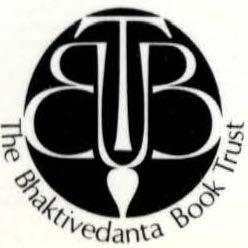
His Divine Grace
A.C. Bhaktivedanta swami Prabhupada
Founder-Acarya of the International Society for Krishna Consciousness
330 pages
7 color illustrations
The science of God is greater than all other sciences, and this spiritual technology is rationally and authoritatively explained in the 18,000 verses of SrTmadBhagavatam, India's sublime contribution of culture, philosophy, politics, sociology, religion and love. His Divine Grace A.C. Bhaktivedanta Swami Prabhupada has undertaken the mighty task of rendering this supremely potent work into the English language in a complete, authoritative and scholarly manner, from the viewpoint of a fully realized spiritual master. Thus in each verse one will find new enlightenment regarding the Absolute Truth, the origin of all emanations. SriinadBhagavatam is an important cultural presentation for the respiritualization of the entire human society.
(continued on back flap)
cover picture: When the many-headed serpent Kaiiya began to poison the River Yamuna, K{�rya, the Supreme Godhead, chastised him and drove him away by dancing on his heads.
back cover: After 100 celestial years of meditation, Lord Brahma, seated on his lotus, was able to behold the transcendental body of the Supreme Lord, who was lying on the waters of devastation.
Srlmad-Bhagavatam, which has never before been presented to the English-speaking world, is now being put forward, at a time when such a work is greatly needed, by one who is uniquely qualified to do so properly. In his purports to the First Canto of the Bhagavatam, His Divine Grace wrote, "There are thousands and thousands of literary men all over the world, and for thousands of years they have created thousands of literary works for the information of people in general. Unfortunately, none of them have brought peace and tranquility on earth, either among men or among nations. This is due to a spiritual vacuum i'n these literatures." Srimad-Bhagavatam was written 5,000 years ago by the great sage Vyasadeva, the author of the famed Bhagavad-gtta, specifically to fill this vacuum with spiritual knowledge of the highest order. His Divine Grace A.C. Bhaktivedanta Swami Prabhupada has undertaken the great task of rendering Srimad-Bhagavatam into English, and therefore thoughtful men throughout the English-speaking world can take advantage of this transcendental knowledge.
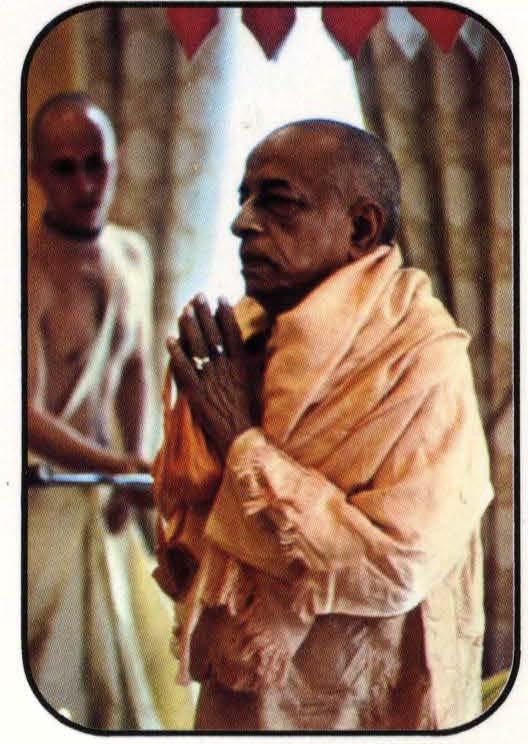
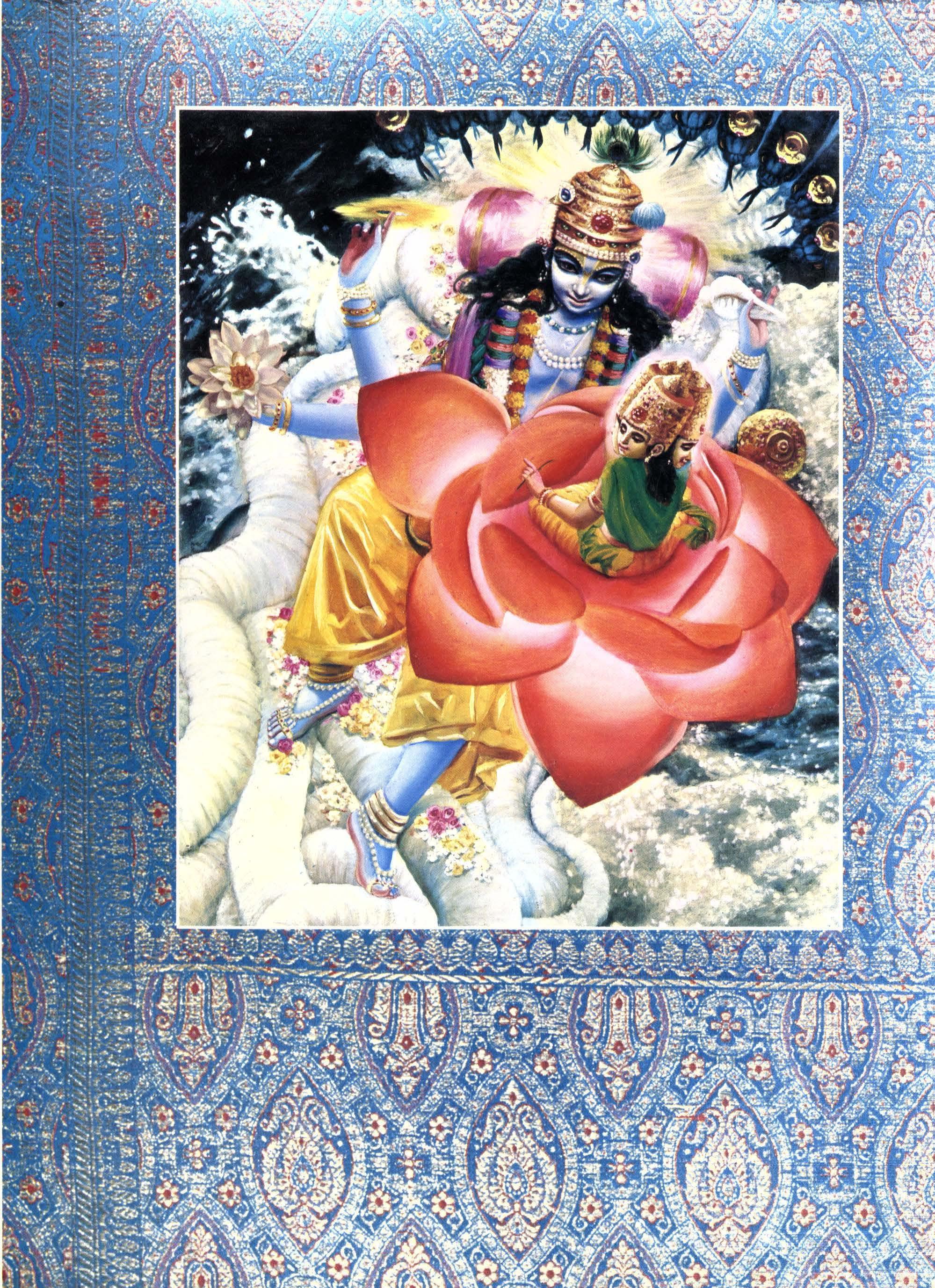
His Divine Grace does not write with any professional motive in mind. Upon the order of his spiritual master, he has taken up this work as a matter of spiritual responsibility and has dedicated his life to spreading the message of Srimad-Bhagavatam. His Divine Grace says, "It is the great need of modern civilization. I am hopeful of its good reception by the thinkers and leaders of society."

(continued
from front flap)
His Divine Grace

A.C. Bhaktivedanta Swami Prabhupada
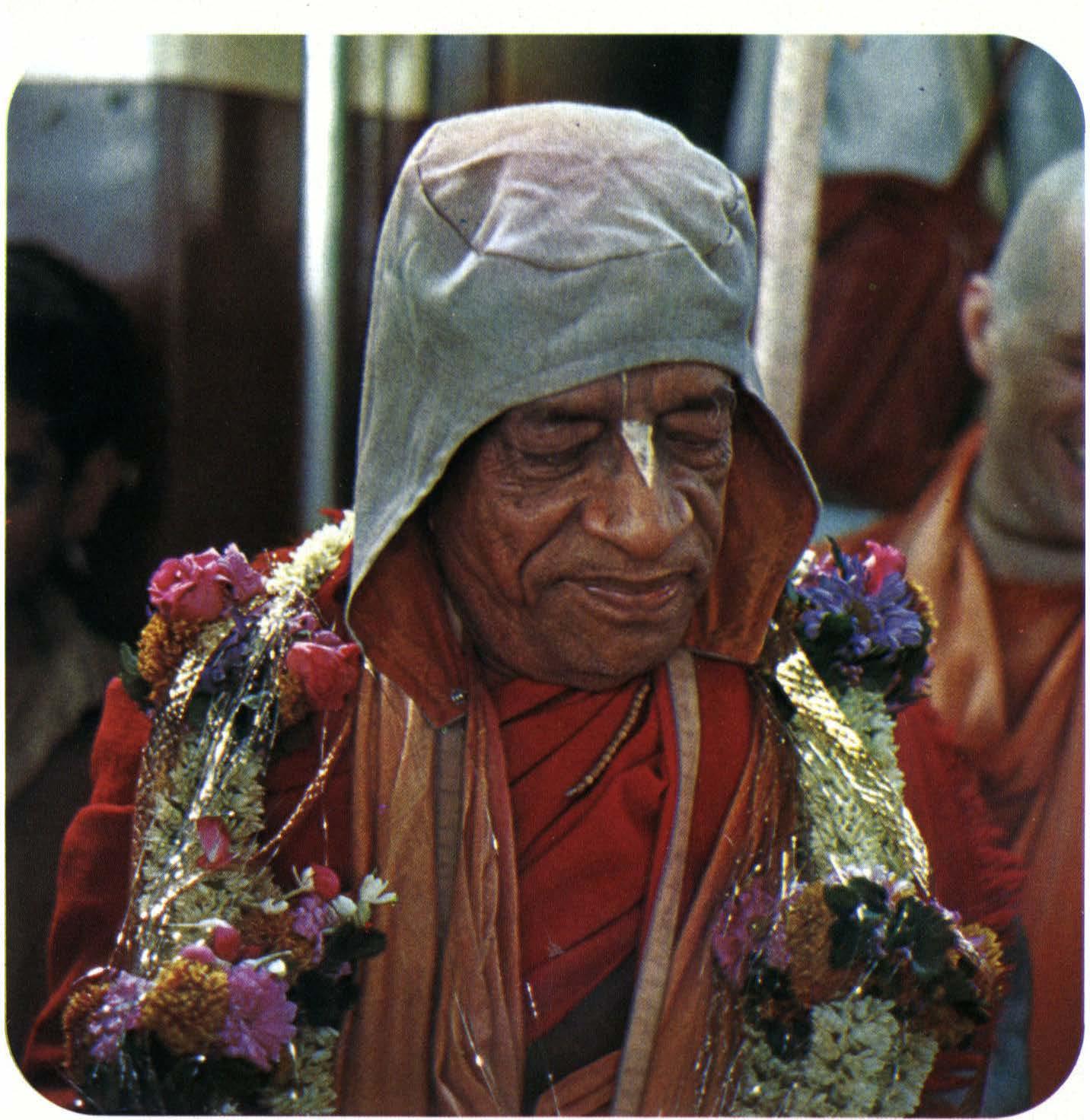
 Plate 1 Vidura placed his bow at the door and quit his brother's palace for good. (p. 15)
Plate 1 Vidura placed his bow at the door and quit his brother's palace for good. (p. 15)
Plate 2 While playing like small children, K.r�l)a and Balarama killed Dhenukasura and the other ass demons. (p. 86)
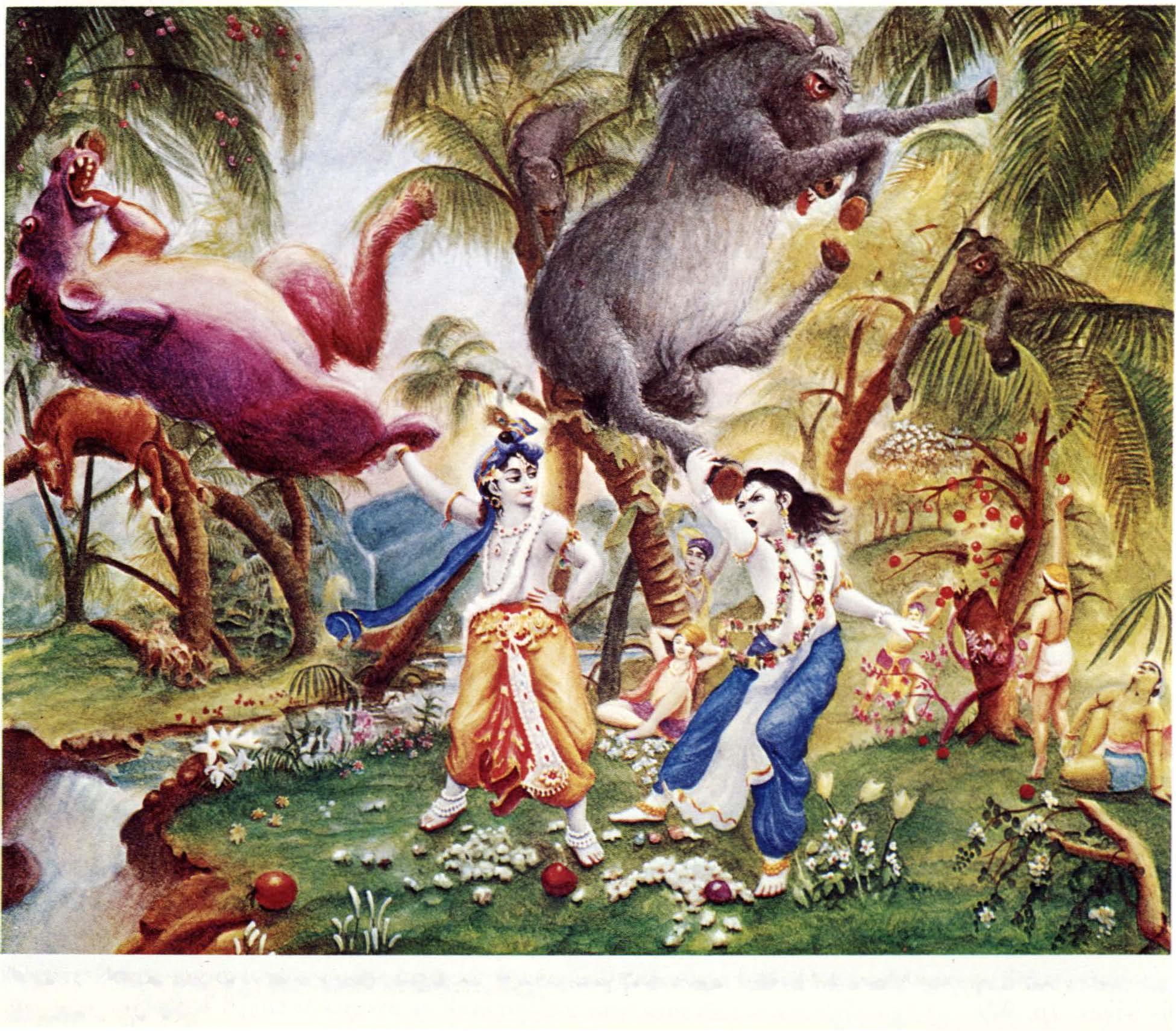
Plate 3

The 16,000 princesses all looked upon Lord K{�l)a with eagerness, joy and shyness and offered to be His wives. (p. 97)

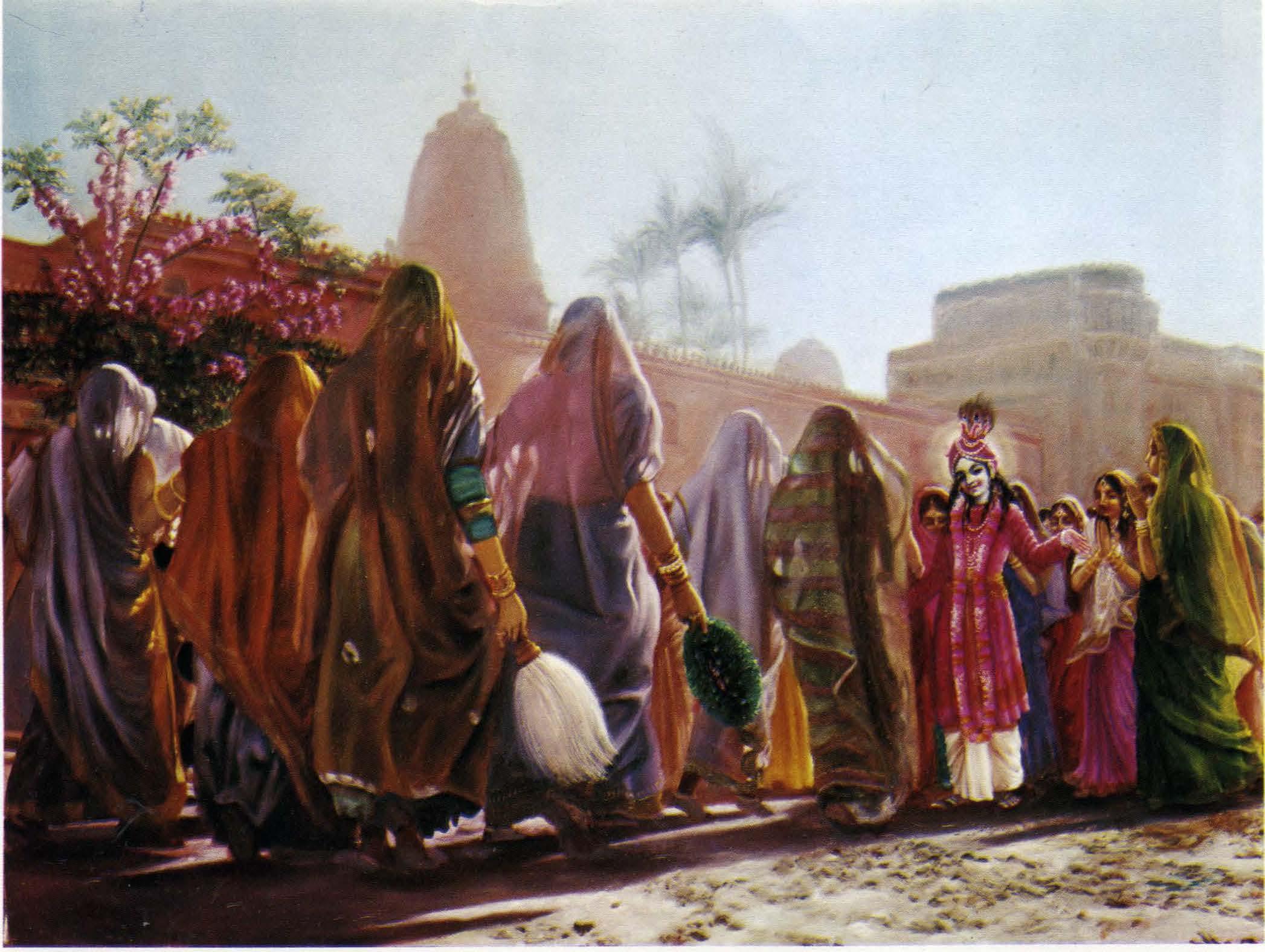
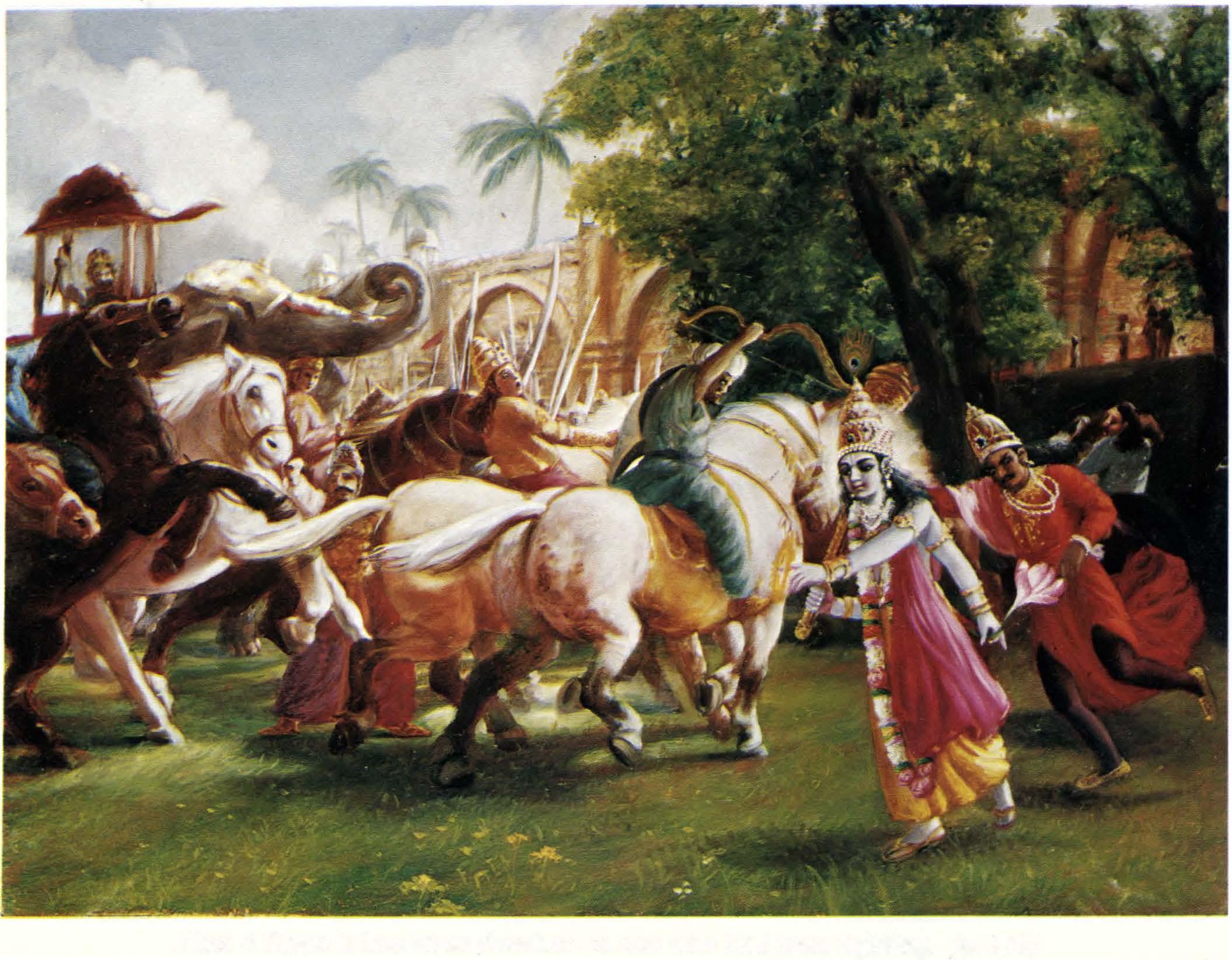 Plate 4 Kr�Q.a is known as Ranchor, or one who fled from fighting. (p. 1 00)
Plate 4 Kr�Q.a is known as Ranchor, or one who fled from fighting. (p. 1 00)
"Because
 Plate 5
Plate 5
of your pure and unflinching devotional service, your visit to Me in this lonely place is a great boon for you." (p. 129)
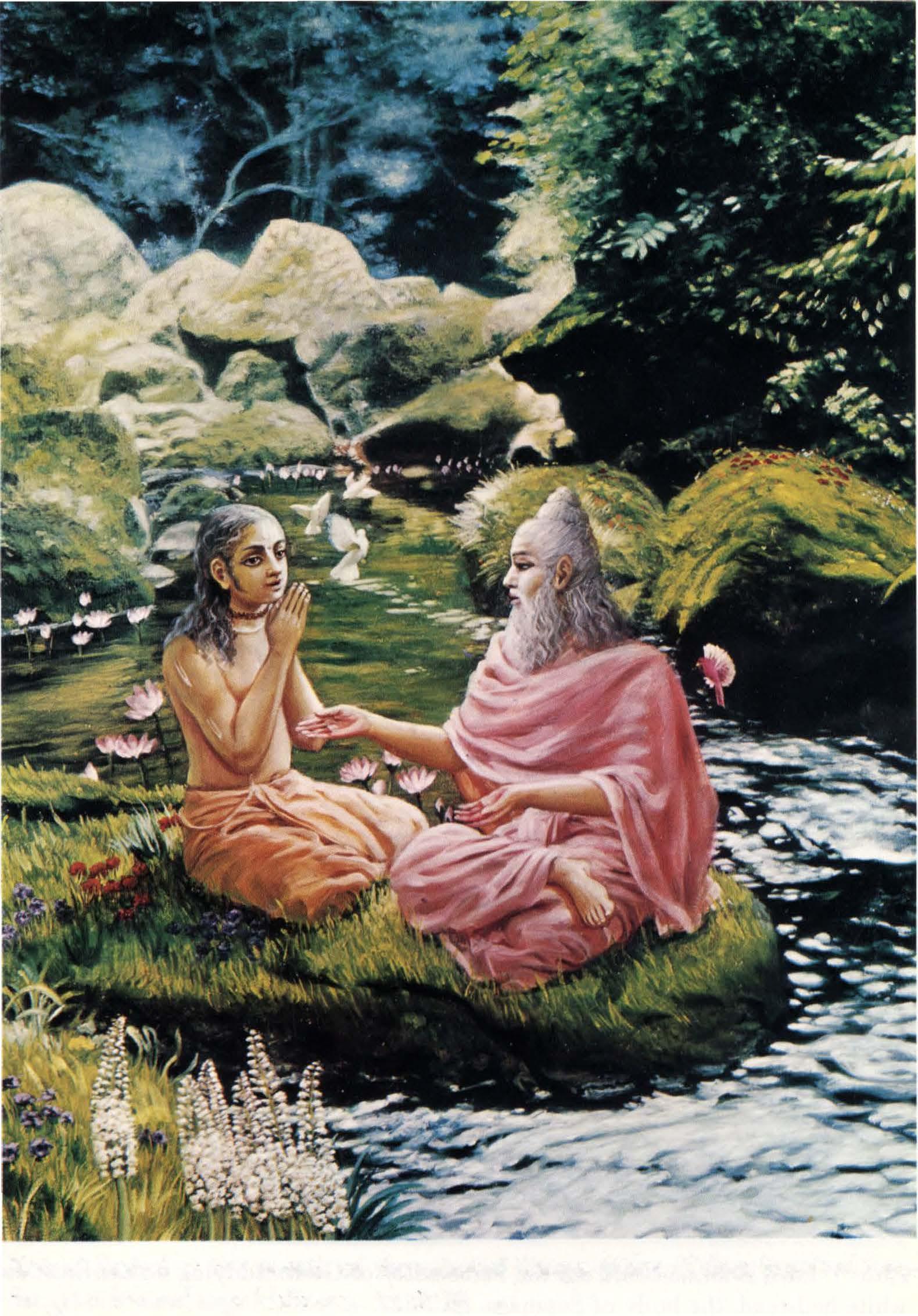 Plate 6 Seated at the mouth of the celestial Ganges River, Vidura inquired from the great learned sage Maitreya. (p. 159)
Plate 6 Seated at the mouth of the celestial Ganges River, Vidura inquired from the great learned sage Maitreya. (p. 159)


 Plate 7 Lord Brahmii could see the Personality of Godhead lying on the lotuslike white bedstead, the body of Se�anii a. (p. 322)
Plate 7 Lord Brahmii could see the Personality of Godhead lying on the lotuslike white bedstead, the body of Se�anii a. (p. 322)
srtmad-Bhagavatam

Srimad·-ahagavatam ·

purhsarh svakamaya viviktamargai
rabhyarcatarh kamahughanghripadmam
pradarsayantarh krpaya nakhendu
mayukhabhinniihgulicatupatram (pg. 324)



ALL GLORY TOSRTGURU ANDGAURANGA
of K�S�A-DVAIPAYANA VYASA � (qEfii'iltt {+tt=tti Ehl'i!;lqle�q"''( 1 sea:�� � �'i'{((4rli'll1Rs:ql�q.,..._ II��II
OTHER BOOKS by His Divine Grace A.C. Bhaktivedanta swami Prabhupada
Bhagavad-g!tii As It Is
Teachings of Lord Caitanya
Kmw, the Supreme Personality of Godhead (2 volumes)
Sri lsopani§ad
Easy Journey to Other Planets
Kr;Srw Consciousness: The Topmost Yoga System
The JVPctar of Devotion
The KtHW Consciousne.�.� Movement is the Genuine Vedic Way
Back to Godhead Maga::illl' (Founder)

Sr•mad-Bhagavatam
Third Canto
"The status auo"
<Part one-Chapters 1-8>

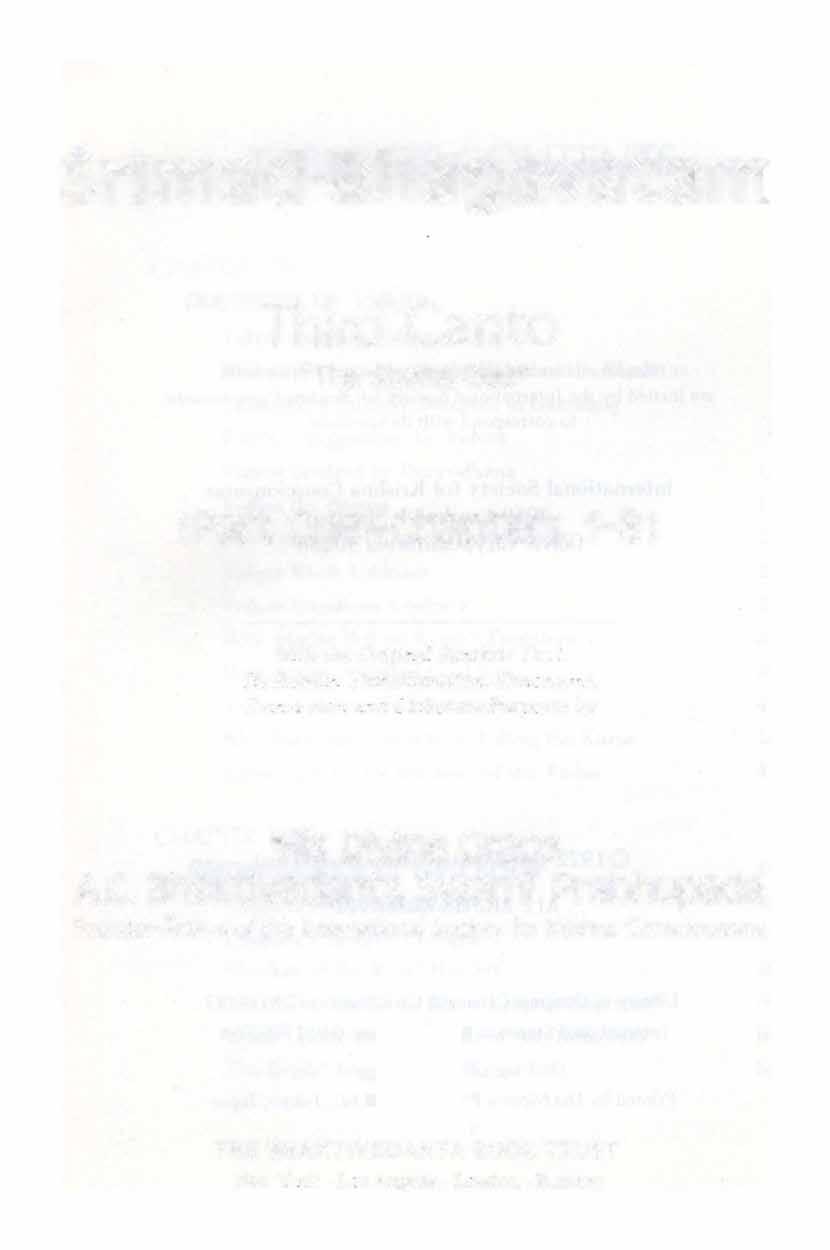
With the Original Sanskrit Text, Its Roman Transliteration, Synonyms, Translation and Elaborate Purports by His Divine Grace
Founder-Acarya of the International Society for Krishna Consciousness
A.C. Bhaktivedanta swami Prabhupada
THE BHAKTIVEDANTA BOOK TRUST New York· Los Angeles· London· Bombay
Readers interested in the subject matter of this book are invited by the international Society for Krishna Consciousness to correspond with its Secretary.
International Society for Krishna Consciousness 3959 Landmark Street
Culver City, California 90230
© 1972 the Bhaktivedanta Book Trust
ALL RIGHTS RESERVED
Library of Congress Catalogue Card Number: 70-127183
International Standard Book Number: 0-912776-37-4 Printed by Dai

Co., Ltd.,
Nippon Printing
Tokyo, Japan
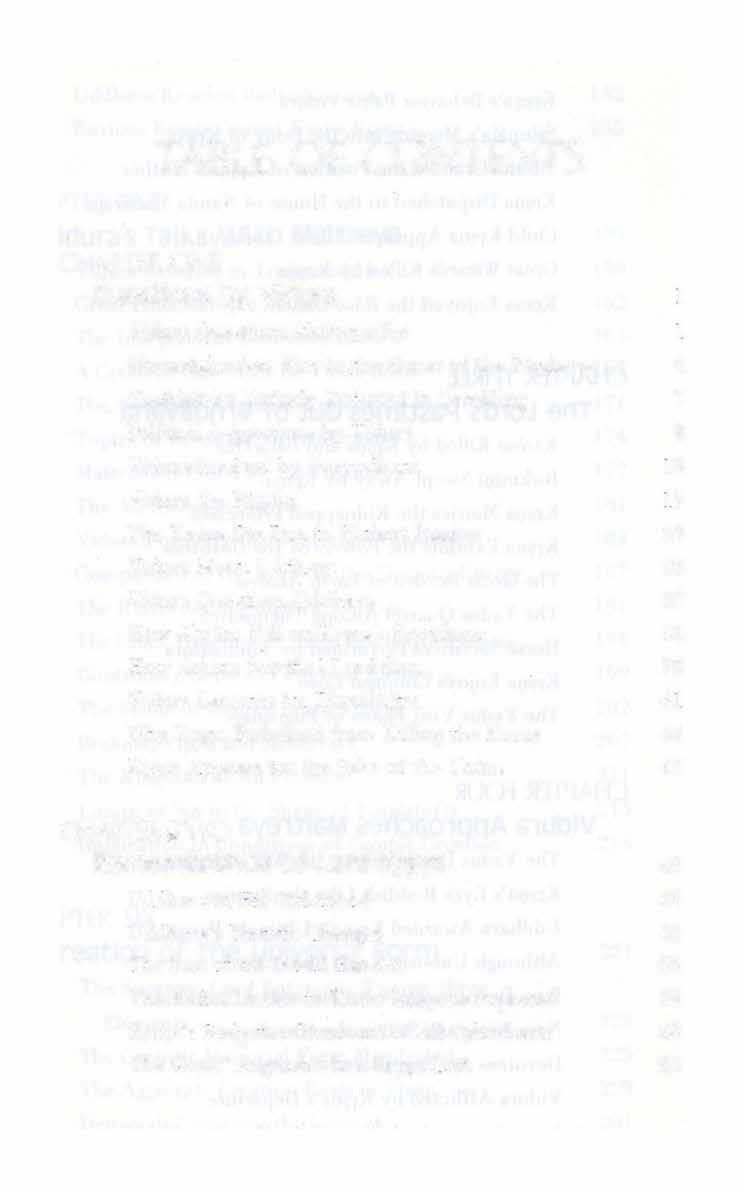
TABLE OF CONTENTS CHAPTER ONE Questions by Vidura 1 Vidura Questions Maitreya J;l�i 1 Dhrtara��ra Sets Fire to �he House of the Pat;u;lavas 5 Yudhi��hira Unfairly Defeated in Gambling 7 Political Suggestions by Vidura 9 Vidura Insulted by Duryodhana 13 Vidura the Pilgrim 19 The Yadus Die Due to Violent Passion 22 Vidura Meets Uddhava 25 Vidura Questions Uddhava 27 How Akrura Fell on Kr�11a's Footsteps 33 How Arjuna Satisfied Lord Siva 38 Vidura Laments for Dhrtara�tra 41 Why Kr�qa Refrained from Killing the Kurus 44 .KJ:�qa Appearsfor the Sake of the Yadus 47 CHAPTER TWO Remembrance of Lord Kf'$Qa 49 Uddhava in His Childhood 50 Uddhava's Ecstatic Changes 53 The Sun of the World Has Set 56 The Yadus Unable to Know Kr�qa as Supreme 59 .KJ;�I)a's Body the Ornament of All Ornaments 63 The Gopis' Anguish when Kr�t:�a Left 65 v
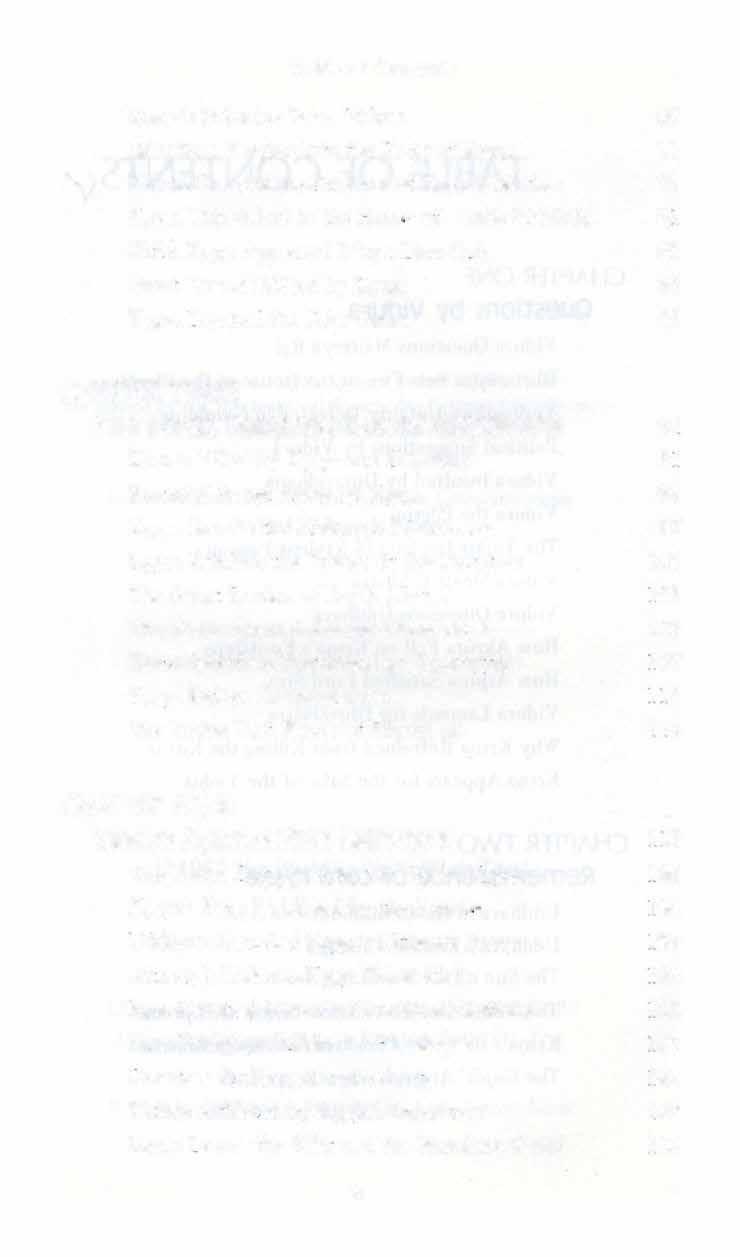



Table of Contents Kr�!)a's Behavior Pains Vidura 69 Sisupala's Merging into the Body of K!·�!)a 72 Putana Granted the Position of Kr�f!a's Mother 78 Kr�11a Dispatched to the Hou e of anda Maharaja 81 Child Kr�f!a Appeared Like a Lion Cub 83 Great Wizards Killed by Kr�Qa 86 K��!)a Enjoyed the Riisa Dance 89 CHAPTER THREE The Lord's Pastimes Out of Vfndavana 91 Kam a Killed by Krsoa and Balariima 91 Rukmioi Swept Away by Krsr.ra 93 Krsoa Marries the Kidnapped Princesses 97 Krsr.�a Exhibits the Powers of His Devotees 100 The Great Burden of Earth Abated 103 The Yadus Quarrel Among Themselves 105 Hor e Sacrifices Performed by Yudhisthira 107 Kr�oa Enjoys Conj ugal Love llO The Yadus Visit Pl.aces of Pilgrimage ll5 CHAPTER FOUR Vldura Approaches Maltreva 119 The Yadus Destroyed by the Will of Kr�r.�a 120 Krsoa 's Eyes Reddish Like the Sunri e 124 Uddhava Awarded Krsr;ta's Ultimate Favor 129 Although Unborn, Krsr;ra Takes Birth 132 Pure Devotees Have No Material Afflictions 135 Nara-Niiriiyaoa Still in the Himalayas 139 Devotees Are Servants of Society 142 Vidura Afflicted by Krsr;ra's Departure 145 Krsr;ra Leave the Vision of the Mundane World 150 VL
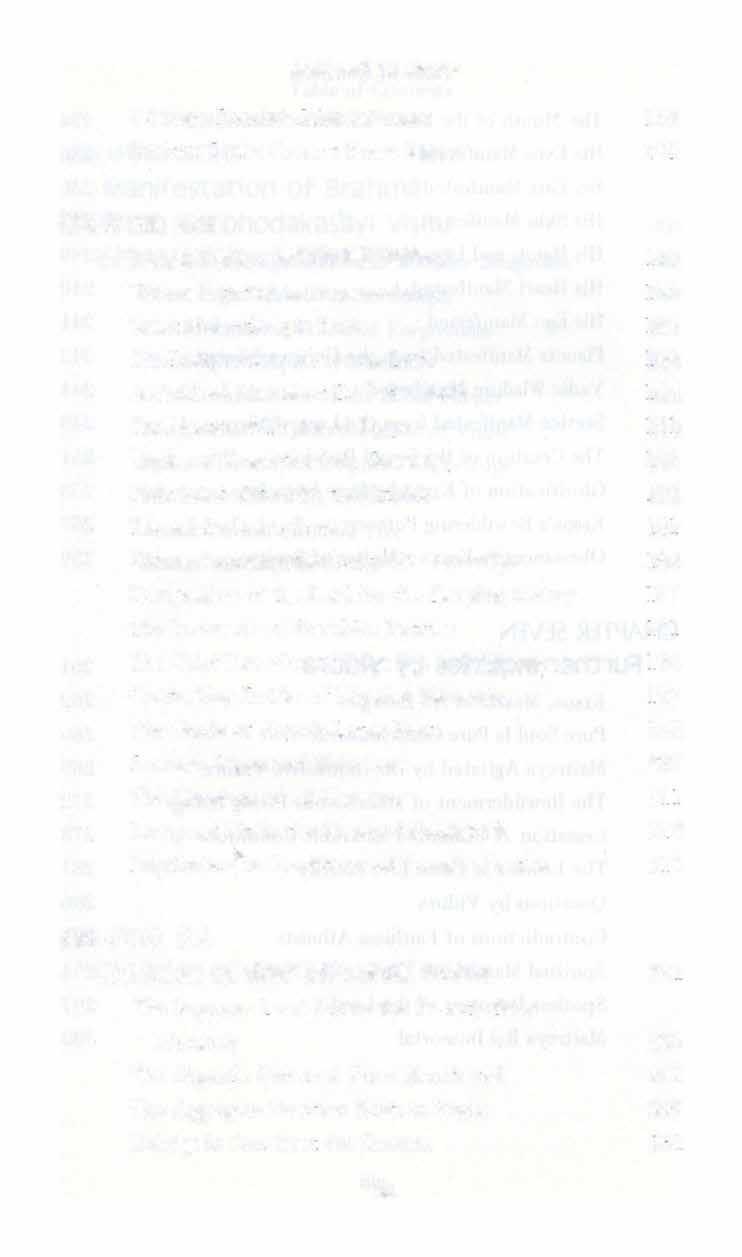


Table of Contents Uddhava Reaches Badarikii'rama 152 Envious Beasts Cannot Know Kr�oa 155 CHAPTER FIVE Vldura's Talks With Maltreva 159 Vidura Satisfied in Transcendence 159 Great Philanthropic Souls 162 The Independent Desireless Lord 164 A Civilized Man Must Be Twice Born 167 The Nectar of Topics of Krsr:ta 171 Topics of Krsoa the Only Remedy 174 Materialists Pitied by the Pitiable 177 The All-Inclusive Service 181 Vidura Formerly the Controller Yamaraja 183 Compassion of the Lord for the Sleeping Energy 187 The Reservoir of Would-Be Entities 191 The Chief Function of False Ego is Godl.essness 194 Controlling Deities of Physical Elements 199 The Shade of Kr�oa's Lotus Feet 202 Brahma, Vi�ou and Mahesvara 207 The Kingdom of All Pleasures 211 Lumps of Sin in the Shape of Foodstuff 215 Implication in Conditions of Cosmic Creation 218 CHAPTER SIX creation of the universal Form 221 The Supreme Lord Enters the Twenty-three Elements The Gigantic Universal Form Manifested The Aggregate Creation Rests in Visou Demigods Construct the Cosmos Vtt 222 225 229 231

Table of Contents The Mouth of the Universal Form Manifested 234 His Eyes Manifested 235 His Ears Manifested 236 His Skin Manifested 237 His Hands and Legs Manifested 239 His Heart Manifested 240 His Ego Manifested 241 Planets Manifested from the Universal Form 242 Vedic Wisdom Manifested 244 Service Manifested from the Legs of VisQu 249 The Creation of the Social Divisions 251 Glorification of Km1a by Pure Speech 253 KrsQa's Bewildering Potency 257 Obeisances to Krg1a a Matter of Sanity 259 CHAPTER SEVEN Further InQuiries bY Vldura 261 KrsQa, Master of All Energies 262 Pure Soul Is Pure Consciousness 266 Maitreya Agitated by the Inquisitive Vidura 269 The Bewilderment of Mischievous Living Beings 272 Cessation of Unlimited Miserable Conditions 278 The Lowest of Fools Live Merrily 281 Questions by Vidura 286 Contradictions of Faithiess Atheists 291 Spiritual Masters are Kind to the Needy 294 Spotless Devotees of the Lord 297 Maitreya l;tsi Immortal 300 VLU

Table of Contents CHAPTER EIGHT Manifestation of Brahma from oarbhodakas'ayi Vi$1JU 303 The Book Bhiigavatam and Devotee Bhiigavata 305 Great Sages Travel Via the Ganges 307 The Brahminical Power of Forgiveness 311 The Subtle Subject of Creation 314 Lord Brahmii Born of the Lotus Flower 316 The Eternal Wheel in the Hand of Visou 319 Brahmii Developed Required Knowledge 321 The Lord Shows His Lotus Feet 324 Visou, the Self-Situa�ed Tree 327 Brahmii Inclined to Create 330 ix
CHAPTER ONE
Questions by Vidura
TEXT l
sri suka uviica evam-etat purii pr�to maitreyo bhagaviin kila k�attrii vanam prav4tena tyaktvii sva-grham rddhimat
sri suka/:t uviica-Sr1 Sukadeva Gosvami said; evam-thus; etat-this; purii-formerly; pr�tal:t-being asked; maitreya/:t- the great sage Maitreya; bhagaviin-His Grace; kila-certainly; k§attrii-by Vidura; vanam-forest; pravi§tena-entering; tyaktvii-renouncing; sva-grham-own house; rddhimat-prosperous.
TRANSLATION
Sukadeva Gosvami said: After renouncing his prosperous home and entering the forest, King Vidura, the great devotee, asked this question of His Grace Maitreya J;l�i:
TEXT2
cn<�*R
yadvii ayam mantra-krd vo bhagaviin akhilesvara/:t pauravendra-grham hitvii pravivesatmasiit krtam

���
�
q.:( �� �·l('lf4\¥4(
�it� W
� Fti� I �
II � II
� 3Pi ¥4?.4iil ���: I
�T
stf€1��11E¥4(11€tl�l'( II � II
l
yat-the house;vai-what else is there to say; ayam-Srl Kr�I}a; mantrakrt-minister; va?l-you people; bhagaviin- the Personality of Godhead; akhila-"isvara?l-the Lord ofeverything;pauravendra-Duryodhana;grhamhouse; hitvii-giving up;pravivesa-entered;iitmasiit-identify with oneself; krtam-so accepted.
TRANSLATION

What else is there to say about the residential house of the PiiQ.c;lavas? Sri Kr�Q.a, the Lord of everything, acted as your minister. He used to enter that house as if it were His own, and He did not take any care of Duryodhana's house.
PURPORT
According to the Gauftya acintya-bhediibheda-tattva hilosophy, anything which satisfies the senses of the Supreme Lord, Sri Kr�Q.a, is also Sri Kr�t:ta. For example, Sri Vrndavana-dhama is nondifferent from Sri Kr�Q.a (tad-dhiima-m:ndavanam) because at Vrndavana the Lord enjoys the transcendental bliss of His internal potency. Similarly, the house of the PiiJ;Jc;lavas was also the source of transcendental bliss for the Lord. It is mentionedherethat the Lordidentified the house with His own Self. Thus the house of the PiiJ;Jc;lavas was as good as Vrndavana, and Vidura should not have given up that place of transcendental bliss. Therefore thereason for his quitting the house was not exactly family misunderstanding; rather, Vidura took the opportunity to meet J;t�i Maitreya and discuss transcendental knowledge. For a saintly person like Vidura, any disturbance due to worldly affairs is insignificant. Such disturbances, however, are sometimes favorable for higher realization, and therefore Vidura took advantage of a family misunderstanding in order to meet Maitreya J;t�i.


2 Srimad-Bhagavatam [Canto 3, Ch. l
TEXT3 �mtcn:a � � a�ttone �: I . � "' �� ({1' � � l((Ui\014 ;:r: 3J+rr II �II riijoviica kutra k§attur bhagavatii maitreyeriisa sangama� kadii vii saha sarhviida etad varcwya na� prabho
riija uvac a- the King said; kutra-wherein; k�attu�-with Vidura; bhagavata-and with His Grace; maitreyer-a-with Maitreya; asa- there was; sangama�- meeting; kada-when; vii-also; saha-with; sariwada�discussion; etat-this; var(laya-describe; na�-unto me; prabho-0 my lord.

TRANSLATION
The King asked Sukadeva Gosvami: Where and when did the meeting and discussion take place between Saint Vidura and His Grace Maitreya Muni? Kindly oblige, my lord, and describe this to us.
PURPORT
Exactly as Saunaka ];l�i inquired of Suta Gosvami and Suta Gosvami replied, so Srila Sukadeva Gosvami replied to King Parik�it's inquiries. The King was very anxious to understand the meaningful discussion that took place betweenthetwo greatsouls.
nahyalparthodayastasya
vidurasyamalatmana� tasminvariyasiprasna� sadhu-vadopabpnhita�
na-never; hi-certainly; alpa-artha-small (unimportant) purpose; udaya�-raised; tasya-his; vidurasya-of Vidura; amala-atmana�-of the saintly man; tasmin-in that; variyasi-highly purposeful; prasna�-question; sadhu-vada-things approved by saints and sages; upabpnhita�-full with.
TRANSLATION
Saint Vidura was a great ·and·pure devotee of the Lord, and therefore his questions to His Grace {{�i Maitreya must have been very purposeful, on the highest level, and approved by learned circles.
PURPORT
Questions and answers among different classes of men have different value . Inquiries by mercantile men in a business exchange cannot be
Text 4)
3
Questions by Vidura
TEXT 4
';{ u��:q(ij� fer�(�lq�q';{: 1
•�{Nf« 31�: �ft�n II \1 II
expected to be highly purposeful in spiritual values. Questions and answers by different classes of men can be guessed by the caliber of the persons concerned. In Bhagavad-gitii, the discussion was between Lord Sri Kn;r:Ja and Arjuna, the Supreme Person and the supreme devotee respectively. The Lord admitted Arjuna to be His devotee and friend (Bg. 4.3), and therefore any sane man can guess that the discussion was on the topic of the bhakti-yoga system. Actually the whole Bhagavad-gitii is based on the principle of bhakti-yoga. There is a difference between karma and karma-yoga. Karma is regulated action for the enjoyment of the fruit by the performer, but karma-yoga is action performed by the devotee for the satisfaction of the Lord. Karma-yoga is based' on bhakti, or pleasing the Lord, whereas karma is based on pleasing the senses of the performer himself. According to Srimad-Bhiigavatam, one is advised to approach a bona fide spiritual master when one is actually inclined to question from an elevated level of spiritual understanding. A common man who has no interest in spiritual values has no need to approach a spiritual master just as a matter of following fashion.
As a student, Maharaja Par'ik�it was serious about learning the science of God, and Sukadeva Gosvam1 was a bona fide spiritual master in the transcendental science. Both of them knew that the topics discussed by Vidura and :jl�i Maitreya were elevated, and thus Maharaja Parik�it was very interested to learn from the bona fide spiritual master.

TEXTS

�
suta uviica

sa evam r�i-varyo 'yam pr�to riijnii parlk�itii pratyiiha tam su-bahuvit pritiitmii sruyatiim iti
sri suta� uviica-Sri Suta Gosvami said; sa�- he; evam-thus; r�i-varya�the great r�i; ayam- Sukadeva Gosvam'i; pr�ta�-being questioned; riijnii
by the King; parik�itii-Maharaja Parik�it; prati aha-replied; tam-unto the King; su-bahuvit-highly experienced; prita-iitmii-fully satisfied; sruyatiim-please hear me; iti-thus.

4 Srimad-Bhagavatam [Canto 3, Ch. 1
��
l('!('l�€44fs� 'lit mrt �OOT I
�� ij'ltN<:stmt �� II� II
TRANSLATION
Sri Siita Gosvami said: The great sage Sukadeva Gosvami was highly experienced and was pleased with the King. Thus being questioned by the King, he said to him, Please hear the topics attentively.
TEXT6

� �qr;;T
� ij � �W11�(11'f{
srisuka uvaca
yada tu raja sva-sutiin asiidhun
pu�r;wn na dharmef!a vina�ta-dr�t*
bhriitur yavi�thasya sutiin vibandhun
pravesya liik�a-bhavane dadiiha
sri suka� uviica-Sr"i Sukadeva Gosvam"i said;yadii-when; tu-but; rajaKing Dhrtara��ra; sva-sutiin-his own sons; asiidhun-dishonest;puHtannourished;na-never; dharme[!a-on the rightpath; vina�ta-dr�t*-one who has lost his insight; bhriitu�-of his brother;yavi�thasya-younger; sutiinsons; vibandhun-having no guardian (father);pravesya-made to enter; liik�ii-lacquer; bhavane-in the house;dadiiha-set on fire.
TRANSLATION
Sri Sukadeva Gosvami said: King Dhrtar�tra became blind under the influence of impious desires to nourish his dishonest sons, and thus he set fire to the lacquer house to burn his fatherless nephews, the Pa�u;Iavas.
PURPORT
Dhrtara��ra was blind from birth, but his blindness in committing impious activities to support his dishonest sons was a greater blindness than his physical lack of eyesight. The physical lack of sight does not bar one from spiritual progress. But when one is blind spiritually, even though physically fit, that blindness is dangerously detrimental to the progressive path of human life.
Text6] Questions by Vidura 5
��
�11�11
� · wwtet�:
Wfl'l � � �
TEXT7 I: ��I

WI�avn•m.1 �: I: ��: i:qil'tlf;r II \9 II

yadiisabhiiyiimkuru-deva-devyiifl kesiibhimarsarh suta-karmagarhyam naviirayiimiisanrpafl snu�iiyiifl
sviistrairharantyiiflkuca-kuhkumiini
yadii-when; sabhiiyiim-the assembly; kuru-deva-devyiifl-of Draupadi, the wife of godly Yudhi��hira; kesa-abhimarsam-insult by grabbing her hair; suta-karma-action takenbyhis son; garhyam-which wasabominable; na-did not; viirayiimiisa-forbidden; nrpafl-the King; snu�iiyiifl-of his daughter-in-law; sviistraifl-by her tears; harantyiifl-of she who was washing; kuca-kuhkumiini-red dust on her breast.


TRANSLATION

The King did not forbid his son Du\J.sasana's abominable action of grabbing the hair of Draupadi, the wife of the godly King Yudhi�thira, even thoughhertears washedthereddustonherbreast.
TEXTS
� �llf � �:
e�ttlcte¥14� ���1 WI��� �
ij1{t �aft
tta:�H1�1=;tl: II �II
dyute tvadharmerJa jitasya siidhofl
satyiivalambasya vanam gatasya
na yiicato ,diit samayena diiyam
tamo-ju�iirto yad ajiita-satrofl
dyute-by means of gambling; tu-but; adharmerJa-by unfair tricks; jitasya-of the vanquished; siidhofl-a saintly person; satya-avalambasyaone who embraced truth as shelter; vanam-forest; gatasya-of the goer; na-never; yiicatafl-when asked for; adiit-delivered; samayena-in due
6
Srimad-Bhagavatam
[Canto 3, Ch. l
course; dayam-right share; tama�-ju�ar w�-overwhelmed by illusion; yatas much as; ajiita-satro�-of one who had no enemy.
TRANSLATION
Yudhi�thira, who was born without any enemy, was unfairly defeated in gambling. But because he had taken the vow of truthfulness, he went off to the forest. When he came back in due course and begged the return of his rightful share of the kingdom, he was refused by Dhrtara�ra, who was overwhelmed by illusion.
PURPORT
Maharaja Yudhi�'hira was the rightful heir to his father's kingdom. But just to favor his own sons, headed by Duryodhana, Dhrtara�'ra, Maharaja Yudhi�'hira's uncle, adopted various unfair means to cheat his nephews of their rightful share of the kingdom. At last the PaQ<;iavas demanded only five villages, one for each of the five brothers, but that was also refused by the usurpers. This incidence led to the War of Kuruk�etra. The Battle of Kuruk�etra, therefore, was induced by the Kurus, and not the Pal)<;iavas.

As k�atriyas, the proper livelihood of the PaQ<;iavas was only to rule, and not to accept any other occupation. A briihma7Ja, k�atriya or vaiSya will not accept employment for his livelihood under ap.y circumstances.
TEXT9
�� �: �
�•l!{g��lf;r
� Pf: I
!I fflA �(11+l'leti�W11f.i mit� �
�et�o���: II �II
yadii ca piirtha-prahita� sabhiiyiim
jagad-gurur yiini jagiida k[§f!U�
na tiini pumsiim amrtiiyaniini
riijoru mene k�ata-pul)-ya-lesa�
yada-when; ca-also; piirtha-prahita�-being advised by Arjuna; sabhiiyiim-in the assembly; jagat-guru�-of the teacher of the world; yiini-those; jagada-went; kr�IJ-a� - Lord Kmta; na-never; tiini-such words; pumsiim-of all men of sense; amrta-ayaniini-as good as nectar;
Text 9] Questions by Vidura 7
raja-the King(Dhrtara�tra or Duryodhana); uru-very important; menedid consider; k�ata-dwindling;pu{lya-lesa�-fragment of pious acts.
TRANSLATION
Lord Kr�t:ta was sent by Arjuna into the assembly as the spiritual master of the whole world, and although His words were heard by some [like Bhi�ma, etc.) as pure nectar, it was not so for the others, who were completely bereft of the last farthing of past pious works. The King ( Dhrtar�tra or Duryodhana] did not take the words of Lord Kr�t:ta very seriously.
PURPORT
Lord Kr�t:ta, who is the spiritual master of the entire universe, accepted the duty of a messenger, and, deputed by Arjuna, went to the assembly of .1\ing Dh�tara�tra on a peace mission. Kr!!Da is everyone's Lord, yet because He was the transcendental friend of Arjuna, He gladly accepted the role of messenger, exactly like an ordinary friend. That is the beauty of the Lord's behavior with His pure devotees. He reached the assembly and spoke about peace, and the message was relished by Bhit�ma and other great leaders because it was spoken by the Lord Himself. But due to the exhaustion of the pious results of their past deeds, Duryodhana, or his father, Dhrtara�tra, did not take the message very seriously. That is the way of persons who have no credit of pious deeds. By past pious deeds, one may become the king of a country, but because the results of the pious acts of Duryodhana and company were dwindling, it became evident from their actions that they were sure to lose the kingdom to the Pai)Qavas. The message of Godhead is always like nectar to the devotees, but it is just the opposite to the nondevotees. Sugar �andy is always sweet to a healthy man, but it tastes very bitter to persons suffering from jaundice.
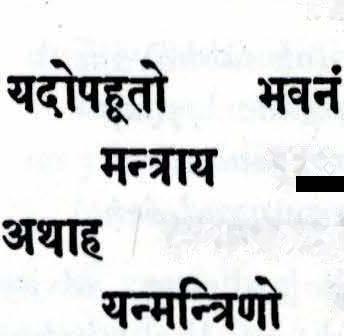
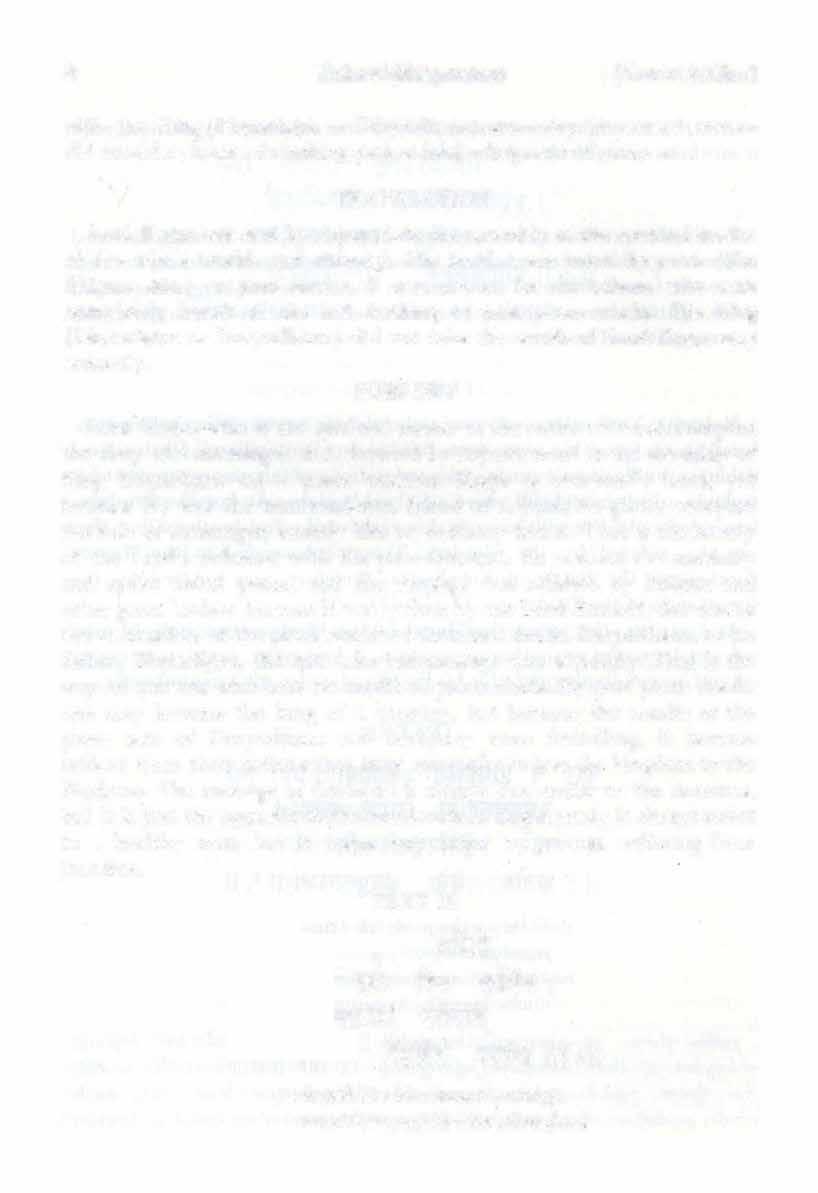
8 Srimad-Bhagavatam [Canto 3, Ch. I
TEXT 10 � 'l!: f.li� t�i� I ijfl{�t�i CIU�Ii �� � Jl�oll yadopahii.to bhavanam pravi�to mantraya pr�ta� kila pii.rvajena
athaha tan mantra-drsam var"iyan yan mantril}o vaidurikam vadanti
yada-when; upahiitafi, -wascalledby; bhavanam-the palace; prav4tafi-entered; mantraya-for consultation; pntafi--asked by; kila_:_of course; piirvajena-by the elder brother; atha-thus; aha-said; tat-that; mantraadvice; drsam-jus t suitable; variyan-excellent; yat-that which; ma ntril}a[l -the ministers of state, or expert politicians; vaidurikaminstructions by Vidura; vadanti-do they say.

TRANSLATION
When Vidura was invited by his elder brother [Dhrtarii�ra) for consultation, he entered the house and gave instructions which were exactly to the point. His advice is well-known, and instructions by Vidura are approved by expert ministers of state.
PURPORT
Political suggestions by Vidura are known as expert, just as, in modern times, Pat;t<).it Cat;takya is considered the authority in good counsel both in political and moral instructions.
TEXT 11 am�: S1Rf��0
a]ata-satrofi, pratiyaccha dayam titik�ato durv4aharh tavagafi, sahanujo yatra vrkodarahifi, svasan ru�a yat tvam alam bibhe�i
a]ata-satrofi,-of Yudhi�thira, who has no enemy; pratiyaccha-retur n; dayam-legitimate share; titikfiatafi,-of him who is so forebearing; durvi�aham- unbearable; tava- your; aga��offense; saha-along with; anujafi,-younger brothers; yatra- wherein; vrkodara- Bhima; ahifi,- revenging snake; svasan-breathing heavily;. ru�a - in anger; yat- whom; tvamyou; alam-verily; bibhe�i-do fear.
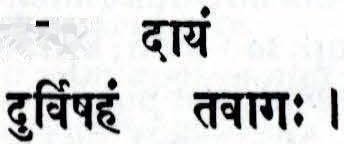
Text 11)
Questions by Vidura
9
�� �) � t�G\(1�: � � �� �������
TRANSLATION
[Vidura said: J You must now return the legitimate share to Yudhi�thira, who has no enemies and who has been forebearing through untold sufferings d�e to your offenses. He is waiting with his younger brothers, among whom is the revengeful Bhima, breathing heavily like a snake. Surely you are afraid of him.
TEXT 12


partharits tu devo bhagavan mukundo grhitavan sa-k�iti-deva-deval;l aste sva-puryiirit yadu-deva-devo vinirjitiise�a-nrdeva-deva�
piirthan-the sons of Prtha (Kuntl); tu-but; devaft - Lord; bhagavanthe Personality of Godhead; mukundaft-Sri Kr�J:Ja,who awardsliberation; grhltavan.:..has taken up; sa-with; k�iti-deva-devaft-the brahma�as and the demigods; aste-is present; sva-puryam - along with His family; yadu-devadevaft-worshiped by the royal order of the Yadu dynasty; vinirjitaconquered by; ase�a-unlimited ; nrdeva-kings; deval;l- Lord.
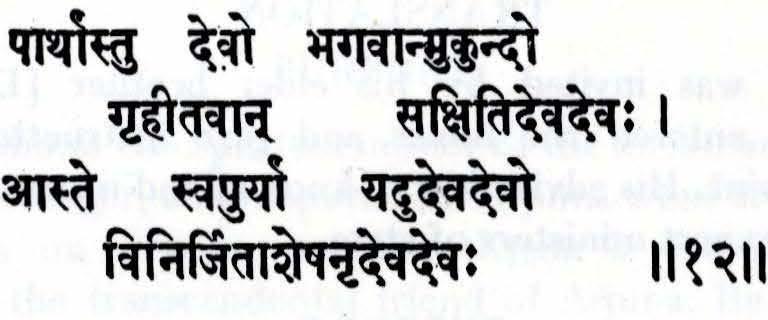
TRANSLATION
Lord Kr��a, the P�rsonaijty of Godhead, has accepted the sons of Prtha as His kinsmen, and all the kings of the world are with Lord Sri Kr��a. He is present in His home with all His family members, the kings and princes of the Yadu dynasty, who have conquered an unlimited number of rulers, and He is their Lord.
PURPORT
Vidura gave Dhrtara�tra very good counsel regarding political alliance with the sons of Prtha, the Pa�uJ,avas. The first thing he said was that Lord Kr�T)a was intimately related with them as their cousin. Because Lord Kmta is the Supreme Personality of Godhead, He is worshipable by all
10 Srimad-Bhligavatam [Canto 3, Ch. I
brahma!laS and demigods, who are the controllers. of the universal affairs. Besides that, Lord Krf�Qa and His family members, the royal order of the Yadu dynasty, were the conquerers of all kings of the world.
The k�atriyas used to fight the kings of various dominions and kidnap their beautiful princess-daughters, after conquering their relatives. This system was laudable because the k�atriyas .and the princesses would be married only on the basis of the chivalry of the conquering k�atriya. All the young princes of the Yadu dynasty married the daughters of other kings in this way, by chivalrous force, and thus they were conquerors of all the kings of the world. Vidura wanted to impress uponhis elder brother that fighting with the Pary<.favas was fraught with many dangers because they were supported by Lord Krf�Qa, who had conquered, even in His childhood, demons like Kamsa and Jarasandha and demigods like Brahma and lndra. Therefore all universal power was behind the Pary<.favas.
TEXT 13


sa €§a do�a� puru§a-dvir) aste

grhan pravi�to yam apatya-matya
pu§rzasi kr�ryad vimukho gata-sris
tyafiisvasaivam kula-kausalaya
sa�- he; e�a�-this; do�a�-offense personified; pum�a-dvi t-envious of Lord Krflf!a; aste-exists; grhan-household; pravi§ta�- entered; yamwhom; apatya-matya-thinking to be your son; pu§rzasi-maintaining; kr�!lat-from Kr�f)a; vimukha�-in opposition; gata-sr�-devoid of everything auspicious; tyaja-give up; asu-as soon as possible; asaivaminauipicious; kula-family; kausawya�for the sake of.
TRANSLATION
You are maintaining offense personified, Duryodhana, as your infallible son, but he is envious of Lord Knl}a. And because you are thus maintaining a nondevotee of Kr�l}a, you are devoid of all auspicious qualities. Relieve yourself of this ill fortune as soon as possible and do good to the whole family!
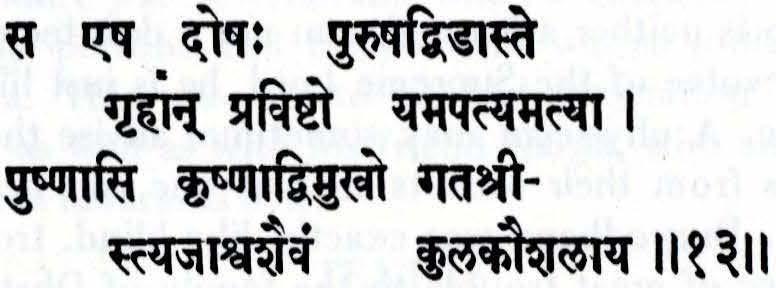
Text 13) Questions by
ll
Vidura
PURPORT
A good son is called apatya, one who does not allow his father to fall down. The son can protect the father's soul when the father is dead by offering sacrifices to please the Supreme Lord, Vi�p.u. This system is still prevalent in India. After the death of his father, a son goes to offer sacrifices at the lotus feet of Vi�p.u at Gaya and thus delivers the father's soul if the father is fallen. But if the son is already an enemy of Vi�p.u, how, in such an inimical mood, can he offer sacrifice unto Lord Vi�p.u's lotus feet?
Lord J:<r�rya is directly the Personality of Godhead, Vi�p.u, and Duryodhana was inimical to Him. He would therefore be unable to protect his father, Dhrtara�tra, after his death. He himself was to fall down because of his faithlessness towards Vi�p.u. How, then, could he protect his father?
Vidura advised Dhrtara�tra to get rid of such an unworthy son as Duryodhana as soon as possible if he was at all anxious to see to the good of his family.
According to the moral instructions of Cap.akya Pap.�it, "What is the use of a son who is neither a learned man nor a devotee of the Lord?" If a son is not a devotee of the Supreme Lord, he is just like blind eyes-a source of trouble. A physician may sometimes advise the extrication of such useless eyes from their sockets so that one can be relieved of the constant trouble. Duryodhana was exactly like blind, troubling eyes; he would be a source of great trouble to the family of Dhrtara�tra, as foreseen by Vidura. Vidura therefore rightly advised his eldest brother to get rid of this source of trouble. Dhrtara�tra was wrongly maintaining such .personified offense under the mistaken impression that Duryodhana was a good son, able to liberate his father.

12 Srimad-Bhagavatam [Canto 3, Ch_ 1
14 �cti�st � 5(�q�$�� SIQ(it:t: Q�\i(Uftq�C?;: � �l��'ISWC IIt�II ityuciviirhs tatra suyodhanena pravrddha-kopa-sphuritadharerta asatkrta� sat-spfhartiya-sua� k�atta sa-karrtlinuja-saubalena
TEXT
iti-thus; ucivan-while speaking; tatra-there; suyodhanena-by Duryodhana; pravrddha-swollen with; kopa-anger; sphurita-flapping; adhare('ta-lips; asatkrtaft-insulted; sat-respectable; sprha('ti:ya-illafl-desirabJe qualities; k�attii-Vidura; sa-with; kar(la-Karna; anuja-younger brothers; saubalena-with Sakuni.
TRANSLATION
While speaking thus, Vidura, whose personal character was esteemed by respectable persons, was insulted by Duryodhana, who was swollen with anger and whose lips were trembling. Duryodhana was in company with Kar!la, his younger brothers and his maternal uncle Sakuni.
PURPORT
It is said that giving good counsel to a foolish person causes the fool to become angry, just as feeding milk to a snake only increases its venomous poison. Saint Vidura was so honorable that his character was looked up to by all respectable persons. But Duryodhana was so foolish that he dared to insult Vidura. This was due to his bad association with Sakuni, his maternal uncle, as well as with his friend Kar!la, who always encouraged1 Duryodhana in his nefarious acts.
TEXT 15 iti

*<'t+lsOqM&:c �
�: wt�� �:1
�srm: � w
fir�l�<{c1t'u'ij �m;t: II��II
ka enam atropajuhava jihmarh
dasyafl sutarh yad-balinaiva pu�tafl
tasmin pratipatt parakrtya aste
nirvasyatam asu purac chvasanafl
ka!t-who; enam-this; atra-here; upajuhava-called for; jihmamcrooked; dasya�-of a kept mistress; sutam-son; yat-whose; balinaivaby whose subsistence; pu�tafl-grown up; tasmin-unto him; prati:paflenmity; parakrtya-enemy's interest; iiste-situated; nirvasyatam-get him out; iisu-immediately; purat-from the palace; svasanafl-Jet him breathe only.
Text 15) Questions
13
by Vidura
TRANSLATION
Who asked him to come here, this son of a kept mistress? He is so crooked that he spies in the interest of the enemy against those on whose support he has grown up. Toss him out of the palace immediately and leave him with only his breath.
PURPORT
When getting married, the k�atriya kings would take on several other youthful girls along withthe married princess. These girl attendants of the king were known as diisis, or attendant mistresses. By intimateassociation with the king, the diisis would get sons. Such sons were called diisi-putras. They had no claim to a royal position, but they would get maintenance and other facilities just like princes. Vidura was the son of such a diisi, and he was thus not counted amongst the k�atriyas. King Dhrtara�tra was very affectionate toward his younger diisi-putra brother, Vidura, and Vidura was a great friend and philosophical advisor to Dhrtara�tra. Duryodhana knew very well that Vidura was a great soul and well-wisher, but unfortunately he used strong words to hurt his innocent uncle. Duryodhana not only attacked Vidura's birth, but he also called him an infidel because he seemed to support the cause ofYudhi�thira, whom Dui:yodhana consid· ered his enemy. He desired that Vidura be immediately put out of the palace and deprived of all his possessions. If possible, he would have liked him caned until he· was left with nothing but his breath. He charged that Vidura was a spy ofthe Pap4avas because he advised King Dhrtara�tra in their favor. Such is,.the situation of palace life and the intricacies of diplomacy that even a faultless person like Vidura could be charged with something abominable and punished. Vidura was struck with wonder at such unexpected behavior from his nephew Duryodhana, and before anything actually happened, he decided to leave the palace for good.
svayam dhanur dviiri nidhii_ya miiyiim bhriitul;. puro marmasu tii{lito'pi


sa ittham aty ulbar-a-kan;w-biirwir gata-vyatho'yiid uru miinayiinal;.


14 Srimad-Bhagavatam [Canto 3, Ch. 1
\"G�lft � �
� � mRalsfif I � ��-�tl<:t���t� �lilliR: ������
TEXT 16 �
·lif�"ij:
svayam-he himself; dhanu� dviiri-bow on the door; nidhiiya-keeping; miiyiim-the external nature; bhriitu�-brother's; pura�-from the palace; marmasu-in the core of the heart; tii{1ita�-beingafflicted; api-in spite of; sa�-he (Vidura); ittham-like this; ati ul ba ra-severely; kar ra-ear; barai�-by the arrows; gata-vyatha�-without being sorry; ayat- excited ; uru-great; miinayiina�-so thinking.

TRANSLATION
Thus being pierced by arrows through his ears and afflicted to the core of his heart, Vidura placed his bow on the door and quit his brother's palace. He was not sorry, for he considered the acts of the external energy to be supreme.
PURPORT
A pure devotee of the Lord is never perturbed by an awkward position created by the external energy of the Lord. In Bhagavad-gitii it is stated:
prakrte� kriyamii!liini gu!lai� karmii!li sarvasa� ahankiira-vimii!lhiitmii kartiiham iti manyate.
(Bg. 3.27)
A conditioned soul is absorbed in material existence under the influence of different modes of external energy. Absorbed in the false ego, he thinks that he is doing everything by himself. The external energy of the Lord, the material nature, is fully,.under the control of the Supreme Lord, and the conditioned soul is fully under the grip of the external energy. Therefore, the conditioned soul is fully under the control of the law of the Lord. But, due to illusion only, he thinks himself independent in his activities. Duryodhana was acting under such influence of the external nature, by which he would be vanquished at the ultimate end. He could not accept the sound advice of Vidura, but on the contrary he insulted that great soul, who was the well-wisher of his whole family. Vidura could understand this because he was a pure devotee of the Lord. In spite of being very strongly insulted by Duryodhana's words, Vidura could see that Duryodhana, under the influence of miiyii, the external energy, was making progress on the path toward his own ruination. He therefore considered the acts of the external energy to be supreme, yet he also saw how the internal energy of the Lord helped him in that particular situation. A devotee is always in a renounced temperament because the worldly attractions can never satisfy him. Vidura was never attracted by the royal palace of his brother. He was always ready to leave the place and devote himself completely to the transcendental loving service of the Lord. Now

Text.l6] Questions
15
by Vidura
he got the opportunity by the grace of Duryodhana, and instead of being sorry at the strong words of insult, he thanked him from within because it gave him the chance to live alone in a holy place and fully engage in the devotional service of the Lord. The word gata-vyatha� (without being sorry) is significant here because Vidura was relieved from the tribulations which trouble every man entangled in material activities. He therefore thought that there was no need to defend his brother with his bow because his brother was meant for ruination. Thus he left the palace before Duryodhana could act. Miiya, the supreme energy ofthe Lord, acted here both internally and externally.
TEXT 17

6 f;rti(l:
31"'414i'ic:�f*4i}q�oql
�ffl
sa nirgata� kaurava-pu[!ya-labdho gajahvayat tirtha-pada� padiini anvakramat pul)ya-cikir�ayorvyarft adhi�thito yani sahasra-murt*
sa�-hc (Vidura); nirgata�- after having quit; kaurava-the Kuru dynasty; pu[!ya- piety; labdha�-so achieved; gaja-ahvayat- from Hastinapura; tirtha-pada�-of the Supreme Lord; padani-pilgrimages; anvakramat-took shelter; pul)ya- piety; cikir�aya-desiring so; urvy iim-of high grade; adh�thita�-situated; yani- all those; sahasra-thousands; murt*-forms.
TRANSLATION
By his piety, Vidura achieved the advantages of the pious Kauravas. After leaving Hastinapura, he took shelter of many places of pilgrimages, which are the Lord's lotus feet. With a desire to gain a high order of pious life, he traveled to holy places where thousands of transcendental forms of the Lord are situated.
PURPORT
Vidura was undoubtedly a highly elevated and pious soul, otherwise he would not have taken his birth in the Kaurava family. To have high parentage, to possess wealth, to be highly learned and to have great personal beauty are all due to past pious acts. But such pious possessions are not
16 Srimad-Bhagavatam [Canto 3, Ch. 1
..a(�flttd,1if �: �·
� ij((i('{Rt: "�""
sufficient for obtaining the grace of the Lord and being engaged in His transcendental loving service. Vidura considered himself less pious, and therefore he decided to travel to all the great places of pilgrimage in the world in order to achieve greater piety and advance nearer to the Lord. At that time, Lord Kpjl)a was personally present in the world, and Vidura could at once approach Him directly, but he did not do so because he was not sufficiently freed from sin. One cannot be one hundred percent devoted to the Lord unless and until he is completely free from all effects of sin. Vidura was conscious that by the association of the diplomatic Dhrtara�tra and Duryodhanahe had lost his pietyand was therefore not fit to associate at once with the Lord. In Bhagavad-gita this is confirmed in the following verse:
ye�iirh tvanta-gatam piipam jananam purtya-karmar-am
te dvandva-moha-nirmuktii bhajante miim dnlha-vratii� (Bg.7.28)

Persons whoare sinful asuras like Kamsa and .T arasandha cannotthink of Lord Kr�l)a as the Supreme Personality of Godhead, the Absolute Truth. Only those who are pure devotees, those who follow the regulative principles of religiouslife as prescribed in the scriptures,are able to engagethemselves in karma-yoga and then Fiiina-yoga and thereafter, by pure meditation, can understand pure consciousness. When God consciousness is developed, one can take advantage of the association of pure devotees. Syiin mahat-sevayii viprii� purya-tirtha: one is able to associate with the Lord even during the existenceof this life.
Places of pilgrimages are meant for eradicating the sins of the pilgrims, and they are distributed all over the universejust to give facility to all concerned for attaining pure existence and God realization. One should not be satisfied, however, merely by visiting the places of pilgrimage and performing one's prescribed duties; he should be eager to meet the great souls who are already there, engaged in the service of the Lord. In each and every place of pilgrimage, the Lord is present in His various transcendental forms.
These forms are called arca-murtis, or forms of the Lord which can be easily appreciated by the common man. The Lord is transcendental to our mundane senses. He cannot be seen with our present eyes, nor can He be heard with our present ears. To the degree that we have entered into the service of the Lord or to the proportion to which our lives are freed from sins, we can perceive the Lord. But even though we are not free from sins, the Lord is kind enough to allow us the facility of seeing Him in His arca-murtis in the temple. The Lord is all powerful, and there-
Text 17) Questions by Vidura 17
fore He is able to accept our service by presentation of His area form. No one, therefore, should foolishly think tl)e area in the temple to be an idol. Such an area-murti is not an idol but the Lord Himself, and to the proportion to which one is free from sins, he is able to know the significance of the area-murti. The guidance of a pure devotee is therefore always required.

In the land of Bharatavar�a there are many hundreds and thousands of places of pilgrimage distributed all over the country, and by traditional practice the common man visits such holy places during all seasons of the year. Some of the area representations of the Lord situated in different places of pilgrimage are mentioned herewith. The Lord is present at Mathurii (the birthplace of Lord Km1a) as Adi-Kesava; the Lord is present at Puri (Orissa) as Lord Jagannatha (also known as Puru�ottama); He is present at Allahabad (Prayag) as Bindu-Madhava; at Mandara Hill he is present as Madhusiidana. In the Anandaral'}ya, He is known as Vasudeva, Padmanabha and Janiirdana; at Vi�J}ukiinci, He is known as Vi�QU; and at Mayaura, He is known as Hari. There are millions and billions of such area forms of the Lord distributed all over the universe. All these area-murtis are summarized in the Caitanya-earitamrta in the following words:
sarvatra prakiisa tiinhiira bhakte sukhodite jagatera adharma niisi dharma sthapite
"The Lord has so distributed Himself all over the universe just to give pleasure to the devotees, to give the common man facility to eradicate his sins, and to establish religious principles in the world."
TEXT 18
pure�u purtyopavaniidri-kunje�v apanka-toye�u sarit-sara/;lsu ananta-lingai/;l samalankrte�u eaeiira t"irthiiyatane�v ananya/;l

18 Srimad-Bhagavatam [Canto 3, Ch. 1
���
1 ��: e�e�tij!
� ��lqiii•ufWj-
eRa1<:�
�n�:�a��: 11 �<:II
pure�u-holy places like Ayodhya, Dvaraka, Mathura, etc.; puf!yapiety; upavana-the air;adri-hill;kunje�u- in theorchards;apanka-with· out sin; toye�u-in the water; sarit-river; sara�s u-lakes; ananta-linga*the forms of the unlimited; s amalankrte�u-being so decorated; eaeiiraexecuted; tirtha-places of pilgrimage; ayatane�u-holy land; ananya�aloneorseeing Kr�rya alone.

TRANSLATION
He began to travel along, thinking only of Kr�Qa, through various holy places like Ayodhya, Dvaraka and Mathura. He traveled where the air, hill, orchard, river and lake are all pure and sinless and where the forms of the Unlimited decorate the temples. Thus he performed the pilgrim's progress.
PURPORT
These area forms of the Lord may be considered idols by the atheists, but that does not matter for persons like Vidura or His many other servants. The forms of the Lord are mentioned here are ananta-lihgam. Such forms of the Lord have unlimited potency, the same as that of the Lord Himself.There isnodifferencebetweenthepotencies of thearea and those of the personal forms of the Lord. The exampleof the postboxand post office may be applied here. The little postboxes distributed all over the city have the same potency as the postal system in general. The duty of the post office is to carry letters from one placeto another. If oneputs letters in postboxes authorized by the general post office, thefunction of carrying letters is performed without a doubt. Similarly, the area-murti canalsodeliverthesameunlimited potency ofthe Lord aswhen He ispersonally present. Vidura, therefore, could see nothing but Kr�l)a in the different area forms,and ultimatelyhewas able to realize Kr�l)a alone and nothing else.
Text 19] Questions by Vidura 19
TEXT 19 '1f q4arlr\�f��tR't: ' "' �ss��n�:��: d��= . ����) � � ��tf.lll����
Srimad-Bhagavatam
giim paryatan medhya-vivikta-vrtti�
sadii "pluto 'dha� sayano 'vadhuta�
alak�ita� svair avadhuta-ve�o
vratiini cere hari-to�arJiini
gam-earth; paryatan - traversing; medhya- pure; vivikta-vrtt*-independent occupation for living; sadii-always; iipluta�-sanctified ; adha�-011 the earth; sayana�-lying ; avadhuta�-without dressing (of the hair, etc.); alak�ita�- without being seen; sva*-alone; avadhuta-ve�a�-dressed like a mendicant; vratiini-vows; cere- performed; hari-to�arJiini-that pleases the Lord.

TRANSLATION
While so traversing the earth, he simply performed duties to please the Supreme Lord Hari. His occupation was pure and independent. He was constantly sanctified by taking his bath in holy places, although he was in the dress of a mendicant and had no hair dressing nor a bed on which to lie. ' Thus he was always unseen by his various relatives.
PURPORT
The first and foremost duty of a pilgrim is to satisfy the Supreme Lord Hari. While traveling as a pilgrim, one should not be worried about pleasing society. There is no need to depend on social formalities or occupation or dress. One should remain always absorbed in the function of pleasing the Lord. Thus sanctified by thought and action, one is able to realize the Supreme Lord by the process of a pilgrim's journey.
TEXT 20
� �wt
�l((lflq �
�l'i(l\?liill'{ 511««1{ I

?ln-.:.0!iJie
ittham vrajan bhiiratam eva var�am
kiilena yiivad gataviin prabhiisam
tiivac chasiisa k�itim eka-cakriim
ekiitapatriim ajitena piirtha�
ittham-like this; vrajan- while traveling; bhiiratam-lndia; eva-only; var�am-the tract of land; kiilena-in due course of time; yiivat-when; gataviin- visited; prabhiisam- Prabhasa pilgrimage site; tiivat-at that time;

20
[Canto 3, Ch. 1
!Wr�t.''4st.lilt¥tqsn'4�t.l �: ll�oU
sasiisa-rules; k�itim-the world; eka-cakriim-by one military force; ekaone; atapatriim-flag; ajitena-by the mercy of the unconquerable Kr�qa; piirtha�- Maharaja Yudhi!?�hira.

TRANSLATION
Thus, when he was in the land of Bharatavaqsa traveling to all the places of pilgrimage, he visited Prabhasa�tra. At that time Maharaja Yudhi��hira was the emperor and held the world under one military strength and one flag.
PURPORT
More than five thousand years ago, while Saint Vidura was traveling the earth as a pilgrim, India was known as Bharatavar�a, as it is known even today. The history of the world cannot give any systematic account for more than three thousand years into the past, but before that the whole world was under the flag and military strength of Maharaja Yudi�thira, who was the emperor of the world. At present there are hundreds and thousands of flags flapping in the United Nations, but during the time of Vidura there was, by the grace of Ajita, Lord Kr�l}a, only one flag. The nations of the world are very eager to again have one state under one flag, but for this they must seek the favor of Lord Kr�qa, who alone can help us to become one worldwide nation.
TEXT 21 «Ciflil�
� �fle'IQ'{, � �+{�13�il\li
(1((?461 SI�QfliQiq �ll�tll
tatriitha susriiva suhrd-vina�tirh
vanarh yathii ve(tu-.favahni-sarhsrayam

sarhspardhayii dagdham athiinusocan
sarasvafirh pratyag iyiiya tii.�rtim
tatra-there; atha-thereafter; susriiva-heard; suhrt- kinsmen; vin.a�timall dead; vanam-forest; yathii-as much as; vertu-javahni-fire due to the bamboos; s arhsrayam-friction with one another; sarhspardhaya-by vio· lent passion; dagdham-burnt; atha-thus; anusocan-thinking; sarasvatimthe River Sarasvati; pratyak-westward; iyiiya-went; tii.�rtim- silently.
Text 21) Questions by
21
Vidura
TRANSLATION
At the place of pilgrimage at Prabhasa, it came to his knowledge that all his relatives had died due to violent passion, just as an entire forest burns due to fire produced by the friction of bamboos. After this he proceeded west, where the River Sarasvati flows.
PURPORT
Both the Kauravas and theYadavaswererelatives of Vidura, and Vidura heard of their extinction due to fratricidal war. The comparison of the friction of forest bamboos to that of passionate human societies is appropriate. The whole world is compared to a forest. At any moment there may be a flare up of fire in the forest due to friction. No one goes to the forest to set it on fire, but due only to friction between bamboos, fire takes place and burns an entire forest. Similarly, in the greater forest of worldly transaction, the fire of war takes place because of the violent passion of the conditioned souls illusioned by the external energ) . Such a worldly fire can be extinguished only by the water of the mercy cloud of saints, just as a forest fire can be extinguished only by rains falling from a cloud.
tasyiim tritasyosanaso manos ca prthor athiigner asitasya viiyo� firtham sudiisasya gaviim guhasya yac chriiddha-devasya sa iisi�eve

tasyiim-on the bank of the River Sarasvati; tritasya- the pilgrimage site named Trita; usanasa� -the pilgrimage site named Usana; mano� ca-as also of the pilgrimage site named Manu; prtho�-that of Prthu; athathereafter; agne�-that of Agni; asitasya-that of Asita; viiyo�- that of Vayu; t'irtham-places of pilgrimages; sudiisasya-of the name Sudasa; gavam-that of Go; g uhasya-that of Guha; yat-thereupon; sraddhadevasya-of the name Sraddhadeva; sa�-Vidura; iis�eve- duly visited and performed the rituals.


22 Srimad-Bhagavatam [Canto 3, Ch. l
TEXT 22 m f,ta@�l"'el '"' "' " 'Ni{twH� dh} ff.tf �mrt� � ... lli{(Pof 00: I � 311m�II��II
TRANSLATION
On the bank of the River Sarasvati there were eleven places of pilgrimage, namely, (1) Trita, (2) U8ana, (3) Manu, (4) Prthu, (5) Agni, (6) Asita, (7) Vayu, (8) Sudasa, (9) Go, (10) Guha and(11)Sraddhadeva. Viduravisitedallof them and'dWyperformedrituals.

TEXT 23

anyiini ceha dvija-deva-devai� krtiini niiniiyatanani v�r-o� pratyanga-mukhyankita-mandiriir-i yad-darsaniit kr�r-am anusmaranti
anyiini- others; ca-also; iha-here; dvija-deva- great sages; deva*-by demigods; krtani-established by;niinii-various; iiyataniini-various forms; v�r-o�-of the Supreme Personality of Godhead; prati-each and every; ang a-part; muk hya- the chief; aitkita- marked; mandiriil)i- temples ; yatwhich; darsaniit-by seeing fFom a distance; kn�wm-the original Personalityof Godhead; anusmaranti-constantly remembers.

TRANSLATION
There were also many other temples of various forms of the Supreme Personality of Godhead Vi�1,1u, established by great sages and demigods. These temples were markedwith thechief emblemsof theLord, and they remindedonealwaysof theoriginal Personalityof Godhead,LordKr�J1.a.
PURPORT
Human society is divided into four social orders of life and four divisions, applying to each and every individual person. This system is called varr-iisrama-dharma and has already been discussed in many placesin this great literature. The sages, or persons who completely devoted themselves to the spiritual upliftment of the entire human society, were known as dvija-deva, the best amongst the twice-born. The denizens of superior planets, from the moon planet and upwards, were known as devas. Both

Text 23] Questions byVidura 23
�� � m.���: �cnf.l 'fliWI6Wnfit fqtaft: 1 ���f1\.�lfl;<t'4K(IM II� :i.ll
the dvija-devas and the devas always establish temples of LordVi�J;�U in His various forms, such as Govinda, Madhusudana, Nrsimha, Madhava, Kdava, NarayaQa, Padmanabha, Parthasarathi and manyothers. The Lord expands Himself in innumerable forms, but all of them are nondifferent from one another. Lord Vi�J;�u has four hands, and each hand holds a particular item-either a conchshell, wheel, club or lotus flower. Of these four emblems, the cakra, or wheel, is the chief. Lord Kr�qa, beingthe original Vi�J;JU form, has only one emblem, namely the wheel, and therefore He is sometimes called the Cakri. The Lord's cakra is the symbol of the power by which the Lord controls the whole manifestation. The tops of Vi�J;Ju temples are marked with the symbol of the wheelso that people may have the chance to see the symbol from a very long distance and at once remember Lord Kr�qa. The purpose of building very high temples is to give people a chance to see them from a distant place. This system is carried on in India whenever a new temple is constructed, and it appears that it is coming down from a time before recorded history. The foolish propaganda by atheists that temples were only constructed in later days is refuted here because Vidura visited these temples at least 5,000 yearsago, and thetemples ofVi�J;JU were in existencelong, long beforeVidura visited them. The great sages and demigods never established statues of men or demigods, hut they established temples of Vi�J;�u for the benefit of common men, to raise them to the platform of Godconsciousness.
TEXT 24


tatas tv ativrajya sura§tram rddham
sauvira-matsyan kurujangalams ca kalena tavad yamunam upetya tatroddhavam bhagavatam dadarsa
tatafl-from there; tu- hut; ativrajya- by passing over; sura�tram-the kingdom of Surat;rddham-very wealthy;sauvira...:...the kingdomof Sauvlra; matsyiin-the kingdom of Matsya; kurujiingaliin-the kingdom of western India up to the Delhi province; ca-also; kiilena-in course of time; tiivat-as soon as; yamu niim-bank of the River Yamuna; upetya-reaching;
24 Srimad-Bhagavatam [Canto 3, Ch. l
��� �� ���1:. �w�� � �m�� � mtmi � ����II
tatra- there ; uddhavam - Uddhava, one of the prominent Yadus; bhiigavatam-the great devotee of Lord Kr�I).a; dadarsa- happened to see.
TRANSLATION
Thereafter he passed through very wealthy provinces like Surat, Sauvira and Matsya and through western India, known as Kurujari.gala. At last he reached the bank of the Yamuna, where he happened to meet Uddhava, the great devotee of Lord Kr�I).a.
PURPORT
The tract of land comprising about one hundred square miles from modern Delhi to the Mathura district in Uttar Pradesh, including a portion of the Gurgaon district in Punjab (East India), is considered to be the topmost place of pilgrimage in all of India. This land is sacred because Lord Kr�l}a traveled through it many times. From the very beginning of His appearance, He was at Mathura in the house of His maternal uncle Kamsa, and He was reared by His foster father Maharaja Nanda at Vrndavana. There are still many devotees of the Lord lingering there in ecstasy in search of Kr�l)aand His childhood associates, the gopi:s. It is not that such devotees meet Kr�IJa eye to eye in that tract of land, but a devotee's eagerly searching after Kr�l!a is as good as his seeing Him personally. How this is so cannot be explained, but it is factually realized by those who are pure devotees of the Lord. Philosophically, one can understand that Lord Kr�l)a and His remembrance are on the absolute plane and that the very idea of searching for Him at Vrndavana in pure God consciousness gives more pleasure to the devotee than seeing Him eye to eye. Such devotees of the Lord see Him eye to eye at every moment, as is confirmed in the Brahma-samhita:
premanjana-cchurita-bhakti-vilocanena santa� sadaiva hr:daye�u vilokayanti. yam syamasundaram acintya-gul)a-svarupam govindam adi-jJUru�am tam aham bhajami (Bs. 5.38)
"Those who are in ecstasy of love with the Supreme Personality of Godhead, Lord Syamasundara [Kr�l)a], see Him always in their hearts due to love and devotional service rendered to the Lord." Both Vidura and Uddhava were such elevated devotees, and therefore they both came to the bank of the Yamuna and met each other.

Text 24] Questions by Vidura 25
TEXT 25

� C{����t !t�rrci
�: sn. � sta� 1 ...
snf�'l mt stotir.t �
d1!J,'frn'l( II�'-\II
sa viisudeviinucaram prasantam brhaspate� prak-tanayam pratitam iilingya giit;lham prartayena bhadram sviinam aprcchad bhagavat-prajaniim

sa�-Vidura; vasudeva-Lord Kr�J;�a; anucaram-constant companion; prasiintam-very sober and gentle; brhaspate�-of Brhaspati, the learned spiritual master of the demigods;prak-formerly;tanayam-son or disciple; pratitam -acknowledged; iilingya- embracing; giitJham-very feelingly; pra[tayena-in love; bhadram-auspicious; svaniim-his own; aprcchatasked; bhagavat-of the Personality of Godhead;prajanam-family.
TRANSLATION
Then, due to his great love and feeling, Vidura embraced him [ Uddhava] who was a constant companion of Lord Kr!!r:ta and formerly a great student of Brhaspati. Vidura then asked him for news of the family of Lord Kr!!r:ta, the Personality of Godhead.
PURPORT
Vidura was older than Uddhava, like a father, and therefore when the two met, Uddhava bowed down before Vidura, and Vidura embraced him because Uddhava was younger, like a son. Vidura's brother Pa1,11;lu was Lord Kr�1,1a's uncle, and Uddhava was a cousin to Lord Kr!!IJa. According to social custom, therefore, Vidura was to be respected by Uddhava on the level of his father. Uddhava was a great scholar in logic, and he was known to be a son or disciple of Brhaspati, the greatly learned priest and spiritual master of the demigods. Vidura asked Uddhava about the welfare of his relatives, although he already knew that they were no longer in the world. This inquiry appears to be very queer, but Srila }iva Gosvami states that the news was shocking to Vidura, who therefore inquired again due to great curiosity. Thus his inquiry was psychological and not practical.
26
Srimad-Bhagavatam
[Canto 3, Ch. 1
Questions by Vidura
TEXT 26


ifi���um � ��q'"'M"\� ��m'T�i I
3IRrnr aoqi': � f-1� �1 � �������
kaccit purartaU puru§aU SVanabhyapadmanUV[ttyeha kiliivat"irrtau asata urvyii� kusalam vidhaya krtak�artau kusalam sura-gehe
kaccit-whether; pura!lau-the original; puru�au-Personalities of Godhead (Kr�IJ.a and Balarama); svaniibhya-Brahma; padma-anuvrttyeha-by the request of the one who is born from the lotus; kila-certainly; avat"irrtau-incarnated; iisate-are; urvya�-in the world; kusalam-wellbeing; vidhaya-for doing so; krtak�a!lau-the elevators of everyone's prosperity; kusalam-all well; sura-gehe-in thehouseofSurasena.
TRANSLATION
[Please tell meJ whether the original Personalities of Godhead, who incarnated Themselves at the request of Brahma [who is born out of the lotus flower from the Lord] and who have increased the prosperity of the world by elevating everyone, are doing well in the house of Surasena.
PURPORT
Lord Kr�•)a and Balarama are not two different Personalities of God· head. God is one without a second, but He expands Himself in many forms without their being separate fromone another. Theyareallplenary expansions. The immediate expansion of Lord Kr�l)a is Baladeva, and Brahma, born from the lotus flower from Garbhodakasay! Vi�l)u, is an expansion of Baladeva. This indicates that Kr�l)a and Baladeva are not subjected to the regulations of the universe; on the contrary, the whole universe is under Their subjugation. They appeared at the request of Brahma to liberate the burden of the world, and They relieved the world by many superhuman activities sothat everyone becamehappy andprosperous. Without the grace of the Lord, no one can become happy and prosperous. Because the happiness of the family of devotees of the Lord
Text 26)
27
depends on the happiness of the Lord, Vidura first of all inquired about the well-being of the Lord.
TEXT 27
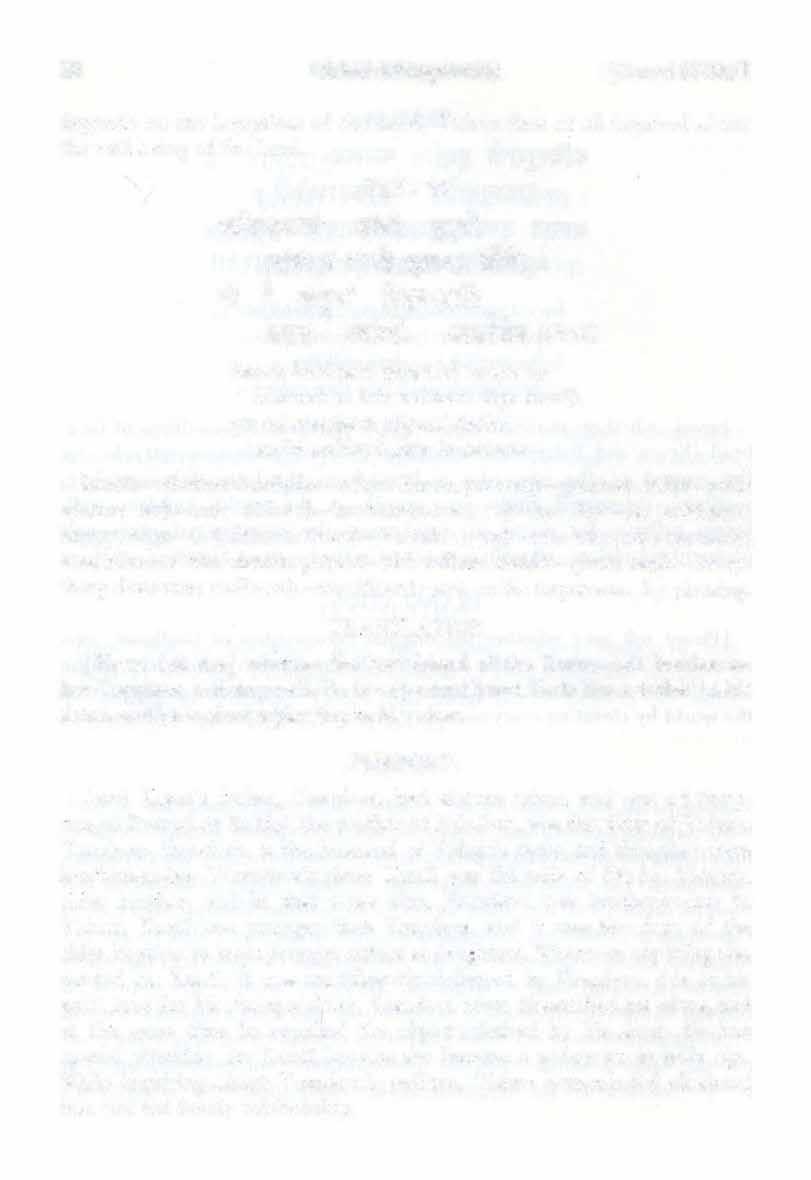
�B��UJi q�: �t
��mn � 3ffi� ���i �Tft: 1
� � �qUJt fq(l��mr
«1'1. !! '!I� '!l«rfaTWf II�\911 kaccit kuriirtiim paramab- suhrn no bhamab- sa aste sukham anga sauribyo vai svasffliirh pitrvad dadati varan vadanyo vara tarpa[tena
· kaccit-whether; kuriirtiim-ofthe Kurus; paramab--greatest; suhrt- wellwisher; nab--our; bhamab--brother-in-law; sab--he; aste-is; sukhamhappy; anga-0 Uddhava; saurib--Vasudeva; yab--one who;vai- certainly; svasfflam-of the sisters; pitrvat-like father; dadati-gives; varan-everything desirable; vadanyo{t -munificent; vara-wife; tarpa[tena-by pleasing.
TRANSLATION
[Please tell me] whether the best friend of the Kurus, our brother-inlaw Vasudeva, is doing well. He is very munificent. He is like a father to his sister, and he is always pleasing to his wives.
PURPORT
Lord Kr!!Da's father, Vasudeva, had sixteen wives, and one of them, named Paurav! or Rohii)J:, the mother of Baladeva,was the sister of Vidura. Vasudeva, therefore, is the husband of Vidura's sister, and thus they were brothers-in-law. Vasudeva's sister Kunt! was the wife of Pal)gu, Vidura's elder brother, and in that sense also, Vasudeva was brother-in-law to Vidura. Kuntl was younger than Vasudeva, and it was the duty of the elder brother to treat younger sisters as daughters. ' Whenever anything was needed by Kunt!, it was munificently delivered by Vasudeva, due to his great love for his younger sister. Vasudeva never dissatisfied his wives, and at the same time he supplied the objects desired by his sister. He had special attention for Kunt! because she became a widow at an early age. While inquiring about Vasudeva's welfare, Vidura remembered all about him and the family relationship.
28 Srimad-Bhagavatam [Canto 3, Ch. l
Questions by Vidura
TEXT 28 itiNA\�1���
SlUR 3tl�� �� �R:: I _, q �&�IJ\T �atsf�il
3ffil\lf f� ��u� ������
kaccid varuthadhipatir yadunam pradyumna aste sukham anga vira[t yam rukmirt"i bhagavato'bhilebhe aradhya vipran smaram adisarge
kaccit-whether; varutha- military ; adhipat*-commander-in- chief; yadunam-of the Yadus; pradyumna�-the son of Kr�Qa named Pradyumna; liste-is; sukham-happy; anga-0 Vidura; vira�-the great warrior; yam-whom; rukmirtl"-the wife of Kr�I}a named Rukmil)i; bhagavata�-from the Personality of Godhead; abhilebhe-got as a prize; liradhya-pleasing; vipran-brahmartas; smaram--Cupid (Kamadeva); adisarge-in his previous life.
TRANSLATION
0 Uddhava, please tell me how is Pradyumna, the commander-in-chief of the Yadus, who was Cupid in a former life? Rukmi!Ji bore him as her son from Lord Kp:;r;ta, by the grace of brahma!JaS whom she pleased.
PURPORT
According to Srila Jiva Gosvam1, Smara (Cupid, or Kamadeva) is one of the eternal associates of Lord Kr�J1a. Jiva Gosvam1 has explained this very elaborately in his treatise KnTJa-sandarbha.
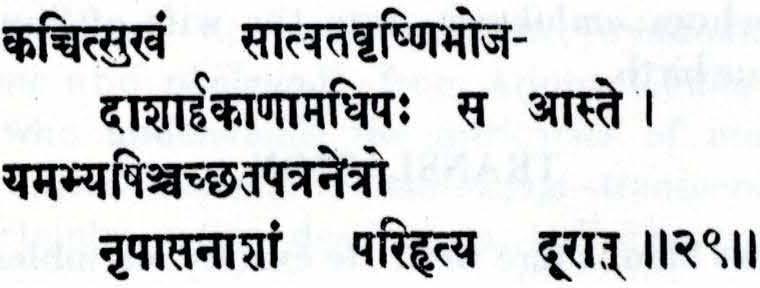
TEXT 29

29)
Text
29
kaccit sukham siitvata-vr�!Ii-bhojadiisiirha-kiil)iim-adhipq�sa iiste yam abhya�incac chata-patranetro nrpiisaniisiim parihrtya duriit
kaccit-whether; sukham-a!l well; siitvata-the Satvata race; Vf�l)i-the Vr�t;ti dynasty; bhoja-the Bhoja dynasty; diisiirha-kiil)iim-the Dasarha race; adhipa]J.-King Ugrasena; sa�-he; iiste-do exist; yam-whom; abhya§incat-insta!led; sata-patra-netra�!-Lord Sri Kr�t;t a; nrpasaniisiimhope of the royal throne; parihrtya-giving up; diiriit-at a distant place.
TRANSLATION
0 my friend, [tell me] whether Ugrasena, the King of the Satvatas, Vr�11is, Bhojas and Dasiirhas, is now doing well. He went far away from His kingdom, leaving aside all hopes of his royal throne, but Lord Kr!!'1a again reinstalled him.
TEXT 30
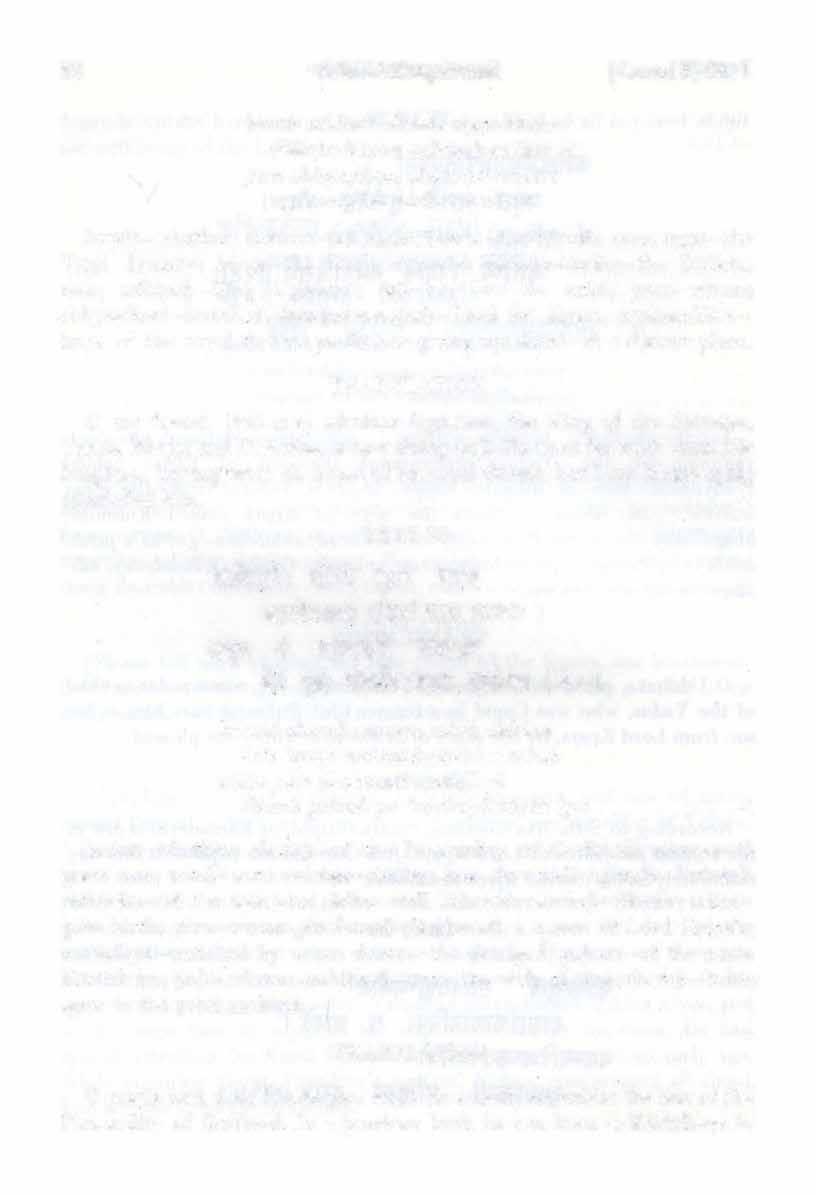
•F.F:
«� wr: �
�SiaftU�m'i�T"r: I
�� q \ilMr:JQ"t !f<ll�
� g( tilsP...cti�l �.(llSJ II� o II
kaccid dhare� saumya suta� sadrk�a iiste 'gra(Iirathinam siidhu samba�
asuta yam jiimbavativratiit;lhyii devarh guham yo 'mbikayii dhrto 'gre
kaccit-whether; dhare�-of the Personality of Godhead; saumya-0 grave one; suta�-son; sadrk§a-similar; iiste-fare well; agral)"i?I-forward; rathiniim-of the warriors; siidhu-well behaved; siimba�-Samba; asutagave birth; yam-whom; jiimbavati-]ambavat1, , a queen of Lord Kr�•:1a 's; vratiit;lhyii-enriched by vows; devam-the demigod; guham-of the name Karttikeya; ya�I-whom; ambikayii-unto the wife of Siva; dhrta�I-born; agre-in the previous birth.
TRANSLATION
0 gentle one, does Samba fare well? He exactlyresembles the son of the Personality of Godhead. In a previous birth he was born as Karttikeya in
30
Srirnad-Bhagavatarn
[Canto 3, Ch. l
the womb of thewife of Lord Siva, and now he has been born in the womb of Jambavati, the most enriched wife of Kr�J}a.

PURPORT
Lord Siva, one of the three qualitative incarnations of the Personality of Godhead, is the plenary expansion of the Lord. Karttikeya, born of him, is on the level of Pradyumna, another son of Lord Kr�J}a. When Lord Sri Kri!l')a descends into the material world, aJI His plenary portions also appear with Him to exhibit different functions of the Lord. But for the pastimes at Vrndavana, aJI functions are performed by the Lord's different plenary expansions. Vasudeva is a plenary expansion of Narayal)aWhen the Lord appeared as Vasudeva before Devaki and Vasudeva, He appeared in His capacity as Narayal)a- Similarly, aJI the demigods of the heavenly kingdom appeared as associates of the Lord in the forms of Pradyumna, Samba, Uddhava, etc- It is learned here that Kamadeva appeared· as Pradyumna, Karttikeya as Samba, and one of the Vasus as Uddhava_ All of them servedin their different capacities in order to enrich the pastimes of Kri!J}a.
TEXT 31

�:�:
h�emarn sa kaccid yuyudhiina iiste
ya� phiilguniil labdha-dhanii-rahasyatt
lebhe 'ii jasiidhok�aja-sevayaiva
gatirh tadiyiim yatibhir duriipiim
k$emam-allgood; sa�-he; kaccit- whether ; yuyudhiina�-Satyaki ;asteis there; ya�-one who;phiilguniit-from A�una; labdha-achieved; dhanurahasya�-one who understands the intricacies of military art; lebhealso achieved; aiijasii-summarily; adhok�aja-transcendence; sevaya-by service; eva-certainly; gatim-destination; tadiyiim-transcendent al; yatibh*-by great renouncers; duriipiim-very difficult to achieve.
Text 31) Questions by
31
Vidura
�����
�it�
flfa � �-rfq{{1411{_II��II
0 Uddhava, does Yuyudhana fare well? He learned the intricacies of the military art from Arjuna and attained the transcendental destination which is very difficult to reach even for great renouncers.
PURPORT

The destination of transcendence is to become the personal associate of the Personality of Godhead, who is known as adhok�aja, He who is beyond the reach of the senses. The renouncers of the world, the sannyasis, give up all worldly connections, namely, family, wife, children, friends, home, wealth-everything-to attain the transcendental bliss of Brahman happiness. But adhok�aja happiness is beyond Brahman happiness. The empiric philosophers enjoy a transcendental quality of bliss by philosophical speculation on the Supreme Truth, but beyond that pleasure there is the pleasure which is enjoyed by Brahman in His eternal form of the Personality of Godhead. Brahman bliss is enjoyed by living entities after liberation from material bondage. But Param Brahman, the Personality of Godhead, enjoys eternally a bliss of His own potency, which is called the iihladini potency. The empiric philosopher who studies Brahman by negation of the external features has not yet learned the quality of the ahladini potency of Brahman. Out of many potencies of the Omnipotent, there are three features of His internal potency-namely samvit, sandhini and ahladini. And in spite of their strict adherence to the principles of yama, niyama,asana,dhyana,dhiiranii and praJ;l-ayiima, the great yogis and jniinis are unable to enter into the internal potency of the Lord. This internal potency is, however, easily realized by the devotees of the Lord by dint of devotional service. Yuyudhana achieved this stage of life, just as he achieved expert knowledge in military science from Arjuna. Thus his life was successful to the fullest extent from both the material and spiritual angles of vision. That is the way of devotional service to the Lord.

32 Srimad-Bhagavatam [Canto 3, Ch. 1
TRANSLATION
TEXT 32 ��: ���;w..'N 3ffi� lQ'fi(!��tsi1 ¥t•1'4�S(qift: lf: ��tt��ttfqm,��a- it����: II��II
Questions by Vidura
kaccid budha/;1. svastyanamiva iiste svaphalka-putro bhagavat-prapanna/;1. ya/;1. kmw-padiinkita-marga-piimsuw ace�tata prema-vibhinna-dhairya/;1.

kaccit-whether; budha/;1.-very learned;svasti-well;anamiva/;1.-faultless; aste-do exist; svaphalka-putra/;1.-the son of Svaphalka, Akrura; bhagavatregarding the Personality of Godhead; prapanna/;1.-surrendered; ya/;1.-one who; kmw-the Lord; pada-ankita-marked with footprints;marga-path; piimsu�u-dust ; acefitata-exhibited; prema-vibhinna-lost in transcendental love; dhairya/;1.-mental equilibrium.
TRANSLATION
Please tell me whether Akrura, the son of Svaphalka, is doing well. He is a faultless soul surrendered unto the Personality of Godhead. He once lost his mental equilibrium due to his ecstasy of transcendental love and fell down on the dust of a road which was marked with the footprints of Lord Kr�f!a .
PURPORT
When Akrura came to Vrndavana in search of Kr�f!a, he saw the footprints of the Lord on the dust of Nanda-grama and at once fell on them in ecstasy of transcendental love. This ecstasy is possible for a devotee who is fully absorbed in incessant thoughts of Kr�l')a. Such a pure devotee of the Lord is naturally faultless because he is always associated with the supremely pure Personality of Godhead. Constant thought of the Lord is the antiseptic method for keeping oneself free from the infectious contamination of the material qualities. The pure devotee of the Lord is always in company with the Lord by thinking of Him. Yet, in the particular context of time and place, the transcendental emotions take a different turn, and this breaks the mental equilibrium of the devotee. Lord Caitanya was the typical example of the transcendental ecstasy, as we can understand from the life of this incarnation of God.
33)
Text
33
TEXT 33 ��� 1:��� �� �� 1;�: I ���ot�1:i � � �:fflFI� II��II
kaccic chivarh devaka-bhoja-putrya vi�rtu-prajaya iva deva-matuft
ya vai sva-garbhertll dadhara devarh
trayi yatha yajiia-vitanam artham
kaccit-whether; sivam-everything well; devaka-bhoja-putryii[t-of the daughter of King Devaka-bhoja; v4rtu-prajiiya(t-of she who gave birth to the Personality of Godhead; iva-like that of; deva-matu�-of the mother of the demigods (Aditi); ya-one who; vai-indeed; sva-garbhe"{la-by her own womb; dadhara- conceived; devam'-the Supreme Lord; trayi- the Vedas; yatha-as much as; yajiia-vitanam-spreading the sacfificial; arthampurpose.
TRANSLATION
As the Vedas are the reservoir of sacrificial purposes, so the daughter of King Devaka-bhoja conceived the Supreme Personality of Godhead in her womb, as did the mother of the demigods. Is she [Devaki) doing well?
PURPORT
The Vedas are full of transcendental knowledge and spiritual values, and thus Devaki, the mother of Lord Kr�11a, conceived the Lord in her womb as the personified meaning of the Vedas. There is no difference between the Vedas and the Lord. The Vedas aim at the understanding of the Lord, and the Lord is the Vedas personified. Devaki is compared to the meaningful Vedas and the Lord to their purpose personified.
TEXT 34

31AM4>t�ij � � �1
l(: �t ���:1
�;d'� � ft: ��ftr
'�Wit�
�+4ijtl�� 11�\lll
api-svid aste bhagavan sukharh vo
ya� satvatarh kama-dugho 'niruddha�
yam iimananti sma hi sabda-yonirh
mano-mayarh sattva-tur"iya-tattvam
api-as also; svit-whether; aste-does He; bhagavan-the' Personality of Godhead; sukham-all happiness; va�-of you; ya�-one who; satvatamof the devotees; kama-dugha�-source of all desires; aniruddha�-the
34
Srimad-Bhagavatam
[Canto 3, Ch. l
plenary expansion Aniruddha; yam-whom; amananti-accept; sma-from yore; hi-certainly;sabda-yonim-thecauseof the IJ-g-veda;manafl-mayamcreator of the mind; sattva-transcendental; turiya-thefourth expansion; tattvam-principle.

TRANSLATION
May I inquire whether Aniruddha is doing well? He is the fulfiller of all the desires of the pure devotees and has been considered from yore to be the ca:use of the J;l.g-veda, the creator of the niind and the fourth plenary expansion of Vi�l).u. ·
PURPORT
Adi-caturbuja, the original expansions from Baladeva, are Vasudeva, Sankar�a�;ta, Pradyumna and Aniruddha. All of Them are Vi�rw-tattvas or nondifferent Personalities of Godhead. In the incarnation of Sri Rama, all these different expansions appeared for particular pastimes: Lord Rama is the original Vasudeva, and His brothers were Sankar�a�;ta, Pradyumna and Aniruddha. Aniruddha is also the cause of Maha-Vi��;tu, from whose breathing the IJ-g-veda appeared. All this is nicely explained in the Miirkar4eya Puriirw. In the incarnation of Lord Kr�J;ta, Aniruddha appeared as the son of the Lord. Lord Kr!il}a in Dvaraka is the Vasudeva expansion of the original group. The original Lord Kr�l}a never leaves Goloka Vrndavana. All the plenary expansions are one and the same V�!lu-tattva, andthere is no difference in their potency.
TEXT
'lwtW44MI �<11 it I

api-svid anye ca nijiitma daivam ananya-vrttyii samanuvratii ye
hrdlka-satyiitmaja-ciirude�!la gadiidayafl, svasti caranti saumya
api-as also; svit-whether; anye-others; ca-and; nija-atma-of one's own self; daivam-Sri Kr�Qa; ananya- absolutely; vrttya-faith; samanu.vratafl,-followers; ye-all those; lirdlka- 1-lrdlka; satya-atmaja-born of
Text 35) Questions by Vidura 35
� r.r�m�-
35 atrqr�
�-
��r�� n�'-\11
�'M1�t«k�
�:
Satyabhama; caru. de�!la- Carude�Qa; gada- G a da; adaya�-and others; svasti- all well; caranti- pass time; saumya-0 sober one.
TRANSLATION
0 sober one, others, such as Hrdika, Carude�r:ta, the son of Satyabhama, and Gada, who accept Lord Sri Kr�r:ta as the soul of the self and thus follow His path without deviation-are they well?
TEXT 36 ·3ffir��

api sva-dorbhyiirh vijayiicyutiibhyiirh dharme!la dharma� paripati setum duryodharw 'tapyata yat-sabhayiirh siimriijya-lak�myii-vijayiinuvrttyii
api-as aJso; sva-dorbhyiim-own arms; vijaya-Arjuna; acyutabhyiimalong with Sri Kr�Qa; dharme!la-on religious principles; dharma�- King Yudhi�thira; paripiiti- maintains; setum-the respect of religion; duryodhana�- Duryodhana; atapyata- envied; yat-whose; sabhiiyam-royal assembly; siimriijya-imperial; lak§myii-opulence; vijaya-anuvrttyii-by the service of A�una.
TRANSLATION
Also let me inquire whether Maharaja Yudhi!!thira is now maintaining the kingdom according to religious principles and with respect for the path of religion. Formerly Duryodhana was burning with envy because Yudhi�'hira was being protected by the arms of K.r!!r:ta and Arjuna as if they were his own arms.
PURPORT
Maha raja Yudhi�thira was the emblem of religion. When he was ruling his kingdom with the help of Lord Kr!!Qa and Arjuna, the opulence of his kingdom surpassed all imaginations of the opulence of the kingdom of heaven. His actual arms were Lord Kr!!Qa and Arjuna,and thus he surpassed everyone'sopulence. Duryodhana,being envious of this opulence, planned
36 Srimad-Bhagavatam [Canto 3, Ch. 1
�
��� �m
�ifur �: qftqllir �I
(il!lll�tt�� �ttlf!titll ����II
so many schemes to put Yudhi��hira into difficulty, and at last the Battle of Kuruk�etra was brought about. After the Battle of Kuruk�etra, Maharaja Yudhi��hira was again able to rule his legitimate kingdom, and he reinstated the principles of honor and respect for religion. That is the beauty of a kingdom ruled by a pious king like Maharaja Yudhi�thira.
TEXT 37

kim vii krtaghe§V aghamaty amar:�i bhimo'hivad dirghatamarh vyamuncat yasyiinghri-patarh rat;ta-bhur na sehe miirgarh gadayas carato vicitram
kim-whether; vii-either; krta-performed; aghe� u-unto the sinners; aghamati-angry; amar�"i-unconquerable; bhimalz- Bhima; ahivat-like the cobra; dirghatamam-long-cherished; vyamuncat- has released; yasyawhose; a;tghri-pata m-putting on the steps; rat;ta-bhulz-the field of battle; na-could not; sehe-tolerate; margam-the path; gadaya!z-by the clubs; carata!z- playing;vicitram-wonderful.


TRANSLATION
[Please tell me J whether the uncon'luerable Bhima, who is like a cobra, has released his long-cherished anger upon the sinners? The field of battle could not tolerate even the wonderful playing of his club when he stepped on the path.
PURPORT
Vidura knew thestrength of Bhima. Whenever Bhima was on the battlefield, his steps on the path and the wonderful playing of his club were unbearable for the enemy. Powerful Bhima did not take steps againstthe sons of Dhrtara�tra for a long time. Vidura's inquiry was whether he had yet released his anger, which was like that of a suffering cobra. When a cobra releases its venom after long-cherished anger, its victim cannot survive.
Text 37) Questions by Vidura 37
ft
�Tm��Cfli oq� I �� � �?JR<it ft� ������
en �A���wff
TEXT 38

3(� ���) �m�
11��11
kaccid yasodha ratha�yuthapanam giir.t;liva-dhanvoparatiirir iiste alak�ito yac-chara-kuta-gutjho maya-kiriito girisas tuto�a
kaccit- whcther;yasvdhii-famous;ratha-yuthapiiniim-amongst the great chariot warriors; gii!1tJiva-Ga1;1Qiva; dhanva-bow; uparatari�-one who has vanquished the enemies; aste-doing well; alak�ita�-without being identified;yat-whose; sara-kuta-gutjha�-being covered by arrows; mayiikirata�- fa!se hunter;girisa�-Lord Siva;tuto�a-was satisfied.
TRANSLATION
[Ple�se tell me] whether Arjuna, whose bow bears the name Ga!l�iva and who is always famous amongst the chariot warriors for vanquishing his enemies, is doing well. He once satisfied Lord Siva by covering him with arrows when Siva came as an unidentified false hunter.
PURPORT
Lord Siva tested Arjuna's strength by picking a quarrel with him over a hunted boar. He confronted Arjuna in the false dress of a hunter, and Arjuna covered him with arrows until Lord Siva was satisfied with Arjuna's fighting. He offered Arjuna the Pasupati weapon and blessed him. Here Vidura inquired about the great warrior's well-being.
TEXT 39

38 Srimad-Bhagavatam
��
(�'{llql;ri tt•vtl:c't�•fmm�
��
[Canto 3, Ch. l
Questions by Vidura
yamav utasvit tanayau prthiiyii�
piirthair vrtau pak�mabhir ak�il)"iva remiita uddiiya mrdhe sva-riktharit
parat supar1JliV iva vajri-vaktriit
yamau-twins (Nakula and Sahadeva) utasvit-wheth er; tanayau-sons; prthayii�-of Prtha; pii;tha*-by the sons of Prtha; vrtau-protected; pak�mabhi�-by shields; ak�il)i-of the eyes; iva-like; remiite - playing carelessly; u ddii ya-snatching; mrdhe-in the fight; sva-riktham-own property; pariit-from the enemy Duryodhana; supariJau-Garw;l.a, the carrier of Lord Vi�l)u; iva - like; vajri-vaktriit-from the mouth of lndra.
TRANSLATION
Are the twin brothers who are protected by their brothers doing well? Just as the eye is always protected by the eyelid, they are protected by the sons of Prtha, who snatched back their rightful kingdom from the hands of their enemy Duryodhana, just as Garu"a snatched nectar from the mouth of lndra, the thunderbolt carrier.
PURPORT
lndra, the King of heaven, carries a thunderbolt in his hand and is very strong, yet Garu�a, the carrier of Lord Vi�I)U, was able to snatch nectar from his mouth. Similarly, Duryodhana was as stong as the King of heaven, and still the sons of Prtha, the Piit:��avas, were able to snatch away their kingdom from Duryodhana. Both GaruQ.a and the Parthas are pet devotees of the Lord, and thus it was possible for them to face such strong enemies.
Vidura's inquiry was about the youngest brothers of the Pai)Q.avas, namely Nakula and Sahadeva. These twin brothers were sons of Madri, the stepmother of the other Piii)Q.avas. But although they were stepbrothers, because Kunfi took charge of them after the departure of Madri with her husband Maharaja Piil)�u, Nakula and Sahadeva were as good as the other three Pal)�avas, Yudhi��hira, Bhi:ma and Arjuna. The five brothers are known in the world as regular brothers. The three elder Piil)�avas took care of the younger brothers, just as the eyelid takes care of the eye. Vidura was anxious to know whether, after winning back their own kingdom from the hands of Duryodhana, the younger brothers were still living happily under the care of the elder brothers.

Text 39)
39
TEXT40 q��
��IIJ ft;nfq � I q�+ftit� Aft��
.'N: q-qwm;r: 11\loll
aho prthiipi dhriyate 'rbhakarthe rajar�i-varyer.a vinapi tena yas tv eka-v"iro 'dhiratho vijigye dhanur dvit"iya� kakubhas catasra�

aho-0 my lord; prtha- Kunfi ; api-also; dhriyate-bears her life; arbhaka-arthe-for the sake of fatherless children; rajar�i- King PaJ;�{lu; varye!la-the best; vinapi-without him; tena-him ; ya�-one who;tu-but; eka-alone; vira�- the warrior; adhiratha� - commander ; vijigye- could conquer; dhanu�-the bow; dvitiya�- the second; kukubha�-directions; catasra�-four.
TRANSLATION
0 my lord, is Prtha still living? She lived only for the sake of her fatherless children; otherwise it was impossible for her to live without King Par:t«;;u, who was the greatest commander and who alone conquered thefourdirections simplywiththehelp ofa second bow.
PURPORT
A faithful wife cannot live without her lord, the husband, and therefore all widows used to voluntarily embrace the burning fire which consumed the dead husband. This system was very common in India because all the wives were chaste and faithful to their husbands. Later on, with the advent of the age of Kali, the Wives gradually began to be less adherent to their husbands, and the voluntary embrace of the fire by the widows became a thing of the past. Very recently the system was abolished, since the voluntary system had become a forcible social custom.
When Maharaja Pat:t«;;u died, both his wives, namely Kunt1 and Madr1, were prepared to embrace the fire, but Madri requested Kunt1 to live for the sake of the younger children, the five PiiJ;�«;;avas. This was agreed upon by Kunfi at the added request of Vyasadeva. In spite of her great bereavement, Kuntl decided to live, not to enjoy life in the absence of her husband, but only to give protection to the children. This incidence is referred to here by Vidura because he knew all the facts about his sister-
40 Srimad-Bhagavatam
[Canto 3, Ch. 1
in-law, Kuntidev1. It is understood that Maharaja Pat:t�u was a great warrior and that he alone, with the help of bow and arrow, could conquer the world's four directions. In the absence of such a husband, it was almost impossible for Kuntl to live on even as a widow, but she had to do it for the sake of the five children.

TEXT41 «lR4tt��i1 �:�
ll'l �II
saumyiinusoce tam adha�-patantam bhriitre paretiiya vidudruhe ya�
niryiipito yena suhrt sva-puryii aham sva-putriin samanuvratena
saumya-0 gentle one; anusoce-just lamenting; tam-him ; adha�patantam- gliding down; bhriitre-on his brother's; paretiiya- death; vidudruhe-revolted against; ya�-one who; niryiipita�-driven out; yena-by whom; suhrt- well-wisher; sva-puryii�-from his own house; aham- myself; sva-putriin-with his own sons; samanuvratena-accepting the same line of action.
TRANSLATION
0 gentle one, I simply lament for him [ Dhrtara�1ra J who rebelled against his brother after death. By him I was driven out of my own house, although I am his sincere well-wisher. He did this by accepting the line of action adopted by his own sons.
PURPORT
Vidura did not ask about the welfare of his elder brother because there was no chance of his well-being, only news of his gliding down to hell. Vidura was a sincere well-wisher for Dhrtara��ra, and he had a thought about him in the corner of his heart. He lamented that Dhrtara�tra could rebel against the sons of his dead brother Piit:t�u and that he could drive him (Vidura) out of his own house on the dictation of his crooked sons. In spite of these actions, Vidura never became an enemy of Dhrtara�tra but continued to be his well-wisher, and at the last stage of Dhrtara��ra's
Text 41) Questions by Vidura 41
� tR:m r.tm q: � � ij(ffi�i 3ft · \i!4f'lli{ (1'4t�Aawt
life, it was he only who proved to be his real friend. Such is the behavior of a Vai�l)ava like Vidura: he desires all good, even for his enemies.
TEXT42
�st nJiJfilcMC�;w m ·� "''��M �: , ;u4\q��= �- smm.mq. � �� tl\l�ll
so 'ham harer martya-vit}ambanena drso nr!'am ciilayato vidhatu� nanyopalak�ya� padavim prasadac cariimi pasyan gata-vismayo 'tra
sa� aham-therefore,I; h are�-of the Personality of Godhead; martyain this mortal world; vit}ambanena-without being recognized; drsa�-on sight; nr!'am-of the people in general; c alayata� -bewildering; vidhatu�in order to do it; na-not; anya-other; upalak�ya�-seen by others; padavim-glories; prasadat-by the grace of; carami-do travel; pasyan- by seeing; gata-vismaya�-without doubt; atra-in this matter.
TRANSLATION
I am not astonished at this, having traveled over the world without being seen by others. The activities of the Personality of Godhead, which are like those of a man in this mortal world, are bewildering to others, but I know of His greatness by His grace, and thus I am happy in all respects.
PURPORT
Although he was the brother of Dhrtara�tra, Vidura was completely different. By the grace of Lord Kr�l)a, he was not as foolish as his brother, and thus his brother's association could not influence him. Dhrtara�tra and his materialistic sons wanted to falsely lord it over the world by dint of their own strength. The Lord encouraged them in this, and thus they became more and more bewildered. But Vidura wanted to achieve sincere devotional service of the Lord and therefore became a soul absolutely surrendered to the Absolute Personality of Godhead. He could realize this in the progress of his pilgrim's journey, and thus he was freed from all doubts. He was not at all sorry to be bereft of his hearth and home because he now had experience that dependence

42 Srimad-Bhigavatam [Canto 3, Ch. 1
on the mercy of the Lord is a greater freedom than so-called freedom at home. A person should not he in the renounced order of life unless he is firmly convinced of being protected by the Lord. This stage of life is explained in Bhagavad-gitii as abhayarh sattva-sarhsuddh*: every living entity is factually completely dependent on the mercy of the Lord, hut unless one is in the pure state of existence, he cannot he established in this position. This stage of dependence is called sattva-sarhsuddhi�, or purification of one's existence. The result of such purification is exhibited in fearlessness. A devotee of the Lord, who is called niiriiya[la-para, is never afraid of anything because he is .always aware of the fact that the Lord protects him in all circumstances. With this conviction, Vidura traveled alone, and he was not seen or recognized by any friend or foe. Thus he enjoyed freedom of life without obligation to the many duties of the world.
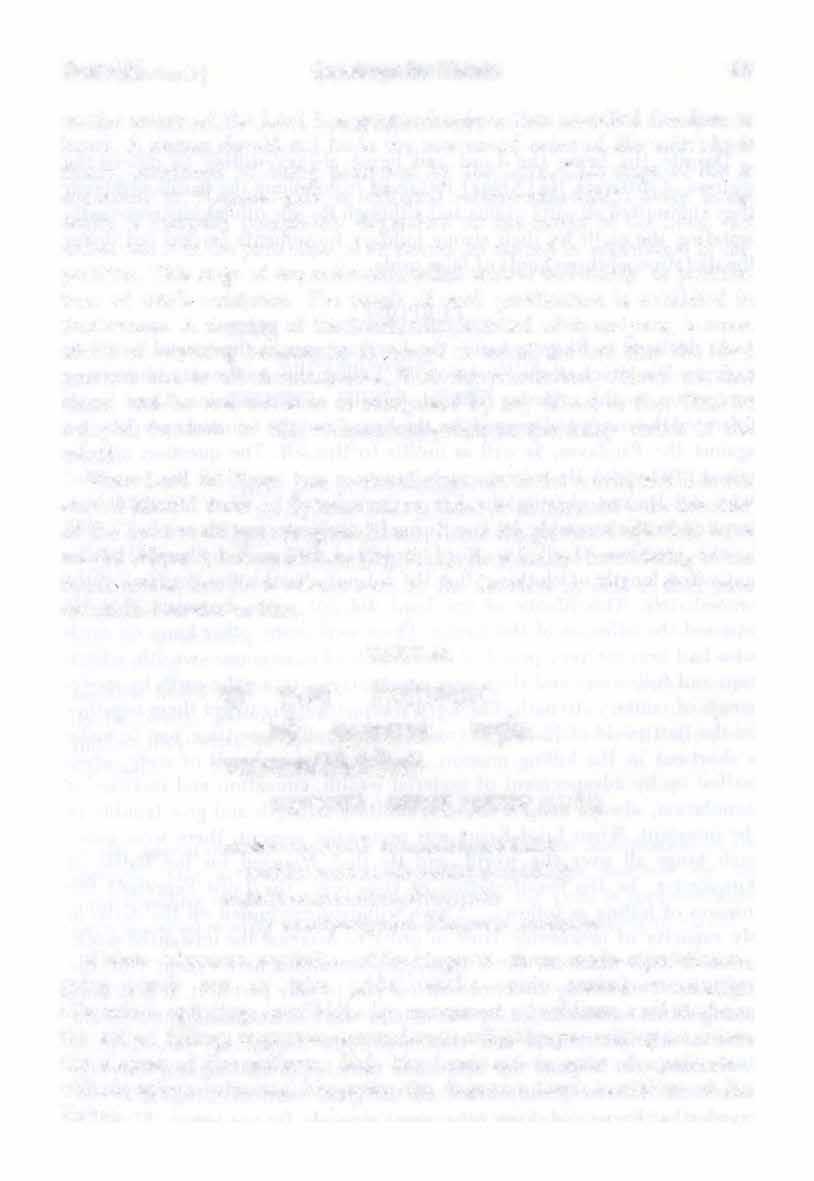
When Lord Sri Kw,1a was personally present in the mortal world in His eternal blissful form of Syamasundara, those who were not pure devotees of the Lord could not recognize·Him or know His glories. Avajiiniinti mii.rh mu{lhii. mii.nu�irh tanum iisritam (Bg. 9.11): He is always bewildering to the nondevotees, hut He is always seen by the devotees by dint of their pure devotional service to Him. TEXT43
nunarh nrpii�Jiirh tri-madotpathii.niirh

mahim-muhus ciilayatiirh camubh*
vadhii.t prapanniirti-jihir�ayeso 'py upaik�atiigharh bhagavii.n kuruiJiim
nunam-ofcourse; nrpii1Jii.m-ofthekings;tri-three; mada-utpathiinii.mgoing astray out of false pride; mahim-earth; muhu�-constantly; cii.layatii.m-agitating; camubh*-by movement of soldiers; vadhiit-from the act of killing; prapanna-surrendered; arti-jihir§aya-willing to relieve the distress of the sufferers; iSa�-the Lord; api-in spite of; upaik�atawaited; agham-offenses; bhagaviin-the Supreme Lord; kuru�Jiim-of the Kurus.
Text43] Questions by Vidura 43
;l9f wrntJJt �W�'�•;cf Qf u•na�6f �: qt=Uafq4Uf'aflr(l�tJt.
�- � ��II'( mHII
TRANSLATION
Despite His being the Lord and being always willing to relieve the distress of sut'ferers, He [Kr!!Qa] refrained from killing the Kurus, although theycommitted allsorts ofsins and although He saw otherkings constantly agitating the earth by their strong military movements carried out under the dictation of three kinds of false pride.
PURPORT
As declared in Bhagavad-g"ita, the Lord appears in the mortal world to execute His much-needed mission of killing the miscreants and giving protection to the suffering faithful. In spite of that mission, Lord K�s.11a tolerated the insult to Draupadi by the Kurus and the injusticesperpetrated against the Pa�;u;lavas, as well as insults to Himself. The question may be raised, "Why did He tolerate such injustices and insults in His presence? Why did He not chastise the Kurus immediately?" When Draupadl was insulted in the assembly by the Kurus by their attempt to see her naked in the presence of all, the Lord protected Draupadl by supplying an unlimited length of clothing. But He did not chastise the insulting party immediately. This silence of the Lord did not mean, however, that He excused the offenses of the Kurus. There were many other kings on earth who had become very proud of three kinds of possessions-wealth, education and followers-and they were constantly agitating the earth by movements of military strength. The Lord was just waiting to get them together on the Battlefield of Kuruk�etra and kill them all at one time,just to make a short-cut in His killing mission. Godless kings or heads of state, when puffed up by advancement of material wealth, education and increase of population, always make a show of military strength and give trouble to the innocent. When Lord Kr1!11a was personally present, there were many such kings all over the world, and He thus arranged for the Battle of Kuruk�etra. In His manifestation of visva-rupa, the Lord expressed His mission of killing as follows: "I have willingly descended on the earth in My capacity of inexorable Time in order to decrease the unwahted population. I shall finish all those who have assembled here except you, the PaJ;JI;lavas. This killing does not wait for you to take part in it. It is already arranged: all will be killed by Me. If you want to become famous as the hero of the battlefield and thus enjoy the booty of war, then, 0 Savyasacin, just become the immediate cause of this killing and thus take the credit. I have already killed all the great warriors, Bhi�ma, DroJ;Ja, .Jayadratha, KarJ;Ja and many other great generals. Do not worry. Fight the battle and be famous as a great hero." (Bg. 11.32-34)

44 Srimad-Bhagavatam [Canto 3, Ch. 1
The Lord always wants to see His devotee as the hero of some episode which He Himself performs. He wanted to see His devotee and friend A�una as the hero of the Battle of Kuruk�etra, and thus He waitedfor all the miscreants of the world to assemble. That, and nothing else, is the explanation of His waiting.
ajasya janmotpatha-nasanaya karmiil)y akartur grahartaya pumsiim nanv anyatha ko 'rhati deha-yogam para gurtanam uta karma-tantram

ajasya-of the unborn; janma- appearance; utpatha-nasanaya-for the sake of annihilating the upstarts; karmarti-works ; akartu�-of one who has nothing to do; grahal)aya-to take up; purhsam - of all persons; nanu anyatha-otherwise; ka�-who ; arhati�may deserve; deha-yogam-contact of the body; parab,-transcendental; gttl)anam-of the three modes of nature; uta-what to speak of; karma-tantram-the law of action and reaction.
TRANSLATION
The appearance of the Lord is manifested for the annihilation of the upstarts. His activities are transcendental and are enacted for the understanding of all persons. Otherwise, since the Lord is transcendental to all material modes, what purpose could He serve by coming to earth?
PURPORT
lsvara� parama� kr�rJa� sac-cid-ananda-vigraha� (Brahma-samhita, 5.1): the form of the Lord is eternal. blissful and all-knowing. His so-called birth is therefore an appearance only, like the birth of the sun on the horizon. His birth does not, like that of the living entities, take place under the influence of material nature and the bondage of the reactions of past deeds. His works and activities are independent pastimes and are
Text 44) Questions by Vidura 45
44 � ;:tfl{l�q;{I:U;{Iq �����hatA �I
�sifd ��
���II
TEXT
wtr<!4�ill
q'(t !IIJllitliif
'cl'clll
not subject to the reactions of material nature. In Bhagavad-g"ita it is said:

na miirh karmiirti limpanti na me karma-phale sprha
iti marh yo 'bhijiinati karmabhir na sa baddhyate (Bg. 4.14)
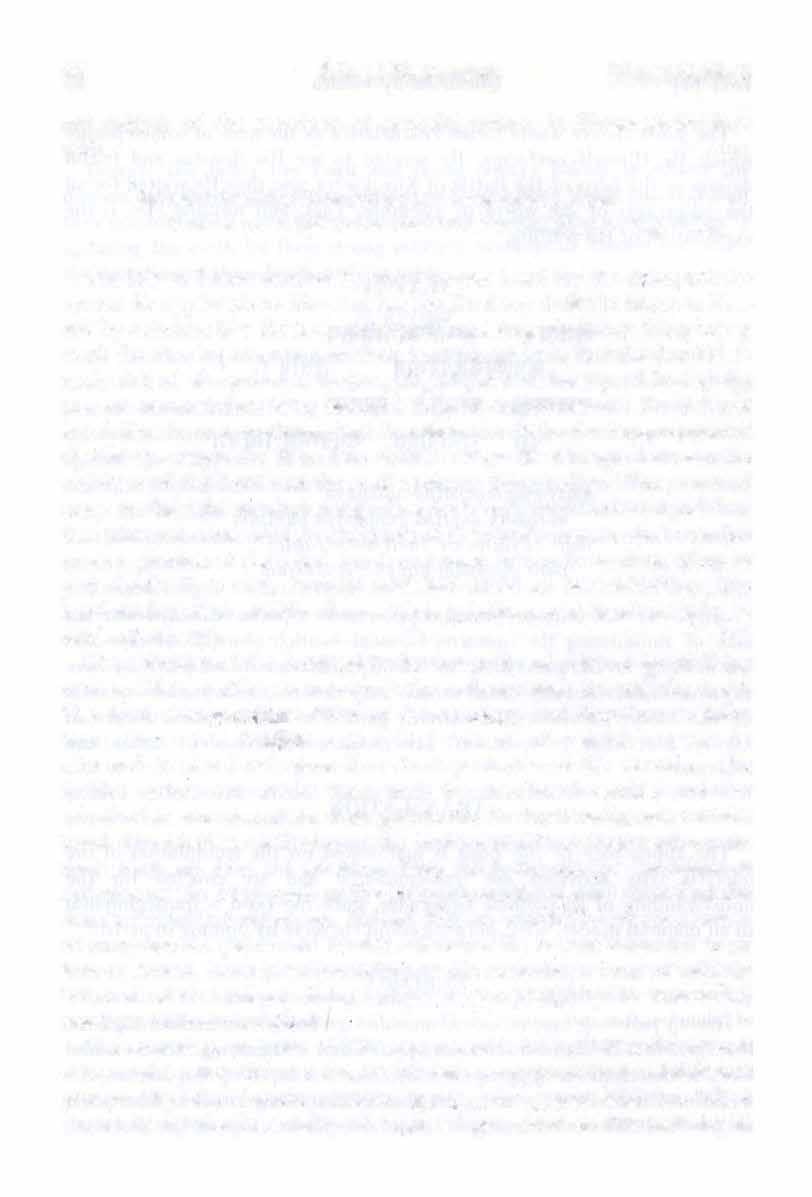
The law of karma enacted by the Supreme Lord for the liying entities cannot be applicable to Him, nor has the Lord any desire to improve Himself by activities like those of ordinary living beings. Ordinary living beings work for the improvement of their conditional lives. But the Lord is already full of all opulence, all strength, all fame, all beauty, all knowledge and all renunciation. Why should He desire improvement? No one can excel Him in any opulence, and therefore the desire for improvement is absolutely useless for Him. One should always discrimin�te between the activities of the Lord and those of ordinary living beings. Thus one may come to the right conclusion regarding the Lord's transcendental position. One who can come to the conclusion of the Lord's transcendence can become a devotee of the Lord and can at once be free from all reactions of past deeds. It is said, karmii[l.i nirdahati kintu ca bhakti-bhiijam: The Lord minimizes or nullifies the reactionary influence of the devotees' past deeds.(B.s. 5:54)
The activities of the Lord are to be accepted and relished by all living entities. His activities are to attract the ordinary man towards the Lord. The Lord always a�s in favor of the devotees, and therefore ordinary men who are fruitive actors or seekers of salvation may be attracted to the Lord when He acts as protector of the devotees. The fruitive actors can attain their goals by devotional service, and the salvationists can also attain their goal in life by devotional service to the Lord. The devotees neither want the fruitive results of their work nor do they want any kind of salvation. They relish the glor�ous superhuman activities of the Lord, such as His lifting Govardhana Hill, His killing the demon Putana in infancy, etc. His activities are enacted to attract all kinds of men- karmis, jnan"is and bhaktas. Because He is transcendental to all laws of karma, there is no possibility of His accepting a form of maya as is forced on the ordinary living entities who are bound by the actions imd reactions of their own deeds.
The secondary purpose of His appearance is to annihilate the upstart asuras and to stop the nonsense of atheistic propaganda by less intelligent persons. By the Lord's causeless Jl1er<;.y, the asuras who are killed personally by the Personality of Godhead get salvation. The meaningful

46 Srimad-Bhagavatam [Canto 3, Ch. l
appearance of the Lord is always distinct from ordinary birth. Even the pure devotees have no connection with the material body, and certainly the Lord, who appears as He is, in His sac-cid-ananda form, is not limited by a material form. TEXT45 �
�
�
Oil� �i: 11\l'-\11

tasya prapannakhila-loka-panam avasthitanam anusasane sve arthaya jatasya yadu�v ajasya vartam sakhe kirtaya tirtha-kirte�
tasya- His; prapanna- surrendered ; akhila-loka-piiniim-all rulers of the entire universe; avasthitanam-situated in; anusasane-under the control of; sve-own self; arth.aya- for the interest of; jiitasya-of the born; yadu�u-in the family of the Yadus; ajasya-of the unborn; vartamtopics; sakhe-0 my friend; kirtaya-please narrate; tirtha-kirte�-of the Lord, whose glories are chanted in the places of pilgrimage.



TRANSLATION
0 my friend, please, therefore, chant the glories of the Lord, who is meant to be glorified in the places of pilgrimage. He is unborn, and yet He appears by His causeless mercy upon the surrendered rulers of all parts of the universe. Only for their interest did He appear in the family of His unalloyed devotees, the Yadus.
PURPORT
There are innumerable ·rulers all over the universe in different varieties of planets: the sun-god in the sun planet, the moon-god in the moon planet, lndra in the heavenly planet, Vayu, Varurya, and those in the Brahmaloka planet where Lord Brahma is living. All are obedient servants of the Lord. Whenever there is any trouble in the administration of the innumerable planets in different universes, the rulers pray for an
Text45] Questions by Vidura 47
qq•u�eJtwn•u-
�
accwRI4aaWilij�\lmil
1
appearance, and the Lord appears. The Bhagavatam has already confirmed this in the following verse: ete
In every millennium, whenever there is any trouble for the obedient rulers, the Lord appears. He also appears for the sake of His pure unalloyed devotees. The surrendered rulers and the pure devotees are always strictly under the control of the Lord, and they are never disobedient to the desires of the Lord. The Lord is therefore always attentive to them.
The purpose of pilgrimages is to remember the Lord constantly, and therefore the Lord is known as tirtha-kirti. The purpose of going to a place of pilgrimage is to get the chance to glorify the Lord. Even today, although times have changed, there are still pilgrimage sites in India. For example, in Mathura and Vrndavana, where we had a chance to stay, people are awake from early in the morning at 4 A.M. up until nighttime and are constantly engaged, some way or other, in chanting the holy glories of the Lord. The beauty of such a pilgrimage site is that automatically one remembers the holy glories of the Lord. His name, fame, quality, form, pastimes and entourage are all identical to the Lord, and therefore chanting the glories of the Lord invokes the personal presence of the Lord. Anytime or anywhere pure devotees meet and chant the glories of the Lord, the Lord is present without any doubt. It is said by the Lord Himself that He always stays where His pure devotees chant His glories.
Thus end the Bhaktivedanta purports of the Third Canto, First Chapter, of the Srimad-Bhagavatam, entitled "Questions by Vidura."

48 Srimad-Bhagavatam [Canto 3, Ch. l
indrari-vyakulam lokam mrt;layanti yuge yuge
1.3.28)
Camsa-ka[a� pumsa� kmws ttL bhagavan svayam
(Bhag.
CHAPTER TWO
Remembrance of Lord Kr$r:-ta
TEXT l
��:�:�cna\�44lilliUI(I
�·��3{i�UaQIMI�lQ(:II �· II
sri suka uviica iti bhiigavatafl. PHtafl. k�attrii viirtiirh priyiisrayiim prativakturh na cotseha a�,ttkar-thyiit smiiritesvarafl.
sri sukaf:i. uviica-Sri Sukadeva said; iti-thus; bhiigavata[I-the great devotee; pr�taf:i.-being asked; k�attrii-by Vidura; viirtiim-message; priyaiisrayiim-regarding the dearest; prativaktum-to reply; na-not; ca-also; utsehe-became eager; autkar-thyiit-by excessive anxiety; smiiritaremembrance; isvarafl.-the Lord.
TRANSLATION
Sri Sukadeva Gosvami said: When the great devotee Uddhava was asked by Vidura to speak on the messages of the dearest [Lord Kr��a], Uddhava was · unable to answer immediately due to excessive anxiety at the remembrance of the Lord..
TEXT 2


�: qill(144tft � 511<1(1�111 �: I �*'U�""444't
II ' II

��
�
��"'
49
�
Srimad-Bhagavatam
yafl. panca-hiiyano miitrii priitariisiiya yiicitafl.
tan naicchad racayan yasya saparyiirh biila-lilayii
ya[1-one who; paiica-five; hiiyana[l.-years old; miitrii-by his mother; priitariisiiya-for breakfast; yiicita[l.-called for; tat-that; na-not; aicchatliked; ra c ayan-- playing; yasya-whose; saparyiim-service; biila-lilayiichildhood.
TRANSLATION
He was one who even in his childhood, at the age of five years, was so absorbed in the service of Lord Kr��a that when he was called by his mother for morning breakfast, he did not wish to have it.
PURPORT
From his very birth, Uddhava wa:s a natural devotee of Lord Kr��a, or a nitya-siddha, a liberated soul. From natural instinct he used to serve Lord Kr��a, even in his childhood. He used to play with dolls in the form of Kr�l)a,he wouldserve the dollsby dressing,feeding andworshiping them, and thus he was constantly absorbed in the play of transcendental realization. These are the signs of an eternally liberated soul. An eternally liberated goul is a devotee of the Lord who never forgets Him. Human life is meant for reviving one's eternal relation with the Lord, and all religious injunctions are meant for awakening this dormantinstinct of the living entity. The sooner this awakening is brought about, the quicker the mission of human life is fulfilled. In a good family of devotees, the child gets the opportunity to serve the Lord in many ways. A soul who is already advanced in devotional service has the opportunity to take birth in such an enlightened family. This is confirmed in the Bhagavad-gitii (6.41 ). Suciniirh srimatiirh gehe yoga-bhra§tO 'bhi jiiyate: even the fallen devotee gets the opportunity to take his birth in the family of a wellsituated briihmara or in a rich, well-to-do mercantile family. In both these families there is a good opportunity to revive one's sense of God consciousness automatically because particularly in these families the worship of Lord Kr�I].a is regularly performed and the child gets the opportunity to imitate the process of worship called arcanii.
The piiiicariitriki formula for training persons in devotional service is lemple worship, whereby the neophytes get the opportunity to learn devotional Hcrvice to the Lord. Maharaja Par1k�it also used to play with
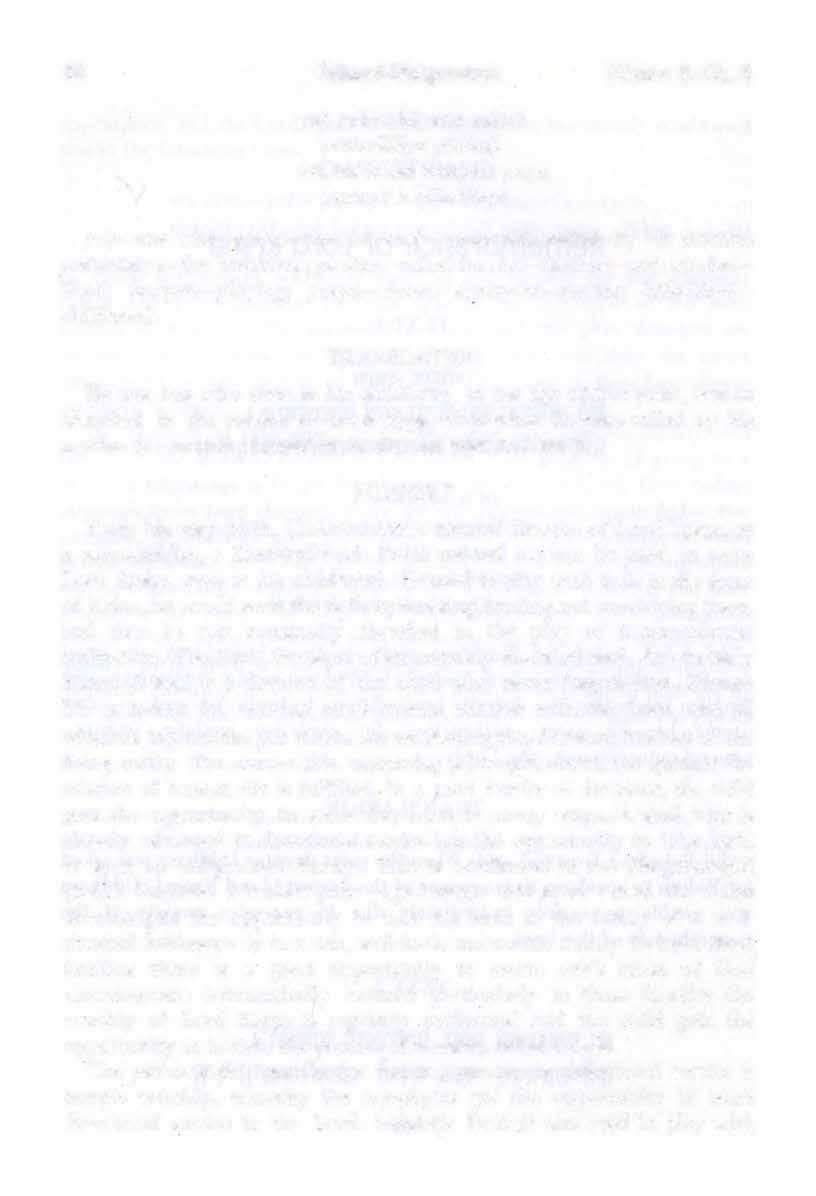
50
[Canto 3, Ch. 2
Kr�l).a dolls in his childhood. In India the children in good families are still given dolls of the Lord like Rama and Kf�l).a, or sometimes the demigods, so that they may develop the aptitude of service to the Lord. By the grace of the Lord we were given the same opportunity by our parents, and the beginning of our life was based on this principle.
TEXT3

� 'Pf� � � � �RJ: l
ftl 'fRil qai(M�41(( u � u

sa katharh sevayii tasya kiilena jarasarh gata[l P!§to viirtiirh pratibriiyiid bhartu[l piidiiv anusmaran
sa[l-Uddhava; katham-how; sevayii-by such service; tasya-his; kiilena-in course of time;jarasam- invalidity; gataft-undergone ; P!fita�asked for; viirtiim- message ; pratibriiyiit-just to reply; bhartu[l-of the Lord; piidau- Hislotus feet; anusmaran- remembering.

TRANSLATION
Uddhava thus served the Lord continually from childhood, and in his old age that attitude of service never slackened. As soon as he was asked about the message of the Lord, he at once remembered all about Him.
PURPORT
Transcendental service to the Lord is not mundane. The service attitude of the devotee graduallyincreases andnever becomes slackened.Generally, in old age a person is allowed retirement from mundane service. But in the transcendental service of the Lord there is no retirement at all; on the contrary, the service attitude increases more and more with the progress of age. In the transcendental service there is no satiation, and therefore there is no retirement. Materially, when a man becomes tired by rendering service in his physical body, he is allowed retirement, but in the transcendental service there is no feeling of fatigue because it is spiritual service and is not on the bodily plane. Service on the bodily plane dwindles as the body grows older, but the spirit is never old, and thereforeon the spiritual plane the serviceis never tiresome.
Uddhava undoubtedly became old, but that does not mean that his spirit became old. His service attitude matured on the transcendental
Text3] Remembrance of Lord Kr�r;ta 51
plane, and therefore as soon as he was questioned by Vidura about Lord Kr�t:J.a, he at once remembered his Lord by reference to the context and forgot himself on the physical plane. That is the sign of pure devotional service to the Lord, as will be explained later on (lak§arwm bhaktiyogasya, etc.) in Lord Kapila'sinstructionto His mother Devahiiti.

TEXT4
sa muhurtam abhilt tU§rim kr§TJiinghri sudhayii bhrsam tivrera bhakti-yogena nimagna[l siidhu nirvrta[l
sa[l-Uddhava; muhurtam-for a moment; abhut-became; til§r-imdead silent; k!§TJa-anghri-lotus feet of the Lord; sudh ay ii-by the nectar; bhrsam- well matured; tivrer-a-by very strong; bhakti-yogena-devotionat service; nimagnaft-absorbed in; siidhu- good; nirvrta[1 - fulty in love.
TRANSLATION
For a moment he remained dead silent, and his body did not move. He became absorbed in the nectar of remembering the Lord's lotus feet in devotional ecstasy, and he appeared to be going increasingly deeper into that ecstasy.
PURPORT
On the inquiry by Vidura about J<.r�I].a, Uddhava appeared to be awakened from slumber. He appeared to regret that he had forgotten the lotus feet of the Lord. Thus he again remembered the lotus feet of the Lord and remembered all his transcendental loving service unto Him, and by so doing he feltthe same ecstasy that he used to feel in the presence of the Lord. Because the Lord is absolute, there is no difference between His· remembrance and His personal presence. Thus Uddhaya remained completely silent for a moment, but then he appeared to be going deeper and deeper into ecstasy. Feelings of ecstasy are displayed by highly advanced devotees of the Lord. There are eight kinds of transcendental changes in the body-tears, shivering of the body, perspiration, restlessness, throbbing, choking of the throat, etc.-and all were manifested by Uddhava in the presence of Vidura.
52 Srimad-Bhagavatam [Canto 3, Ch. 2
� ujq\(�i'*'llifoti«< �I tiut ¥�fi&41f\wc f.pm:� * 11 \lll
TEXT 5


�fl'5ttt�tfti�� �: I �j �� �(sttt<6"!3d: II �II
pulakot.I/J hinllll-srtrviiiLgo rrwncan milad-drsii suca[1. piirtLiirtho lah§itas tena snelLa-pra.�am-sampluta[L
pulaka-ud/Jhillna-bodily dwng•�s of lranscendenlal ecstasy; sarviihga[1.evcry pari ol' llw body; IILI.Lii.can-smcaring; milat- opening; drsii-by the •�y<:s; :iu.ca{L-!ca rs of 1,!:1' ic f: piir!w-artlw[L- cornplelc achievemen 1:; lak§ita[1.Lhus obsnvcd; t1•tw-by Vidura; sndw-pmsara-exlensive love; samplutafLLhoroughly assirnilaii�1L
TRANSLATION
It was so observed by Vidura that Uddhava had all the transcendental bodily changes due to total ecstasy, and he was trying to wipe away tears of separation from his eyes. Thus Vidura could understand that Uddhava had completely assimilated extensive love for the Lord.
PURPORT
The symptoms of the highest order of devotional life were obiierved by Vidura, an experienced devotee of the Lord, and he confirmed Uddhava's perfectional stage of love of Godhead. Ecstatic bodily changes are manifested from the spiritual plane and are not artificial expressions developed by practice. There are three different stages of development in devotional service. The first stage is that of following the regulative principles prescribed in the codes of devotional service , the second stage is that of assimilation and realization of the steady condition of devotional service,and the last stage is that of ecstasy symptomized by transcendental bodily expression. The nine different modes of devotional. service, such as hearing, chanting, and remembering, are the beginning of the process. Ry regular hearing of the glories and pastimes of the Lord, the impurities in the student's heart begin to be washed off. The more one is cleansed of impurities, the more one becomes fixed in devotional service. Gradually the activities take the forms of steadiness, firm faith, taste, realization and assimilation, one after another. These different stages of gradual develop· ment increase love of God to the highest stage, and in the highest stage
Text 5] Remembrance
of Lord Kr��a
53
there are still more symptoms, such as affection, anger and attachment, gradually l'ising in exceptional cases to the mahii-bhiiva stage, which is generally nol possible for the living entities. All these were manifested by Lord Sri Caitanya Mahaprabhu, the personification oflove of God.
In the JJhakti-rasiimrta-sindhu by Srila Riipa Gosvami, the chief disciple of Lord Sri Caitanya Mahaprabhu, these transcendental symptoms displayed by pure devotees like Uddhava are systematically described. We have written a summary study of Bhakti-rasiimrta-sindhu entitled The Nectar of Devotion, and one may consult this book for more detailed information on thescience of devotional service.
TEXT6

sanakair bhagaval-lokiin nrlokam punar iigata� vimrjya netre viduram
pratyiihoddhava utsmayan sanaka*-a little after; bhagavat-the Lord; lokat-from the abode; nrlokam-the planet of the human beings; puna{t iigata�-coming again; vimrjya- wiping; netre� eyes; viduram-unto Vidura; pratya-in affection; aha- said; uddhava�-Uddhava; utsmayan-by allthose remembrances.

TRANSLATION
The great devotee Uddhava soon came back from the abode of the Lord to the human plane, and wiping his eyes, he awakened his reminiscence of the past and spoke to Vidura in a pleasing mood.
PURPORT
When Uddhava was fully absorbedin thetranscendentalecstasy oflove of God, he actually forgot all abouttheexternalworld. The pure devotee lives constantly in the abode of the Supreme Lord, even in the present body, which apparently belongs to this world. The pure devotee is not exactly on the bodily plane, since he is absorbed in the transcendental thought of the Supreme. When Uddhava wanted to speak to Vidura, he came down from theabode of the Lord, Dvaraka, to the materialplane of human beings. Even though a pure devotee is present on this mortal planet, he is herein relation to the Lord for engagement intranscendental
54 Srimad-Bhagavatam [Canto 3, Ch. 2
loving service, and not for any material cause. A living entity can live either on the material plane or in the transcendental abode of the Lord, in accordance with his existential condition. The conditional changes of the living entity are explained in the Caitanya-caritamrta in the instructions given to Srila Rupa Gosviimi by Lord Sri Caitanya: "The living entities all over the universes are enjoying the effects of the respective fruitive results of their own work, life after life. Out of all of them, some may be influenced by the association of pure devotees and thus get the chance to execute devotional service by attainment of taste. This taste is the seed of devotional service, and one who is fortunate enough to have received such a seed is advised to sow it in the core of his heart. As one cultivates a seed by pouring water to fructify it, similarly the seed of devotional service sown in the heart of the devotee may be cultured by pouring water in the form of hearing and chanting of the holy name and pastimes of the Lord. The creeper of devotional service, so nourished, gradually grows, and the devotee, acting as a gardener, goes on pouring the water of constant hearing and chanting. The creeper of devotional service gradually grows so high that it passes through the entire material universe and enters into the spiritual sky, growing still higher and higher until it reaches the planet of Goloka Vrndiivana. The devotee gardener is in touch with the abode of the Lord even from the material plane by dint of performing devotional service to the Lord simply by hearing and chanting. As a creeper takes shelter of another, stronger tree, similarly the creeper of devotional service, nourished by the devotee, takes shelter of the lotus feet of the Lord and thus becomes fixed. When the creeper is fixed, then the fruit of the creeper comes into existence, and the gardener who nourished it is able to enjoy this fruit of love, and his life becomes successful." That Uddhava attained this stage is evident from his dealings. He could simultaneously reach the supreme planet and still appear in this world.

Text7] Remembrance of Lord Kr'l}.a 55
TEXT7 �� 'PIQilfaiPI� •ftUMGt•Rol (I �· � wt: n� �lla�•lC&:t«( II � II uddhava uviica knr;a-dyumar-i-nimloce girr-e§v ajagarer-a ha kim nu na� kusalarh briiyiirh gata-sri§u grhe�v aham
sri uddhavafl. uvaca- Sri Uddhava said; k[§r_ta-dyunwri-the Kr��a sun; nimloce-having set; girre§u-being swallowed; ajagarera-by the great snake; /w-in the past; kim- what; nu-else; nafl. - our ; kusalam-welfare; briiyam- may I say; gala-gone away; sri§u-grhe§u-in the house; aham-I.
TRANSLATION
Sri Uddhava said: My dear Vidura, the sun of the world, Lord Kr�t:ta, has set, and our house has now been swallowed by the great snake of time. What can I say to you about our welfare?
PURPORT
The disappearance of the Kr�l').a sun may be explained as follows, accordirg to the commentary of Srila Visvanatha Cakravarti Thakur. Vidura was struck with great sorrow when he got the hint of the annihilation of the great Yadu ·dynasty as well as his own family, the Kuru dynasty. Uddhava could understand the grief of Vidura, and therefore he first of all wanted to sympathize with him by saying that after the sunset everyone is in darkness. Since the entire world was merged in the darkness of grief, neither Vidura nor Uddhava nor anyone else could be happy. Uddhava was as much aggrieved as Vidura, and there was nothing further to be said about their welfare.

The comparison of Kr�r.1a to the sun is very appropriate. As soon as the sun sets, darkness automatically appears. But the darkness experienced by the common man does not affect the sun itself either at the time of sunrise or of sunset. Lord Kr�t:ta's appearance and disappearance are exactly like that of the· sun. He appears and disappears in innumerable universes, and as long as He is present in a particular universe there is all transcendental light in that universe, but the universe from which He passes away is put into darkness. His pastimes, however, are everlasting. The Lord is always present in some universe, just as the sun is present either in the eastern or the western hemisphere. The sun is always present either in India or in America, but when the sun is present in India, the American land is in darkness, and when the sun is present in America, the Indian hemisphere is in darkness.
As the �un appears in the morning and gradually rises up to the meridian and then again sets in one hemisphere while simultaneously rising in the other, so Lord Kr�l')a's disappearance in one universe and the beginning of His different pastimes in another take place simultaneously. As soon as one pastime is finished here, it is manifested in another universe. And thus His nitya-lila or eternal pastimes are going on without
56 Srimad-Bhagavatam [Canto 3, Ch. 2
ending. As the sunrise takes place once in twenty-four hours, similarly the pastimes of Lord Kr��a take place in a universe once in a daytime of Brahmii, the account of which is given in the Bhagavad-gitii as 4,300,000,000 solar years. But wherever the Lord is present, all His different pastimes as described in the revealed scriptures take place at regular intervals.
As at sunset the snakes become powerful, thieves are encouraged, ghosts become active, the lotus becomes disfigured and the cakraviiki laments, so with the disappearance of Lord Kr��a, the atheists feel enlivened, and the devoteesbecome sorry.
TEXTS
durbhago bata loko 'yarh yadavo nitariim api ye sarhvasanto na vidur harirh minii ivo�upam
durbhaga�-unfortunate; bata- certainly; Zoka�-universe; ayam-this; yadava�-the Yadu dynasty; nitariim-more specifically; api-also; yethose; sarhvasanta{1-living together; na-did not; vidu�-understand; harim-the Personality of Godhead; minii[1-the fishes; iva u�upam- like the moon.

TRANSLATION
This universe with all its planets is most unfortunate. And even more unfortunate are the members of the Yadu dynasty because they could not identify Lord Hari as the Personality of Godhead, any more than the fish could identify the moon.
PURPORT
Uddhava lamented for the unfortunate persons of the world who could not recognize Lord Sri Kr��a in spite of seeing all His transcendental godly qualities. From the very beginning of His appearance within the prison bars of King Kamsa up to His mau§ala-lilii, although He exhibited His potencies as the Personality of Godhead in the six opulences of wealth, strength, fame, beauty, knowledge and renunciation, the foolish persons of the world could not understand that He was the Supreme Lord. Foolish persons might have thought Him an extraordinary historical figure because
Text 8] Remembrance of Lord Kr��a 57
�) i«f �� � f;(� l it d� ;r fttiff � ((\\'4'( II � II
they had no intimate touch with the Lord, but more unfortunate were the family members of the Lord, the members of the Y adu dynasty, who were always in company with the Lord but were unable to recognize Him as the Supreme Personality of Godhead. Uddhava lamented his own fortune also because although he knew Kr�l'}a to be the Supreme Personality of Godhead, he could not properly use the opportunity to render devotional service to the Lord. He regretted everyone's misfortune, including his own. The pure devotee of the Lord thinks himself most unfortunate. That is due to excessive love for the Lord and is one of the transcendental perceptions of viraha, the suffering of separation.
It is learned from the revealed scriptures that the moon was born from the milk ocean. There is a milk ocean in the upper planets, and there Lord Vi�rw, who controls the heart of every living being as Paramatma (the Supersoul), resides as the �irodakasayi Vi�p.u. Those who do not believe in the existence of the ocean of milk because they have experience only of the salty water in the ocean should know that the world is also called the Go, which means the cow. The urine of a cow is salty, and according to Ayurvedic medicine, the cow's urine is very effective in treating patients suffering from liver trouble. Such patients may not have any experience of the cow's milk because milk is never given to liver patients. But the liver patient may. know that the cow has milk also, although he has never tasted it. Similarly, men who have experience only of this tiny planet where the salt-water ocean exists may take information from the revealed scriptures that there is also an ocean of milk, although we have never seen it. From·this ocean of milk the moon was born, but the fish in the milk ocean could not recognize that the moon was not another fish and was different from them. The fish took the moon to be one of them or maybe something illuminating, but nothing more. The unfortunate personswho do not recognize Lordl<f�l'}a are like such fish. They take Him to be one of them, although a little extraordinary in opulence, strength, etc. The .8hagavad-gitii confirms such foolish persons to be most unfortunate: avajiinanti miirh muflhii miinu�irh tanum iisritam. (Bg. 9.11)

58 Srimad-Bhagavatam [Canto 3, Ch. 2
TEXT9 (fl<t'a: � '«'IO'il�tm-mn: 1 61(CI61'l1tf 6l lt(li<UQ'I4Q(I II 'II mgita-jnii� puru-prauflhii ekiiriimiis ca siitvatii� siitvatiim f§abharh sarve bhutiiviisam amarhsata
ingita-jniil;l.-expert in psychic study; puru-prau{ihii{t-highly experienced; eka-one; iiriimiil;l.-relaxation; ca - also; siitvatiil;l.- devotees, or own men; siitvatiim r�abham- head of the family; sarve- all; bhuta-iiviisam-allpervading; amarhsata-could think.
TRANSLATION
The Yadus were all experienced devotees, learned and expert in psychic study.Over and above this, they were always with the Lord in all kinds of relaxations, and stiU they were able to know Him as the one Supreme who dwells everywhere.
PURPORT
In the Vedas it is said that the Supreme Lord or the Paramiitmii cannot be understood simply by the strength of one's erudition or power of mental speculation: niiyam iitmii pravacanena labhyo/ na medhayii na bahunii srutena. He can be known only by one who has the mercy of the Lord. The Yiidavas were all exceptionally learned and experienced, but in spite of their knowing the Lord as the one who lives in everyone's heart, they could not understand that He is the original Personality of Godhead. This lack of knowledge was not due to their insufficient erudition, but it was due to their misfortune.In Vrndavana, however, the Lord was not even known as the Paramatmii because the residents of Vrndiivana were pure unconventional devotees of the Lord and could only think of Him as their object of love. They did not know that He is the Personality of Godhead.The Yadus or the residents of Dviirakii, however, could know Lord Kt�!la as Vasudeva or the Supersoul living everywhere, but not as the Supreme Lord.As scholars of the Vedas, they verified the Vedic hymns: "eko deval;l...." "sarva-bhutiidhiviisal;l...." "antaryiimi... " and "v[§!!iniirh para-devatii. . . " The Yadus, therefore, accepted Lord Kr�l).a as the Supersoul incarnated in their family, and not more than that.
TEXT 10

�� 'lml mt � aq1�a:ea:1f\m: t
� �
6G:Iit,(1�il'il(l�+t;11ro II�oil
devasya miiyayii spr�tii
ye ciinyad asad iisritii/:1.
bhriimyate dhir na tad viikyair
iitmany rqitiitmano harau
Text 10] Remembrance of Lord Kr�':la 59
devasya-of the Personality of Godhead; mayaya- by the influence of external energy; spr§tiib-infected; ye-all those; ca-and; anyat-others; asat-illusory ; iisritii�-being taken to; bhramyate -bewilder; dhi/:1intelligence; na-not; tat-that; vakya*-by those words; atmani-in the Supreme Self; uptiitmarw�t-surrendered souls; harau-unto the Lord.
TRANSLATION

Under no circumstances can the words of persons who are bewildered by the illusory energy of the Lord deviate the intelligence of those who are completely surrendered souls.
PURPORT
Lord Sri Kr�t:la is the Supreme Personality of Godhead according to all the evidences of the Vedas. He is accepted by all aciiryas, including Sripada Sankaracarya. But when He was present in the world, different classes of men accepted Him differently, and therefore their calculations of the Lord were also different. Generally, persons who had faith in the revealed scriptures accepted the Lord as He is, and all of them merged into great bereavement when the Lord disappeared from the world. In the First Canto we have already discussed the lamentation of Arjuna and Yudhi�thira, to whom the disappearance of Lord Kr�t:ia was almost intolerable up to the end of their lives.
The Yadavas were only partially cognizant of the Lord, but they are also glorious because they had the opportunity to associate with the Lord, who acted as the head of their family, and they also rendered the Lord intimate service. The Yadavas and other devotees of the Lord are different from those who wrongly calculated Him to be an ordinary human personality. Such persons are certainly bewildered by the illusory energy. They are hellish and are envious of the Supreme Lord. The illusory energy acts very powerfully on them because in spite of their elevated mundane education, such persons are faithless and are infected by the mentality of atheism. They are always very eager to establish that Lord Kr�t:la was an ordinary man who was killed by a hunter due to His many impious acts in plotting to kill the sons of Dhrtara�tra and )ari:isandha, the demonic kings of the earth. Such persons have no faith in the statement of the Bhagavadgitii that the Lord is unaffected by the reactions of work: na marh tiini dharmii[li limpanti. According to the atheistic point of view, Lord Kr�t:ia's family, the Yadu dynasty, was vanquished due to being cursed by the brahmarws for the sins committed by Kr�t:la in killing the sons of Dhrtara�tra, etc. All these blasphemies do not touch the heart of the
60 Srimad-Bhagavatam [Canto 3, Ch. 2
devotees of the Lord because they know perfectly well what is what. Their intelligence regarding the Lord is never disturbed. But those who are disturbed by the statements of the asuras are also condemned. That is what Uddhava meant in this verse.
TEXT ll

Wfllllt.l �f4fil¥4il�loqWif(II��II
pradarsyatapta-tapasam avitrpta-drsam nrrtam
adayantar adhad yas tu sva-bimbam loka-locanam
pradarsya-by exhibiting; atapta-without undergoing; tapasampenances;avitrpta-drsam-without fulfillmentof vision;nrrtiim-of persons; adaya-taking;anta{t-disappearance;adhat-performed;ya�-who;tu-but; sva-bimbarn-His own form; loka-locanam-public vision. ·


. TRANSLATION
Lord Sri Krsna, who manifested His eternal form before the vision of all on the earth, performed His disappearance by removing His form from the sight of those who were unable to see Him [as He is] due to not executing required penance.
PURPORT
In this verse the word avitrpta-drsam is most significant. The conditioned souls·in the material world are all trying to satisfy their senses in various ways, but they have failed to do so because it is impossible to be satisfied by such efforts. The example of the fish on land is very appropriate. If one takes a fish from the water and puts it on the land, it cannot be made happy by any amount of offered pleasure. The spirit soul can be happy only in the association of the supreme living being, the Personality of Godhead, and nowhere else. The Lord, by His unlimited causeless mercy, has innumerable Vaikup.tha planets in the brahmajyoti sphere of the spiritual world, and in that transcendental world there is an unlimited arrangement for the unlimited pleasure of the living entities.
The Lord Himself comes to display His transcendental pastimes, typically represented at Vrndavana, Mathura and Dvaraka. He appears just to attract the conditioned souls back to Godhead, back home to the
Text 11] Remembrance of Lord Kr�t:ta 61
��eaeqt=uqf.utatijf
eternal world. But for want of sufficient piety, the onlookers are not attractedby such pastimes of the Lord. In Bhagavad-gitii it is said that only those who have completely surpassed the way of sinful reaction can engage themselves in the transcendental loving service of the Lord. The entire Vedic way of ritualistic performances is to put every conditioned soul on the path of piety. By strict adherence to the prescribed principles for all orders of social life, one can attain the qualities of truthfulness, control of the mind, control of the senses, forbearance, etc., and can be elevated to the plane of rendering pure devotional service to the Lord. Only by such a transcendental vision are one's material hankerings fully satisfied.
When the Lord was present, persons who were able to satisfy their material hankerings by seeing Him in true perspective were thus able to go back with Him to His kingdom. But those persons who were unable to see the Lord as He is remained attached to material hankerings and were not able to go back home, back to Godhead. When the Lord passed beyond the vision of all, He did so in His original eternal form, as stated in this verse. The Lord left in His own body; He did not leave His body as is generally misunderstood by the conditioned souls. This statement defeats the false propaganda of the faithless nondevotees that the Lord passed away like an ordinary conditioned soul. The Lord appeared in order to release the world from the undue burden of the nonbelieving asuras, and after doing this, He disappeared from the world's eyes.
TEXT 12

R4U44 � I'{ m¥«•al:: qf �
yan martya luau-payikarh sva-yoga
miiyii-balarh darsayatii grhitam
vismiipanarh svasya ca saubhgarddhe� pararh padarh bhii�aT)a-bhii�aT)iingam
yat-Hiseternalform; mar tya-mortal world; lilau-payikam-just suitable for the pastimes; sva-yoga-miiyii-balam-potency of the internal energy; darsayatii-for manifestation; grhitam-discovered; vismiipanam - wonderful; svasya-of His own; ca-and; saubhagarddhe�-of the opulent; param-
62 Srimad-Bhagavatam [Canto 3, Ch. 2
-�aiqfit� �'llllHJ ���al �I
�������II
supreme; padam-ultimate stand; bhii�a!w-ornament; bhii�a�iingam-of the ornaments.
TRANSLATION

The Lord appeared in the mortal world by His internal potency, yoga-maya. He came in His eternal form, which is just suitable for His pastimes. These pastimes were wonderful for everyone, even for those proud of their own opulence, including the Lord Himself in His form as the Lord of Vaiku!ltha. Thus His [Sri ��J].a's] transcendental body is the ornament of all ornaments.
PURPORT
In conformity with theVedichymn� (nityo nityiiniim cetanas cetaniiniim), the Personality of Godhead 1s .:m:ore excellent than all other living beings within all the universes in the material world. He is the chief of all living entities; no one can surpass Him or be equal to Him in wealth, strength, fame, beauty, knowledge or renunciation. When Lord Kf�J].a was within this universe, He seemed to be a human being because He appeared in a manner just suitable for His pastimes in the mortal world. He did not appear in human society in His Vaikurtha feature with four hands because that would not have been suitable for His pastimes. But in spite of His appearing as a human being, no one was or is equal to Him in any respect in any of the six different opulences. Everyone is more or less proud of his opulence in this world, but when Lord Kr�J].a was in human society, He excelled all His contemporaries within the universe.
When the Lord's pastimes are visible to the human eye, they are called prakata, and when they are not visible they are called aprakata. In fact, the �ord's pastimes never stop, just as the sun never leaves the sky. The sun is always in its right orbit in the sky, but it is sometimes visible and sometimes·invisible to our limited vision. Similarly, the pastimes of the Lord are always currer1t in one universe or another, and when Lord Kr�t:ta disappeared from the transcendental abode of Dvaraka, it was simply a disappearance from the eyes of the people there. It should not be misunderstood that His transcendental body, which is just suitable for the pastimes in the mortal world, is in any way inferior to His different · expansions in the Vaikurthalokas. His body manifested in the material world is transcendental par excellence in the sense that His pastimes in the mortal world excel His mercy displayed in the Vaikurthalokas. In the Vaikurthalokas the Lord is merciful toward the liberated or nitya-mukta living entities, but in His pastimes in the mortal world He is merciful even
Text 12) Remembrance of Lord Kf�r:ta 63
to the fallen souls who are nitya-baddha or conditioned forever. The six excellen t opulenccs which He displayed in the mortal world by the agency of His internal potency, yoga-miiyii, are rare even in the V aikur)�halokas. All His pastimes were manifested not by the material energy but by His spiritual energy. The excellence of His riisa-lilii at Vrndavana and His householder life with 16,000 wives is wonderful even for Naraya!la in Vaiku!ltha and is certainly so for other living entities within this mortal world. His pastimes are wonderful even for other incarnations of the Lord, such as SriRama, Nrsimha and Varaha. His opulence was so superexcellent that His pastimes were adored even by the Lord of Vaikurrtha, who is not different from Lord Kr�r:ra Himself.
TEXT 13

yad�dharma-siinor bata riijasiiye
nirtk§ya drk-svastyayanam tri-lokaft kiirtsnyena ciidyeha gatam vidhiitur
arviik-srtau kausalam ity amatiyata
yat-which ; dharma-siinob-of Maharaja Yudhi�thira; bata-certainly; riijasiiye-in the arena of the Rajasuya sacrifice; nirtk§ya-by observing; drk-sigh t; svastyayanam-plcasing; tri-loka�-the three worlds; kiirtsnyena-in sum total; ca-thus; adya-today; iha-within the universe;gatamsurpassed; vidhiitu?t-of the creator (Brahma); arviik-recent mankind; srtau-in the material world; kaus'alam- dexterity ; iti-thus; amanyatacontemplated.
TRANSLATION
All the demigods from the upper, lower and middle universal planetary systems assembled at the altar of the Rajasuya sacrifice performed by Maharaja Yudhi�thira. After seeing the beautiful bodily features of Lord KI;��a, they all contemplated that He was the ultimate dexterous creation of Brahma, the creator of human beings.
64 Srimad-Bhagavatam [Canto 3, Ch. 2
tl(�f.{;wi�(f � f.R�"lfti��tttt4�:I 't.l��;r �� rffi fil��� ���fll�tt'i9'4a' 11��11
There was nothing comparable to the bodily features of Lord Kp)IJ.a when He was present in this world. The most beautiful object in the material world may be compared to the blue lotus flower or the full moon in the sky, but even the lotus flower and the moon were defeated by the beauty of the bodily features of Lord Kr�IJ.a, and this was certified by the demigods, the most beautiful living creatures in the universe. The demigods thought that Lord Kr�IJ.a, like themselves, was also created by Lord Brahma, but in fact Brahma was created by Lord Kr�IJ.a. It was not within the power of Brahma to create the transcendental beauty of the Supreme Lord. No one is the creator of Kr�IJ.a; rather, He is the creator of everyone. As He says in Bhagavad-gitii, aha1h sarvasya prabhavo matta[t sarvam pravartate. (Bg. 10.8)

TEXT 14
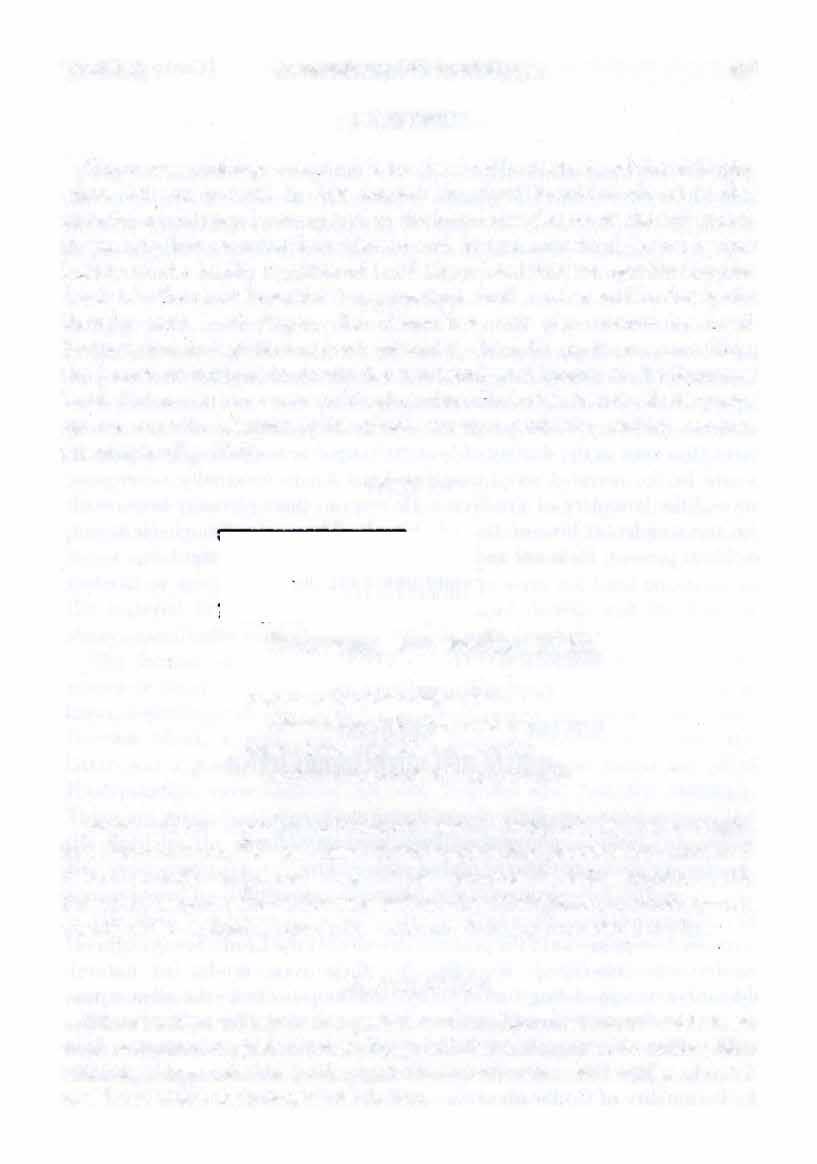
44$1!J(IilG$1(RHIQ·
yasyiinuriiga-pluta-hiisa-riisaliliivaloka-pratilabdha-miinii�
vraja-striyo drgbhir anupravrttadhiyo 'vatasthu� kila krtya-se�ii�
yasya- whose; anu . riiga-attachment; pluta-enhanced by; hiisa-laughter; rasa-humors; lila-pastimes; avaloka-glancing; pratilabdha-obtained thereof; miinii{t-anguished; vraja-striya�-damsels of Vraja; drgbh* - with . the eyes; anupravrtta-following; dhiya�-by intelligence; avatasthu�-sat silently; kila-indeed; krtya-se�ii�-without finishing household duties.

TRANSLATION
The damsels of Vraja, after pastimes of laughter, humor and exchanges of glances, were anguished when K�f!IJ.a left them. They used to follow Him with their eyes, and thus they sat down with stunned intelligence and could not finish their household duties.
Text 14] Remembrance of Lord Kr�r:ta 65
PURPORT
1:
��:� tttta!•n: 11�\lll
4\it�tO
PURPORT
In His boyhood at Vrndavana, Lord Kr�rya was notorious as a teasing friend in transcendental love to all the girls His age. His love for them was so intense that there is no comparison to that ecstasy, and the damsels of Vraja were so much attached to Him that their affection excelled that of the great demigods like Brahma and Siva. Lord Kr�rya finally admitted His defeat before the transcendental affection of the gopis and declared that He was unable to repay them for their unalloyed affection. Although the gopis were seemingly anguished by the Lord's teasing behavior, when Kr!il).a would leave them they could not tolerate the separation and used to follow Him with their eyes and minds. They were so stunned by the· situation that they could not finish their household duties. No one could excel Him even in the dealing of love exchanged between boys and girls. It is said in the revealed scriptures that Lord Kr�I'Ja personally never goes beyond the boundary of Vrndavana. He remains there eternally because of the transcendental love of the inhabitants. Thus even though He is not visible at present, He is not away from Vrndavana for a moment.
.TEXT 15


�fd·i{f�qr��: m
q(ICI�it +l'(fd�l
�sfqami'tlltFIF{�: II��II
sva-·santa-rupe�v itaraitf. sva-rupair
abhyardyamanefiv anukampitatmii paravareso mahad-arhsa-yukto hy ajo 'pi jato bhagaviin yathiignitt
sva-santa-rupe�u-unto the peacefuldevotees of the Lord; itaraifl-others, nondevotees; sva-riipaitf.-according to their own modes of nature; abhyardyamiine�u-being harrassed by; anukampita-iitmii-the all-compassionate Lord; pariivara-spiritual and material; isafl-controller; mahatamsa-yuktafl-accompanied by the plenary portion of mahat-tattva; hicertainly; aja{l-the unborn; api-although; jiita{l-be born; bhagaviinthe Personality of Godhead; yathii-as if; agnifl-the fire.



66 Srimad-Bhagavatam [Canto 3, Ch. 2
The Personality of Godhead, the all-compassionate controller of both the spiritual and material creations, is unborn, but when there is friction between His peaceful devotees and persons who are ·in thematerial modes of nature, He takes birth,just like fire, accompanied by the mahat-tattva.

PURPORT
The devotees of the Lord are by nature peaceful because they have no material hankering.A liberated soul has no hankering,and therefore he has no lamentation. One who wants to possess also laments when he loses his possession. Devotees have no hanke�;ings for material possessions and no hankerings for spiritual salvation. They are situated in the transcendental loving service oftheLordas a matter of duty,and they do not mind where they are or how they have to act. Karmis, jiiiinis and yogis all hanker to possess some material or spiritual assets. Karmis wantmaterial possessions, jiiiinis arid yogis want spiritual possessions, but devotees donot want any material or spiritual assets. They-want only to serve the Lord anywhere in the material or spiritual worlds that the Lord desires, and the Lord is always specifically compassionate towards such devotees.
The karmis, jiiiinis and yogis have their particular mentalities in the modes of nature, and therefore they are called !.tara or nondevotees. These itaras, including even the yogis, sometimes harass the devotees of the Lord. Durvasa Muni, a great yogi, harassed Maharaja Ambari�a because the latter was a great devotee of the Lord. And the great karmi and jiiiini Hiratlyakasipu even harassed his own Vai�pava son, Prahlada Maharaja. There are many instances of such harassment of the peaceful devotees of the Lord by the itaras. When such friction takes place, the Lord, out of His great compassion towards His pure devotees, appears in person, accompanied by His plenary portionscontrolling the mahat-tattva.
The Lordis everywhere, both in the material and spiritual domains, and He appears for the sake of His devotees whenthere is friction between His devotee and the nondev�tee. As electricity is generated by friction of matter anywhere and everywhere, similarly, the Lord, being all-pervading, appears because of the friction of devotees and nondevotees. When Lord Kr��a appears on a mission, all His plenary portions accompany Him. When He appeared as the son of Vasudeva, there were differences of opinions about His incarnation. Some said, "He is the Supreme
Text 15) Remembrance of Lord Kr��a 67
TRANSLATION
Personality of GodhP.ad." Some said, "Heisan incarnation of NarayatJ.a," and others said, "He is the incarnation of K�irodakasayi Vi�J;Ju." But actually He is the original Supreme Personality of Godhead- Kr§�tas tu bhagaviin svayam- and Narayara, the puru:�as and all other incarnations accompany Him to function as different parts of His pastimes. Mahatamsa-yukta� indicates that He is accompaniedby the puru�as, whocreate the mahat-tattva. It is confirmed in the Vedic hymns, mahiintam vibhum iitmiinam.
Lord Kr�t:J.a appeared, just like electricity, when there was friction between Kamsa and Vasudevaand Ugrasena. Vasudeva and Ugrasena were the Lord's devotees, and Kamsa,a representative of the karmis and jniinis, �asanondevotee.Kr�t:ta,as He is,iscomparedtothesun. Hefirstappeared from the ocean of the womb of Devaki, and gradually He satisfied the inhabitants of the places surrounding Mathura,just as thesun enlivens the lotus flower in the morning. Gradually rising up to the meridian of Dvaraka, the Lord set like the sun, placing everything in darkness, as describedby Uddhava. ·
TEXT 16

miim khedayaty etad ajasya janmavi{lambanam yad-vasu.deva-gehe vraje ca viiso 'ri-bhayiid iva svayam pu.riid vyaviitsid yad-ananta-virya�
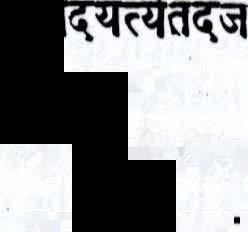
miim-to me; khedayati- gives me distress; etat-this; ajasya-of the unborn; janma-birth;vi{lambanam-bewildering;yat-that;vasudeva-gehein the home of Vasudeva; vraje- in Vrndavana;ca-also; viisa�- inhabitation; ari- enemy; bhayiit- beca use of fear; iva-as if; svayam- Himself; p uriit-from Mathura Puri; vyaviitsi t -fled; yat-one who is; anantav'irya�- unlimitedly powerful.

TRANSLATION
When I think of Lord Kr!!Qa-how He was born in the prison house of Vasudeva although He is unborn, how He went away from His father's protection to Vraja and lived there incognito out of fear of the enemy,
68 Srimad-Bhagavatam [Canto 3, Ch. 2
�
II��II
'If @G;ti��BG;Ilt� �N�kl;j Qiit(I �� :q' t�Rit�
� �1:11�6lt1G:il�'Tti:
and how, although He is unlimitedly powerful, He fled from Mathura in fear-all these bewildering incidences give me distress.
PURPORT
Because Lord Sri Kr�Da is the original person.from whom everything and everyone has emanated-aha m sarvasya prabhava� (Bg. 10.8), janmiidy asya yata� (Vs. 1.12)-nothing can be equal to or greater than Him. The Lord is supremely perfect, and whenever He enacts His tran· scendental pastimes as a son, a rival or an object of enmity, He plays the part so perfectly that even pure devotees like Uddhava are bewildered. For example, Uddhava knew perfectly well that Lord Sri Kr�Da is eternally existent and can neither die nor disappear for good, yet he lamented for Lord Kr�l)a. All these events are perfect arrangements to give perfection to His supreme glories. It is for enjoyment's sake. Whena father plays with his little son and the father lays down on the floor as if defeated by the son, it is just to give the little son pleasure, and nothing more. Because the Lord is all-powerful, it is possible for Him to adjust opposites such as birth and no birth, power and defeat, fear and fearlessness, etc. A pure devotee knows very well how it ispossible for the Lord to adjust opposite things, but he laments for the nondevotees who, not knowing thesupreme gloriesof the Lord, think of Him as imaginary simply because there are so many apparently contradictory statements in the scriptures. Factually there is nothing contradictory, but everything is possible when we understand the Lord as the Lord and not as one of us, with all our imperfection.
TEXT 17

.r-iff« �(f: �ijt • � � fffi:l
ift��'i)d\;ctl(II�"II
dunoti ceta� smarato mamaitad yad iiha piidiiv abhivandya pitro� tiitiimba kamsiid uru-sankitiiniim pras"idatam no 'krta-n�krt"iniim
dunoti-it gives me pain; ceta�-heart; smarata�-while thinking of; mama-my; etat-this;yat-asmuchas; iiha-said ; piidau - feet ; abhivandya-



Text 17] Remembrance of Lord Kr�r:ta 69
worshiping; pitro �-of the parents; tiita- my dear father; amba- my dear mother; kamsiit-out of Kamsa's; urn-great; sankitiiniim-of those who are afraid; pras idatam- be pleased with; nafi.-our; akrta-nol executed; ni§krtiniim-duties to serve you. ·
TRANSLATION
Lord Kr�t:ta begged pardon from His parents for Their [Kr�qa's and Balarama's) inability to serve their feet, due to being away from home because of great fear of Kamsa. He said, "0 mother, 0 father, please excuse Us for this inability." All this behavior of the Lord gives me pain at heart.
PURPORT
It appears that Lord Kr�l)a and Baladeva were both very greatly afraid of Kamsa, and therefore They had to hide Themselves. But if Lord Kr�t;�a and Baladeva are the Supreme Personality of Godhead, how was it possible that They were afraid of Kamsa? Is there any.contradiction in such statements? Vasudeva, due to his great appreciation for Kr�t;�a, wanted to give Him protection. He never thought that Kr�t;�a was the Supreme Lord and could protect Himself; he thought of Kr�qa as his son. Because Vasudeva was a great devotee of the Lord, he did not like to think that Kr�l)a might be killed like his other children. Morally, Vasudeva was bound to deliver Kr�t;�a to the hands of Kamsa because he had promised to turn over all his children. But out of his great love for Kr�t;�a he broke his promise, and the Lord was very pleased with Vasudeva for his transcendental mentality. He did not want to disturb the intense affection of Vasudeva, and thus He agreed to be carried by His father to the house of Nanda and Yasoda. And just to test the intense love of Vasudeva, Lord Kr�t,la fell down in the waters of the Yamuna while his father was crossing the river. Vasudeva became mad after his child as he tried to recover Him in the midst of the rising river.
These are all glorified pastimes of the Lord, and there is no contradiction in such manifestations. Since Kr�t;�a is the Supreme Lord, He was never afraid of Kamsa,but to please His father He agreed to be so. And the most brilliant part of His supreme character was that He begged pardon from His parents for being unable to serve their feet while absent from home because of fear of Kamsa. The Lord, whose lotus feet are worshiped by demigods like Brahm a and Siva, wanted to worship thefeet of Vasudeva; Such instruction by the Lord to the world is quite appropriate. Even if one is the Supreme Lord, one must serve his parents. A son is indebted to

70 Srimad-Bhagavatam (Canto 3, Ch. 2
his parents in so many ways, and it is the duty of the son to serve his parents, however great the son may be. Indirectly, Kp)r:Ja wanted to teach the atheists who do not accept the supreme fatherhood of God, and they may learn from this action how much the Supreme Father has to be respected. Uddhava was simply struck with wonder by such glorious behavior of the Lord, and he was very sorry that he was unable to go with Him.
TEXT 18

ko va amu§yiinghri-saroja-rel)um vismartum "i.fita pumiin vijighran yo visphurad-bhru-vitapena bhumer · bhiiram krtiintena tirascakiira
ka�-who else; vii-either; amu§ya-the Lord's; anghri-feet; sarojarel)um-dust of the lotus; vismartum - forge tting; iSita-may be able; pumiin-person; vijighran-smelling; ya�-one who; vi s phurat-expanding; bhru-vitapena-by the leaves of the eyebrows; bhume� - of the earth; bhiiram-burden; krtii-antena-by death blows;tirascakara-executed.



TRANSLATION
Who, after smelling the dust of His lotus feet even once, could ever forget it? Simply by expanding the leaves of His eyebrows [Kr�f}a] has given the death blow to those whowere burdening the earth.
PURPORT
Lord Kr!lr:Ja cannotbe accepted as oneof the human beings,even though He played the role of an obedient son. His actions were so extraordinary that by the simple raising of His eyebrows He could deliver death blows to those who were burdening the earth.
Text 19) Remembrance of Lord Kr�f}a 7l
ti�
� en Fm��rij � AAJr.tl q) Fl���q;r �lllt
RR� II�<=II
lR�� �lt
TEXT 19 -m
�pi fl:qa)sfit ftif(: I
dr�ta bhavadbhir nanu riijasuye
caidyasya kr§I'Jam dvi�ato 'pi siddhil).
yiim yogina� samsprhayanti samyag yogena kas tad viraham saheta
dr�tii-it has been seen; bhavadbhil).-by your good self;nann-of course; riijasii,ye- in the assembly of the Rajasuya sacrifice performed by Maharaja Yudhi�thira; caidyasya-of the King of Cedi (Sisupala); kr§ryamunto Kr�l)a; dvi§ata�-envying ; api -in spite of; siddhi�-success; yamwhich; yogina�-the yogis; samsprhayanti- verily desire; samyak- fully; yogena-by performance of yoga; ka�-who; tat - His ;uiraham- separation ; saheta-can tolerate.
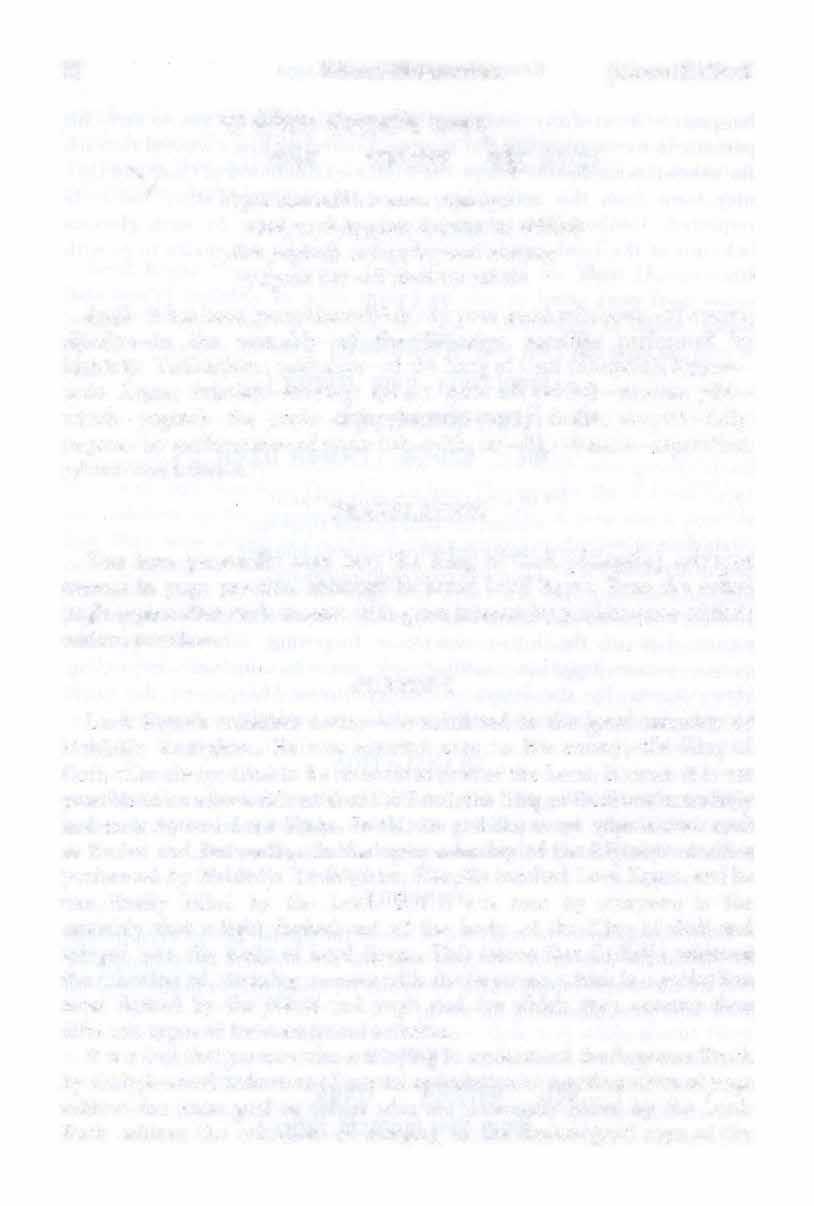
TRANSLATION
You have personally seen how the King of Cedi [Sisupala) achieved success in yoga practice, although he hated Lord Kr&r;ta. Even the actual yogis aspire after such success with great interest by performance of their various practices.
PURPORT
Lord Kr�l)a's causeless mercy was exhibited in the great assembly of Maharaja Yudi�thira. He was merciful even to His enemy, the King of Cedi, who alwaystried to be an envious rival of the Lord. Because it is not possible tobe a bona fide rival of the Lord, the King of Cedi was extremely malicious toward Lord Kr&J:ta. In this he was like many other asuras, such as Kamsa and J arasandha. In the open assembly of the Rajasiiya sacrifice performed by Maharaja Yudhi�thira, Sisupala insulted Lord Kr�r;ta, and he was finally killed by the Lord. But it was seen by everyone in the assembly that a light flashed out of the body of the King of Cedi and merged into the body of Lord Kr�J:ta. This means that Cediraja achieved the salvation of attaining oneness with the Supreme, which is a perfection most desired by the j;iiin"is and yogis and for which they execute their different typesof transcendental activities.
It is a fact thatpersons who are trying to understand theSupreme Truth hy theirpersonal endeavorsof mental speculationor mysticpowers of yoga achieve the same goal as others who are personally killed by the Lord. Roth achieve the salvation of merging in the brahmajyoti rays of the
72
� �;{
Srimad-Bhagavatam t(j �fir;{: «��
�tm nc:r ������
[Canto 3, Ch. 2
transcendental body of the Lord. The Lord was merciful even to His enemy, and the success of the King of Cedi was observed by everyone who was present in the assembly. Vidura was also present there, and therefore Uddhava referred the incident to his memory.
TEXT 20

q((+JI!lWf
II� o II
tathaiva canye nara-loka-v"irii ya iihave knrya-mukhiiravindam netra* pibanto nayaniibhiriimam piirthiistra-puta[t padam iipur asya
tathii-as also; eva ca-and certainly; anye-others;nara-loka-human society;v"irii[l,-fighter;ye-those;ahave-onthe battlefield (of Kuruk�ctra); knr. a-Lord Kr�1.1a's; mukha-aravindam-face like a lotus flower;netraihwith the eyes;pibanta(t-while seeing;nayana-a.bhiriirnan-very pleasing to the eyes; piirtha-Arj una; astra-puta[t-purified; padarn-abode; iipu�tachieved; asya-of Him.
TRANSLATION
Certainly others who were fighters on the Battlefield of Kuruk�etra were purified by the onslaught of Arjuna's arrows, and while seeing the lotuslike face of Kr�r:ta, so pleasing to the eyes, they achieved the abode ofthe Lord.
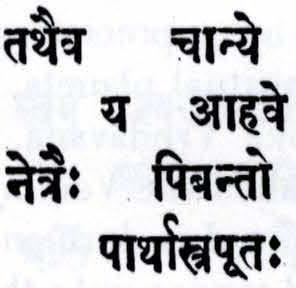
PURPORT
The Supreme Personality of Godhead, Lord Sri Kr�t:Ja, appears in this world for two missionary purposes: to deliver the faithful, and to annihilate the miscreants. But because the Lord is absolute, His two different kinds of actions, although apparently different, are ultimately one and the same. His annihilation of a person like Sisupala is as auspicious as His actions for the protection of the faithful. All the warriors who fought against A� una but who were able to see the lotuslike face of the Lord on the battlefront achieved the abode of the Lord, exactly as the devotees of the Lord do. The words "pleasing to the eyes of the seer" are very significant. When the warriors from the other side of
Text 20) Remembrance of Lord Kr�r:ta 73
WR�w.fiu Pti<ctid��( I �
the battlefield saw Lord Kr�!)a at the front, they appreciated His beauty, and their dormant instinct of love of God was awakened. Sisupala saw the Lord also, but he saw Him as his enemy, and his love was not awakened. Therefore Sisupala achieved oneness with the Lord by merging in the impersonal glare of His body, called the brahmajyoti. Others, who were in the marginal position, being neither friends nor enemies but slightly in love of Godhead by appreciating the beauty of · H1s face, were at once promoted to the spiritual planets, the Vaikw)thas. The Lord's personal abode is called Goloka Vrndavana, and the abodes where His plenary expansions reside are called the Vaiku!)�has, where the Lord is present as Naraya!)a. Love of Godhead is dormant in every living entity, and the entire process of devotional service unto the Lord is meant for awakening this dormant, eternal love of Godhead. But there are degrees of such transcendental awakening. Those whose love of God is awakened to the fullest extent go back to Goloka Vrndavana planet in the spiritual sky, whereas persons who have just awakened to love of Godhead by accident or association are transferred to the Vaiku!)�ha planets. Essentially there is no material difference between Goloka and Vaiku!)�ha, but in the Vaiku!)�has the Lord is served in unlimited opulence, whereas in Goloka the Lord is served in natural affection. This love of God is awakened by the association of pure devotees of the Lord. Here the word piirthiistra-puta{l. is significant. Those who saw the beautiful face of the Lord on the Battlefield of Kuruk�etra were purified first by Arjuna when he made his onslaught with arrows. The Lord appeared for the mission of diminishing the burden of the world, and Arjuna was assisting the Lord by fighting on His behalf. Arjuna personally declined to fight, and the whole instruction of the Bhagavad-gitii was given to Arjuna to engage him in the fight. As a pure devotee of the Lord, Arjuna agreed to fight in preference to his own decision, and thus Arjuna fought to assist the Lord in His mission of diminishing the burden of the world. All the activities of a pure devotee are executed on behalf of the Lord because a pure devotee of the Lord has nothing to do for his personal interest. Arjuna's killing was as good as killing by the Lord Himself. As soon as Arjuna shot an arrow at an enemy, that enemy became purified of all material contaminations and became eligible to be transferred to the spiritual sky. Those warriors who appreciated the lotus feet of the Lord and saw His face at the front hadtheir dormant love of God awakened, and thus they were transferred at once to Vaiku!)thaloka, not to the impersonal state of brahmajyoti as was Sisupala. SisupiHa died without appreciating the Lord, while others died with appreciation of the Lord. Both were

74 Srimad-Bhagavatam [ Canto 3, Ch. 2
transferred to the spiritual sky, but those who awakened to love of God were transferred to the planets of the transcendental sky.
Uddhava seemingly lamented that his own position was less than that of the warriors on the Battlefield of Kuruk�etra because they had attained to Vaikut;�tha, whereas he remained to lament the disappearance of the Lord.
TEXT 21


�
�e•wt•Ri�ll4:'5qm:

'1ft �Mri�:
fitiflai\aq�6QIG\fta: "��11
svayarh tv asamyiitiSayas tryadhisa�
sviiriijya-lak�myiipta-samastakiima� balirh haradbhis cira-loka-piila*
kirita-koty el)itapiidapitha�
svayam-Himself; tu-but; asamya-unique; atisaya�-greater; triadhl.�a �- Lord of the three; sviiriijya-independent supremacy; lak�mifortune; apta- achieved; samastakama�-all desires; balim-worshiping paraphernalia; haradbh*-offered by; cira-loka-piila*-by the eternal maintainers of the order of creation; kirita-koti-millions of helmets; el)ita-piida-pitha�-feet honored by prayers.
TRANSLATION
Lord Sri KHI).a is the Lord of all kinds of threes and is independently supreme by achievement of all kinds of fortune. He is worshiped by the eternal maintainers of the creation, who offer Him the paraphernalia of worship by touching their millions of helmets to His feet.
PURPORT
Lord Sri Kr�qa is so mild and merciful, as described in the above verses, andyetHe is the Lord of allkinds of threes.He is the Supreme Lord of the three worlds, the three qualities of material nature and the three puru�as (Karal).odakasayi, Garbhodakasayi and K�1rodakasay1.Vi�t:tu). There are innumerable universes, and in each and every universe there are different manifestations of Brahmii, Vi�t:tu and Rudra. Besides that, there is the Se�a-murtiwho bears all the universes on His hoods. And Lord Kr�l)a is the Lord of all of them. As the incarnation of Manu,He is the original source
Text 21) Remembrance of Lord Kr�l).a 75
of all Manus in innumerable universes. Each universe has manifestations of 540,000 Manus. He is the Lord of the three principal potencies, namely cit-sakti, miiyii-sakti and tatasthii-sakti, and He is the complete master of six kinds of fortune-wealth, strength, fame, beauty, knowledge and renunciation. There is none who can excel Him in any matter of enjoyment, and certainly there is no one greater than Him. No one is equal to or greater than Him. It is the duty of everyone, whoever and wherever one may be, to surrender completely unto Him. It is not wonderful, therefore, that all the transcendental controllers surrender to Him and make all offerings of worship.
TEXT 22
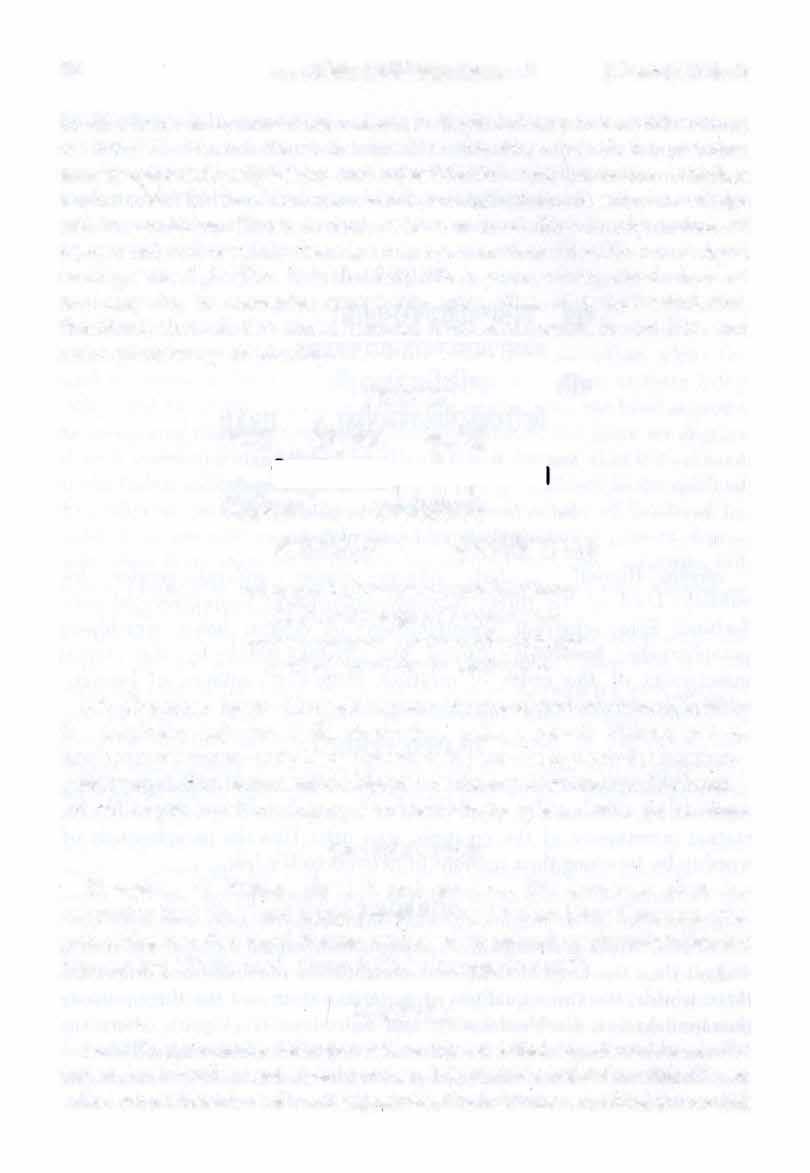
tat tasya kainkaryam alam bhrtiinno vigliipayaty anga yad ugrasenam
ti�than ni�ar;r;am parame�thi-dhi�r;ye nyabodhayad deva nidhiirayeti
tat-therefore; tasya- His; kainkaryam-service; alam-of course; bhrtiinthe servitors; na�-us; vigliipayati-gives pain; anga-0 Vidura; yat-as much as; ugrasenam-unto King Ugrasena; ti�than-being seated; n�ar;r;amwaiting upon Him; parame�thi-dhi��ye-on the royal throne; nyabodhayatsubmitted; deva-addressing my Lord; nidhiiraya-please know it; iti-thus.

TRANSLATION
Therefore, 0 Vidura, does it not pain us, His servitors, when we remember that He [Lord l<t!!llaJ used to stand before King Ugrasena, who was sitting on the royal throne, .and used to submit explanations before him, saying, "0 My lord, please let it be known to you"?
PURPORT
Lord Kr�Qa's gentle behavior before His so-called superiors such as His father, grandfather and elder brother, His amiable behavior with His socalled wives, friends and contemporaries, His beha�ior as a child before His
76 Srimad-Bhagavatam [Canto 3, Ch. 2
� 4t4'i� � A•8Nq€ttf 1 M8�,wf �� � �������
mother Yasoda, and His naughty dealings with His young girl friends cannot bewilder a pure devotee like Uddhava. Others, who are not devo· tees, are bewildered by such behavior of the Lord, who acted just like a human being. This bewilderment is explained by the Lord Himself in the Bhagavad-gitii as follows:
avajiinanti miirh mu{lha
miinu§trh tanum iisritam
pararh bhavam ajii.nanti
mama bhuta-mahesvaram (Bg. 9.11)

Persons with a poor fund ofknowledge belittle the Personality of Godhead, Lord Krey11a, not knowing His exalted positionas the Lord of everything. In Bhagavad-gitii the Lord has explained His position clearly, but the demoniac atheistic student squeezes out an interpretation to suit his own purpose and misleads unfortunate followers into the same mentality. Such unfortunate persons merely pick up some slogans from the great book of knowledge, but are unable to estimate the Lord as the Supreme Personality of Godhead. Pure devotees like Uddhava, however, are never misled by such atheistic opportunists.
TEXT 23

q 'AiJ � \{'f;cEfMStli
f('l44 P'l44G>�('llv.f1 ���m�R«rtm�
aho baki yarh stana-kiila-kutarh
jigharhsayapayayad apy asadhvt
lebhe gatirh dhatryucitarh tato 'nyarh
karh va dayalurh saraf!arh vrajema
aho-alas; baki-the she-demon (Piitana); yam-whom; stana-breast; kala-dead; kutam- poison;jigharhsaya-out ofenvy;apayayat-nourished; · api-although; asii.dhv"i-unfaithful; lebhe-achieved; gatim-destination; dhatryucitam-just suitable for the nurse; tata�-beyond whom; anyamother; kam-who else; va-certainly; dayalum-mercifui; saraf!am-sheltcr; vrajema-shall I take.




Text 23) Remembrance of Lord Kr�J].a 77
" � � m m ������
Alas, how shall I take shelter of one more merciful than Him who granted the position of mother to a she-demon [Putana] although she was unfaithful and she prepared deadly poison to he sucked from her breast?
PURPORT
Here is an example of the extreme mercy of the Lord, even to His enemy. It is said that a noble man accepts the good qualities of a person of doubtful character, j ust as one accepts nectar from a stock of poison. In His babyhood, He was administered deadly poison by Putana, a shedemon who tried to kill the wonderful baby. And because she was a demon, it was impossible for her to know that the Supreme Lord, even though playing the part of a baby, was no one less than the same Supreme Personality of Godhead. His value as the Supreme Lord did notdiminish upon His becoming a baby to please His devotee Y asoda. The Lord may assume the form of a baby or a shape other than that of a human being, butit doesn'tmake the slightest difference;He is alwaysthe same Supreme. A living creature, however powerful he may become by dint of severe penance, can never become equal to the Supreme Lord.
Lord Kfl)l)a accepted the motherhood of Putana because she pretended to be an affectionate mother, allowing Krfll)a to suck her breast. The Lord accepts the least qualification of the living entity and awards him the highest reward. That is the standard of His character. Therefore, who but the Lord can be the ultimate shelter?
TEXT 24

W\liii��'IN6RI'(11�'«111

manye 'suran bhiigavatiirhs try-adhise
sarhrambha-miirgiibhinivifita-cittiin ye sarhyuge 'cak�ata tiirk�ya-putram
amse sunabhayudham apatantam
manye-1 think; asuriin-the demons; bhiigavatan- great devotees; tri-adhiSe·-unto the Lord of the threes; sarhram bha-enmity; miirga-by the way of; abhiniv�ta-cittan- absorbed in thought;ye-those; samyuge-

78 Srimad-Bhigavatam [Canto 3, Ch. 2
TRANSLATION
�
tr �� ��-
1414l'll6f�i�tft� �!�
in the fight; acak�ata-could see; tiirk�ya-putram-Garw).a, the carrier of the Lord; arhse-on the shoulder; suniibha-the wheel; ayudham-one who carries the weapon; iipatantam-coming forward.

TRANSLATION
I consider the demons, who are inimical toward the Lord, to be more than the devotees because while fighting with the Lord, absorbed in thoughts of enmity, they are able to see the Lord carried on the shoulder of Garu<Ja, the son of Tark�ya [Kasyapa], and carrying the wheel weapon in His hand.
PURPORT
The asuras who fought against the Lord face to face got salvation due to their being killed by the Lord. This salvation of the demons is not due to their being devotees of the Lord; it is because of the Lord's causeless mercy. Anyone who is slightly in touch with the Lord, somehow or other, is greatly benefited, even to the point of salvation, due to the excellence of the Lord. He is so kind that He awards salvation even to His enemies because they come into contact with Him and are indirectly absorbed in Him by their inimical thoughts. Actually, the demons can never be equal to the pure devotees, but Uddhava was thinking in that way because of his feelings of separation. He was thinking that at the last stage of his life he might not be able to see the Lord face to face as did the demons. The fact is that the devotees who are always engaged in the devotional service of the Lord in transcendental love are rewarded many hundreds and thousands of times more than the demons by being elevated to the spiritual planets, where they remain with the Lord in eternal, blissful existence. The demons and impersonalists are awarded the facility of merging in the brahmajyot"i effulgence of the Lord, whereas the devotees areadmitted into th� spiritual planets. For comparison, one can just imagine the difference between floating in space and residing in one of the planets in the sky. The pleasure of the living entities on the planets is greater than that of those who have rio body and who merge with the molecules of the sun's rays. The impersonalists, therefore, are no more favored than the enemies of the Lord; rather, they are both on the same level of spiritual salvation.

Text 25] Remembrance of Lord Kr�':la 79
TEXT 25 ctu\C«(q �wn ilftm �\il..l'l..� 1. f'*t'lfl���: ����: 11��11
vasudevasya-of the wife of Vasudeva; devakyiim-in the womb of Devaki; jiita�-born of; bhoja-indra-the King of the Bhojas; bandhane- in the prison house; cikir�u�- for doing; bhagaviin- the Personality of Godhead; asyii�-of the earth; sam-welfare; ajena-by Brahmii; abhiyiicita�being prayed for.


TRANSLATION
The Personality of Godhead, Lord Sri Kr�r;ta, being prayed to by Brahrna to bring welfare to the earth, was begotten by Vasudeva in the womb of his wife Devaki in the prison of the King of Bhoja.
PURPORT
Although there is no difference between the Lord's pastimes of appearance and disappearance, the devotees of the Lord do not generally discuss the subject matter of His disappearance. Vidurainquired indirectly from Uddhava about the· incidence of His disappearance, since he asked him to relate Kr§TJa-kathii, or topics on the history of Lord Kr�rya. Thus Uddhavabegan the topicsfrom the verybeginningof His appearance as the son of Vasudeva and Devaki in the prison of Kamsa, the King of the Bhojas, at Mathura; The Lord has no business in this world, but when He is so requested by devotees like Brahmii, Hedescendson theearth forthe welfare of the entire universe. This is stated in Bhagavad-gitii (4.8): paritriir-iiya siidhiiniim viniisiiya ca du§krtiim dharma-samsthiipaniirthiiya sambhaviimi yugeyuge.

80
[Canto 3, Ch. 2
Srirnad-Bhagavatarn vasudevasyadevakyii.m jiito bhojendra-bandhane cikir�urbhagaviinasyii.� samajeniibhiyii.cita�
TEXT 26 m m. mrlfil�a• 1 1(4f;IC(� (UU�d'SI �: (N�� 11��11 tato nanda-vrajamita� pitriikamsiidvibibhyatii ekiidasasamiistatra g"lujhiirc* sabalo 'vasat
tata�-thereafter; nanda-vrajam-cow pastures of Nanda Maharaja; ita�being brought_ up; pitrii-by His father; kamsiit-from Kamsa; vibibhyatii-being afraid of; ekiidasa-eleven; samii�-years; tatra-therein; gutjha-arc*-covered fire; sabala�-with Baladeva; avasat-resided.


TRANSLATION
Thereafter, His father, being afraid of Kari:tsa, brought Him to the cow pastures of Maharaja Nanda, and there He lived for eleven years like a covered flame with His elder brother Baladeva.
PURPORT
There was no necessity of the Lord's being dispatched to the house of Nanda Maharaja out of fear of Kamsa'sdetermination to kill Himas_soon as He appeared. It is the business of the asuras to try to kill the Supreme Personality of Godhead or to prove by all means that there is no God or that Kw�a is an ordinary human being and not God. Lord Kr�Qa is not affected by such determination of men of Kamsa's class, but in order to play the role of a child He agreed to be carried by His father to the cow pastures of Nanda Maharaja because Vasudeva was afraid of Kamsa. Nanda Maharaja was due to receive Him as his child, and Yasodamay1 was also to enjoy the childhood pastimes of the Lord, and therefore to fulfill everyone's desire, He was carried from Mathura to Vrndavana just after His appearance in the prison house of Kamsa. He lived there for eleven years and completed all His fascinating pastimes of childhood, boyhood and adolescence with His elder brother, Lord Baladeva, His first expansion. Vasudeva's thought of protecting Kr�qa from the wrath of Kamsa is part of a transcendental relationship. The Lord enjoys more when someone takes Him as his subordinate son who needs the protection of a father than He does when someone accepts Him as the Supreme Lord. He is the father of everyone, and He protects every.one, but when His devotee takes it for granted that the Lord is to be protected by the devotee's care, it is a transcendental joy for the Lord. Thus when Vasudeva, out of fear of Kamsa, carried Him to Vrndavana� the Lord enjQyed it; otherwise, He had no fear from Kamsa or anyone else.
Text 27) Remembrance of Lord Kr�t:ta 81
TEXT 27 qt\'� �eM(fflf� CH4«fl&: I ttawnq�" �tijetMal!,fiN ����u
parito vatsapair vatsiims
ciirayan vyaharad vibhufl
yamunopavane kujad
dvija-sankulitiinghripe
paritafl-surrounded by; vatsapaifl-cowherd boys; vatsiin-calves; ciirayan-herding, tending; vyaharat-enjoyed by traveling; vibhufl-the Almighty; yamuna-the Yamuna River; upavane-gardens on the shore; . kujat-vibrated by the voice; dvija-the twice-born birds; sankulitadensely situated; anghripe-trees.
TRANSLATION

In His childhood, the Almighty Lord was surrounded-by cowherd boys and calves, and thus He traveled on the shore of the Yamuna River, through gardens densely covered with trees and filled with vibrations of chirping birds.
PURPORT
Nanda Maharaja was a landholder for King Kamsa, but because by caste he was a vaisya, a member of th.e mercantile and agricultural community, he maintained thousands of cows. It is the duty of the vaisyas to give protection to the cows, just as the k�atriyas are to give protection to the human beings. Because the Lord was a child, He was put in charge of the calves with His other cowherd boy friends. These cowherd boys were great r�is and yogis in their previ ous births, and after many such pious births, they gained the association of the Lord and could play with Him on equal terms. Such cowherd boys never cared to know who Kr�l)a was, but they played with Him as a most intimate and lovable friend. They were so fond .of the Lord that at night they would only think of the next morning when they would be able to meet the Lord and go together to the forests for cowherding.
The forests on the shore of the Yamuna are all beautiful gardens full of trees of mango, jackfruit, apples, guava, oranges, grapes, berries, palinfruit and so many other plants and fragrant flowers. And because the forest was on the bank of the Yamuna, naturally there were ducks, cranes and peacocks on the branches ofthe trees. All these trees and birds and beasts were pious living entities born in the transcendental abode of V rndavana just to give pleasure to the Lord and His eternal associates, the cowherd boys.
82
Srimad-Bhagav-atam
[Canto 3, Ch. 2
While playing like a small child with His associates, the Lord killed many demons, including Aghasura, Bakasura, Pralambasura and Gardabhasura. Although He appeared at Vrndavana just as a boy, He was actually like the covered flames of a fire. As a small particle of fire can kindle a great fire with fuel, so the Lord killed all these great demons, beginning from His babyhood in the house of Nanda Maharaja. The land of Vrndavana, the Lord's childhood playground, still remains today, and anyone who visits these places enjoys the same transcendental bliss, although the Lord is not physically visible to our imperfect eyes. Lord Caitanya recommended this land of the Lord as identical with the Lord and therefore worshipable by the devotees. This instruction is taken up especially by 'the followers of Lord Caitanya known as the Gaw;fiya Vai�J;Javas. And because the land is identical with the Lord, devotees like Uddhava and Vidura therefore visited these places five thousand yea;s ago in order to have direct contact with the Lord, visible or not visible. Thousands of devotees of the Lord are still wandering in these sacred places of Vrndavana, and all of them are preparing themselves to go back home, back to Godhead.
TEXT 23

kaumiirirh darsayarhs ce�tiirh prek�a1J"iyiirn vrajaukasiim rudann iva hasan mugdhabiila-sirhhiivalokana[l.
kaumiir"im- just suitable to childhood; darsayan - used to show; ce�tiimactivities; prek�an"iyiim- worthy to be seen; vraja-okasiim-by the inhabitants of the land of Vrndavana; rudan- crying; iva- just like; hasanlaughing; mugdha- struck with wonder;biila-sirhha-lion cub; avalokana[l.looking like that.
TRANSLATION
When the Lord displayed His activities just suitable for childhood, He was only visible to the residents of Vrndavana. Sometimes He would cry and sometimes laugh, just like a child, and while so doing He would appear like a lion cub.
Text 28] Remembrance .of Lord Kr�Qa 83
��� �ufttaf a\ill'MII'{1 � ��:11��1
PURPORT
If anyone wants to enjoy the childhood pastimes of the Lord, then he has to follow in the footsteps of the residents of Vrajavas1 like Nanda, Upananda and other parental inhabitants. A child may insist on having something and cry like anything to get it, disturbing the whole neighborhood, and then immediately after achieving the desired thing, he laughs. Such crying and laughing is enjoyable to the parents and elderly members of the family, so the Lord would simultaneously cry and laugh in this way and merge His devotee parents in the humor of transcendental pleasu_re. These incidents are enjoyable only by the residents of Vraja like Nanda l\Jaharaja, and not by the impersonalist worshipers of Brahman or Paramatma. Sometimes when He was attacked in the forest by demons, Kr!!J:ta would appear struck with wonder, but He looked on them like the cub of a lion and killed them. His childhood companions would also be struck with wonder, and when they came back home they would narrate the story to their parents, and everyone would appreciate the qualities of their Kr!!rya. Child Kr!!J:ta did not belong only to His parents, Nanda and Yasoda, but He was the son of all the elderly inhabitants of Vrndavana and the friend of all contemporary boys and girls. Everyone loved Kr�rya; He was the life and soul of everyone, including the animals, the cows and the calves.
TEXt 29

u � � � �Mdtftt'fl(I
"«W�•II'l �(Uii:�fl('i(\_ ����II
sa eva go-dhanam lak�myii niketam sita-go-vr�am - --
carayann anugan gopan rartad-vertur ariramat
sa�- He (Lord Kr�11a); eva-certainly; go-dhanam -the treasure of cows; lak�myii�- by opulence; niketam- reservoir; sita-go-vr�am-beautifl!l cows and bulls; ciirayan-herding; anugiin-the followers;gopiin-cowherd boys; rartat.Llowing; vertu�-flute; ariramat- enlivened.
TRANSLATION
While herding the very beautiful bulls, the Lord, who was the reservoir of all opulence and fortune, used to blow His flute, and thus He enlivened His faithful followers, the cowherd boys.
84 Srimad-Bhagavatam [Canto 3, Ch . 2
As He grew to six and seven years old, the Lord was given charge of looking after the cows and bulls in the grazing grounds. He was the son of a well-to-do landholder who owned hundreds and thousands of cows, and according to Vedic economics, one is considered to be a rich man by the strength of his store of grains and cows. With only these two things, cows and grain, humanity can solve its eating problem. Human society needs only sufficient grain and sufficient cows to solve its economic problems. All other things but these two are artificial necessities created by man to kill his valuable life at the human level and waste his time in things which are riot needed. Lord Kr�!)a, as the teacher of human society, personally showed by His acts that the mercantile community or the vaisyas should herd cows and bulls and thus give'protection to the valuable animals. According to smrti regulation, the cow is the mother and the bull the father of the human being. The cow is the mother because just as one sucks the breast of one's mother, human society takes cow's milk. Similarly, the bull is the father of human society because the father earns for the children just as the bull tills the ground to produce food grains. Human society will kill its spirit of life by killing the father and the mother. It is mentioned herein that the beautiful cows and bulls were of various checkered colors-red, black, green, yellow, ash, etc. And because of their colors and healthy smiling features, the atmosphere was enlivening. Over and above all, the Lord used to play His celebrated flute. The sound vibrated by His flute would give His friends such transcendental pleasure that they would forget all the talks of the brahmananda which is so praised by the impersonalists. These cowherd boys, as will be explained by Sukadeva Gosvam1, were living entities who had accumulated heaps of pious acts and thus were enjoying with the Lord in person and were hearing His transcendental flute. The Brahma-samhita confirms the Lord's blowing His transcendental flute.
venum kvaT)antam aravinda-daliiyatak�am barhavatamsam asitambuda-sundarangam
kandarpa-koti-kaminiya-vise�a-sobham govindam adi-puru§am tam aham bhajami (Rs. 5.30)
Brahmaj1 said, "I worship Govinda, the primeval Lord, who plays on His transcendental flute. His eyes are like lotus flowers, He is decorated with peacock plumes, and His bodily color resembles a fresh black cloud although His bodily features are more beautiful than millions of cupids." These are the special features of the Lord.

Text 29] Remembrance of Lord Kr�l).a 85
PURPORT
TEXT 30

SISililiitiiil(ll\-.�:¥1if�fqu�: 1 �6«4!J/:O'EIIQI1i�: stlc-.¥1Miilll� o II


prayuktan bhoja-rajena mayina� kama-riipirw� lilaya vyanudat-tams tan biila� krit;lanakiin iva
prayuktiin-engaged; bhoja-rajena-by King Kamsa; mayina�-great wizards; kama-riipip,a�-who could assume any form they liked;l"ilaya-in the course of the pastimes; vyanudat-killed; tiin-them; tan-as they came there; bala�-the child; kr"it;lanakan-dolls;iva-like that.
TRANSLATION
The great wizards who were able to assume any form were engaged by the King of Bhoja, Kamsa, to kill Kr�t:ta, but in the course of His pastimes the Lord killed them as easily as a child breaks dolls.
PURPORT
The atheist Kamsa wanted to kill Kr�rya just after His birth. He failed to do so, but later on he got information that Kr�rya was living in Vrndavana at the house of Nanda Maharaja. He therefore engaged many wizards who could perform wond�rful acts and assume any form they liked. All of them appeared before the child Lord in various forms, like Agha, Baka, Putana, Saka�a; Trryavarta, Dhenuka and Gardabha, and they tried to kill the Lord at every opportunity. But one after another, all of them were killed by the Lord as if He were only playing with dolls. Children piay with toy lions, elephants, boars and many similar dolls, which are broken by the children in the course of their playing with them. Before the Almighty Lord, any powerful living being is just like a toy lion in the hands of a playing child. No one can excel God in any capacity, and therefore no one can be equal to or greater than Him, nor can anyone attain the stage of equality with God by any kind of endea�or. ]iiiina, yoga and _bhakti are three recognized processes of spiritual realization. The perfection of such processes can lead one to the desired goal of life in spiritual value, but that does not mean that onecan _ attain a perfection equal to the Lord's by such endeavors. The Lord is the Lord at every stage. When He was playing just like a child on the lap of His mother Yasodamayi or just like a cowherd boy with His transcendental friends, He
86 Srimad-Bhagavatam [Canto 3, Ch. 2
continued to remain God, without the slightest diminution of His six opulences. Thus He is always unrivaled.
TEXT 31

filqwsn( N«r41�'1 � �lil�INqll_l
i:$�1QII4fl.Pt�Ji4���4
�f1fitct�'l_ll��ll
vipanniin vi�a-piinena
nigrhya bhujagiidhipam
utthiipyiipiiyayad-giivas
tat toyam prakrti-sthitam
vipanniin-perplexed in great difficulties; v�a-piinena-by drinking poison; nigrhya-subduing; bhujaga-iidhipam-the chief of the reptiles; utthiipya- after coming out; apiiyayat-caused to drink; giiva�-the cows; tat-that; toyam-water\ prakrti-natural; sthitam-situated.
TRANSLATION
The inhabitants of Vrndavana were perplexed by great difficulties because a certain portion of the Yamuna was poisoned by the chief of the reptiles [Kaliya]. The Lord chastised the snake king within the water and drove him away, and after coming out of the river, He caused the cows to drink the water and proved that the water was again in its natural state.
TEXT 32
��qroe�., �� fA:\lt1�a� 1
�.:;it�M4itq(�{q: 11��11
ayiijayad go-�avena gopa-riijam dvijottama* vittasya coru-bhiirasya ciki�an sadvyayam vibhu�
ayiijayat-made to perform; go-savena-by worship of the cows; gopariijam-the king of the cowherds; dvija-uttama*-by the learned briihmaJJ.as; vittasya-of the wealth; ca-also; uru-bhiirasya-great opulence; cikir�ari- desiring to act; sadvyayam-proper utilization; vibhu�-the great.
Text 32] Remembrance of Lord Kr��a 87
The Supreme Lord, Kr�J.la, desired to utilize the opulent financial strength of Maharaja Nanda for worship of the cows, and also He wanted to give a lesson to lndra, the King of heaven. Thus He advised His father to perform worship of go, or the pasturing land and the cows, with the help of learned brahmaJ.las.

PURPORT
Since He is the teacher of everyone, the Lord also taught His father, Nanda Maharaja. Nanda Maharaja was a well-to-do landholder and owner of many cows, and, as was the custom, he used to perform yearly worship of lndra, the King of heaven, with great opulence. This worship of demigods by the general populace is also advised in the Vedic literature justso peoplecan acceptthe superior power of the Lord. The demigods are servants of the Lord deputed to look after the management of various activities of universal affaris. Therefore it isadvised in the Vedic scriptures that one should perform yajnas to appease the demigods. But one who is devoted to the Supreme Lord has no need to appease the demigods. Worship of the demigods by common people is an arrangement for acknowledging the supremacy of the Supreme Lord, but it is not necessary. Such appeasement is generallyrecommended for material gains only. As we have already discussed in the Second Canto of this literature, one who admits the supremacy of the Supreme Personality of Godhead does not need to worship the secondary demigods. Sometimes, being worshiped and adored by less intelligent living beings, the demigods become puffed up with power and forget the supremacy of the Lord. This happened when Lord Kr�Qa was present in the universe, and thus the Lord wanted to give a lesson to the King of heaven, Indra. He therefore asked Maharaja Nanda to stop the sacrifice offered to lndra and to use the money properly by performing a ceremony worshiping the cows and the pasturing ground on the hill of Govardhana. By this act Lord Kr�Qa taught human society, as He has instructed in the Bhagavad-gita also, that one should worship the Supreme Lord by all acts and by all their results. That will bring about the desired success. The vaisyas are specifically advised to give protection to the cows and their pasturing ground or agricultural land instead of squandering their hard-earned money. That wi ll satisfy the Lord. The perfection of one's occupational duty, whether in the sphere ofduty to oneself, one's community or one's nation, is judged bythedegree towhich the Lordissatisfied.
88 Srimad-Bh�avatam [Canto 3, Ch . 2
TRANSLATION
var�atindre vraja/:t kopad bhagnamiine 'ti-vihvalal:t go-tra-lila-tapatre[La trato bhadranugrhf!ata
var§ati-in pouring water; indre-by the J(jngofheaven, lndra; vraja/:lthelandofcows (V rndavana); kopat bhagnamane -havingbeenin anger on being insulted; ati- highly; vihvala/:l- perturbed; go- tra-the hill for the cows; l'ila-tapatre[La-by the pastirrieumbrella; tratal:t-were protected; bhadra-0 sober one; anugrhnata-by themerciful Lord.
TRANSLATION
0 sober Vidura, King lndra, his honor having been insulted, poured water incessantly on Vflldavana, and thus the inhabitants of Vraja, the land of cows, were greatly distressed. But the compassionate Lord Kr�11a saved them from danger with His pastime umbrella, the Govardhana Hill.
TEXT 34


sarac-chasi-karair mr�tam
manayan rajani-mukham
gayan kala-padam reme
stri[Lam ma[Lt;lala-ma[Lt;lanal:t
sarat-autumn; sasi-moon; karai/:t-by the shine; mr§tam-brightened; manayan-thinking so; rajani-mukham-the face of the night; gayansinging; kala-padam-pleasing songs; rem e -enjoyed; stril)am-of the women; ma[Lt;lala-mal)f]ana/:l-as thecentralbeauty of theassemblyofwomen.
TRANSLATION
In the third season of the year, the Lord enjoyed the central beauty of the assembly of women by attracting them with His pleasing songs in an autumn night brightened by moonshine.
Text 341 Remembrance of Lord Kr�t;ta
89
��+i �� ��.,')urr.r.'(.ct:rn'( 1 � � � � ����:
ll�'dll
PURPORT
Before leaving the land of cows, Vrndavana, the Lord pleased His young girl friends, the transcendental gopis, in His riisa-lilii pastimes. Here Uddhava stopped his description of the Lord's activities.
Thus end the Bhaktivedanta purports of the Third Canto, Second Chapter, of the Srlmad-Bhagavatam,. entitled "Remembrance of Lord KniJ.a."
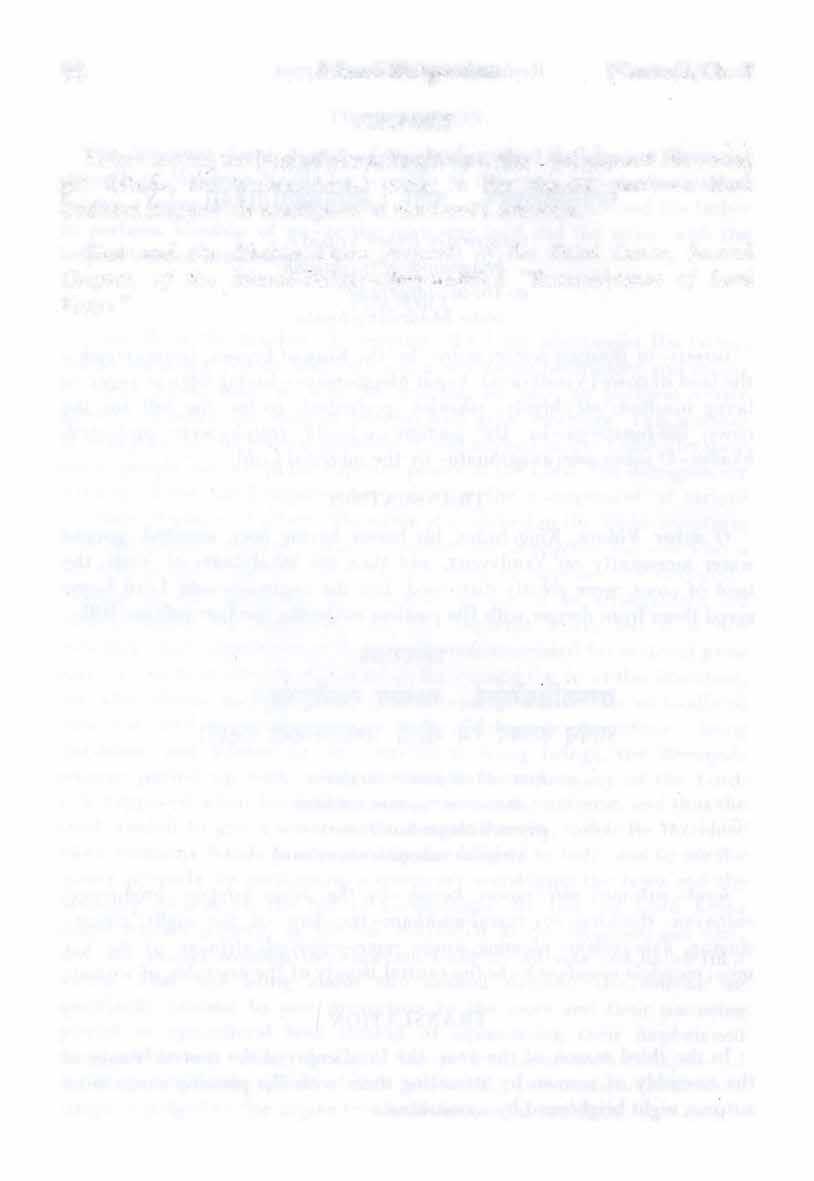
90
[Canto 3, Ch. 2
Srimad-Bhagavatam
uddhava uviica tata� sa agatya puramsva-pitros cikir�ayii sam baladeva-samyuta� nipiitya tungiid ripu-yutha-niitham hatam vyakar�ad vyasum ojasorvyiim sri uddhava� uvaca-Sr! Uddhava said; tata�-thereafter; sa�- the Lord; agatya - coming; puram-the city of Mathura; sva-pitro�_:own parents; cikir�aya -wishing well; sam-wel l-being; baladeva-samyuta�-with Lord Baladeva; nipatya- dragging down; tungiit-from the throne; ripu-yuthaniitham-leader of public enemies; hatam-killed; vyakar�at-pulle-d; vyasum-on the ground; ojasii-by strength; urvyiim -very great.
TRANSLATION
Sri Uddhava said: Thereafter Lord Kr!!Q.a went to Mathura City with Sri Baladeva, and to please Their parents They dragged Kamsa, the . leader of public enemies, down from his throne and killed him, pulling him along the ground with great strength.
PURPORT
King Kamsa's death is only briefly described here because such pastimes are vividly and elaborately described in the Tenth Canto. The Lord proved


��: « 3ll'Rlr �t �f�eM�itl � ;r�����ij: I � ��� � oifcMi! ��m�� II �II
CHAPTER . THREE TheLord'sPastimes OutOf vrndavana TEXT l ��
91
to be a worthy son of His parents even at the age of sixteen years. Both brothers, Lord Kr!!r;Ja and Lord Baladeva, went to Mathura from Vrndavana and killed Their maternal uncle, who had given so much trouble to Their parents, Vasudeva and Devaki. Kamsa was� great giant, and Vasudeva and Devaki never thought that Kr�r;Ja and Balariima (Baladeva) would be able to kill such a great and strong enemy. When the two brothers attacked Kamsa on the throne, Their parents feared that now Kamsa would finally get the opportunity to kill their sons, whom they had hidden for so long in the house of Nanda Maharaja. The parents of the Lord, due to parental affection, felt extreme danger, and they almost fainted. Just to convince them that They had actually killed Kamsa, Kr�r;Ja and Baladeva pulled Kamsa's dead body along the ground to encourage them.
TEXT2


�it:�m�ijf��t 1
� � � -� "��11�11
siindlpane� sakrt proktam brahmiidhitya savistaram tasmai priidiid varam putram mrtam pafi.ca-janodariit
sandipane�-of Sandipani Muni; sakrt-once only; proktam-instructed; brahma-all the Vedas with their different branches of knowledge; adhitya-after studying; savistaram-in all details; tasmai-unto him; priidiit-rewarded; varam-benediction; putram-son; mrtam-who was already dead; pafi.ca-jana-the region of the departed souls; udariit-from within.
TRA NSLATION
The Lord learned all the Vedas with their different branches simply by hearing them once from H _ is teacher, Sandipani Muni, whom he rewarded by bringing back his dead son from the region of Yamaloka.
PURPORT
No one but the Supreme Lord can become well-versed in all the branches of Vedic wisdom simply by hearing once from his teacher. Nor can anyone bring a dead body back to life after the soul has already gone to the region of Yamaraja. But Lord Kr�t;Ja ventured to the planet of Yamaloka and found the dead son of His teacher and brought him back to his father as a reward for the instructions received. The Lord is con-
92 Srimad-Bhagavatam [Canto 3, Ch. 3
stitutionally well-versed in all the Vedas, and yet to teach by example that everyone must go to learn the Vedas from an authorized teacher and must satisfy the teacher by service and reward, He Himself adopted this system. The Lord offered His services to His teacher, Sandipani Muni, and the muni, knowing the power of the Lord, asked something which was impossible to be done by anyone else. The teacher asked that his beloved son, who had died, be brought back to him, and the Lord fulfilled the request. The Lord is not, therefore, an ingrate to anyone who renders Him some sort of service. The devotees of the Lord who always engage in His loving service are never to be disappointed in the progressive march of devotional service.

TEXT3

samiihutiibhl§maka-kanyayii ye sriyafl savarrtena bubhu�ayai�iim giindharva-vrttyii m�atiim sva-bhiigam jahre padam murdhni dadhat supar!laft
samiihutii(l-invited; bhl§maka-of King. Bhl�maka; kanyayii-by the daughter; ye- all those; sriyaft-fortune; savar!lena-by a similar sequence; bu bhu�dyii-expecting to be so; e�iim-of them; giindharva-in marrying; vrttyii-by such a custom; m�atiim-carrying so; sva-bhiigam-own share; jahre-took away; padam-let; murdhni-on the head; dadhat-placed; supar!laft-Garu<).a.
TRANSLATION
Attracted by the beauty and fortune of Rukmi�i, the daughter of King Bhi�maka, many great princes and kings assembled to marry her. But Lord Kr��, stepping over the other hopeful candidates, carried her away as His own share, as Garu�a carried away nectar.
PURPORT
Princess Rukmiryi, the daughter of King Bhi11maka, was actually as attractive as fortune itself because she was as valuable as gold both in cofor and value. Since the goddess of fortune, Lakllmi, is the property of
Text3) The Lord's Pastimes Out of Vrndavana 93
the Supreme Lord, RukmiJ;J! was actually meant for Lord Kr�J;Ja. But Sisupala was selected as her bridegr\)om by RukmiJ;J!'s elder brother, although King Bhi�maka wanted his daughter to be married to Kr�J;Ja. RukmiQ1 invited Kr�J;Ja to take her away from the clutches of Sisupala, so when the bridegroom, Sisupala, came there with his party with the desire to marry RukmiJ;J1, Kr�J;Ja all of a sudden swept her from the scene, stepping over the heads of all the princes there, just as Garw;la carried away nectar from the hands of the demons. This incident will be clearlyexplained in the Tenth Canto.



kakudmino 'viddhanaso damitvii svayariware niignajitim uviiha
tad-bhagnamiiniin api grdhyato jfiari jaghne 'k�ata� sastra-bhrta� sva-sastrai[l
kakud mina{t- bulls whose noses were not pierced; aviddhanasa�pierced by the nose; damitvii- subduing; svayariware-in the open competition to select the bridegroom; niignijiti- Princess Nagnijiti; uviihamarried; tat-bhagnamiinii�-in that way all who were disappointed; apieven though; grdhyayta�- wanted; ajiiiin - fools; jaghne- killed and wounded; ak�ata�- without being wounded; sastra-bhrta�-equipped with all weapons; sva-satra*- by His own weapons.

TRANSLATION
By subduing seven bulls whose noses were not pierced, the Lord achieved the hand of Princess Nagnajiti in the open competition to select her bridegroom. Although the Lord was victorious, His competitors asked the hand of the Princess, and thus there was a fight. Well-equipped with weapons, the Lord killed or wounded all of them, but He was not hurt Himself.

94 Srimad-Bhigavatam [Canto 3, Ch. 3
��:
� ��"twml 1!����:
TEXT4
m: u � 11
iW:i q� � � � 9;� �I
iiN(.itlS(f4� � �: Sf114iw�irt � � 11 � 11

priyam prabhur gramya iva priyayii vidhitsur arcchad dyutarum yad-arthe vajry adravat tam sagarto ru�andha� kri(la-mrgo nunam ayam vadhunam

priyam-of the dear wife;prabhuft ...;... the Lord;gramyaft-ordinaryliving being; iva-in the manner of;priyiiyiift - just to please;vldhitsu�-wishing; 'iircchat-broughtabout;dyutarum-the p'iirijata flowertree;yat- forwhich; arthe-in, the matter of; vajri- lndra, the King of heaven; adravat tamwent forward to fight with Him; sa-gartaft- with full strength;ru�'ii-in anger; andhaft-blind;krip'ii-mrgaft-henpecked;nunam-ofcourse;ayamthis;vadhun'iim-of thewives.
TRANSLATION
Just to please His dear wife, the L9rd brought back the parijata tree from heaven, just as an ordinary husband would do. But Indra, the King of heav�n, induced by his wives (henpecked as he was), ran after the Lord with full force to fight Him.
PURPORT
The Lord once went to the heavenly planet to present an earring to Aditi, the mother of the demigods, and His wife Satyabhiima also went with Him. There is aspecial flowering treecalledthe piirij'iita which grows only in the heavenly planets, and Satyabhama wanted this tree. Just to please His wife, like anordinaryhusband, the Lordbroughtbackthetree, and this enraged Vajri, or thecontroller ofthethunderbolt. lndra's wives inspired him to run after the Lord to fight, and Indra, because he was a henpecked husband and also a fool, listened to them and dared to fight with Kr!!J:Ja. He was a fool on this occasion because he forgot that everythingbelongs tothe Lord.
Text 5] The Lord's Pastimes Out of Vrndavana
TEXTS
95
There was no fault on the part of the Lord, even though He took away the tree from the heavenly kingdom, but because he was henpecked, dominated by his beautiful wives like Sac!, lndra became a fool, j ust as all persons who are dominated by their wives are generally foolish. lndra thought that Kr�t;�a was a henpecked husband who only by the will of His wife Satyabhama took away the property of heaven, and therefore he thought that K r�t;�a could be punished. He forgot that the Lord is the proprietor of everything and cannot be henpecked. The Lord is fully independent, and by His will only He can have hundreds and thousands of wives like Satyabhama. He was not, therefore, attached to Satyabhama because she was a beautiful wife, but He was pleased with her devotional service and thus wanted to .reciprocate the unalloyed devotion of His devotee.
sutani mrdhe kharh vapu�ii grasantarh dr�tvii suniibhon mathitarh dharitryii
. iimantritas tattanayiiya se�arh

dattvii tad-antal;l-puram iivivesa
sutam-son; mrdhe-in the fight; kham-the sky; vapu�ii-by his body; grasantam-while devouring; dr� fva- seeing; suniibhot-by the sudarsana wheel; mathitam-killed; dharitryi.i-by theearth; iimantrital;l-beingprayed for; tat-tanayiiya-to the son of Narakasura; se�am-that which was taken from; dattvii-returning; it; tat-his; antal;l - puram-inside the house; iivivesa- entered.
TRANSLATION
Narakasura, the son of Dharitri, the earth, tried to grasp the whole sky, and for this he was killed by the Lord in a fight. His mother then prayed to the Lord, which led to the return of the kingdom to the son of Narakasura, and thus the Lord entered the house of the demon.
96 Srimad-Bhagavatam [Canto 3, Ch. 3
wt � ·� � � ql��l �� � ��:��II�II
TEXT6
PURPORT
It is said in other Puriirtas that Narakiisura was the son of Dharitr1, the earth, by the Lord Himself. But he became a demon due to the bad. association of Biil)a, another demon. An atheist is called a demon, and it is a fact that even a person born of good parents can turn into a demori by bad association. Birth is not always the criterion of goodness; unless and until one is trained in the culture of good association, one cannot become good.


tatriihrtas ta nara-deva-kanya� kujena dr�tva harim iirta-bandhum utthiiya sadyo jagrhu� prahar�avri{liinuraga-prahitiivalokai�
tatra-inside the house of Narakiisura; iihrtii�-kidnapped; ta�-al1those; nara-deva-kanya�- daughters of many kings; kujena-by the demon; dr�tva-by seeing; harim-the Lord; arta-bandhum-the friend of the distressed; utthiiya-at once got up; sadyaft-then and there; jagrhu�accepted; prahar�a-joyfully; vri{ia-shyness; anuriiga-attachment; prahitaavalokai�-by eager glancing.

TRANSLATION
There in the house of the demon, all the princesses kidnapped by Narakasura at once became alert upon seeing the Lord, the friend of the distressed. They looked upon Him with eagerness, joy and shyness and offered to be His wives.
PURPORT
Narakasura kidnapped many daughters of great kings and kept them imprisoned in his palace. But when he was killed by the Lord and the Lord

Text7] The Lord's Pastimes Out of V�ndavana 97
�"·�·�· '1(4:q�t: ��;r q-r �� 1 � � ��: �iliSI3(141Sf��·'lf\"St�: Ii \9 II
TEXT7
entered the house of the demon, all the princesses were enlivened with joy and offered to become His wives because the Lord is the only friend of the distressed. Unless the Lord accepted them, there would be no chance of their being married because the demon kidnapped them from their fathers' custody and therefore no one would agree to marry them. According to Vedic society, girls are transferred from the custody of the father to the custody of the husband. Since these princesses had already been taken away from the custody of their fathers, it would have been difficult for them to have any husband other than the Lord Himself.
TEXTS
3JRrt � ��ostr.n� ��fq�ft( I
'nufr.l�: (q+ff+4�1 .JI �II
iisam muhurta ekasmin naniigare�u yo�itam savidham jagrhe pa!lin anuriipa� sva-mayaya
asiim-all those; muhurta-at one time; e kasmin-simultaneously; nanagare�u-in different compartments; yo�itam-of the women;sa-vidham-in perfect rituals; jagrhe- accepted ; pa!lin-hands ; anuriipa�-exactly to match; sva-mayaya-by His internal potency.
TRANSLATION
All those princesses were lodged in different apartments, and the Lord simultaneously assumeddifferent bodily expansionsexactly matching each and every princess, and He accepted their hands in perfect rituals by His internal potency.
PURPORT
In the Brahmq-samhita the Lord is described as follows in regard to His innumerable plenary expansions:
advaitam acyutam anadim ananta-rupam adyam pura!la-puru�am navayauvanam ca
vede�u durllabham adurUabham atma-bhaktau
govindam adi-purufiam tam aham bha]ami (Bs. 5.33)
"The Lord, Govinda, whom I worship, is the original Personality of Godhead. He is nondifferent from His innumerable plenary expansions,

98 Srimad-Bhigavatam [Canto 3, Ch. 3
� ��
who are all infallible, original and unlimited and who have eternal forms. Although He is primeval, the oldest personality, He is always fresh and young." By His internal potency the Lord can expand Himself into various personalities of svayam-prakasa and again into prabhava and vaibhava forms, and all of them are nondifferent from one another. The forms into which the Lord expanded to marry the princesses in different apartments were all slightly different just to match each and every one of them. They are called vaibhava-vilasa forms of the Lord and are effected by His internal potency, yoga-maya.
TEXT9 (' «�: I 11.�� � � ���II �II



tasv apatyany ajanayad
atma-tulyani sarvata�
ekaikasyam dasa dasa
prakrter vibubhu�aya
tasu-unto them; apatyani-offspring; ajanayat-begot; iitma-tulyaniall like Himself; sarvata�-in all respects; eka-ekasyam-in each and every one of them; dasa-ten; dasa-ten; prakrte�-for expanding Himself; vibubhu�aya-so desiring.



TRANSLATION
Just to expand Himself according to His transcendental features, the Lord begot in each and every one of them ten offspring with exactly His own qualities.
TEXT 10

�em: �I
3NI�Wf�\44����m��II�oil
kala-magadlta-salvadin
anikai rundhata� puram
ajighanat svayam divyam
sva-pumsarh· teja iidiiat .
kala-Kalayavana; magadha-the King of Magadha (Jarasandha); salvaKing Salva; iidin-and others; anika*-by the soldiers; rundhata�-being encircled; puram- the city of Mathura; a[tghanat-killed; svayam-person-
Text 10) The Lord's Pastimes Out of Vrndavana 99
ally; divyam- transcendental ; sva-pumsiim-of His own men; teja�-prowess; iidi.Sat-exhibited.
TRANSLATION
Kalayavana, the King of Magadha and Salva attacked the city of Mathura, but when the city was encircled by their soldiers, the Lord refrained from killing them personally, just to show the power of His ownmen.
PURPORT
After the death of Kamsa, when Mathura was encircled by the soldiers of Kalayavana, Jarasandha and Salva, the Lord seemingly fled from the city, and thus He is known as Ranchor, or one who fled from fighting. Actually, the fact was that the Lord wanted to kill them through the agency of His own men, devotees like Mucukunda, Bhima, etc. Kalayavana and the King of Magadha were killed by Mucukunda and Bhima respectively, who acted as agents of the Lord. By such acts the Lord wanted to exhibit the prowess of His devotees, as if He were personally unable to fight but His devotees could kill them. The relationship of the Lord with His devotees is a very happy one. Actually, the Lord descended at the request of Brahma in order to kill all the undesirables of the world, but to divide the share of glory He sometimes engaged His devotees to take the credit. The Battle of Kuruk�etra was designed by the Lord Himself, but just to give credit to His devoteeArjuna (nimitta-miitram bhava savyasiicin), He played the part of the charioteer, while Arjuna was given the chance to play the fighter and thus become the hero of the Battle of Kuruk�etra. What He wants to do Himself by His transcendental plans, He executes through His confidential devotees. That is the way of the Lord's mercy towards His pure unalloyed devotees.

100 Srirnad-Bhagavatarn [Canto 3, Ch. 3
TEXT ll ��if11Ji � iliiq�iiq � I "10A4ilf���II��II 5ambaram dvividam biirtam muram balvalam eva ca anyiims ca dantavaktriidin avadhit kiims ca ghiitayat
sambaram-Sambara j dvividam-Dvivida; biinam-Bana j muram-Mura j . . balvalam-Balvala; eva ca-as also; anyiin-others; ca-also; dantavakraiidln-like Dantavakra and others; avadhit-killed; kiin ca-and many others;ghiitayat-caused to be killed.
TRANSLATION
Of kings like Sambara, Dvivida, Ba�a, Mura, Balvala and many other demons, such as Dantavakra, some He killed Himself, and some He caused to be killed by others [Sri Baladeva, etc J.
TEXT 12

atha te bhriitr-putriil)iim pak�ayo� patitiin nrpiin caciila bhu� kurukfietram ye�iimiipatatiim bala*
atha-thereafter;te-your; bhriitr-putriil)iim-ofthenephews;pak�ayo�sides; patitan-killed; nrpan-kings; cacala-shook; bhu�-the earth; kuruk�etram-Battle of Kuruk�etra; ye�am-of whom;iipatatiim-traversing;bala*-by strength.

TRANSLATION
Then, 0 Vidura, the Lord caused all the kings, both the enemies and those on the side of your fighting nephews, to be killed in the Battle of Kuruk�tra. All those kings were so great and strong that the earth seemed to shake as they traversed the warfield.
Text 13] The Lord's Pastimes Out of Vrndavana 101
� �1U':410ij �:qfij�l"f41'{ I � �: tm �tU+tN��j d: II��II
3N
1 wiN;f � � ��1�fj� � � mor_ 11��11
TEXT 13
Srimad-Bhagavatam
sa karrta-du�siisana-saubaliinii.rh
kumantrapiikena hata-sriyiiyu�am
suyodhanarh sii.nucararh sayii.narh
bhagnorum urvyiirh na nananda pasyan
sa�-He (the Lord); karrta- Karl)a; du�siisana-Dul;lsiisana; saubaliiniimSaubala; kumantra-piikena-by the intricacy of ill advice; hata-sriyabereft of fortune; ii.yu�am-duration of life; suyodhanam - Duryodhana; sa-anucaram-with followers; sayiinam- lying down; bhagna- broken; urum-thighs; urvyiim-verypowerful; na-did not; nananda-take pleasure; pasyan-seeing like that.


TRANSLATION
Duryodhana was bereft of his fortune and duration of life because of the intricacy of ill advice given by Kar�a, Du�sasana and Saubala. When he lay on the ground with his followers, his thighs broken although he was powerful, the Lord was not happy to see the scene.
PURPORT
The fall of Duryodhana,the leading son of Dhftara�tra, was not pleasing to the Lord, although He was on the side of Arjuna and it was He who advised Bhima how to break the thighs of Duryodhana while the fight was going on. The Lord is constrained to award punishment upon the wrongdoer, but He is not happy to award such punishments because the living entities are originally His parts and parcels. He is harder than the thunderbolt for the wrongdoer and softer than the rose for the faithful. The wrongdoer is misled by bad associates and by ill advice which is against the established principles of the Lord's order, and thus he becomes subject to punishment. The surest path to happiness is to live by the principles laid down by the Lord and not to disobey His established laws, which are enacted in the Vedas and the Puriirws for the forgetful living entities.

102
[Canto 3, Ch. 3
TEXT 14 �wnstt ��ro ���t��� � � ������� kiyii.n bhuvo 'yam k�apitoru-bhiiro yad drorta-bh�miirjuna-bhima-mula*
kiyan-what is this; bhuva�-of the earth; ayam-this; k§apita-abated; uru-very great; bhiira�-burden; yat-which; dror-a-Drol)a; bhi§maBru�ma; arjuna-Arjuna; bh'lma-Bhima; mula*-on the background; a§tadasa-eighteen; ak§auhir.i-phalanxes of military strength (vide Bhag. 1.16.34); ka�-who; madamsai�-with My descendants; aste-are still there; balam-great strength; durvi�aham-unbearable; yadunam-of the Yadu dynasty.
TRANSLATION
[After the end of the Battle of Kuruk�etra, the Lord said:] The abatement of the great burden of the earth has now been effected with the ' help of Dro!la, Bhi�ma, Arjuna and Bhima. But what is this? There is still the great strength of the Yadu dynasty, born of Myself, which may be a more unbearable burden.

PURPORT
It is a wrong theory that due to an increase in population the world becomes overburdened and therefore there are wars and other annihilating processes. The earth is never overburdened. The heaviest mountains and oceans on the face of the earth hold more living entities than there are human beings, and they are not overburdened. If a census were taken of all the living beings on the surface of the earth, certainly it would be found that the number of humans is not even five percent of the total number of living beings. If the birth rate of human beings is increasing, then the birth rate of other living beings is increasing proportionately. The birth rate of lower animals-beasts, aquatics, birds, etc.-is far greater than that of human beings. There is an adequate arrangement for food for all the living beings all over the earth by the order of the Supreme Lord, and He can arrange more and more if there is actually a disproportionate increase of living beings.
Therefore, there is no question of an increase in population causing a burden. The earth became overburdened due to dharma-gliini, or irregular discharge of the Lord's desire. The Lord appeared on the earth to curb the increase in miscreants, and not the increase in population, as is wrongly put forward by the mundane economist. When Lord Kf�!)a appeared, there had been a sufficient increase in miscreants who had violated the desire of the Lord. The material creation is meant for fulfilling the desire of the Lord, and His desire is that the conditioned souls who are unfit to enter into the kingdom of God have a chance to improve thei� conditions for entering. The entire process of cosmic arrangement is intended just to
Text 14] The Lord's Pastimes Out of Vrndavana a�t(idasak§auhir:i
ko madaritsair
duroi§aham yadunam 103
aste balam
give a chance to the conditioned souls to enter the kingdom of God, and there is an adequate arrangement for their maintenance by the nature of the Lord.
Therefore, although there may be a great increase in population on the surface of the earth, if. the people are exactly in line with God consciousness and are not miscreants, such a burden on the earth is a source of pleasure for her. There are two kinds of burdens. There is the burden of the beast and the burden of love. The burden of the beast is unbearable, but the burden of love is a source of pleasure. Sri Visvanatha Cakravarti describes the burden of love very practically. He says that the burden of the husband on the young wife, the burden of the child on the lap of the mother, and the burden of wealth on the businessman, although actually burdens from the viewpoint of heaviness, are sources of pleasure, and in the absence of such burdensome objects, one may feel the burden of separation, which is heavier to bear than the actual burden of love. When Lord K.[�l)a referred to the burden of the Yadu dynasty on the earth, He referred to something different than the burden of the beast. The large numbers of family members born of Lord Kr�l)acounted tosome millions and werecertainly a great increase in the population of the earth, but because all of them were expansions of the Lord Himself by His transcendental plenary expansions, they were a source of great pleasure for the earth. When the Lord referred to them in connection with the burden on the earth, He had in mind their imminent disappearance from the earth. ALL the members of the family of Lord K[�l)a were incarnations of different demigods, and they were to disappear from the surface of the earth along with the Lord. When He referred to the unbearable heaviness on the earth in connectior with the Yadu dynasty, He was referring to the burden of their separation Srila ]lva Gosvami �onfirms this inference.





104 Srimad-Bhagavatam [Canto 3, Ch. 3
TEXT 15 TiPit � fit m� f4Jl4.4'11'11'( ��� �� ������II mitho yadai�iim bhavitii viviido madhv-iimadiitiimra-vilocaniiniim na�iim vadhopiiya iyiin ato 'nyo mayy udyate 'ntardadhate svayam sma
mitha�-one another; yadii-when; e�iim-of them; bhavitii- will take place; viviidaft- quarrel ; madhu-iimadii-intoxication by drinking; tiimravilocaniiniim-of their eyes being copper-red; na-not; e�iim-of them; vadhopiiya�-means of disappearance; iyiin-like this; ata�- besides this; anya�-alternative; mayi-on My; udyate-disappearance; antardadhatewill disappear; svayam-themselves ; sma-certainly.


TRANSLATION
When they quarrel among themselves, influenced by intoxication, with their eyes redlike copper because of drinking [ madhu], then only will they disappear; otherwise, it will not be possible. On My disappearance, this incident will take place.

PURPORT
The Lord and His associates appear and disappear by the will of the Lord. They are not subjected to the laws of material nature. No one was able to kill the family of the Lord, nor was there any possibility of their natural death by the laws of nature. The only means, therefore, for their disappearance was the makeshow of a fight amongst themselves, as if brawling in intoxication due to drinking. That so-called fighting would also take place by the will of the Lord, otherwise there would be no cause for their fighting. Just as Arjuna was made to be illusioned by family affection and t!ws the Bhagavad-g"itii was spoken, so the Yadu dynasty was made to be intoxicated by the will of the Lord, and nothing more. The devotees and associates of the Lord are completely surrendered souls. Thus theyare transcendental instruments in_ the hands of the Lord and can be used in any way the Lord desires. The pure devotees also enjoy such pastimes of the Lord because they want to see Him happy. Devotees of the Lord never assert independent individuality; on the contrary, they utilize their individuality in pursuit of the desires of the Lord, and this cooperation of the devotees with the Lord makes a perfect scene of the Lord's pastimes.

Text 16] The Lord's Pastimes Out of Vrndavana 105
16 I wt;a.�l'i� ij�d.: � tl� ._,,���� evarh sancintya bhagaviin sva-riijye sthiipya dharmajam
, TEXT
nanda-yiimiisa suhrdafl
siidhuniirh vartma darsayan
evam-thus; saii cintya-thinking within Himself; bhagaviin-the Personality of Godhead; sva-riijye-in his own kingdom; sthiipya-installing; dharmajam- Maharaja Yudhi�thira; nanda-yiimiisa-gladdened; suhrdaflfriend of all; siidhuniim-of the saints; vartma-path; darsayan-by indication.
TRANSLATION
Lord Sri Kr�l).a, thus thinking to Himself, established Maharaja Yudhi��hira in the position ofsupremecontroloftheworldinorder to showtheidealofadministrationonthepathofpiety.
TEXT 17

uttariiyiirh dhrtafl puror varhsafl siidhv abhimanyunii sa vai draurzy-astra-samplu§taltpunar bhagavatii dhrtafl
uttariiyiim-unto Uttara; dhrtafl-conceived; puroft-of Puru; varhsafldescendant; siidhu abhimanyunii-by the hero Abhimanyu; sa�-he; vaicertainly; draurzi-astra-by the weapon of Draul)i, the son of Drol)a; samplu�ta�-being burnt;puna�-again for the second time;bhagavatii-by the Personality of Godhead;dhrta�-protected.
TRANSLATION
TheembryoofthedescendantofPiiru,whowasbegottenbythegreat hero Abhimanyu iir:the womb of Uttara, his wife, was burnt by the weapon of thesonofDrol).a,butlateronhewas againprotectedbythe Lord.
PURPORT
The embryonic body of Par1k�it which was in formation after Uttara's pregnancy by Abhimanyu, the great hero, was burned by the brahmiistra of Asvatthama, but a second body was given by the Lord within the womb, and thus the descendant of Puru was saved. This incident is the direct proof that the body and the living entity, the spiritual spark, are different. When the living entity takes shelter in the womb of a woman through the inj�ction of the semina of a man, there is an emulsification of the man's
106 Srimad-Bhagavatam
[Canto 3, Ch. 3
���
t@ti�: �� I « � ��·: ��1�11 �: II
�:
�\9!1
and woman's discharges, and thus a body is formed the size of a pea, gradually developing into a complete body. But if the developing embryo is destroyed in some way or other, the living entity has to take shelter in another body or in the womb of another woman. The particular living entity who was selected to be the descendant of Maharaja Puru, or the PiiJ;J�avas, was not an ordinary living entity, and by the superior will of the Lord he was destined to be the successor to Maharaja Yudhi�thira. Therefore, when Asvatthama destroyed the embryo of Maharaja Par!k�it, the Lord, by His own internal potency, entered into the womb of Uttara by His plenary portion just to give audience to the would-be Mahariija Par1k�it, who was in great danger. By His appearance within the womb, the Lord encouraged the child and gave him complete protection in a new body by His omnipotency. By His power of omnipresence He was present both inside and outside of Uttara and other members of the PaJ;J�ava family.
TEXT 18

ayiijayad dharma-sutam asva-medhais tribhir vibhu� so 'pi k§miim anujai rak,�an reme knrJam-anuvrata�
ayajayat-made to perform; dharma-sutam-by the son of Dharma (Maharaja Yudhi�thira); asva-medha*-by horse sacrifices; tribh*-three; vibhu�-the Supreme Lord; sa�-1\laharaja Yudhi�thira; api-also; k§mamthe earth; anujai�-assisted by his younger brothers; rak§an-protecting; reme-enjoyed; kr�rJam-Kr�qa, the Personality of Godhead; anuvrata�constant follower.
TRANSLATION
The Supreme Lord induced the son of Dharma to perform three horse sacrifices, and Maharaja Yudhi�thira, constantly following Kr��;�a, the Personality of Godhead, protected and enjoyed the earth, assisted by his younger brothers.
PURPORT
Maharaja Yudhi�thira was the ideal monarchical representative on the earth because he was a constant follower of the Supreme Lord, Sri Kr�r)a. As stated in the Vedas (lSopani§ad), the Lord is the proprietor of the entire manifested cosmic creation, which presents a chance for the condi-
Text 18) The Lord's Pastimes Out of Vrndavana 107
�lilt��.4Wt+t���f�: I �sft������:«f: 11��11
tioned souls to revive their eternal relationship with the Lord and thus go back to Godhead, back home. The whole system of the material world is arranged with that program and plan. Anyone who violates the plan is punished by the law of nature, which is acting by the direction of the Supreme Lord. Maharaja Yudhi��hira was installed on the throne of the earth as a representative of the Lord. The king is always expected to be the representative of the Lord. Perfect monarchy necessitates representation of the supreme will of the Lord, and Maharaja Yudhi�thira was the ideal monarch on this supreme principle. Roth the King and the subjects were happy in the discharge of worldly duties, and thus protection of the citizens and enjoyment of natural life, with full cooperation of material nature, followed in the reign of Maharaja Yudhi��hira and his worthy descendants like Maharaja Par1k�it.
TEXT 19
bhagavanapivi.Svatma
loka-veda-pathanuga� kamansi§evedvarvatyam asaktab,sankhyamiisthitab,
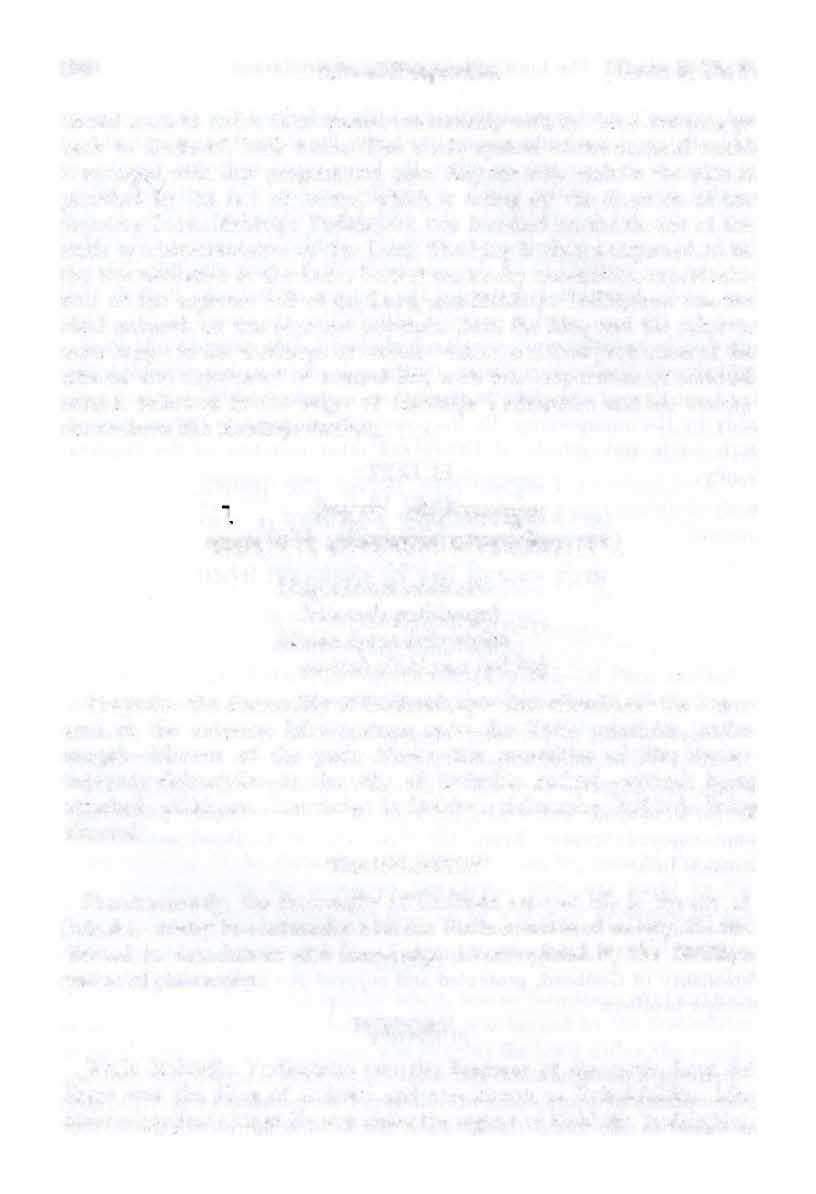
bhagaviin-the PersonalityofGodhead; api-also; visva-iitmii-the Supersoul of the universe; loka-custom; veda-the Vedic principles; pathaanugab,- follower .of the path; kamiin-the necessities of life; si§eveenjoyed; dviirvatyiim-in the city of Dvaraka; asaktab, - without being attached; siinkhyam-knowledge in Sarikhya philosophy; asthitab,-being situated.


TRA NSLATION
Simultaneously, the Personality of Godhead enjoyed life in the city of Dvaraka, strictly in conformity with the Vedic customs of society. He was situated in detachment and knowledge, as enunciated by the Sankhya system of philosophy.
PURPORT
While Maharaja Yudhi��hira was the Emperor of the earth, Lord Sr1 Kr&r;�a was the King of Dvaraka and was known as Dvarakadhisa. Like othersubordinate kings, He was under the regime of Maharaja Yudhi��hira.
108 Srimad-Bhagavatam [Canto 3, Ch. 3
� �tEM((q?.tltjii: I �ftf� ��1'1(1�H1f(6lf+tl��: ����
Although Lord Sri Kr�l')a is the supreme emperor of the entire creation, while He was on this earth He never violated the principles of the Vedic injunctions because they are the guide for human life. Regulated human life according to the Vedic principles, which are based on the system of knowledge called Siinkhya philosophy, is the real way of enjoyment of the necessities of life. Without such knowledge, detachment and custom, the so-called human civilization is no more than an animal society of eat, drink, be merry and enjoy. The Lord was acting freely, as He willed, yet by His practical example He taught not to lead a life which goes against the principles of detachment and knowledge. Attainment of knowledge and detachment, as very elaborately discussed in Siirikhya philosophy, is the real perfection of life. Knowledge means to know that the mission of the human form of life is to end all the miseries of material existence and that in spite of having to fulfill the bodily necessities in a regulated way, one must be detached from such animal life. Fulfilling the demands of the body is animal life, and fulfilling the mission of spirit soul is the human mission.
snigdha-smitiivalokena viicii piyii§a-kalpayii caritrettiinavadyena sri-niketena ciitmanii
snigdha-gentle; smita-avalokena-by a glance with s�eet smile; viica- by words; piyii�a kalpaya-compared to nectar; caritretta-by character; anavadyena-without flaw; sri-fortune; niketena-residence; ca-and; atmanii-by His transcendental body.
TRANSLATION

Hewasthere in His transcendental body,the residenceof the goddessof fortune, with His usual gentle and sweetly smiling face, His nectarean wordsand Hisflawlesscharacter.
PURPORT
In the previous verse it is described that Lord Kr�J;ta, being situatedin the truths of Siinkhya philosophy, is detached from all kinds of matter. In the present verse it is described that He is the residence of the goddess of
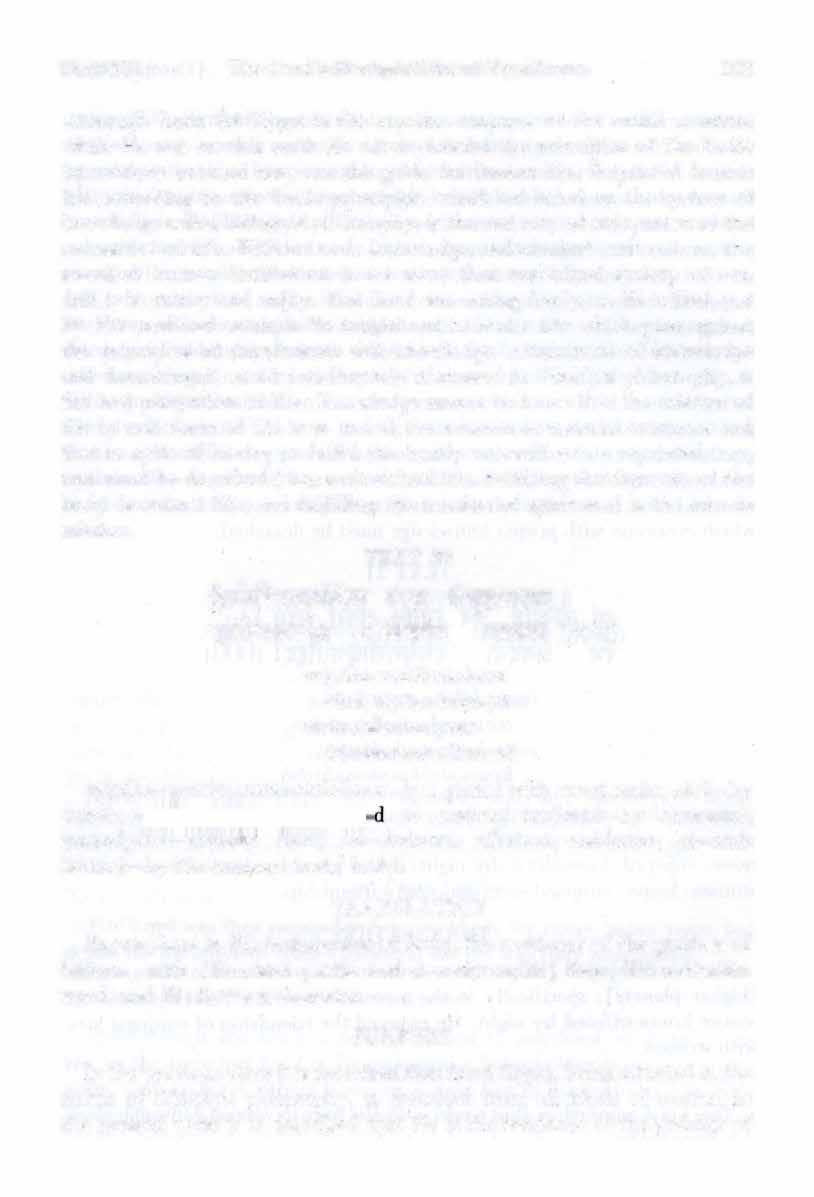
Text 20] TheLord'sPastimes OutofVrndavana 109
TEXT 20 �ffl�it� � �'{1��1 I
4.fR�OII'1sta'1 �f.t�'1 �t¥4'11ll�oll
fortune. These two things are not at all contradictory. Lord Kr�l).a is detached from the' variegatedness of the inferior nature, but He is'in eternal, blissful enjoymentof the spiritualnature, or His inter.nal potency. One who has a poor fund of knowledge cannot understand this distinction between the external and internal potencies. In Bhagavad-g'itii, the internal potency is described as the para prakrti. In the Vi§rtU Puriirta also, the internal pot�ncy of Vi�I).U is described as para sakti. The Lord is never detached from the association of para sakti. This para sakti and her manifestations are described in the Brahma-samhita as iinanda-cinmayarosa-pratibhii.vitii.bhi�. (Bs. 5.37) The Lord is eternally joyfuland cognizant in the taste derived from such transcendental bliss. Negation of the variegatedness of the inferior energy does not necessitate negation of the positive transcendental bliss of the spiritual world. Therefore the Lord's gentleness, His smile, His character and everything related to Him are all transcendental. Suchmanifestations of the internal potency are the reality, of which the material shadow is only a temporary representation from which everyone with proper knowledge must be detached.
TEXT 21

�"<m•"i
� �Uii(tll �u���ot«l•;a:: II��II
imam lokam amum caiva ramayan sutaram yadun reme k�aJJadayii. dattak�arta-strl.-k�aJJa-sauhrda�
imam-this; lokam-earth; amum-and the other worlds; ca-also; evacertainly; ramayan- pleasing; sutariim-specifically; yadun-the Yadus; reme-enjoyed; k�aJJadayii.-by night; datta-given by; k�aJJa-leisu re; stnwomen;k�aJJa-conjugal love; sauhrda� - friendship.

TRANSLATION
The Lord enjoyed His pastimes, both in this world and in other worlds [higher planets), specifically in the association of the Yadu dynasty. At leisure hours offered by night, He enjoyed the friendship of conjugal love with women.
PURPORT
The Lord enjoyed in this world with His pure devotees. Although He is the Personality of Godhead and is transcendental to all material attach-
no . Srimad-Bhligavatam [Canto 3, Ch. 3
� � w:m � 1
ment, He nevertheless exhibited much attachment for His pure devotees on the earth, as well as for the demigods who engage in His service in the heavenly planets as powerful delegateddirectors inthe management ofall materialactivities. He displayedspecialattachment forHisfamily members, the Y adus, as well as for His sixteen thousand wives, who had the opportunity to meet Him in the leisure hours of night. All these 'a1tach· ments of the Lordare manifestations of Hisinternal potency,of which the external potency is only a shadow representation. In the Skanda Purii[la, Prabhiisa khart{la Chapter, in the topics between Lord Siva and Gaur!, there is confirmation of His internal potential manifestations. There is mention of the Lord's meeting with sixteen thousand cowherd damsels although He isthe Hamsa (transcendental) Supersoul and maintainer ofall living entities. The sixteen thousand cowherd damsels are a display of sixteen varieties of internal potencies. This will be more elaborately explained in the Tenth Canto. It is said there that Lord KreyJ;la isjust like the moon and the internal potential damsels are like the stars around the moon.
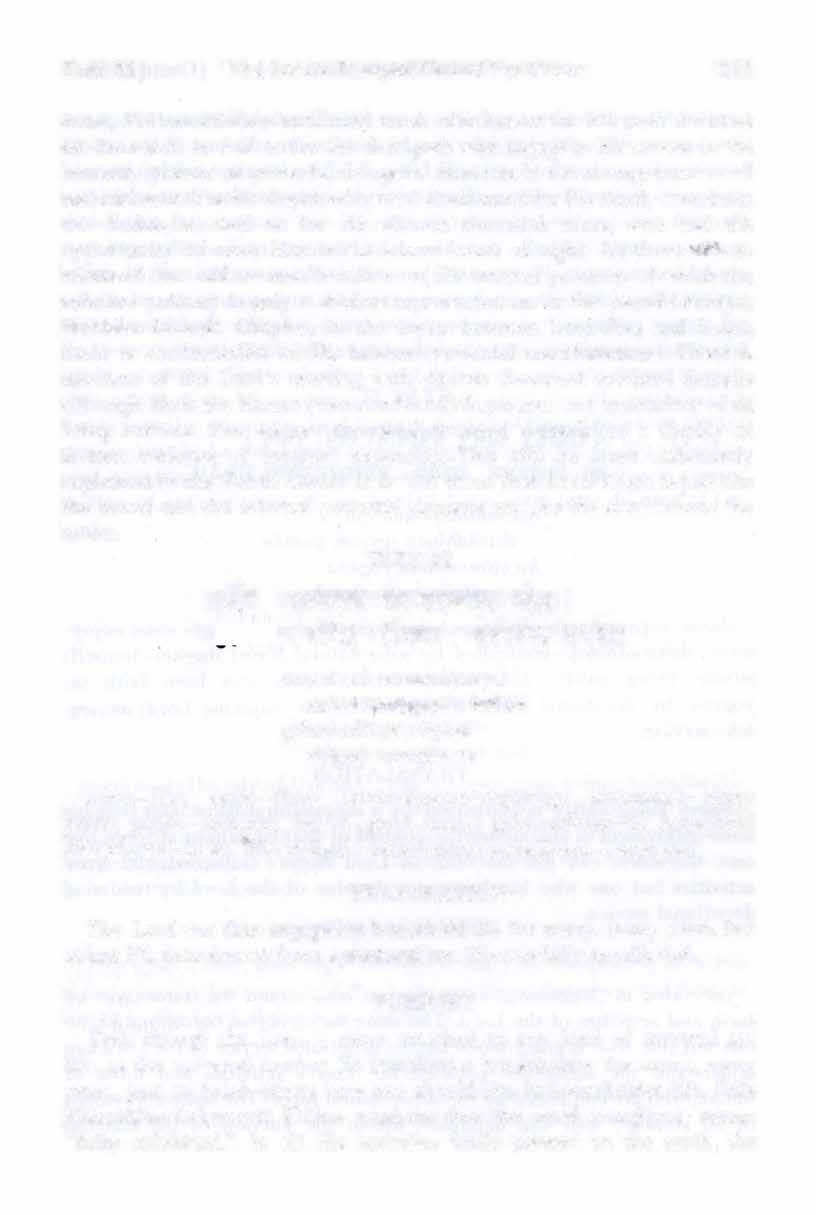
TEXT
tasyaivam ramamiirtasya samvats.aNrgartiin bahun grhamedhe�u yoge�u viriiga� samajiiyata
tasya- His; evam-thus; ramamiirtasya- enjoying; samvatsara- many years; gartiin-number; bahun-great many; grhamedhe�u-in household life; yoge�u-in sex life; viraga�- detachment; samajiiyata- awakened.

TRANSLATION
The Lord was thus engaged in household life for many, many years, but at last His detachment from ephemeral sex life was fully manifested.
PURPORT
Even though the Lord is never attached to any kind of material sex life, as the universal teacher He remained a householder for many, many years, just to teach others how one should live in householder life. Srlla Visvanatha Cakravartl Thakur explains that the word samajiiyata means "fully exhibited." In all His activities while present on the earth, the
Text 22] The Lord's Pastimes Out of Vrndavana 111
22 � ('4¥4101� (fqffl(tiUIIW{ qW{ I
•z«\\! � · f«<tt: ij'4'5ti*HI 11��11
Lord exhibited detachment. This was fully displayed when He wanted to teach by example that one should not remain attached to household life for all the days of one's life. One should naturally develop detachment as a matter of course. The Lord's detachment from household life does not indicate detachment from His eternal associates, the transcendental cowherd damsels. But the Lord desired to end His so-called attachment to the three modes of material nature. He can never be detached from the service of His transcendental associates like Rukmii).I and other goddesses of fortune, as described in the Brahma-samhitii: lak§mi-sahasra-sata-sambhrama-sevyamiinam. (Bs. 5.37)
TEXT 23 ���!���:��I

� �� �Til� ���: 11��11
daiviidhine§u kiime§u daiviidhina� svayam pumiin ko vi.Srambheta yogena yogesvaram anuvrata�
daiva- supernatural; adhine�u-being controlled;kiime§u-in sense enjoyment; daiva-adhina�- controlled by supernatural force; svayam-himself; pumiin- living entity; ka�- whoever; vi.Srambheta-can have faith in; yogena-by devotional service; yogesvaram- the Supreme Lord; anuvrata�-serving.
TRANSLATION
Every living entity is controlled by a supernatural force, and thus his sense enjoyment is also under the control of that supernatural force. No one, therefore, can put his faith in Lord Kr�J}.a's transcendental sense activities but one who has become a devotee of the Lord by rendering devotional service.
PURPORT
As stated in Bhagavad-gitii, no one can understand the transcendental birth and activities of the Lord. The same fact is herein corroborated: no one but one who is enlightened by the devotional service of the Lord can understand the difference between the Lord's activities and those of others, who are controlled by the supernatural force. The sense enjoyment of all animals, men and demigods within the purview of the material
112 Srimad-Bhagavatani [Canto 3, Ch. 3
universe is controlled by the supernatural force called the prakrti, or daivi-miiyii. No one is independent in obtaining sense enjoyment, and everyone in this material world is after sense enjoyment. Persons who are themselves under the control of supernatural power cannot believe that Lord Kr1!1}8 is not under aqy control beyond Himself in the matter of sense enjoyment. They cannot understand that His senses are transcendental. In the Brahma-sarhhitii the Lord's senses are described as omnipotent; i.e., with any sense He can perform the activities of the other senses. One who has limited senses cannotbelievethat the Lord can eat by His transcendental power of hearing and can perform the act of sex life simply by seeing. The controlled living entity cannot even dream of such sense activities in his conditional life. But simply by the activities of bhakti-yoga, he can understandthat the Lord and His activitiesare always transcendental. As the Lord says in Bhagavad-gitii (Bg. 18.55), bhaktyii miim abhijiiniiti yiiviin yas ciismi tattvata�: one cannot know even a fraction of the activities of the Lord if he is not a pure devotee of the Lord.

TEXT 24
CM\If4-t�itll�f.Att���:
puryiirh kadiicit kr'i{Iadbhir yadu-bhoja-kumiiraka* kopitii munayaft sepur bhagavan-mata-kovidii�
����II
puryiim-inthe cityof Dvaraka; kadiicit-once upon atime; kr'i{Iadbh*by sporting activities; yadu-the descendants of Yadu; bhoja-the descendants of Bhoja; kumiirakai{l-princes; kopitii�-became angry; munaya�the great sages; sepuft -cursed; bhagavat- Personality of Godhead; matadesire; kovidiift - cognizant.
TRANSLATION
Once upon a time, great sages were made angry by the sporting activities of the princely descendants of the Yadu and Bhoja dynasties, and thus, as desired by the Lord, the sages cur�d them. .
PURPORT
The associates of the Lord who were playing the part of princes of descendants of the Yadu and Bhoja dynasties were not ordinary living

Text 24] The Lord'& Pastimes Out of Vrndavana 113
. ��: ·��•I!Jt'"'iij�T:
I
entities. It is not possible that they could offend any saintly man or sage, nor could the sages, who were all pure devotees of the Lord, be influenced to anger by any of the sporting activities of the princes born in the holy dynasty of Yadu or Bhoja wherein the Lord Himself appeared as a descendant. The cursing of the princes by the sages is another transcendental pastime of the Lord to make a show of anger. The princes were cursed in order that one may know that even the descendants of the Lord, who could never be vanquished by any act of material natu�e, were subjected to the reactions of anger by great devotees of the Lord. One should, therefore, take great care and attentionnot to commit anoffense atthe feet of a devotee of the Lord.
TEXT 25

mr: �qa+ttWf'��11: I
11�: � � ��M+tl�c:n: 11�'-\11 tata� katipayair miisair vr�T}i-bhojiindhakiidaya� yayu� prabhiisam samhr�tii rathair deva-vimohitii�
tata�-thereafte r ; katipaya*-a few;miisa*-monthspassing;vr�rti-the descendants of V reyni;bhoja-the descendants of Bhoja; andhaka-iidayaltand others, like the sons of Andhaka;yayu�-went;prabhiisam-theplace of pilgrimagenamed Prabhasa; samhr§tii� -withgreat pleasure; ratha*-on their chariots; deva-by KwJa;vimohitii�-bewildered.
TRANSLATION
A few months passed, and then, bewildered by 1f<r!!lJa, all the descendants of Vr�qi, Bhoja and Andhaka who were incarnations of demigods went to Prabhasa, while those who were eternal devotees of the Lord did not leave but remained in Dvaraka�

tatra sniitvii pitfn deviin
r§ims caiva tad-ambhasii
tarpayitviitha viprebhyo
giivo bahu-gurta dadu�
114 Srimad-Bhagavatam [Canto 3, Ch. 3
tatra-there; snatva-by taking bath; pitfn-forefathers; devan-demigods; r�in-great sages; ca-also; eva-certainly; tat-of that; ambhasa-by the water; tarpayitva-by pleasing;atka-thereupon; viprebhya�-unto the brahmartas; gava�-cows; baliu-gurtii[I-greatly useful; dadu�-gave in charity.

TRANSLATION
After arriving there, all of them took bath, and with the water of this place of pilgrimage they offered their respects to the forefathers, demigods and great sages and thus satisfied them. They gave cows to the brahmaJ.las in royal charity.
PURPORT
Amongst the devotees of the Lord there are several divisions, mainly nitya-siddhas and siidhana-siddhas. The nitya-siddha devotees never fall down t'J the region of the material atmosphere, even though they sometimes come onto the material plane to execute the mission of the Lord. The siidhana-siddha devotees are chosen from the conditioned souls. Out of the siidhana devotees, there are mixed and pure devotees. The mixed devotees are sometimes enthusiastic about fruitive activities and are habituated to philosophical speculation. The pure devotees are free from all these mixtures and are completely absorbed in the service of the Lord, regardless of how and where they are situated. Pure devotees of the Lord are not enthusiastic to put aside their service to the Lord in order to go visit holy places of pilgrimage. A great devotee of the Lord in modern times, Sri Narottamadasa Thakur, has sung like this: "To visit holy places of pilgrimage is another bewilderment of the mind because devotional service to the Lord at any place is the last word in spiritual perfection."
For pure devotees of the Lord who are completely satisfied with the transcendental loving service of the Lord, there is hardly any necessity to visit the various places of pilgrimage. But those who are not so advanced have the prescribed duties of visiting pilgrimage sites and regularly performing the rituals. The part of the princely order of the Yadu dynasty who went to Prabhasa performed all duties to be done in a place of pilgrimage and offered their pious actions to their forefathers and others.
As a rule, every human being is indebted to God, the demigods, great sages, other living entities, people in general, forefathers, etc., for various contributions received from them. Thus everyone is obliged to repay the debt of gratitude. The Yadus who went to the Prabhasa pilgrimage site performed their duties by distributing land, gold, and well-nourished cows in royal charity, as described in the following verse.
Text 26) The Lord's Pastimes Out of Vrndavana 115
hirar;tyam rajatam sayyiim viisiimsy ajina-kambaliin

yiinam rathiin ibhiin kanyii
dhariim-vrtti-kar"im api
hirar;tyam-gold; rajatam-gold coins; saj.yiim- bedding; vasiimsi-clothing; ajina- animal skin for seats; ·kambaliin-blankets; yanam- horses; rathiin-chariots; ibhiin-elephants; kanyii�-girls; dhariim-land; vrttikarin- to provide livelihood; api-also.

TRANSLATION

The brahmar;tas were not only given well-fed cows in charity, but also gold, gold coins, bedding, clothing, animal skin seats, blankets, horses, elephants, girls and sufficient land for maintenance.
PURPORT
All these charities were meant for the briihmar-as whose lives were devoted entirely to the welfare of society, both spiritually and materially. The briihmar-as were not giving their services as paid servants, but the society provided them with all necessities. It was arranged for some of the briihmar-as, who were in difficulty for marriage, to be given girls. The briihmar-as, therefore, had no economic problems. The k�atriya kings and rich mercantile men would provide them with all that they needed, and in exchange the briihmar-as were completely devoted to the elevation of society. That was the way of social cooperation between the different castes. When the briihmar-a class or caste gradually became easygoing, being fed by the society although they had no brahminical qualifications, they degraded themselves into brahma-bandhus, or disqualified briihmapas, and thus other members of society also gradually fell down from the social standard of progressive life. As described in Bhagavad-gitii, the caste system is the creation of the Lord and is arranged according to the quality of work rendered to society and not in terms of birthright, as falsely claimed in the present degraded society. TEXT 28
116 Srimad-Bhagavatam
[Canto 3, Ch. 3
311Ji � � �� �ftEt�.fllll{: I tltNSw�leEt: �: � �: ����II
annam coru-rasam tebhyo
dattvii bhagavad-arpartam go-vipriirthiisava� surii�
prartemur bhuvi murdhabh*
annam- foodstuff; ca- also; uru-rasam- highly delicious; tebhya�- unto the briihmartas; dattvii- after supplying; bhagavat-arpartam-which was first offered to the Personality of Godhead;go-cow;vipra-briihmartas; arthapurpose; iisava�-purpose of living; surii�- all the valiant k�atriyas; prartemu�-offered obeisances; bhuvi-touching the ground; murdhabhi�with their heads.

TRANSLATION
Thereafter they offered the brahmar;tas highly delicious foodstuffs which were first offered to the Personality of Godhead, and they offered their respectful obeisances by touching their heads to the ground. They lived perfectly by protecting the cows and the briihmar;tas.
PURPORT
The behavior exhibited by the descendants of Y adu in the pilgrimage site of Prabhasa was highly cultured and exactly to the point of human perfection. The perfection of human life is attained by following three principles of civilization: protecting the cows, maintaining the brahminical culture and, above all, becoming a pure devotee of the Lord. Without becoming a devotee of the Lord, one cannot perfect one's human life. The perfection of human life is to be elevated to the spiritual world, where there is no birth, no death, no diseases and no old age. That is the highest perfectional aim of human life. Without this aim, any amount of material advancement in so-called comforts can only bring the defeat of the human form of life.
Briihmartas and Vai�r;tavas do not accept any foodstuff which is not first offered to the Personality of Godhead. Foodstuff offered to the Lord is accepted by the devotees as the mercy of the Lord. After all, the Lord supplies all kinds of foodstuff, both to the human being and to other animals. A human being must be conscious of the fact that all foodstuffs, namely grains, vegetables, milk, water, etc.-the prime necessities of lifeare supplied by the Lord for mankind, and such foodstuffs cannot be manufactured by any scientist or materialist in a laboratory or factory established by human effort. The intelligent class of men are called brii.hmarzas, and those who have realized the Absolute Truth in His supreme personal feature are called Vai�r;tavas. But both of them accept foodstuffs which are the remnants of sacrifice. Sacrifice is ultimately meant to satisfy
Text 28) The Lord's Pastimes
Out of V�ndavana
117
the yajfia�purufla, Vi�l)u. In Bhagavad-gita (Bg. 3.13) it is said that one who accepts foodstuffs as the remnants of sacrifice is freed from all sinful reactions, and one who cooks foodstuffs for maintenance of his body takes in all kinds of sins, which lead only to suffering. The foodstuffs prepared by the Yadus at the Prabhasa pilgrimage site to offer to the bona fide brahmar-as there were all offered to the Personality of Godhead, Vi�l)u. They offered their sincere obeisances by touching their heads to the ground. The Yadus or any enlightened family in Vedic culture are trainedfor attainment of human perfection by total cooperation of service between the different divisions of social orders.
The word uru-rasam is also significant here. Hundreds of delicacies can be prepared simply by the combination of grains, vegetables and milk. All such preparations are in the mode of goodness and therefore can be offered to the Personality of Godhead. As stated in Bhagavad-gitii (Bg. 9.26), the Lord accepts only foodstuffs which are within the range of fruits, flowers, leaves and liquids, provided they are offered in complete devotional service. Devotional service is the only criterion for a bona fide offering to the Lord. The Lord assures that He positively eats such foodstuffs offered by the devotees. So, judging from all sides, the Yadus were perfectly trained civilized persons, and their being cursed by the brahmar-a sages was only by the desire of the Lord; the whole incident was a warning to all concerned that no one should behave lightly with brahmar-as and Vai�l)avas.
Thus end the Bhaktivedanta purports of the Third Chapter, Third Canto, of the Srimad-Bhagavatam, entitled "The Lord's Pastimes Out of Vrndiivana. "

118 Srimad-Bhagavatam [Canto 3, Ch. 3
CHAPTER FOUR
Vidura Approaches Maitreva TEXTl

uddhava uviica atha te tad-anujniitii bhuktvii pitvii ca viirur-im tayii vibhramsita-jniinii
duruktair marma pasprsu�
uddhava� uviica-Uddhava said; atha-thereafter; te-they (the Yadavas); tat-by the briihmar-as; anuj niitiitt - being permitted; bhuktvii- partaking; pitvii- drinking; ca- and; viirur-im-liquor; .tayii-by that; vibhramsitajTiiina�-being bereft of knowledge; durukta*-with harsh words; marmathe core of the heart; pasprsu�- touch ed.
TRANSLATION
Thereafter, all of them [the descendants of VI:l!l}i and BhojaJ, being permitted by the brahma1.1as, partook of the remnants of prasadam and also drank liquor made of rice. By drinking they all became delirious, and, bereft of knowledge, they touched the cores of each other's hearts with harsh words.
PURPORT
In ceremonies when briihmar-as and Vai�l)avas are sumptuously fed, the host partakes of the remnants of foodstuff after the guest has given permission. So the descendants of Vr�l)i and Bhoja formally took permission from the briihmarws and ate the prepared foodstuff. K�atriyas are
311f��G>�i_ilijf����'{ I � ft�� ����� q�,t�: II � II
��
119
permitted to drink at certain occasions, so they all drank a kind of light liquor made of rice. By such drinking they became delirious and bereft of sense, so much so that they forgot their relationship with one another and used harsh words which touched the cores of each other's hearts. Drinking is so harmful that even such a highly cultured family becomes affected by intoxication and can forget themselves in a drunken state. The descendants of Vr�t:ti and Bhoj a were not expected to forget themselves in this way, but by the will of the Supreme it happened, and thus they became harsh towards one another. TEXT2
te§iirh maireyado§erta vi§amilqtacetasiim nimlocati raviiviisid ver-uniimiva mardanam

te�iim-of them; maireya-of intoxication; do�erw-by the faults; vi�am'ikrta- became unbalanced; cetasiim-of those of whom the minds; nimlocati-sets; ravau-the sun; asit-takes place; vertiiniim-of the bamboos; iva-as; mardanam-destruction.
TRANSLATION
As bythe friction of bamboos destruction takes place,so also, at sunset, by the interaction of the faults of intoxication, all their minds became unbalanced, and destruction took place.
PURPORT
When there is need of fire in the forest, by the will of the Supreme it takes place due to friction among the bamboos. Similarly, the descendants of Y adu were all destroyed by the will of the Lord by the process of selfdestruction. Just as there is no possibility of a fire's occurring deep in a forest due to human effort, so also there was no power in the universe which could vanquish the descendants of the Y adus, who were protected by the Lord. The Lord wanted them to be so destroyed, and thus they obeyed His order, as indicated by the word tad-anujniita.
120 Srimad-Bhagavatam [Canto 3, Ch. 4
� ��a.11uf �-t+i'ft;ij�ij(1fl( I fit�l'EIM«lctt«<i:o(wttf'rer �Wf'l_ II � II
bhagaviin-the Personalityof Godhead; sva-iitma-miiyayii- byHisinternal potency; gatim-the end; tam-that; avalokya-foreseeing; saf't-He (KH�a); sarasvatim- the River Sarasvati;upasprsya-aftersipping water; vrk§a-mulam -at the foot of a tree; upavisat-sat down.
TRANSLATION
The Personality of Godhead, Lord Sri Kr�qa, after foreseeing the end [of His family] by His internal potency, went to the bank of the River Sarasvati and sat down there underneath a tree.
PURPORT
All the above-mentioned activities of the Yadus and Bhojas were executed by the internal potency of the Lord because He wanted them to be dispatched to their respective abodes afterHe had finishedHis mission of descent. They were allHis sons and grandsons and were given complete protection by the paternal affection of the Lord. How they could be vanquished in the presence of the Lord is answered in this verse: every thing was done by the Lord Himself (svatma maya yaM. The Lord's family members were either incarnations of His plenary expansions or demigods from the heavenly planets, and thus before His departure He separated them by His internal potency. Before being dispatched to their respective abodes, they were sent to the holy place of Prabhasa, where they performed pious activities and took food and drink to their heart's content. It was then arranged for them to be sent back to their abodes so that others could see that the powerful Yadu dynasty was no longer in the world. In the previous verse, the word anujiiata, indicating that the whole sequence of events was arranged by the Lord, is significant. These particular pastimes of the Lord are not a manifestation of His external energy or material nature. Such an exhibition of His internal potency is

Text3] Vidura Approaches Maitreya TEXT3 �(4t�¥tf:qf:qfqfth'llitttJl+tt
�: I ���� ,�,q��ll�ll
upiiviSat 121
bhagaviin sviitmamiiyiiyii gatirh tam avalokya sa� sarasvatim upasprsya vrk.sa-miilam
eternal, and therefore one should not conclude that the Yadus and Bhojas died in a drunken state in an ordinary fratricidal wa�. Sri .fiva Gosvami comments on these incidences as magical performances.
TEXT4

� � � stq•uM��ur t: I ���st�tftf6·� 4iat{l!an IICJ II

aham cokto bhagavatii
prapanniirtiharer-a ha badarim tvam prayiihiti sva-kulam sanjihir,sur-a
aham-1; ca- and; ukta� -was told; bhagavatii-by the Supreme Lord; prapanna- of the surrendered; arti-harer-a-by He who is the vanquisher of the distresses; ha-indeed; badarim-to Badari; tvam-you; prayiihishould go; iti-thus; sva-kulam-His own family; sanjihir�ur-ii-by desiring to destroy.
TRANSLATION
The Lord is the vanquisher of the distresses of one who is surrendered unto Him. Thus He who desired to destroy His family told me previously to go to BadanK.asrama.
PURPORT
While at Dvaraka, U ddhava was warned to avoid the distresses which were to follow the disappearance of the Lord and the destruction of the Yadu dynasty. He was advised to proceed to Badarikasrama because there he could associate with the devotees of Nara-NarayaQa, and in their association of devotional service he could increase his eagerness for chanting, hearing, knowledge and detachment. TEXTS
tathiipi tad-abhipretam
jiinan naham arindama
Pfflthato'nvagamam bhartufi. piida-viSleflar-iikflamafi.
122 Srimad-Bhigavatam [Canto 3, Ch.4
� � i31twt'l(l4R� I wit� ll�: 1fld\�$'4oll�: II � II
tathiipi-yet, in spite of;tat-abhipretam-His desire;jiinan--knowing; nanot; aham-1; arindama- 0 subduer of the enemy (Vidura);pr�thata�-behind; anvagamam-followed; bhartu[l-of the master;piida-visle�a!la-separation from His lotus feet;ak�ama�-not being able.

TRANSLATION
Yet in spite of my knowing His desire [to destroy the dynasty], 0 Arindama [Vidura), I followed Him because it was impossible for me to bear separation from the lotus feet of the master.
adriik�am ekam iisinam vicinvan dayitam patim srt-niketarit sarasvatyiirh: krta-ketam aketanam
adrak�am-1 saw; ekam-alone; asinam-sitting; vicinvan-deeply thinking; dayitam-patron; patim-master; sri-niketam-the shelter of the goddess of fortune;sarasvatyam-on the bank of the Sarasvati;krta-ketamtaking shelter;aketanam-being situated without a shelter.
TRANSLATION
Thus following, I saw my patron and master [Lord Sri Kr�J].a] sitting alone and deeply thinking, taking shelter on the bank of the River Sarasvati although He is the shelter of the goddess of fortune.
PURPORT
Those who are in the renounced order of life often take shelter underneath a tree. The Lord was found by U ddhava in that condition of taking shelter as do persons who have no shelter. Because He is the proprietor of everything, everywhere is His shelter, and everywhere is under His shelter. The entire material and spiritual cosmic manifestation is sustained by Him, and therefore He is the shelter of everything. So there was nothing astonishing in His taking shelter in the way of the unsheltered who are in the renounced order of life.
Text6] Vidura Approaches Maitreya 123
��'i�q.{�
�
TEXT6 �Jn«J;iAA-��PI�ttRI�I �ij ft(((C��
II
II
��� tfl���ar :q- II \9 II
syiimiivadiitarh virajarh
prasiintiiru[ta-locanam dorbhis caturbhir viditarh

pita-kausiimbarerta ca
syama-avadatam-beautiful with black color; virajam-formed of pure goodness; prasiinta-peaceful; arurta-reddish; locana�-eyes; dorbhi�t-by thearms; caturbh*-four; viditam-being recognized;pita-yellow;kausasilken; ambarerta-with garments; ca-and.
TRANSLATION
The Lord's body is blackish, but is eternal, full of bliss and knowledge, and very, very beautiful. His eyes are always peaceful,· and they are reddish like the rising morning sun. I could immediately recognize Him as the Supreme Personality of Godhead by His four hands, different symbolic representations, and yellow colored silk garments.
TEXTS
q('f
viima uriiv adhisritya
dak�irtiinghri-saroruham
apiisritiirbhakiisvattham
akrsari:t tyakta-pippalam
viime-on the left; urau-thigh; adhisritya-placed on; dak�irta-anghrisaroruham-the right lotus foot; apiisrita-taking rest against; arbhakayoung; asvattham-banyan tree; akrsam-cheerful; tyakta-having left; pippalam-household comforts.
TRANSLATION
The Lord was sitting, taking rest against a young banyan tree, with His right lotus foot on His left thigh, and although He had left all household comforts, He looked quite cheerful in that posture.
124 Srimad-Bhagavatam [Canto 3, Ch. 4
· :r.r��qrrnlqrcri'!.I7W�I� m !fWffi�IJlit:;:r.t�I
TEXT7
mrNf� ��one.f�� 1 ���"t� ���II�II
PURPORT
According to Srila Visvanatha Cakravarti 'fhakur, the Lord's sitting posture-keeping His back against the newly grown banyan tree-is also meaningful. Asvattha, the banyan tree, is so called because the tree does not die very quickly; it continues to live for many, many years. His legs and their energies are the material ingredients, which are five in all: earth, water, fire, air and sky. The material energies represented by the banyan tree are all products of His external potency and are therefore kept to His back. And because this particular universe is the smallest of all, the banyan tree is therefore designated as small, or as a child. Tyaktapippalam indicates that He had now finished His pastimes in this particular small universe, but since the Lord is absolute and eternally blissful, there is no difference between His leaving or accepting something. The Lord was now prepared to leave this particular universe and go into another,just as the sun rises on one particular planet and sets in another simultaneously but does not change its own situation.
II� II
tasmin mahii-bhiigavato
dvaipiiyana-suhrt-sakha
lokananucaran siddha
asasada yadrcchaya
tasmin-then; mahii-bhagavataJ:t-a great devotee of the Lord; dvaipayana-·of Kw).a-dvaipayana Vyasa; suhrt-a well-wisher; sakha-a friend; lokan-the three worlds; anucaran-traveling; siddhe-in that asrama; iisasada- arrived; yadrcchaya- by his own perfect accord.
TRANSLATION
At that time, after traveling in many parts of the world, Maitreya, a great devotee of the Lord and a friend and well-wisher of the great sage Kr�1,1a-dvaipiiyana Vyiisa, reached that spot out of his own perfect accord.
PURPORT
Maitreya was one of the disciples of Mahar�?i Pariisara, the father of Vyasadeva. Thus Vyasadeva and Maitreya were friends and mutual well-

Text9] Vidura Approaches Maitreya 125
�;� ���·�· �� fq
TEXT9
3l� ��lfl
wishers. By some fortunate accident,Maitreya reached the place where Lord Sri Kr�J].a was resting. To meetthe Lordisnotanordinaryincident. Maitreya was a greatsageandalearnedscholar-philosopher butnota pure devotee of the Lord, andthereforehismeetingwiththe Lordat thattime may have been due to ajiiiita-sukrti, orsomeunknowndevotionalservice. Pure devotees always··engage in pure devotional activities, and therefore their meeting with the Lord i�? natural. Butwhenthosewhoarenotupto that standard meet the Lord, it is due to the unforeseen fortune of accidentaldevotionalservice.
TEXT 10

tasyiinuraktasya muner mukunda� pramoda-bhiiviinata-kandharasya iisrrwato miim anuriiga-hiisasamik�ayii visramayann uviica
tasya-his (Maitreya's); anuraktasya-although attached; mune�-ofthe sage; mukunda�-the Lord who awards salvation; pramoda-bhiiva-in a pleasingattitude; iinata-lowered; kandharasya-oftheshoulder; asrrwata�while thus hearing; miim-unto me; anuriiga-hiisa-with kind smiling; samikflayii-particularly seeing me; visramayan-allowi ng me complete rest;uviica-said.

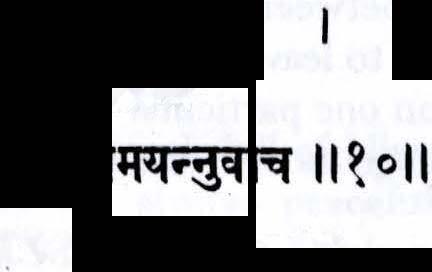

TRANSLATION
Maitreya Muni was greatly attached to Him [the Lord], and he was listening in a pleasing attitude, with his shoulder lowered. With a smile and a particular glance upon me, having allowed me to rest, the Lord spoke as follows:
PURPORT
Although both Uddhava and Maitreya were great souls, the Lord's attention was more on Uddhava becausehewasaspotlesslypuredevotee. A jiiiina-bhakta, or one whose devotion is mixed with the monistic viewpoint,isnotapuredevotee.AlthoughMaitreya·wasadevotee,hisdevotion
126 Srimad-Bhagavatam [Canto 3, Ch. 4
�ft;a:: ���� � � +tl+t�I416J�-
('!�·����
II�oil
was mixed. The Lord reciprocates with His devotees on the basis of transcendental love and not on the basis of philosophical knowledge or fruitive activities. In the transcendental loving service of the Lord, there is no place for monistic knowledge or fruitive activities. The gopis in Vrndii.vana were neither highly learned scholars nor mystic yogis. They had spontaneous love for the Lord, and thus He became their heart and soul, and the gopis also became the heart and soul of the Lord. Lord Caitanya approved therelationshipof the gopis with the Lord as supreme. Herein the Lord's attitude towards Uddhava was more intimate than with Maitre�a Muni.
TEXT 11

sri bhagaviin uviica
vediiham antar manasipsitarh te dadiimi yat tad duraviipam anya*
satre purii visva-srjiirh vasuniirh mat-siddhi-kiimena vaso tvaye,stalt
sri bhagaviin uviica-the Personality of Godhead said; veda- known; aham-I; anta �- within ; manasi-the mind; ipsitam- what you desired; te-your; dadiimi-I give you; yat - which is; tat-that; duraviipam-very difficult to achieve; anyai� -by others; satre-in thesacrifice;purii-in the days of yore; viSva-s.rjiim-of those whoexpandedthis creation; vasuniimof the Vasus; mat-siddhi-kiimena-with adesire toachieve My association; vaso-0 Vasu;tvayii- byyou;i§ta�- ultimate goalof life.
0 Vasu, I know from within your mind what you desired in the days of yore when the Vasus and other demigods who are responsible for expanding the universal affairs performed sacrifices. You particularly desired to achieve My association. This is very difficult to obtain for others, but I award it unto you.
Text 11] Vidura Approaches Maitreya 127
���N¥1�:
t.fut•tctlsEU'i!il itG:I('1t'ij�wt4\�d �
I � ���t� '1ffflf«il�wt m �:II��II
TRANSLATION
PURPORT
Uddhava is one of the eternal associates of the Lord, and a plenary portion of Uddhava was one of the eight Vasus in the days of yore. The eight Vasus and the demigods in the upper planetary system, who are responsible for the management of the universal affairs, performed a sacrifice in the days of yore, desiring to fulfill their respective ultimate goals in life. At that time an expansion of Uddhava, acting as one of the Vasus, desired to become an associate of the Lord. The Lord knew this because He is present in the heart of every living entity as Paramatma, the Superconsciousness. In everyone's heart there is the representation of the Superconsciousness, who gives memory to the partial consciousness of' every living entity. The living entity, as partial consciousness, forgets incidences of his past life, but the Superconsciousness reminds him how to act in terms of his past cultivation of knowledge. Bhagavad-gitii confirms this fact in various ways: ye yathii iniirh prapadyante tiirhs tathaiva bhajiimy aham (Bg. 4.11), sarvasya ciiharh hrdi sannivi�to mattaft smrtir jiiiinam apahanarh ca (Bg. 15.15).

Everyone is at liberty to desire as he likes, but the desire is fulfilled by the Supreme Lord. Everyone is independent to think or desire, but the fulfillment of one's desire depends on the supreme will. This law is expressed as "Man proposes, God disposes." In the days of yore, when the demigods and Vasus performed sacrifice, Uddhava, as one of the Vasus, desired to enter into the association of the Lord, which is very difficult for those busy in empiric philosophical speculation or fruitive activities. Such persons have practically no information of the facts about becoming an associate of the Lord. Only the pure devotees can know, by the mercy of the Lord, that the personal association of the Lord is the highest perfection of life. The Lord assured Uddhava that He would fulfill his desire. It appears that when the Lord informed him by His indication to Uddhava, the great sage Maitreya finally became aware of the importance of entering into the association of the Lord.

128 Srimad-Bhagavatam [Canto 3, Ch. 4
TEXT 12 � � � :;ron �'il(11fd:tt�. 'ia;�(t � I � �l$l'l � �� ��� ��a;l�t-tql.II��II
Vidura Approaches Maitreya
sa e�a siidho caramo bhaviiniim iisiiditas te mad-anugraho yat
yan miirh nrlokiin raha utsrjantarh di�tyii dadrsviin visadiinuvrttyii
sa[l-that; e�a[l- of those; siidho-0 honest one; carama[l- the ultimate; bhaviiniim-of all your incarnations (as Vasu); iisiidita[l-now achieved; teunto you; mat-My; anugraha[l- mercy; yat-as it is; yat-because; miimMe; nrlokiin- the planets of the conditioned souls; raha[l-in seclusion; utsrjantam-while quitting; di�tyii- by seeing; dadrsviin-what you have seen; visada-anuvrttyii-by unflinching devotion.



TRANSLATION
0 honest one, your present life is the last and the supermost because in this term of life you have been awarded My ultimate favor. Now you can go to My transcendental abode, Vaiku!l1ha, by leaving this universe of conditioned living entities. Your visit to Me in this lonely place because of your pure and unflinching devotional service is a great boon for you.
PURPORT
When a person is fully conversant with knowledge of the Lord as far as can be known by a perfect living entity in the liberated state, he is allowed to enter into the spiritual sky,where the V aiku!llha planets exist. The Lord was sitting in a lonely place just about to disappear from the vision of the inhabitants of this universe, and Uddhava was fortunate to see Him even at that time and thus receive the Lord's permission to enter Vaiku!llha. The Lord is everywhere at all times, and His appearance and disappearance are merely the experience of the inhabitants of a particular universe. He is just like the sun. The sun does not appear or disappear in the sky, but it is only in the experience of men that in the morning the sun rises and in the evening the sun sets. The Lord is simultaneously both in Vaiku!llha and everywhere within and without Vaiku!llha.
Text 13]
129
TEXT 13 ��.�A� � f.t'fGUIN 1t¥ttfa;(1i{ I � � "�€&:�,� � ��������
Srimad-Bhagavatam
pura maya proktam ajaya nabhye padme ni�artr-aya. mamadi-sarge jnanarh pararh man-mahimiivabhiisarh. yat siirayo bhagavatarh vadanti
pu rii-in the days of yore; maya-by Me; proktam-was said; ajiiya-unto Brahma; niibhye-out of the navel; padme-on the lotus; n� avvay a-unto the one situated on; mama-My; adi-sarge-in the beginning of creation; jiiiinam-knowledge; param-sublime; mat-mahimii-My transcendental glories; avabhiisam-that which clarifies; yat-which; suraya[l.-the great learned sages; bhiigavatam-Srimad-Bhiigavatam; vadanti-do say.
TRANSLATION
0 Uddhava, in the lotus millennium in the days of yore, at the beginning of the creation, I spoke unto Brahma, who is situated on the lotus which · grows out of My navel, about My transcendental glories, which the great sages describe as Srimad-Bhagavatam.
PURPORT
The explanation of the Supreme Self, as given to Brahma and already explained in the Second Canto of this great literature, is further clarified herein. The Lord said that the concise form of Srimad-Bhiigavatam as e:.;:ained to Brahma was meant to elucidate His personality. The impersonal explanation of those four verses in the Second Canto is nullified herewith. Sridhara Svami also explains in this connection that the same concise form of the Bhagavatam concerned the pastimes of Lord Km1a and was never meant for impersonal indulgence.
TEXT 14
ity adrtokta� paramasya purhsa[l. pratik�ar-iinugraha-bhajano 'ham snehottha-roma skhalitak�aras tarh muncan chuca� pranjalir ababha�e
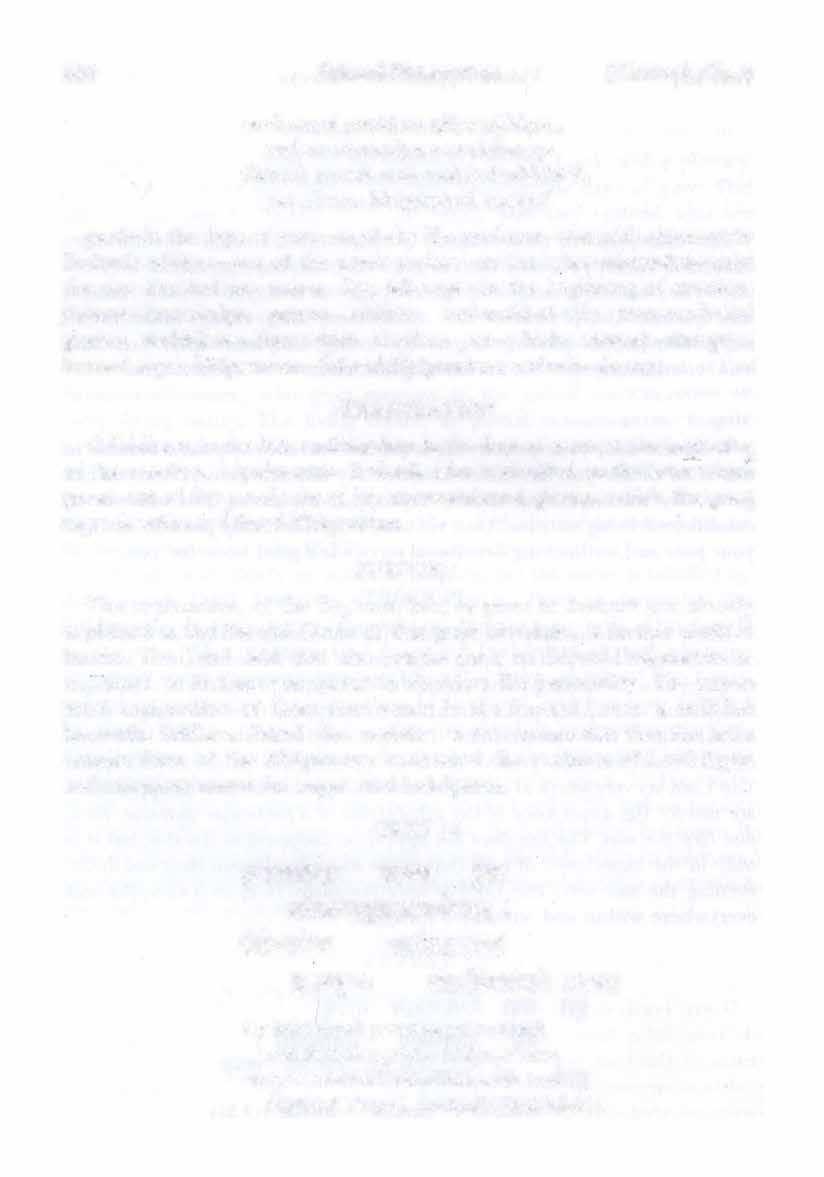
130
[Canto 3, Ch. 4
��itd1:ffi: 'Rl{� �: ��I �it�?.t(hu � ��: m!jre(lif�II��II
iti-thus; iidrta-being favored; ukta�-addressed; paramasya-of the Supreme; pumsa�-Personality of Godhead; pratik�ar-a-every moment; anugraha-bhiijanii�-object of favor; aham-myself; sneha-affection; uttha-eruption; romii-hairs on the body; skhalita-slackened; ak�aral;tof the eyes; tam- that; mufican-smearing; suca�-tears; pra njal*- with folded hands; ababha�e-said.


TRANSLATION
Uddhava said: 0 Vidura, when I was thus favored at every moment by the Supreme �ersonality of Godhead and addressed by Him with great affection, my words· failed in tears, and the hairs on my body erupted. After smearing my tears, 1, with folded hands, spoke like this:

TEXT 15


ko nvisa te pada-saroja-bhajarh
sudurlabho'rthe�u catur�v apiha tathapi naham pravrrwmi bhuman
bhavat-padam-bhoja-ni�evarrotsukal;t
kaf!. nu �sa-O my Lord; te- Your; pada-saroja-bhajam-of the devotees engaged in the transcendental loving service of Your lotus feet; sudurlabhaf!.-very difficult to obtain; arthe�u-in the matter of; catur�u-in the four objectives; api-in spite of; iha-in this world; tathapi-yet; na-do not; aham-I; pravrrromi-prefer; bhiiman-0 great one; bhavat-Your; padambhoja- lotus feet; ni�eva rw-utsuka�-anxiou s to serve.
TRANSLATION
0 my Lord, devotees who engage in the transcendental loving service of Your lotus feet have no difficulty in achieving anything within the realm of the four principles of religiosity, economic development, sense gratification and liberation. But, 0 great one, as far as I am concerned, I have preferred only to engage in the loving service of Your lotus feet.
Text 15] Vidura Approaches Maitreya 131
Eit
��
� � ql<::e(ht�l�t
"1�cft(
i
� -nt wtantfr �� . �fwl�!!fun�: ���'-\"
PURPORT
Those who are associated with the Lord in the Vaikut�-tha planets achieve all the bodily features of the Lord and appear to be the same as Lord Vigm. Such liberation is called siirupya-mukti, which is one of the five kinds of liberation. The devotees engaged in the transcendental loving service of the Lord never accept the siiyujya-mukti, or merging in the rays of the Lord called the brahmajyoti. The devotees can achieve not only liberation but any success in the realm of religiosity, economic development or sense gratification up to the standard of the demigods in the heavenly planets. But such a pure devotee as Uddhava refuses to accept all such facilities. A pure devotee wants simply to engage in the service of the Lord and does not consider his own personal benefit.
TEXT

karmiirty anihasya bhavo 'bhava.sya te durgiisrayo 'thiiri-bhayiit pa.liiya.nam kiiliitmano yat pramadii-yutiisraya� sviitman-rate�l khidyati dhir vidiim iha
karmii[li-activities; anihasya-of one who has no desire; bha va�-birth; abhavasya-of one who is never born; te-your; durga-iis,.aya�-taking shelter of the fort; atka-thereafter; ari-bhayiit-out of fear of the enemies; paliiyanam-flee; kiilii-iitmana�-of He who is the controller of eternal time; yat-that; pramadii-yuta-in the association of women; iisrama�household life; sva-iitman-by Your own Self; rate�-one who enjoys; khidyati-disturbs; dh0-intelligence; vidiim-of the learned; iha-in this world.



TRANSLATION
My Lord, even the learned sages become disturbed in their intelligence when they see that Your Greatness engages in fruitive work although You are free from all desires, that You take birth although You are unborn, that You flee out of fear of the enemy and take shelter in a fort although You are the controller of invincible time, and that You enjoy householder life surrounded by many women although You enjoy in Your Self.
132 Srimad-Bhagavatam [Canto 3, Ch. 4
16 �otlwft��� :.ro� a o:f'l_ """�1.,.,e�t�""q·;ft �'I<:;T��·'f': ((flf'iw-�.d: �Rr ffi�lfft�II��II
Pure devotees of the Lord are notvery much concernedwith philosophical speculation in regard to transcendental knowledge of the Lord. Nor is it possible to acquire complete knowledge of the Lord. Whatever little knowledgethey haveaboutthe Lordis sufficientfor thembecausedevotees are simply satisfied in hearing and chanting about the transcendental pastimes of the Lord. This gives them all transcendental bliss. But some of the pastimes of the Lord appear contradictory, even to such pure devotees, and thus Uddhava asked the Lord about some of the contradictory incidences in His pastimes.The Lord is described as having nothing to do personally, and it is actually so because even in the creation and sustenance of the material world, the Lord has nothing to do. It seems contradictory, then, to hear that the Lord personally lifts the Govardhana Hill for the protection of His unalloyed devotees.The Lord is the Supreme Brahman, the Absolute Truth, the Personality of Godhead appearing like a man, but Uddhava had doubts whether He could have so many transcendental activities.
There is no difference between the Personality of Godhead and the impersonal Brahman. How then can the Lord have so many things to do, whereas the impersonal Brahman is stated to have nothing to do either materially or spiritually? If the Lord is ever unborn, how then is He born as the son of Vasudeva and Devaki? He is fearful even to kala, the supreme fear,and yet the Lord is afraid of fighting J arasandhaand takes shelter in a fort. How can one who is full in Himself take pleasure in theassociation of many women? How can He take wives and, just like a householder, take pleasure in the association of family members, children, relatives and parents? All these apparef!.tly contradictory happenings bewilder even the greatestlearned scholars,who,thus bewildered,cannot understandwhether inactivity is a fact or whether His activities are only imitations.
The solution is that the Lord has nothing todo with anything mundane. All His activities are transcendental. This cannot be understood by the mundanespeculators.For the mundanespeculators thereis certainly akind of bewilderment, but for the transcendental devotees there is nothing astonishing in this. The Brahman conception of the Absolute Truth is certainly the negation of all mundane activities, but the Param Brahman conception is full with transcendental activities. One who knows the distinctions between the conception of Brahman and the conception of Supreme Brahman is certainly the real transcendentalist. There is no bewilderment for such transcendentalists. The Lord Himself also declares in Bhagavad-g'itii, "Even the great sages and demigods can know hardly

Text 16] Vidura Approaches Maitreya 133
PURPORT
anything about My activities and transcendental potencies." (Bg. 10.2)
The right explanation of the Lord's activities is given by Grandfather Bhi�madeva (Bhiig. 1.9.16) as follows:
na hy asya karhicid riijan pumiin veda vidhitsitam yad-vijijniisayii yuktii muhyanti kavayo 'pi hi
TEXT17



� m � � �
�: � l1� ��� '{'1t '{t�dl� � II�\911
mantre�u miim vii upahuya yat tvam akurtthitiikhartt;la-sadiitma-bodha� prcche� prabho mugdha iviipramattas tan no mano mohayafiva deva
mantre§u-in consultations; miim-unto me; vai-as either; upahuya-by calling; yat-as much as; tvam-Your Lordship; aku(1thita-without hesitation; akhartt;la-without being separated; sadii-eternally; iitma-self; bodha�-iritelligent; prcche�- asked; prabho-0 my Lord; mugdha�bewildered; iva-as if it were so; apramatta�-although never bewildered; tat-that; na�-us; mana�- mind; mohayati-bewilders; iva-as it is so; deva-0 my Lord.



TRANSLATION
0 my Lord, Your eternal Self is never divided by the influence of time, and there is no limitation to Your perfect knowledge. Thus You were sufficiently able to consult with Yourself, yet You called upon me for consultation, as if bewildered, although You are never bewildered. And this act of Yours bewilders me.
PURPORT
Uddhava was never actually bewildered, but he says that all these contradictions appear to be bewildering. The whole discussion between Kr�pa and Uddhava was meant for the benefit of Maitreya, who was sitting nearby. The Lord used to call Uddhava for consultation when the city was attacked by J arasandha and others and when He executed great sacrifices as part of His routine royal work as Lord of Dvaraka. The Lord
134 Srimad-Bhagavatam [Canto 3, Ch. 4
has nopast,present and futurebecause He is unhampered bythe influence of eternal time and thus nothing is hidden from Him. He is eternally self-intelligent. Therefore His calling for Uddhava to give Him enlightenment is certainly astonishing. All these actions of the Lord appear to be contradictory, although there is no contradiction in the routineactivities of the Lord. Thereforeit is better to seethem as theyareand not attempt toexplain them.
TEXT 18

jniinam param sviitma-raha[!-prakiisam proviica kasmai bhagaviin samagram api k§amam no grahartiiya bhartar vadiinjasii yad vrjinam tarema
jiiiinam-knowledge; param-supreme; sva-iitma-own self; raha[tmystery; prakiisam- enlightenin g; proviica- said; kasmai-unto Ka (Brahmaji); bhagaviin-the Personality of Godhead; samagram-in sum total; api- if so; k§amam- able; na[!-unto me; grahartiiya-acceptabl e; bharta�-my Lord; vada- say ; aiijasii-in detail; yat- that which; vrjinammiseries; tarema_:_can cross over.
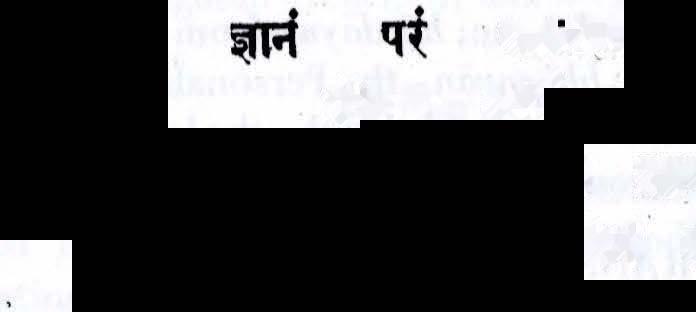
TRANSLATION
My Lord, kindly explain to us, if You think us competent to receive it, that transcendental knowledge which gives enlightenment about Yourself and which You explained before to Brahmaji.
PURPORT
A pure devotee like Uddhava has no material afflictions because he engages constantly in the transcendental loving service of the Lord. A devotee feels afflicted without the association of the Lord. Constant remembrance of the Lord's activities keeps the devotee alive, and therefore Uddhava requested that the Lord please enlighten him with the knowledge of Srimad-Bhiigavatam, as was previously instructed to Brahmaji.
Text 18) Vidura Approaches Maitreya 135
��U�+t�$0:� iNR ���� 3lfit � ;fr �IJIR +Rf�� � ��;f �����II
TEXT 19

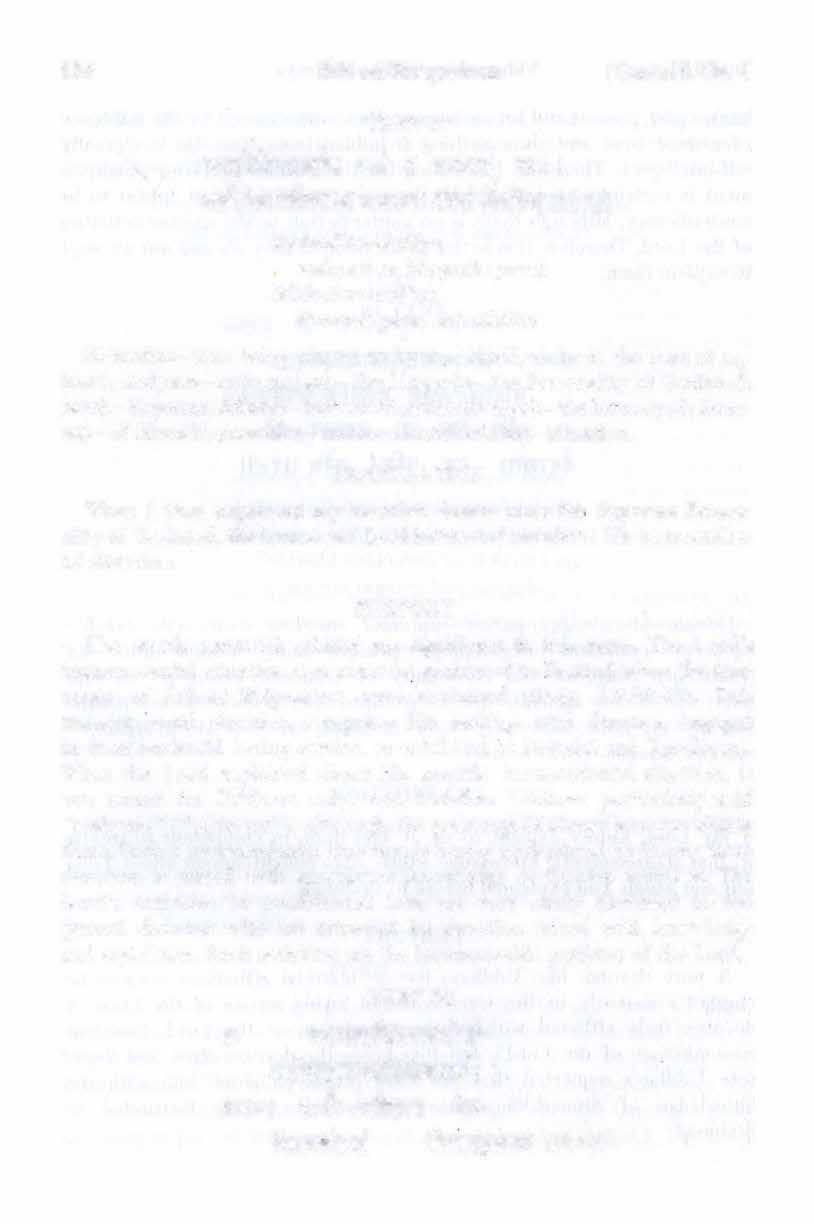
���f4:�hilt.::� � ij' � tR: I 3flf«:��ll(ftl"t.::ltf300fel:�f�II��II
ityiivedita-hiirdiiya
mahyarh sa bhagaviin para� iididesiiravindiik§a
iitmana� paramiirh sthitim
iti-avedita-thus being prayed to by me; hardaya- from the coreof my heart; mahyam-unto me; sa�- He; bhagavan- the Personality of Godhead; para�- Supreme; adidesa-instructed; aravinda-ak�a�-thelotus-eyed; atmanaft- of Himself;paramiim-transcendental; sthitim-situation.
TRANSLATION
When I thus expressed my heartfelt desires unto the Supreme Personality of Godhead, the lotus-eyed Lord instructed me about His transcendental situation.
PURPORT
The words paramiirh sthitim are significant in this verse. The Lord's transcendental situation was not even spoken of to Brahma when the four verses of Srimad-Bhiigavatam were explained (Bhiig. 2.9.30-33). This transcendental situation comprises His dealings with devotees engaged in transcendental loving service, as exhibited at Dvaraka and Vrndavana. When the Lord explained about His specific transcendental situation, it was meant for U ddhava only, and therefore Uddhava particularly said "mah.ram" ("unto me"), although the great sage Maitreya was also sitting there. Such a transcendental situation is hardly understood by thosewhose devotion is mixed with speculative knowledge or fruitive activities. The Lord's activities in confidential love are very rarely disclosed to the general devotees who are attracted by devotion mixed with knowledge and mysticism. Such activities aretheinconceivable pastimes of the Lord.
136 Srimad-Bhigavatarn [Canto 3, Ch. 4
TEXT 20 JJ o,q'41(1N6'Ht.::JP.ilt.::�66'*41€+4�'11'4'41•t:I � � q� �- . fitaf41dtst N((I�R¥41II� o II
Vidura Approaches Maitreya
sa evam iiriidhita-piida-tirthiidadhita-tattviitma-vibodha-miirgaft

prartamya piidau parivrtya devam
ihiigato 'ham virahiituriitmii
saft-so myself;evam-thus;aradhita-worshiped;pada-firthat-the Personality of Godhead; adhita-studied; , tattva-atma-self-knowledge; vibodha-understanding; margaft-path;pra{lamya-after saluting; padauat His lotusfeet;parivrtya-after circumambulating;devam-the Lord;ihaat this place; agatah-reached; aham-I; viraha-separation; iitura-atmaaggrieved in self.
TRANSLATION
I have studied the path of understanding self-knowledge from my spiritual master, the Personality of Godhead, and thus after circumambulating Him I have come to this place, very much aggrieved due to separation.
PURPORT
Sri U ddhava's actual life is the direct symbol of the "Catuftsloki Bhagavatam" enunciated first to Brahmijl by the Personality of Godhead. These four very great and important verses from Srimad-Bhagavatam are particularly taken out by the Mayavadi speculators, who construe a different purport to suit their impersonal view of monism. Here is the proper answer to such unauthorized speculators. The verses of SrimadBhagavatam are purely theistic science understandable by the postgraduate students of Bhagavad-gita. The unauthorized dry speculators are offenders at the lotus feet of the Lord Sri Kr�J.la because they distort the purports of Bhagavad-gita and Srimad-Bhagavatam to mislead the public andprepare a direct path to the hell known as andha-tamisra. As confirmed in Bhagavad-gita (Bg. 16.20) such envious speculators are without knowledge and are surely condemned life after life. They unnecessarily take shelter of Srlpada Sailkaracarya, but he was not so drastic as to commit an offense at the lotus feet of Lord Kr�J.la. According to Lord Sri Caitanya Mahaprabhu, Srlpada Sankaracarya preached the Mayavadi philosophy for a particular purpose. Such a philosophy was necessary to defeat the Buddhist philosophy of the nonexistence of the spiritsou� but it was never meant for perpetual acceptance. ·It was an emergency. Thus Lord Kr�J.la was accepted by Sankaracarya as the Supreme Personality of Godhead in his commentation on Bhagavad-gita. Since he was a great devotee of Lord Kr�J.la, he did not dare write any commentary on Srimad-Bhiigavatam because that would have been a direct offense at the lotus feet of the
Text 20]
137
Lord. But later speculators, in the name of Mayavadi philosophy, unnecessarily make their commentary on the Catu�sloki Bhiigavatam without any bona fide intent.
The monisticdry speculatorshave no business in the Srimad-Bhiigavatam because this particular Vedic literature is forbidden for them by the great author himself. Srila Vyasadeva has definitely forbidden persons engaged in religiosity, economic development, sense gratification and finally, salvation, from trying to understand Srimad-Bhiigavatam, which is not meant for them (Bhiig. 1.1.2). Sripada Sridhara Svami, the great commentator on Srimad-Bhiigavatam, has definitely forbidden the salvationists or monists to deal in Srimad-Bhiigavatam. It is not for them. Yet such unauthorized persons perversely try to understand SnmadBhiigavatam, and thus they commit offense at the feet of the Lord, which even Sripada Sankaracarya dared not do. Thus they prepare for their continuation of miserable life. It should be particularly noted herein that Uddhava studied the Catu�sloki Bhiigavatam directly from the Lord, who spoke them first to Brahmaji, and this time the Lord explained more confidentially the self-knowledge mentioned as the paramiirit sthitim. Upon learning such self-knowledge of love, Uddhava felt very much aggrieved by feelings of separation from the Lord. Unless one is awakened to the stage of Uddhava-everlastingly feeling the separation of the Lord in transcendental love, as was exhibited by Lord Caitanya also-one cannot understand the real import of the four essential verses of Snmad-Bhiigavatam. One should not indulge in the unauthorized act of twisting the meaning and thereby putting himself on the dangerous path of offense.
TEXT 21

mst
so 'ham tad-darsaniihliida
viyogiirtiyuta� prabho gami§ye dayitarit tasya
badaryiisrama-TI1art!lalam
sa� aham-thus myself; tat-His; darsana-audience; iihliida-pleasure; viyoga-without that; iirtiyuta(!-afflicted by distress; prabho-my dear sir; gami�ye-shall go; dayitam-so instructed; tasya-His; badaryiisramaBadarikasrama, in the Himalayas; ma�{lalam-association.



138 Srimad-Bhagavatam [Canto 3, Ch. 4
� � � ������
� I qfit�
My dear Vidura, now I am mad for want of the pleasure of seeing Him, and just to mitigate this I am now proceeding to Badarikasrama in the Himalayas for association, as I have been instructed by Him.
PURPORT
A pure devotee of the Lord of the standard of Uddhava constantly associates with the Lord in the double perception of simultaneous separation and meeting. The pure devotee is not for a moment unengaged in the transcendental service of the Lord. Execution of the Lord's service is the main occupation of the pure devotee. Uddhava's separation from the Lord was unbearable, and therefore he starte-d to Badarikasrama in obedience to the Lord's order because the order of the Lord and the Lord Himself are identical. As long as one is engaged in the execution of the order of the Lord, there is no factual separation from Him.
TEXT 22

q;r 'il(lttOit � it(� �rtliifliffif: I � � � �'W � �� 111(';(.11
yatra niiriiyaro devo naras ca bhagaviin nilt mrdu tivrarit tapo dirgharit tepiite loka-bhiivanau
yatra-where; niiriiyara�-the Personality of Godhead; deva�-by incarnation; naralt-human being; ca-also; bhagaviin-the Lord;r.sqt-great sage; mrdu-amiable to everyone; tivram-severe; tapa�-penance; dirgham -very long; tepiite-performing; loka-bhiivanau-welfare of all living entities.
TRANSLATION
There in Badarikasrama the Personality of Godhead, in His incarnation as the sages Nara and Naraya�a, has been undergoing great penance since time immemorial for the welfare of all amiable living entities.
PURPORT
Badarikasrama on the Himalayas, the abode of the Nara-NarayaJ;Ja sages, is a great place of pilgrimage for the Hindus. Even up to the present,
Text 22] Vidura Approaches Maitreya 139
TRANSLATION
hundreds and thousands of pious Hindus go to pay respects to the incarnation of Godhead Nara-Narii.yat;ta. It appears that even five thousand years ago this holy place was being visited by such a holy being as Uddhava, and even at that time the place was known to be very, very old. This particular pilgrimage site is very difficult to visit for ordinary men because of its difficult situation in the Himalayas in a place which is covered by ice almost all year. A few months during the summer season people can visit this place at great personal inconvenience. There are four dhiimas, or kingdoms of God, which represent the planets of the spiritual sky, which consists of the brahma-jyoti and the Vaikut;tthas. These are Badarikasrama, Rii.mdvaram, Jagannatha Pur! and Dvaraka. Faithful Hindus still visit all these holy places for perfection of spiritual realization, following in the footsteps of devotees like Uddhava.
TEXT 23

sri suka uviica
ity uddhaviid upiikan;ya suhrdiirh duftsaharh vadham
Fiiineniisamayat k�attii sokam utpatitam budhaft
sri sukaft uviica- Sri Suka Gosvii.mi said; iti-thus; uddhaviit-from Uddhava; upiikar!lya- hearing; suhrdiim-of friends and relatives; duftsaham-unbearable; vadham-annihilation; jniinena- by transcendental knowledge; asamayat-pacified himself; k�attii- Vidura; sokam-bereavement; utpatitam-arisen; budha�-the learned.
TRANSLATION
Sri Sukadeva Gosvami said: After hearing from Uddhava all about the annihilation of his friends and relatives, the learned Vidura pacified his overwhelming bereavement by dint of his transcendental knowledge.
PURPORT
Vidura was informed that the result of the Battle of Kuruk�etra was the annihilation of his friends and relatives as well as the destruction of the
140 Srimad-Bhagavatam [ Canto 3, Ch. 4
��
(€�4f�l�q� � �:� � I �IWfwtl�l'l� �·i)q�qRfd �: 11�·�11
Yadu dynasty and also the passing away of the Lord. All these hurled him into bereavement for the time being, but because he was highly advanced in transcendental knowledge, he was quite competent to pacify himself by enlightenment. As it is stated in Bhagavad-g'itii, due to our long association with bodily relationships, bereavement on account of the annihilation of friends and relatives is notat all astonishing, but one has to learn the art of subduing such bereavement with higher transcendental knowledge. The talks between Uddhava and Vidura on the topic of Kpll')a began at sunset, and Vidura was now further advanced in knowledge due to his association with Uddhava.
TEXT 24

sa tam mahii-bhiigavatam vrajantam kauravar�abha� visrambhiid abhyadhattedam mukhyam knr_�,a-parigrahe
sa[!.- Vidura; tam-unto Uddhava; mahii-bhiigavatam-the great devotee of the Lord; vrajantam- while going; kaurava-r�abha-the be t amongst the Kauravas; visrambhiit-out of confidence; abhyadhatta-submitted; idam -this ; mukyam- unto the chief; lcJ;s.f!a-Lord Kpma; parigrahe - in devotional service to the Lord.
TRANSLATION
While Uddhava, the chief and most confidential amongst the devotees of the Lord, was going away, Vidura, in affection and confidence, questioned him.
PURPORT
Vidura was much older than Uddhava. By family relationship Uddhava was a contemporary brother of Kr�l')a's, while Vidura was as elderly as Kr�!]a's father Vasudeva. But although junior by age, Uddhava was much advanced in the devotional service of the Lord, and therefore he is described herein as the chief amongst the devotees of the Lord. Vidura was confident about this, and thus he addressed Uddhava in that higher category. That is the way of courteous dealings between two devotees.
Text 24] Vidura Approaches Maitreya 141
. �
« ij �iFf� fit��� i�
� ���
�'Pl: I �uNR� ll�'dll
TEXT 25 �� r« �k44��:3l�� � �it�cH t�€f I
vidura uviica
jniinarh pararh sviitrna-raha�-prakiisarh · yad iiha yogesvara isvaras te vaktum bhaviin no 'rhati yadd hi vi§ftor bhrtyii� sva-blqtyiirtha-krtas caranti
vidura� uviica- Vidura said;jniinam-knowledge;param-transcendental; s va-iitma-regarding the self; raha�-mystery; prakiisam-enlightening; yatthat which; iiha-said; yoga-isvara�-the master of all mystics; isvara�-the Lord; te-unto you; vaktum-to narrate; bhaviin-your good self; na�- unto me; arhati-deserve; yat-for; hi-reason of; vi�[10�-of Lord Vi�t:tu; bhrtya�-servant s ; sva-bhrtyartha-krta�-for the interest of their servants; caranti-do wonder.

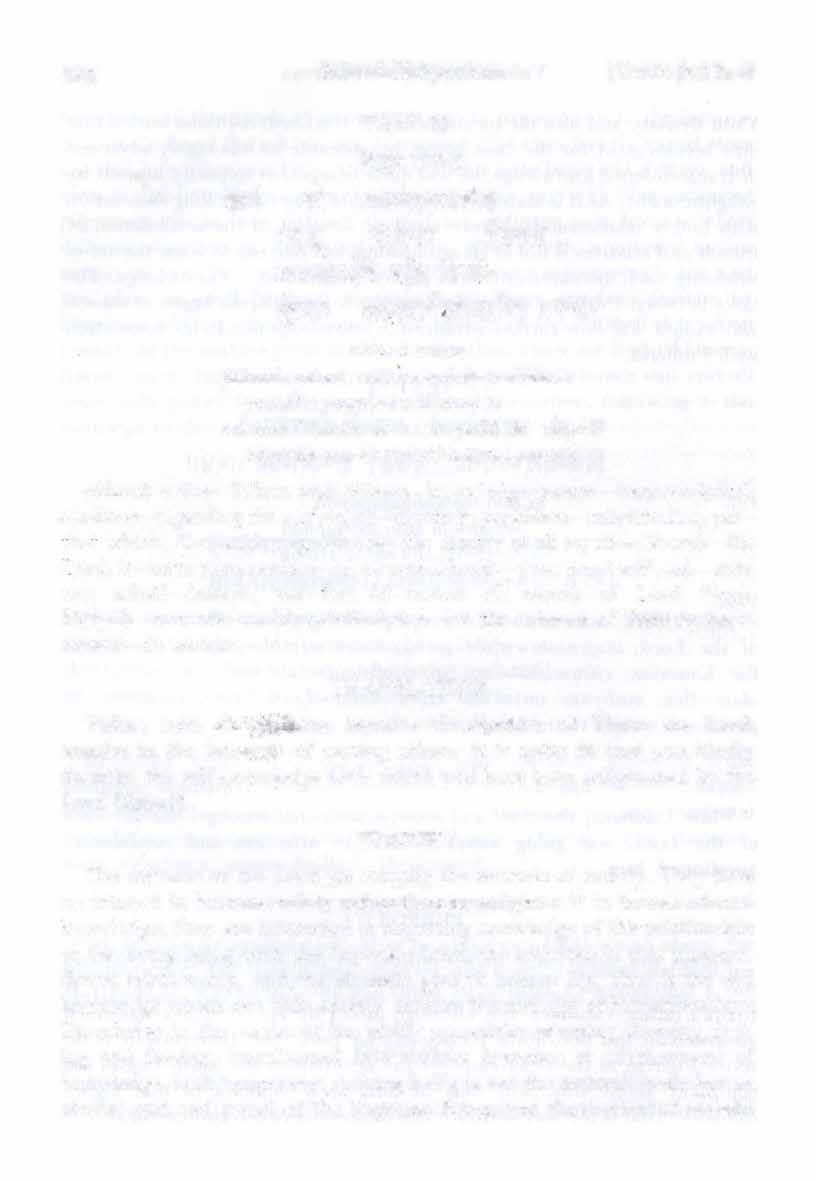
TRANSLATION
Vidura said: 0 l.Jddhava, because the servants of Vi��u, the Lord, wander in the interest · of serving others, it is quite fit that you kindly describe the self-knowledge with which you have been enlightened by the Lord Himself.
PURPORT
The servants of the Lord are actually the servants of society. They have no interest in human society other than to enlighten it in transcendental knowledge; they are interested in imparting knowledge of the relationship of the living being with the Supreme Lord, the activities in that transcendental relationship, and the ultimate goal of human life. That is the real knowledge which can help society achieve the real aim of human welfare. Knowledge in the matter of the bodily necessities of eating, sleeping, mating and fearing, transformed into various branches of advancement of knowledge, is all temporary. A living being is not the material body but an eternal part and parcel of the Supreme Being, and thus revival of his self-
142 • � Srimad-Bhagavatam
��: �'���
.. .#
��s�ftf � f?ftujlr
������
[Canto 3, Ch. 4
knowledge is very essential. Without this knowledge, the human life is baffled. The servants of the Lord, Vi�l).u, are entrusted with this responsible work, and so they wander over the earth and to all other planets in the universe. Thus the knowledge which was receivedby Uddhava directly from the Lord deserves to be distributed in human society, especially to persons like Vidura who are highly advanced in the devotional service of the Lord.
Realtranscendental knowledge descends in the disciplic succession from the Lord to Uddhava, from Uddhava to Vidura and so on. Such supreme transcendental knowledge is not possible to achieve by the process of imperfect speculation as performed· by the so-called learned mundane wranglers. Vidura was anxious to know from Uddhava that confidential knowledge known as paramam sthitim, in which the Lord is known by His transcendental pastimes. Although Vidura was older than Uddhava, he was anxiousto become a servant of Uddhavain the transcendentalrelationship. This formula of transcendental disciplic succession is taught by Lord Caitanya also. Lord Caitanya advises that one receive transcendental knowledge from anyone-whether a brahmaT}U Or a siidra, a householder Or a sannyasi-provided that person is factually conversant with the science of Kr�rya. A person who knows the science of Kr�rya is factually a bona fide spiritual master.
TEXT 26


:,.�:�
������:�'ft(4tsffi· I �s� �� fu�11�'11
uddhava uvaca
nanu te tattva-samradhya r.si� kau�iiravo 'ntike
sak�ad bhagavata "di�to martya-lokam jihasata
sri uddhava� uvaca-Sri Uddhava said; nanu-however; te-yourself; tattva-samradhya�-one who isworshipablefor reception of transcendental knowledge; r�*-learned scholar; kau�iirava�-unto the son of Ku�aru (Maitreya); antike-staying nearby; sak�at-directly; bhagavata-by the Personality of Godhead; iidi�ta�-instructed;martya-lokam-mortal world; jihasata-while quitting.
Text 26] Vidura Approaches Maitreya 143
Sri Uddhava said: You may take lessons from the great learned sage Maitreya, who is nearby and who is worshipable for reception of transcendental knowledge. He was directly instructed by the Personality of Godhead while He was about to quit this mortal world.
PURPORT

AJthough one may be well versed in the transcendental science, one should be careful about the offense of maryii-diivyati-krama, or impertinently surpassing a greater personality. According to scriptural injunction one should be very careful of transgressing the law of maryii-diivyatikrama because by so doing one loses hi duration of life, his opulence, fame, piety and the blessings of all the world. To be well versed in the transcendental science necessitates awareness of the techniques of spiritual science.
Uddhava, being well aware of all these technicalities of transcendental science, advised Vidura to approach Maitreya R,�i to receive transcendental knowledge. Vidura wanted to accept Uddhava as his spiritual master, but Uddhava did not accept the post because Vidura was as old as Uddhava's father and therefore Uddhava could not accept him as his disciple, especially when Maitreya was present nearby. The rule is that in the presence of a higher personality one should not be very eager to impart instructions, even if one is competent and well-versed. So Uddhava decided to send an elderly person like Vidura to Maitreya, another elderly person, but he was well versed also because he was directly instructed by the Lord while He was aboutto quit this'mortal world. Since both Uddhava and Maitreya were directly instructed by the Lord, both had the authority to become the spiritual master of Vidura or anyone else, but Maitreya, being elderly, had the first claim to becoming the spiritual master, especially for Vidura, who was much older than Uddhava. One should not be eager to become a spiritual master cheaply foi- the sake of profit and fame, but should become a spiritual master only for the service of the Lord. The Lord never tolerates the impertinence of maryii-diivyati-krama. One should never pass over the honor due to an elderly spiritual master in the interests of one's own personal gain and fame. Impertinence on the part of the p ·uedo-spiritual master is very risky to progressive spiritual realizalion.

144 Srimad-Bhagavatam [Canto 3, Ch. 4
TRANSLATION
srT suka uviica
iti saha vidure[ta visva-murter gu[ta-kathayii sudhayii pliivitorutiipa�
k�a[tam iva puline yamasvasus tiirh samu�ita aupagavir nisiirh tato'giit
srT suka� uviica-Sri Sukadeva Gosvami said; iti-thus; saha-along with; vidrue[ta- Vidura; visva-murte�-of the Universal Person; gu[ta-kathayiiin the discourse of transcendental qualities; sudhayii-nectarean; pliivitaurutiipa�-overwhelmed by great affliction; k�a[tam-moment; iva-like that; puline-on the bank of; yamasvasu� tam- River Yamuna; samu,sita�passed on; aupagavih -the son of Aupagava (Uddhava); nisiim-the night; tata�-thereafter; agiit-went away.
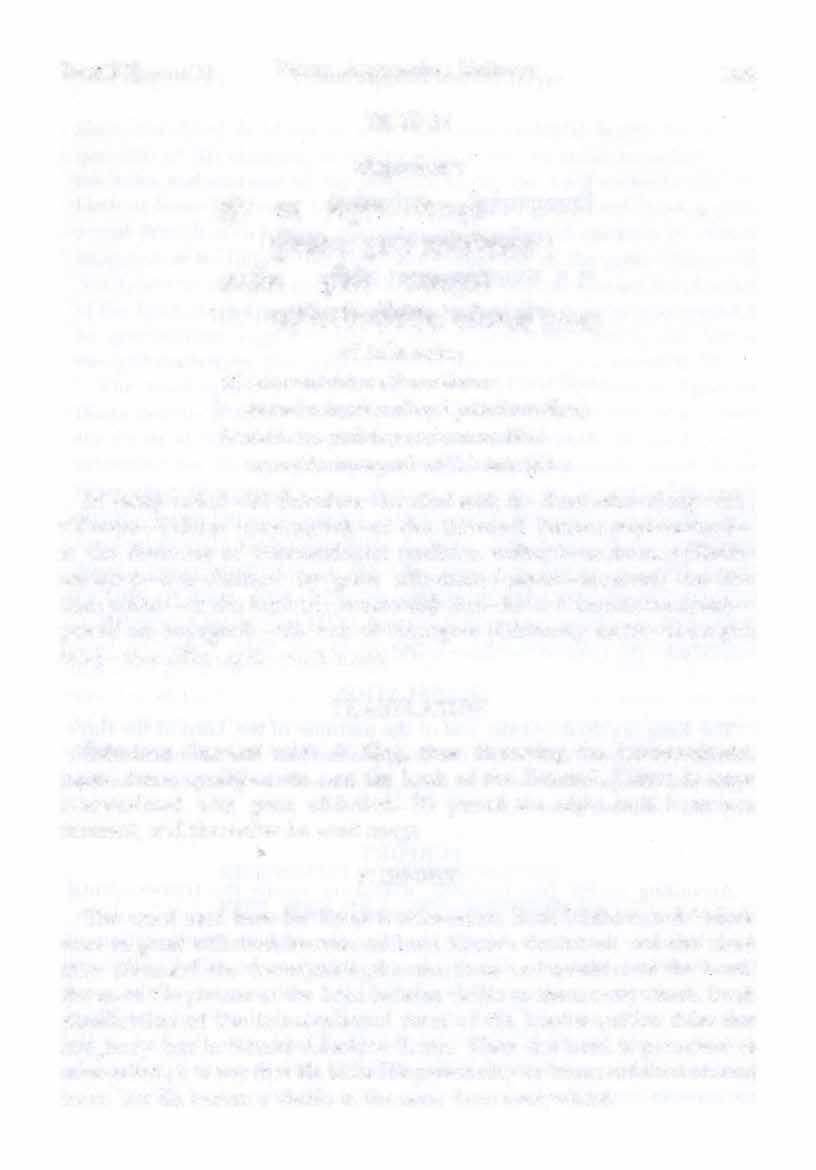
TRANSLATION
Sukadeva Gosvami said: 0 King, thus discussing the transcendental name, fame, qualities, etc., on the bank of the Yamuna, Vidura became overwhelmed with great affliction. He passed the night as if it were a moment, and thereafter he went away.
PURPORT
The word used here for Kr�qa is visva-murti. Both Uddhava and Vidura were in great affliction because of Lord Kr1Jqa's departure, and the more they discussed the transcendental name, fame and qualities of the Lord, the more the picture of the Lord became visible to them everywhere. Such visualization of the transcendental form of the Lord is neither false nor imaginary but is factual Absolute Truth. When the Lord is perceived as visva-murti, it is not that He loses His personality or transcendental eternal form, but He becomes visible in the same form everywhere.
Text 27] Vidura Approaches Maitreya
�u·��·
� ��
TEXT 27 �� � � �"' R-q�
ij1:lq{ �INffl�N: I �Ulf'lq
��3tlq•tfclf.l�im� ���\911
145
28
�N��q�q-!1 I'�: I � Q
uq- � 3{� ?t{�: ������
riijoviica
nidhanam upagate�u VfFJ.i-bhoje�v
adhjratha-yuthapa-yuthape�u mukhya� sa tu katham avasi�ta uddhavo yadd harir api tatyaja iikrtirit tryadh"isa�
sn ra1a uviica-the King inquired; nidhanam-destruction; upagate�uhaving overtaken;vr�rti-of the Vr�t:�i dynasty;bhoje� u-the Bhoja dynasty; adhiratha-great commander; yuthapa - commander- in-chief; yuthape.suamongst them; mukhyab,-prominent; sab,-he; tu-only; katham-how; avasi�.ta�-remained;uddhavab,-Uddhava;yat-whereas;har*-the Personality of Godhead; api-also;tatyaje-finished;iikrtim-complete pastimes; tri-adhisa�-the Lord of the three worlds.
TRANSLATION
The King inquired: At the end of the pastimes of the Lord of the three worlds, Sri Kr�J.la, and after the disappearance of the members of the Vr�J.li and Bhoja dynasties, who were the best of the great commanders, why did Uddhava alone remain?
PURPORT
According to Sr! ]lva Gosvam!, nidhanarn means the transcendental abode of the Lord. Ni means the highest, and dhanam means opulence. And because the abode of the Lord is the highest manifestation of transcendental opulence, His abode can therefore be called nidhanam. Apart frc.m the grammatical elucidation, the real purpose of the word nidhanam is to indicate that all the members of the Vr�l').i and Bhoja dynasties were direct associates of the Lord, and after the end of His pastimes, all the associates were dispatched to their respective positions in the transcendental abode.
Sr!la Visvanatha Cakravart! Thakur elucidates the meaning of iikrtim as pastimes. A means complete, and krtim means transcendental pastimes.
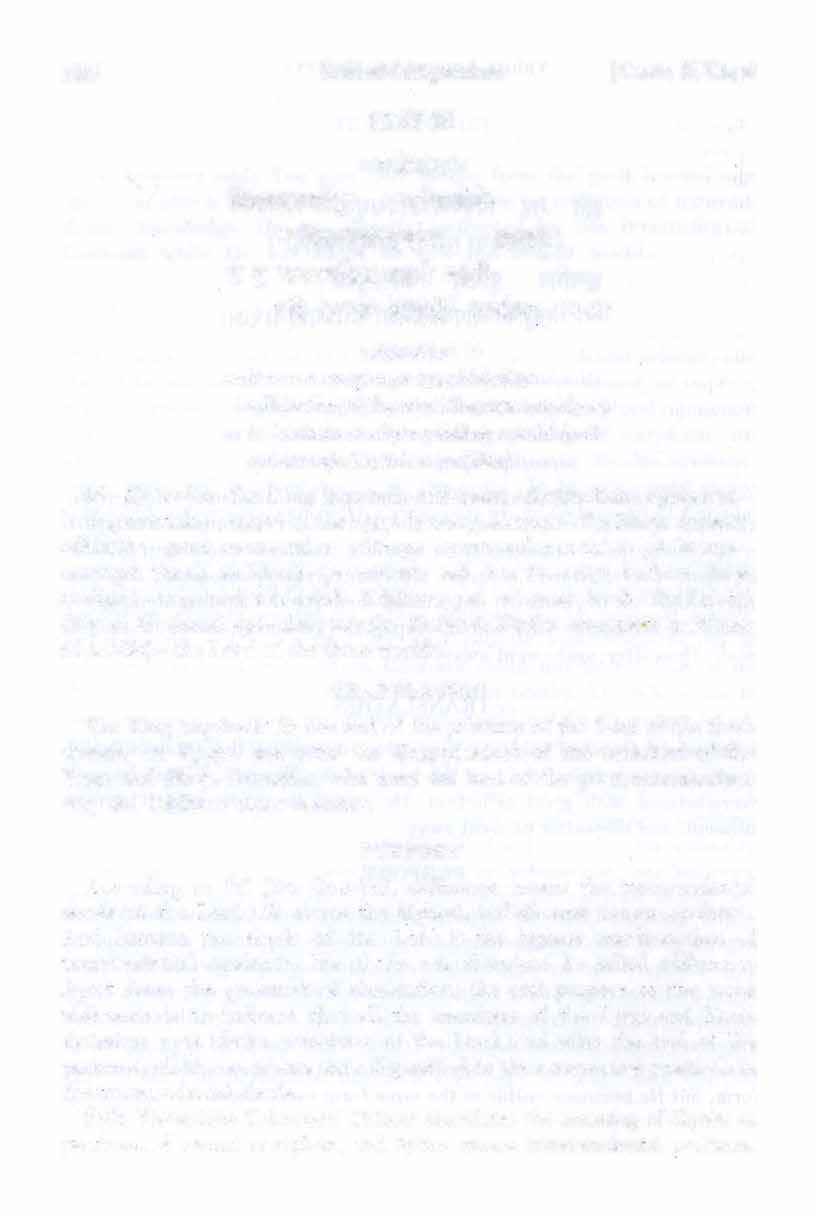
146
Srimad-Bhagavatam
TEXT
�� f.N�·utq•,ij! �unit�-
�fu!��:{ft-
[Canto 3, Ch. 4
Since the Lord is identical with His transcendental body, there is no question of His changing or quitting His body. To act in accordance with the rules and customs of the material world, the Lord seems to take His birth or leave His body, but the pure devotees of the Lord know well the actual fact. It is necessary, therefore, for the serious students of SrimadBhiigavatam to follow the notes and comments of the great iiciiryas like Jiva Gosvami and Visvanatha Cakravarti. To others, who are not devotees ofthe Lord, the comments and explanations ofsuch iiciiryas may appear to be grammatical jugglery, but to the students who are in the line of disciplic succession, the explanations of the great iiciiryas are quite fit.
The word upagate�u is also significant. All the members of Vr;;!)i and Bhoja directly reached the abode of the Lord. Other devotees do not reach the abode of the Lord directly, but the pure associates ofthe Lord have no attraction for the opulence of any planets of the material world. Sometimes, due to inquisitiveness, devotees who are to be promoted to the abode of the Lord have some attraction for the opulence of the higher material planets above the earth, and thus they desire to see them while going up to the perfection. But the Vr;;!)is and Bhojas were directly dispatched because they had no attraction for material planets. Srila Visvanatha Cakravarti Thakur also suggests that according to the Amarakosa dictionary, iikrti also means signal. Lord Kriil')a ordered Uddhava by signal to go to Badarikasrama after His departure, and Uddhava, as a pure devotee of the Lord, carried out the order more faithfully than going back to Godhead or the abode of the Lord. That was the cause of his remaining alone even after the departure of the Lord from the face of the earth.
"' " i!fil 'll+ilq�TTS:�: I


srf suka uviica
brahma-siipapadesena
kiileniimogha-viincchita?t
samhrtya sva-kularh sphitarh
tyak�yan deham acinta-yat
sri suka� uviica- Sukadeva Gosvami said; brahma-siipa-cursing by the briih"'flnas;apadesena-on the plea, by such a show; kiilena-by the eternal time; amogha-unfailing; viincchita�-one who so desires; sarhhrtya-

Text 29) Vidura Approaches Maitreya 147
TEXT 29 ��en�
� ·��� �� �;;r���� 11�<?,11
closing; sva-kulam-own family; sph!tam-exce sively numerous; tyak§yan- for disappearing; deham-the universal form; acinta-yat-th ought to Himself.

TRANSLATION
Sukadeva Gosvami replied: My dear King, the cursing of the brahma!las was only a plea, but the actual fact is the supreme desire of the Lord. He wanted to disappear from the face of the earth after dispatching His excessively numerous family members. He thought to Himself as follows:
PURPORT
In this verse the word tyak§yan is very significant in relation to Lord Sri Kr�qa's leaving His body. Since He is the eternal form of existence, knowledge and bliss, His body and His Self are identical. Therefore how is it possible that He would leave His body and then disappear from the vision of the world? There is a great controversy amongst the nondevotees or Miiyiiviidis about the mysterious disappearance of the Lord, and the doubts of those men with a poor fund of knowledge have been very elaborately cleared by Srlla Jiva Gosvaml in his Krrrw-sandarbha.
According to Brahma-samhitii, the Lord has many forms. It is stated therein that the Lord has innumerable forms, and when He appears within the vision of the living entities, as Lord Kr�qa actually appeared, all such forms amalgamate with Him. Besides all these infallible forms, He has His universal form, as manifested before Arjuna on the Battlefield of Kuruk�etra. Here in this verse the word sphitam is also used, which indicates that He left His gigantic universal form called the viriita-rupa, not His primeval, eternal form, because there is hardly any possibility of His changing His form of sac-cid-iinanda. This simple understanding is at once realized by the devotees of the Lord, but those who are nondevotees, who perform hardly any devotional service to the Lord, either do not understand this simple fact or purposely raise a controversy to defeat the eternity of the transcendental body of the Lord. This is due to the defect called the cheating propensity of the imperfect living entities.
By practical experience also, it is seen, up to the present day, that the Lord's transcendental form is worshiped by devotees in different temples, and all the devotees of the Lord factually realize that the form of the Deity in the temple is nondifferent from the form of the Lord. This inconceivable performance of the internal potency of the Lord is described in IJ/wgavml-gitii: niiham praka.<a� sarvasya yogamiiyii-samavrtatt. (Bg. 7.25)
The Lord reserves the right of not being exposed to everyone. In the
148 Srimad-Bhagavatam [Canto 3, Ch. 4
Padma .Purii[la it is said, ata� sri-kr§t:w-niimiidi na bhaved griihyam indriya*. The name and form of the Lord cannot be perceived by the material senses, but when He appears within the vision of the mundane people He assumes the form of the viriita-rupa. This is an additional material exhibition of form and is supported by the logic of a subject and its adjectives. In grammar, when an adjective is taken away from the subject, the subject it modifies does not change. Similarly, when the Lord quits His virii{n-rupa, His eternal form does not change, although there is no material difference between Himselfand any one of His innumerable forms. In the Fifth Canto it will be seen how the Lord is worshiped in different planets in His different forms, even now, and how He is worshiped in different temples of this earth also.
Srlla ]Iva Gosvaml and Srila Visvanatha Cakravarll Thakur have very elaborately explained this incidence of the Lord's disappearance in their commentaries, quoting various authentic versions of Vedic literatures. We purposely do not include them all here to avoid an increase in the volume of this book. The entire matter is explained in Bhagavad-gitii, as quoted above: the Lord reserves the right of not being exposed to everyone. He always keeps Himself out of the vision of the nondevotees, who are devoid of love and devotion, and thus He puts them still further away from the Lord. The Lord appeared on theinvitation of Brahma, who prayed before the K�lrodakasayl Vi�t;JU, and therefore when the Lord appeared, all the forms of Vi�t:IU amalgamated with Him,and when the mission wasfulfilled, all of them disintegrated from Him in the usual course.

asmallokiid uparate mayi ji'iiin'ath mad-iisrayam
arhaty uddhava eviiddhii sampraty iitmavatiim vara�
asmiit-from this (universe); lokiit-earth; uparate-having disappeared; mayi-of Myself; jtiiinam-knowledge; mat-iisrayam-concerning Myself; arhati- deserves; uddhava?l- Uddhava; eva-certainly; addhii-directly; samprati-al l.he present moment; iitmavatiim-of the devotees; vara(tforemost.
Text 30) Vidura Approaches Maitreya 149
��·�q'{_ 1 �� JJ;ellit ��·��ijf t��:
TEXT 30 3l.Witti\ifil�m �fir �;{
II� o II
Now I shaU leave the vision of this mundane world, and I see that Uddhava, the foremost of My devotees, is the only one who can he directly entrusted with knowledge about Me.
PURPORT
.Jriiinarh mad-ii.�rayarn is significant in this verse. Transcendental knowledge has three departmental divisions, namely knowledge of impersonal Brahman, knowledge of the all-pervading Supersoul and knowledge of the Personality of Godhead. Out of the three,transcendental knowledge of the Personality of Godhead has special significance and is known as bhagavattattva-vijriam, specific knowledge of the Personality of Godhead. This specific knowledge is realized by pure devotional service and no other means. Bhagavad-gitii (Bg. 18.55) confirms this: bhaktyii miim abhijiiniili yavan yas ca smi tattvata{1.. "Only persons engaged in devotional service can factually know the transcendental position of the Lord." Uddhava was considered to be the best amongst all devotees of that time, and therefore he was directly instructed by the Lord's grace, so that people might take advantage of U ddhava's knowledge after the disappearance of the Lord from the vision of the world. This is one of the reasons why Uddhava was advised to go to Badarikasrama, where the Lord is personally represented by the Nara-Narayar)a Deity. One who is transcendentally advanced can gain direct inspirationfrom the temple Deity, and thus a devotee of the Lord always takes shelter of a recognized temple of the Lord in order to make tangible advancement in transcendental knowledge by the grace of the Lord.
TEXT 31

�cftsuq{q'f"ff��oro:rt��n ��: 1
3«ft �;:i �)i !lm�� ftJgQ;II��II
noddhavo 'rw api man-nyuno yad gur:tair nardita{'L prabhult ato mad-vayunam lokarh
griihayann iha ti§thatu
rw-not; uddhavaft- Uddhava; ar:tu-slightly; api-also; mat- Myself; nyuna(t-inf erior; yat- because; gurw* - by the modes of material nature; na-nor; ardita�- �ffected; prabhu�-master; ata�- therefore; mat-vayu-
150 Sr'imad-Bhagavatam [Canto 3, Ch. 4
TRANSLATION
nam-knowledge of Me (the Personality of Godhead); lokam-the world; grahaya n -just to disseminate; iha-in this world; ti,sphatu-may remain.
TRANSLATION
Uddhava is not inferior to Me in any way because he is never affected by the modes of material nature. Therefore he may remain in this world in order to disseminate specific knowledge of the Personality of Godhead.
PURPORT
The specific qualification for becoming the representative of the Lord is to be unaffected by the material modes of nature. The highest qualification of a person in the material world is to be a briihma[ta. But since a briihma[ta is in the mode of goodness, to be a briihma[ta is not sufficient for becoming a representative of the Lord. One has to transcend the mode of goodness abo and be situated in unalloyed goodness, unaffected by any of the qualities of material nature. This stage of transcendental qualification is called suddha-sattva, or viisudeva' and in this stage the science of Cod can be realized. As the Lord is not affected by the modes of material nature, so a pure devotee of the Lord is also not affected by the modes of nature. That is the primary qualification for being one with the Lord. A person who is able to attain this transcendental qualification is called jivanmukta, or liberated, even though he is apparently in material conditions. This liberation is achieved by one who constantly engages in the transcendental loving service of the Lord. In Bhakti-rasiimrta-sindhu it is stated:
lhii yasya harer diisye karma[tii manasii girii nikhiliisv apy avasthiisu jivanmukta� sa ucyate.
"Anyone who, by his actions, mind and words, lives only for the transcendental loving service of the Lord, is certainly a liberated soul, even though he may appear to be in a condition of material existence." U ddhava was in such a transcendental position, and thus he was selected to be the factual representative of the Lord in His bodily absence from the vision of the world. Sucha devotee ofthe Lordis never affected by materialstrength, intelligence or even renunciation. Such a devotee of the Lord can withstand all onslaughts of material nature, and therefore he is known as gosvami. Only such gosvamis can penetrate the mysteries of the Lord's transcendental loving relationships.

Text 31] Vidura Approaches Maitreya 151
TEXT 32

� f?le(��un m��: �� I �����mm �Wl� ijmN;n II��II
evarh tri-loka-guru[lii sandi�ta� sabda-yoninii badaryiisramam iisiidya harim ije samiidhinii
evam-thus; tri-loka-three worlds; guru[lii-by the spiritual master; sandi�. ta�-being perfectly taught; sabda-yoninii-by one who is the source of all Vedic knowledge; badarya-iisramam-in the pilgrimage site of Badarikasrama; iisiidya- reaching; harim-unto the Lord; "ije-satisfied; samadhina- by trance.
TRANSLATION
Sukadeva Gosvami informed the King that Uddhava, being thus instructed by the Supreme Personality of Godhead, who is the source o( all Vedic knowledge and the spiritual master of the three worlds, reached the pilgrimage site of Badarikasrama and engaged himself there in trance to satisfy the Lord.
PURPORT
Lord Sri Kr�� is factually the spiritual master of the three worlds, and He is the original source of all Vedic knowledge. It is very difficult, however, to understand the personal feature of theAbsolute Truth, even from the Vedas. His personal instructions are needed in order to understand the Personality of Godhead as the Supreme Absolute Truth. Bhagavad-gitii is the evidence of such transcendental knowledge in gist. One cannot know the Supreme Lord unless one is graced by the Lord Himself. Lord Kr�va exhibited this specific mercy towardsArjuna and Uddhava while He was in the material world.
Undoubtedly. Bhagavad-gita was spoken by the Lord on the Battlefield of Kuruk�etra just to encourage Arjuna to fight, and yet to complete the transcendental knowledge of Bhagavad-gita, the Lord instructed Uddhava. The Lord wanted Uddhava to fulfill His mission and disseminate knowledge which He had not even spoken in Bhagavad-gl:ta. Persons who are attached to the words of the Vedas may also know from this verse that the Lord is the source of all Vedic knowledge. One who is unable to
152 Srimad-Bhagavatam [Canto 3, Ch. 4
understand the Supreme Personality of Godhead by going through the pages of the Vedas may take shelter of one of the Lord's devotees, such as Uddhava,in order to advancefurtherin knowledge of the Supreme Personality of Godhead. The Brahma-sarhhitii says that it is very difficult to understand the Supreme Personality of Godhead from the Vedas, but He is easily understood from a pure devotee like Uddhava. Taking mercy on the great sages who lived at Badarikasrama,the Lord authorized Uddhava to speak on His behalf. Unless one has such authorization, one cannot understand or preach the devotional service of the Lord.

While present on this earth, the Lord executed many uncommon activities, even traveling in space to bring down the piirijiita from heaven and recoveringthe son of His teacher (Sandlpani l\1uni) from the regions of death. Uddhava was certainly informed of the conditions of life on other planets, and all the sages were anxious to know of them, just as we are anxious to know about the planets in space. Uddhava was particularly deputed to carry a message to Badarikasrama, not only to the sages of that place of pilgrimage but also to the Nara-Naraya�a Deities. Such a message must have been more confidential than the knowledge described in the pages of the Vedas.
The Lord is undoubtedly the source of all knowledge, and the messages dispatched through Uddhava to Nara-Naraya�a and other sages were also part of the Vedic knowledge, but they were more confidential and could be sent or understood only through such a.pure devotee as Uddhava. Since such confidential knowledge was known only to the Lord and Uddhava, it is said that Uddhava is as good as the Lord Himself. Every living entity can, like Uddhava, also become a confidential messenger on the same level as the Lord, provided he becomes confidential himself by dint of loving devotional service. Such confidential knowledge is entrusted, as confirmed in Bhagavad-g"itii, only to pure devotees like Uddhava and A�una, and one has to learn the mystery through them, and not otherwise. One cannot understand Bhagavad-g"itii or Sr"imad-Bhiigavatam without the help of such confidential devotees of the Lord. According to Srila Visvanatha Cakravarti Thakur, that confidential message must have concerned the mystery of His departure and the annihilation of His dynasty after the end of His appearance in the mundane world for one hundred years. Everyone must have been very anxious to know about the mystery of the annihilation of the Y adu dynasty, and that message must have been explained by the Lord to Uddhava and dispatched to Badarikasrama for the information of Nara-Naraya�a and other pure devotees of the Lord.
Text 32] Vidura Approaches Maitreya 153
TEXT 33

fif�US�itll;;��l
ii"ITI� q�t�;r: I �m���� �fUT ��WI :q ������
viduro 'py uddhaviic chrutvii k!§�Jasya paramiitmana� krit;layopiitta-dehasya karmii[!i sliighitiini ca
vidura�- Vidura; api-also; uddhaviit-from the source of Uddhava; srutvii-having heard; kr��Jasya-of Lord Kr�TJ.a; paramiitmana�-of the Supersoul; krit;layii-for the sake of pastimes in the mortal world; upiittaextraordinarily accepted; dehasya-of the body; karmii[li-transcendental. activities; sliighitiini-most glorious; ca-also.
TRANSLATION
Vidura also heard from Uddhava about the appearance and disappearance of Lord Kr�r;ta, the Supersoul, in the mortal world, which is a subject matter sought after with great perseverance by the great sages.
PURPORT
The subject matter of the appearance and disappearance of the Supersoul, Lord Sri Kr$r:ta, is a mystery even for the great sages. The word paramiil;mana� is significant in this verse. An ordinary living being is generally called the iitmana�, but Lord Kr��l\1 is never an ordinary living being because He is paramiitmanaft, the Supersoul. Yet His appearance as one of the human beings and His disappearance again from the mortal world are subject matters for the research workers who execute research work with great perseverance.Such subject matters are certainly of increasing interest because the researchers have to search out the transcendental abode of the Lord, which He enters after finishing His pastimes in the mortal world. But even the great sages have no information that beyond the material sky there is the spiritual sky where Sri KnDa eternally resides with His associates, although at the same time He exhibits His pastimes in the mortal world in all the universes one after another. This fact is confirmed in Brahma-samhitii (Bs. 5.37): goloka eva nivasaty akhiliitmabhuta�. "The Lord, by His inconceivable potency, resides in His eternal abode, Goloka, yet at the same time, as the Supersoul, He is present everywhereboth in the spiritual and material skies-by His multivarieties of manifestation." Therefore His appearance and disappearance are simultaneously
154 Srimad-Bhagavatam [Canto 3, Ch. 4
going on,andno onecan say definitely whichof them is thebeginning and which is the end. His eternal pastimes have no beginning or end, andone has to learn of them from the pure devotee only and not waste valuable time in so-called research work.
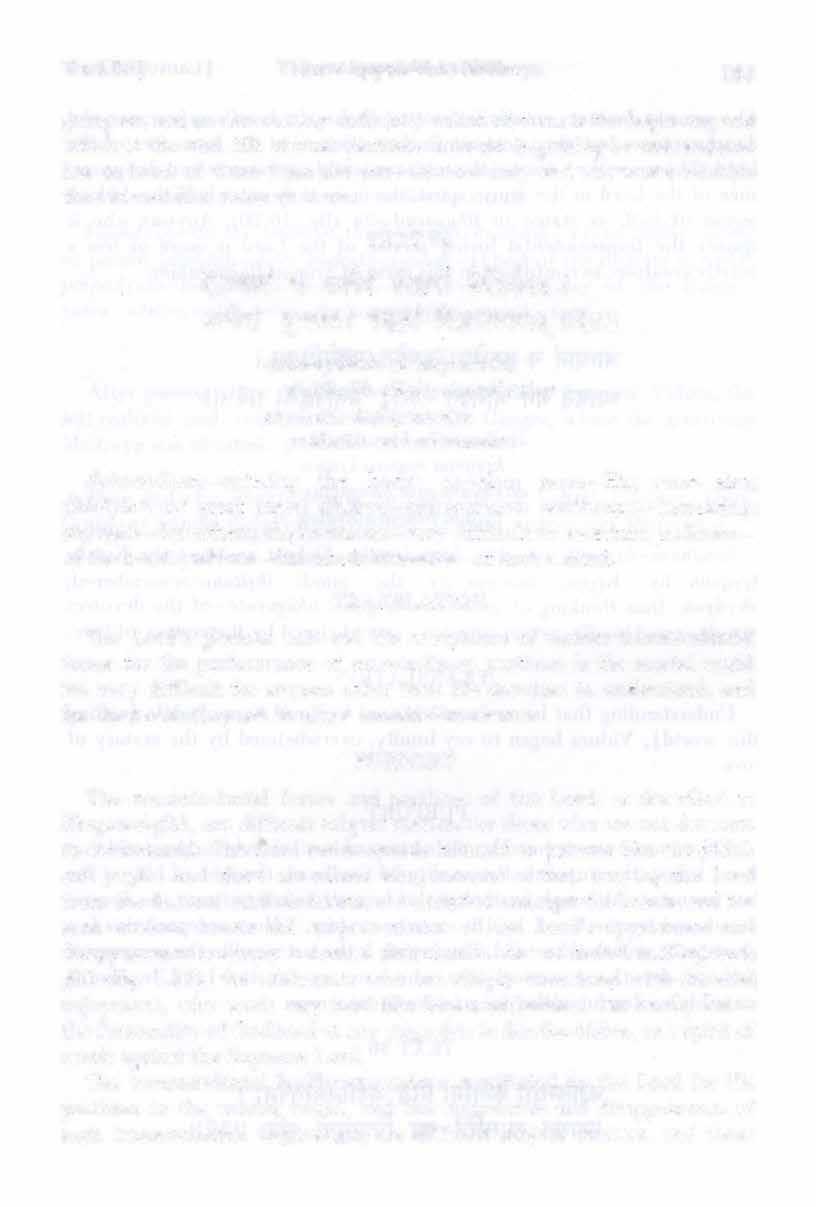
TEXT 34 {tiritte � ��� 1-lTUotT ��� I ��t ��t 'ffl__.n Ft��� ll�'dll
deha-nyasam ca tasyaivam dhirartam dhairya-vardhanam anye§am du§karataram pasiinam viklavatmanam
deha-nyiisam-entering the body; ca-al. so; tasya-His; evam-also; dhirart iim- of great sage s; dhairya-perseverance; vardhanam-increa ing; any e §am-for others; du§karataram-very difficult to ascertain; pasiinamof the beasts; viklava-disturbed; atmanam- of such a mind.
TRANSLATION
The Lord's glorious acts and His acceptance of various transcendental forms for the performance of extraordinary pastimes in the mortal world are very difficult for anyone other than His devotees to understand, and forthebeaststheyare simply a mental disturbance.
PURPORT
The transcendental forms and pastimes of the Lord, as described in Bhagavad-g"ita, are difficult subject matters for thosewho are not devotees to understand. The Lord never reveals Himself to persons like the Fian"is and yogis. And there are others who, because of their envying the Lord from the bottom of their hearts,are classified amongstthe beasts, andfor such envious beasts the subject matter of the Lord's appearance and disappearance is simply a mental disturbance. As confirmed in Bhagavadg'ita (Bg. 7.15), the miscreants who are simply concerned with material enjoyment, who work very hard like beasts of burden, can hardly know thePersonality of Godheadat any stagedue to asurika-bhava, or a spiritof revolt against theSupreme Lord.
The transcendental bodily expansions manifested by the Lord for His pastimes in the mortal world, and the appearance and disappearance of such transcendental expansions, are difficult subject matters, and those
Text 34] Vidura Approaches Maitreya 155
who are not devotees are advised not to discuss the Lord's appearance and disappearance, lest they commit further offenses at the lotus feet of the Lord. The more they discuss the transcendental appearance and disappearance of the Lord in the asuric spirit, the more they enter into the darkest region of hell, as stated in Bhagavad-gTtii (Bg. 16.20). Anyone who is against the transcendental loving service of the Lord is more or less a beastly creature, as confirmed in this verse of Srimad-Bhiigavatam.
TEXT 35

�r.i :q ��g �tij;J ���'{, I
\i�p;r;f � �ij- � ��a-: ������
iitmiinarh ca kuru-sre�tha kr�T.tena manasek§itam dhyiiyam gate bhiigavate ruroda prema-vihvalal), iitmanam- himself; ca-also; kuru-sre�.tha-0 best amongst the Kurus; kr§f.lena-by Kr�qa; manasii- by the mind; ik�itam- remembered; dhyiiyan-lhus lhinki n g of; gate-having gone ; bhiigavate-of the devotee; r roda-cried loudly; prerna-vihvalal),-overwhelmed by the ecstasy of love.
TRANSLATION
Understanding that he was remembered by Lord Kr�t:ta [while quitting this world], Vidura began to cry loudly, overwhelmed by the ecstasy of love.
PURPORT
Vidura was overwhelmed by the ecstasy of love when he understood that Lord Kr�l)a, the Supreme Personality of Godhead, thought of him at the last moment. Although he thought of himself as insignificant, he was remembered by the Lord, by His causeless mercy. Vidura accepted this as a great favor, and thus he cried. This crying is the last word in the progressive path of devotional service. One who can cry for the Lord in love is certainly successful in the line of devotional service.
TEXT
156 Srimad-Bhagavatam [Canto 3, Ch. 4
36 ��: �: m:t 31�: 1 smmf �:� � Til� �f;r: ������
kalindyii[t katibhi[t siddha
ahobhir bharatar�a.blwb.
prapadyata sva[t·saritam
yatra. mitra-suto muni?t
kalindya/:1.-on Lhe bank of the Yamuna; katibhi?t-a few;siddhe-being so passed; ahobhift- days; bharata·r§abha[t-0 best of the Bharata dynasty; prapa.dyata-reached; sva/:1.-sa.ritam-the celestial water of the Gange ; yal:ra-where; mitra-suta[t-the son of Mitra; muni?t-sage.

TRANSLATION
After passing a few days on the bank of the River Yamuna, Vidura, the self-realized soul, reached the bank of the Ganges, where the great sage Maitreya was situated.
Thus end the Bhaktivedanta purports of the Fourth Chapter, Third Canto, of Srlmad-Bhagavatam, entitled "Vidura Approaches Maitreya."

Text 36] Vidura Approaches Maitreya
157
CHAPTER FIVE
Vidura's Talks with Maitreva
TEXT l
sri suka uviica dviiri dyunadya r�abha/:1. kuru[liirh maitreyam as"inam agadha-bodham k�attopasrtyacyuta-bhava-siddha/:1. papraccha sausuya-gu[!iibhitrpta/:1.

suka� uvaca- Sukadeva Gosvami said; dvari-on the mouth of; dyunadya�-the celestial River Ganges; rflabha�-the best of the Kurus; kuriiramof the Kurus; maitreyam-unto Maitreya; asinam-sitting; agadha-bodhamof unfathomed knowledge; k§atta-Vidura; upasrtya- having approached nearer; acyuta-the infallible LOFd; bhava-character; siddha�-perfect; papraccha-inquired; sauSilya-gentleness; gura-abhitrpta�- satisfied m transcendental qualities.
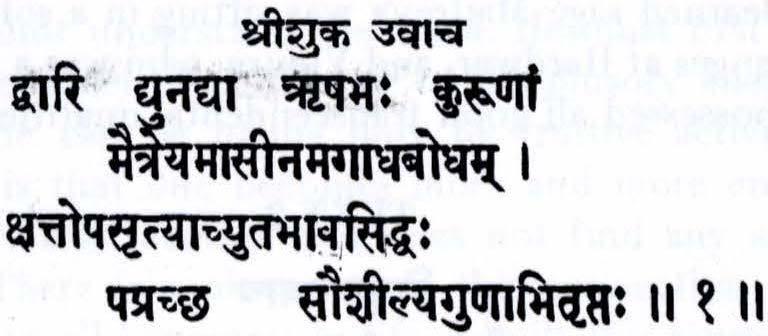
TRANSLATION
Sukadeva Gosvami said: Vidura, the best amongst the Kuru dynasty, who was perfect in devotional service to the Lord, thus reached the mouth of the celestial Ganges River [Hardwar], where Maitreya, the great fathomless learned sage of the world, was seated. Vidura, who was perfect in gentleness and satisfied in transcendence, inquired from him.
159
PURPORT
Vidura was already perfect due to his unalloyed devotion to the infallible Lord. The Lord and the living entities are all qualitatively the same by nature, but the Lord is quantitatively much greater than any individual living entity. He is ever infallible, whereas the living entities are prone to fall under the illusory energy. Vidura had already surpassed the fallible nature of the living entity in conditional life due to his being acyuta-bhiiva, or legitimately absorbed in the devotional service of the Lord. This stage of life is called acyuta-bhava-siddha, or perfection by dint of devotional service. Anyone, therefore, who is absorbed in the devotional service of the Lord is a liberated soul and has all admirable qualities. The learned sage Maitreya was sitting in a solitary place on the bank of the Ganges at Hardwar, and Vidura, who was a perfect devotee of the Lord and possessed all good transcendental qualities, approached him for inquiry.
vidura uviica
sukhaya karmii{li karoti loko
na ta* sukham viinyad-upiiramam vii
vindeta bhuyas tata eva du�kham

yad atra yuktam bhagaviin vaden naft
vidura� uviica-Sri Vidura said; sukhaya-for attaining happiness; karmiiri-fruitive activities;karoti-everyone does so;loka�-in this world; na-never;ta*-by those activities;sukham-any happiness;vii-or;anyatdifferently;upiiramam-satiation;vii-either;vindeta-achieve;bhiiya�-on the contrary;tata�-by such activities;eva-certainly;du�kham-miseries; yat-that which; atra-under the circumstances; yuktam-right course; bhagaviin-0 great one;vadet-may kindly enlighten;na�-us.
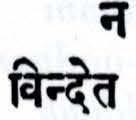
TRANSLATION
Vidura said: 0 great sage, in this world everyone engages in fruitive activities to attain happiness, but they find neither satiation nor the
160 Srimad-Bhagavatam [Canto 3, Ch. 5
�� ���� ij: ij� q�� ift I �� � tRci � � �CTF{ q�; II � II
TEXT2
mitigation of distress. On the contrary, they are only aggravated by such . activities. Please, therefore, give us directions on how one should live for real happiness.
PURPORT
Vidura asked Maitreya some common questions,which was not originally his intention. Uddhava asked Vidura to approach Maitreya Muni and inquire into all the truths concerning the Lord, His name, fame, quality, form, pastimes, entourage, etc., and thus when Vidura approached Maitreya, he should have asked only about the Lord. But out of natural humility he did not immediately ask about the Lord, but inquired into a subject which would be of great importance to the common man. A common man cannot understand the Lord. He must first know the real position of his life under the influence of the illusory energy. In illusion one thinks that he can be happy only by fruitive activities, but what actually happens is that one becomes more and more entangled in the network of action and reaction and does not find any solution to the problem of life. There is a nice song in this connection: "Because of a great desire to have all happiness in life, I built this house. But unfortunately the whole scheme has turned to ashes because the house was unexpectedly set on fire." The law of nature is like that. Everyone tries to become happy by planning in the material world, but the law of nature is so cruel that it sets fire to one's schemes; the fruitive worker is not happy in his schemes, nor 1s there any satiation of his continuous hankering for happiness. TEXT3

janasya kr�!liid-vimukhasya daiviid adharma-§'ilasya sudu�khitasya
anugrahiiyeha caranti nunam
bhutiini bhavyiini janiirdanasya
janasya-of the common man; kr. sru"it-from the Supreme Lord Kr�IJa; vimukhasya-of the one who has turned his face against the Lord; daiviitbythe influence ofexternal energy; adharma-Siwsya-ofonewho isengaged
Text3] Vidura's Talks with Maitreya 161
���� ��� �lit� Tffl;ij �mR ¥fotllf.t
��:�1 �;f Wll�i'f� II � II
�
in irreligion; sudu[tkhitasya-of one who is always unhappy; anugrahiiyadue to being compassionate towards them; iha-in this world; carantiwander; nu nam-certainly; bhu tiini-persons ; bhavyiini-great philanthropic souls;janiirdanasya-of the Supreme Personality of Godhead.

TRANSLATION
0 my lord, great philanthropic souls travel on the earth on behalf of the Supreme Personality of Godhead to show compassion to the fallen souls who are adverse to the sense of subordination to the Lord.
PURPORT
To be obedient to the wishes of the Supreme Lord is the natural position of every living entity. But due only to past misdeeds, a living being becomes adverse to the sense of subordination to the Lord and suffers all the miseries of material existence. No one has anything to do but render devotional service to the Supreme Lord, Sri Kr�t)a. Therefore any activity other than transcendental loving service to the Lord is more or less a rebellious action against the supreme will. All fruitive activity, empirical philosophy and mysticism are more or less against the sense of subordination to the Lord, and any living entity engaged in such rebellious activity is more or less condemned by the.laws of material nature, which work under the subordination of the Lord. Great unalloyed devotees of the Lord are compassionate towards the fallen, and therefore they travel all over the world with the mission of bringing souls back to Godhead, back to home. Such pure devotees of the Lord carry the message of Godhead in order to deliver the fallen souls, and therefore the common man who is bewildered by the influence of the external energy of the Lord should avail himself of their association.
162 Srimad-Bhagavatam [Canto 3, Ch. 5
TEXT4 �� CR� � W{: �(() � � �ml{ I � � � �Rti\d � «�� ���\Ill tat siidhuvaryiidisa vartma sam nafl sarhriidhito bhagaviin yena purhsiim hrdi sthito yacchati bhaktzpiite Fiiinarh sa tattviidhigamarh puriir-am
. tat-therefore; siidhuvarya-0 great one amongst the saints; iidisa- pleasc mstruct; vartma-the path; sam-auspicious; na{1-for us; sarhriidhitahbeing erfectly erved; bhagaviin-the Personality of Godhead; yen� by wh1 purhsiim�of �he l iving entity; hrdi sthita{t -re iding in the heart; yacchatt-awards; bhakttpu te- unto the unalloyed devotee;jiiiinam-knowl edge; sa-that; tattva-truth; adhigamam-by which one learns· puriinam- authorized, old. ' ·
TRANSLATION


Therefore, 0 great sage, please give me instruction on thetranscendental devotional service of the Lord, so that l:le who is situated in the heart of everyone can be pleased to impart, from within, knowledgeof the Absolute Truth in terms of the ancient Vedic principles delivered only to those who are purified by the process of devotional service.
PURPORT
As already explai ned in the First Canto of Srimad-Bhiigavatarn, the Absolute Truth is realized in three different phases-although they are one and the same-in terms of the knower's capacity to understand. The most capable transcendentalist is the pure devotee of the Lord who is without any tinge of fruitive actions or philosophical speculation. By devotional service only does one's heart become completely purified from all material coverings like karma, jniina and yoga. Only in such a purified stage does the Lord, who is seated in everyone's heart with the individual soul, give instruction sothat the devotee can reach the ultimate destination of going back home, back to Godhead. This is confirmed in Bhagavadgitii (Bg. 10.10): te§iirh satata-yuktii.nii.rh bhajatiirn. Only when the Lord is satisfied ·with the devotional service of the devotee does He impart knowledge, as He did for A�una and Uddhava.
The jruinis, yogis and karmis cannot expect this direct cooperation of the Lord. They are not able to satisfy the Lord by transcendental loving service,nor do theybelieve in such service to the Lord. The bhakti process, as performed under the regulative principles of vaidhi-bhakti, or devotional service following the prescribed rules and regulations, is defined by the revealed scriptures and confirmed by great iiciiryas. This practice can help the neophyte devotee to rise to the stage of riiga-bhakti, in which the Lord responds from within as the caitta-guru or the spiritual master as Superconsciousness. All transcendentalists other than devotees do not make any distinction between the individual soul and the Supersoul because they miscalculate the Superconsciousness and individual consciousness to be

Text 4 J Vidura's Talks with Maitreya 163
one and the same. Such miscalculation by the nondevotees makes them unfit to receive any direction from within, and therefore they are bereft of the direct cooperation of the Lord. After many, many births, when such a nondualist comes to sense that the Lord is worshipable and that the devotee is simultaneously one and different from the Lord, then only can he surrender unto the Lord, Vasudeva. Pure devotional service begins from that point. The process of understanding the Absolute Truth adopted by the misguided nondualist is very difficult, whereas the devotee's way of understanding the Abso lute Truth comes directly from the Lord, who is pleased by devotional service. On behalf of many neophyte devotees, Vidura, at the very first instance, inquired from .Maitreya about the path of devotional service, by which the Lord, who is seated within the heart, can be pleased.
TEXTS
karoti karmii.!J.i krtii.vatii.ro yii.ny ii.tma-tantro bhagavii.tits tryadh'isa� yathii. sasarjii.gra idati1. nir'ihaft sarhsthii.pya vrttirh jagato vidhatte


karoti-does them; karmarti-transcendental activities; lqta-by accepting;avatara{t-incarnations;ynni-allthose;atma-tantra{t-Self-independent; bhagavan-the Personality of Godhead; tryadhisa{t-the Lord of the three worlds; yatha-as much as; sasarja-created; agre-at first; idam-this cosmic manifestation; niriha{t-although desireless; sarhsthapya-by establishing; vrttim-means of livelihood;jagata{t-of the universes; vidhatte-as He regulates.
TRANSLATION
0 great sage, kindly narrate how the Supreme Personality of Godhead, who is the independent desireless Lord of the three worlds and the controller of all energies, accepts incarnations and creates the cosmic manifestation with perfectly arranged regulative principles for its maintenance.
164 Srimad-Bhagavatain [Canto 3, Ch. 5
�Rf . qiijtfUI 4:41�1\'4� ��1�610 ��:I � ��� � f.rill: � tftr iilfRIT �II�II
Lord Kr�l)a is the original Personality of Godhead from whom the three creative incarnations, namely the puru§a-avatiiras-Karaparpavasayi Vieyl)u, Garbhodakasayi Vi�I)U and K�1rodakasay1 Vi�l)u-expand. The whole material creation is conducted by the three puru§as in successive stages under the external energy of the Lord, and thus material nature is controlled by Him. Thinking material nature to be independent is like seeking milk from the nipplelike bags on the neck of a goat. The Lord is independent and desireless. He does not create the material world for His own satisfaction as we create our household affairs to fulfill our material desires. Actually the material world is created for the illusory enj oyment of the conditioned souls, who have been against the transcendental service of the Lord since time immemorial. But the material universes are full in themselves. There is no scarcity for maintenance in the material world. Because of their poor fund of knowledge, the materialists are disturbed when there is an apparent increase of population on the earth. Whenever there is a living being on the earth, however, his subsistence is immediately arranged by the Lord. The other species of living entities, who far outnumber human society, are never disturbed for maintenance; they are never seen dying of starvation. It is only human society that is disturbed about the food situation and, to cover up the real fact of administrative mismanagement, takes shelter in the plea that the population is excessively increasing. If there is any scarcity in the world, it is the scarcity of God consciousness, otherwise, by the grace of the Lord, there is no scarcity of anything.
TEXT6
yathii punab. sve kha idarh nivesya sete guhiiyiirh sa nivrtta-vrtti?t yogesvariidh!svara eka etad anupravi�to bahudhii yathii "s!t

Text6) Vidura's Talks with Maitreya 165
PURPORT
w �: �� � �� t;rm � � « F.it'(tt�: I itT��� �qi �Gsri'Cfit il�� �s� II � II
yathii- as much as; puna�-again; sve-in His; l•he-form of space (virii?ariipa); idam-this; nivesya�entering into; sete-Iies down; guhiiyii m-within Lhe universe; satt- He (the Personality of Godhead); nivrtta-without endeavor; vrtti[l-means of livelihood; yoga-isvara-the master of all mystic powers; adhisvara{t-proprietor of everything; ekaft-one without a second; et at-this; anupravifi!a[l-entering afterwards; bahudhii-by innumerable; yathii-as much as; iisit-exists.

TRANSLATION
He lies down on His own heart spread in the form of the sky, and thus placing the whole creation in that space, He expands Himself into many living entities, which are manifested as different species of life. He does not have to endeavor for His maintenance because He is the master of all mystic powers and the proprietor of everything. Thus He is distinct from the living entities.
PURPORT
The questions regarding creation, maintenance and destruction, which are mentioned in many parts of the Srimad-Bhiigavatam, are in relation to different millenniums (kalpas), and therefore they are differently described by different authorities when questioned by different students. There is no difference regarding the creative principles and the Lord's control over them, yet there are some differences in the minute details because of different kalpas. The gigantic sky is the material body of the Lord, called the viriita-riipa, and all material creations are resting on the sky or the heart of the Lord. Therefore, beginning from the sky, the first material manifestation to the gross vision, down to the earth, everything is called Brahman. Sarvarh khalv idarh brahma: "There is nothing but the Lord, and He is one without a second." The living entities are the superior energies, whereas matter is the inferior energy, and the combination of these energies brings about the manifestation of this material world, which is in the heart of the Lord.

166 Srimad-Bhagavatam [Canto 3, Ch. 5
TEXT7 � � m:��ilffiiUij �FI Cliltl1U1'4dl��: I q;ft WI q:tq�qftl �ijf ;J: �wii.n�q�dl'tdlf.l II " u·
lcri{ian-manifesting pastimes; vidhatte -perform; dvija- twice-horn; gocow; suriir-iim-of the demigods; k . semiiya-welfare; karmiir-i-transcendental activities; avatiira-incarnations; bhedai[t-differently; mana['t-mind; na-never; trpyati-satisfies; api-in spite of; snwatiim-continudusly hearing; na[l-our; susloka-auspicious; maule[l-of the Lord; carita-characteristic ; amrtiini-undying.
TRANSLATION
You may narrate also about the auspicious characteristics of the Lord in His different incarnations for the welfare of the twice-born, the cows and the demigods. Our minds are never satisfied completely although we continuously. hear of His transcendental activities.
PURPORT
The Lord appears in this universe in different incarnations like Matsya, Kurma, Variiha and Nrsimha, and He manifests His differenttranscend,ental activities for the welfare of the twice-born, the cows and the demigods. The Lord is directly concerned with the twice-born or civilized men. A civilized man is one who has taken his birth twice. A living entity takes birth in this mundane world due to the union of male and female. A human being is born due to union of the father and mother, but a civilized human being has another birth by contact with a spiritual master, who becomes the actual father. The father and mother of the material body are so only in one birth, and in the next birth the father and mother may be a different couple. But the bona fide spiritual master, as the representative of the Lord, is the eternal father because the spiritual master has the responsibility to lead the disciple to spiritual salvation or the ultimate goal of life. Therefore, a civilized man must be twice-born, otherwi e he is no more than the lower animals.
The cow is the most important animal for developing the human body to perfection. The body can be maintained by any kind of foodstuff, but cow's milk is particularly essential for developing the finer tissues of the human brain so that one can understand the intricacies of transcendental knowledge. A civilized man i expected to live on foodstuffs comprising fruits, vegetables, grains, sugar and milk. The bull helps in the agricultural

Text 7) Vidura's Talks
Maitreya
with
167
kii{lan vidhalte dvija-go-surii[liim k§emiiya karmii[ly avatiira-bhcdai� mano na trpyaty api srf!vatiim na� susloka-maules caritiimrtiini
process of producing grain, etc., and thus in one sense the bull is the father of humankind, whereas the cow is the mother, for she supplies milk to human society. A civilized man is therefore expected lo give all protection to the bulls and cows.




The demigods, or the living entities who live in the higher planets, are far superior to human beings. Since they have better arrangements for living conditions, they live far more luxuriously than human beings, yet they are all devotees of the Lord. The Lord incarnates in different forms, such as those of a fish, a tortoise, a hog, a combined lion and man, etc., just to give protection to civilized man, the cow and the demigods, who aredirectly responsible for the regulative life ofprogressive self-realization. The whole system of the material creation is planned so th.at the conditioned souls may have the opportunity for self-realization. One who takes advantage of such an arrangement is called a demigod or civilized man. The cow is meant to help maintain such a high standard of living.
The Lord's pastimes for the protection of the twice-born civilized men, the cows and the demigods are all transcendental. A human being is inclined to hear good narrations and stories, and therefore there are so many books, magazines and newspapers on the market to satisfy the interests of the developed soul. But the pleasure in such literature, after it is read once, becomes stale, and people do not take any interest in reading ·uch literature repeatedly. In fact, newspapers are read for less than an hour and then thrown in the dustbins as rubbish. The case is similar with all other mundane literatures. But the beauty of transcendental literatures like Bhagavad-gita and Srimad-Bhagavatam is that they never become old. They have been read in the world by civilized man for the last five thousand years, and they have never ome old. They are ever fresh to the learned scholars and devotees, and even by daily repetition of the verses of Bhagavad-gita and Srimad-Bhagavatam, there is no satiation for devotees like Vidura. Vidura might have heard the pastimes of the Lord many, many times before he met Maitreya, but still he wanted the same narrations to be repeated because he was never satiated by hearing them. That is the transcendental nature of the Lord's glorious pastimes.
168 Srlmad-Bhagavatam [Canto 3, Ch. 5
TEXTS ��� Jl4ii'1Jl4il'l '« Jl4it4RJ51i\ I 31�mtt� ft �e*4Mitil���: 5RiRt: II <; II
Vidura'sTalkswithMaitrcya
yui.� lal/lltl-ilhl'dairadhi-lulw-lliilho lokii11 ulokii11 sa/111 /olw-piiliin

1/l't/.'fpad ,)'II/I'II hi Sllf'VII-SIIl/VII nikiiya-bhl'do 'dhilrrta{l pmt.l.la{l
yai{t-by whom; tu.tlva-trulh: bhcdai{l-by diff ·rcllliat.ioll; adhi-lokaniilha{t-Lhe King of the ki11gs; loht:in-plallcls; alo/; U:n-pla ne ts of the lower region; salta-along with ; loka-piilan.-n:spc·c·tive kings; acikfpalplanned;yatra-wherein; hi- certainly ; sa.rvu-all: saltvu-existe11ee; nil.:iyaliving e11titics; bheda. {t-differenc e ; adhii.'rta{l-oc ·upic·d; pmt;ita{1-it so appears.

TRANSLATION
The Supreme King of all kings has created different planets and places of habitation where living entities are situated in terms of the modesof nature and work, and He has created their different kings and t'ulers.
PURPORT
Lord Kr�l}a is the chief 1\.ing ofall kings, and He has created different planets for all kinds of living entities. F.ven on this planet there are different places for inhabitation by different types of men. There are places like deserts, icelands and valleys in mountainous co untries, and in each of them there are different kinds of men bom of different modes of nature according to their p ast deeds. There are people in the Arabian desertsandinthevalleys of the H im alayan Mountains, and thei11habitants of these twoplaces differ from one another,just as the inhabitant s of the icelands alsodiffer from them. Similarly, there are also different planf' ls. The planets below the earth down Lo the Pa tiila planet arefull ofvarious kinds of livingbeings;no planet isvacant, asis wrongly imagined by the modern so-called scientist. In Bhagavad-g!ta we find it said by the Lord that the living entities are sarva-gata, or pres ent in every sphere of life. So there is no doubt thaton other planets there are also inhabitants likeus, sometimes with greater intelligence and greater opulence. The living conditionsforthoseofgreaterintelligencearemoreluxuriousthan on this earth. There are also planets where no sunlight reaches, and there are livingentities who mustlive there due to their past deeds. All such plans for livingconditionsaremadebytheSupreme Lord, and Vidurarequested Maitreyatodescribethisforthesakeoffurtherenlightenment.
Text 8]
169
� � � 1 ft�(fm�4lf.t� ;if cr$r � II � II

yena pra]aniim uta iitma-karma
riipiibhidhiiniim ca bhidiim vyadhatta niiriiya{lo viivasrg iitma-yonir
etac ca no var{laya vipra-varya
;rena-by which; prajiiniim-of those who are born; uta-as also; almakarma-destined engagement; rupa-form and feature; abhidhiiniimendeavors; ca-also; bhidiim--:differentiation; vyadhatta-dispersed; niiriiya!la�-the Supreme Personality of Godhead; visvasrk-the creator of the universe; iitma-yoni�-self-sufficient; etat-all these; ca-also; na�-unto us; var[laya-describe; vipra-varya-0 chief amongst the briihma[las.


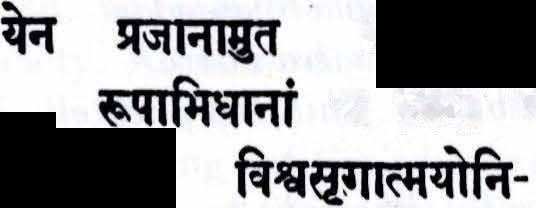

TRANSLATION
0 chief amongst the brahmat;tas, please also describe how Narayat;ta, the creator of the universe and the self-sufficient Lord, has differently created the natures, activities, forms, features and names of the different living creatures.
PURPORT
Every living being is under the plan of his natural inclinations in terms of the modes of material nature. His work is manifested in terms of the nature of the three modes, his form and bodily features are designed according to his work, and his name is designated according to his bodily features. For example, the higher classes of men are white (sukla), and the lower classes of men are black. This division of white and black is in terms of one's white and black duties of life. Pious acts lead one to take birth in a good and highly placed family, to become rich, to become learned, and to acquire beautiful bodily features. Impious acts lead one to become poor by parentage, to be always in want, to become a fool or illiterate and to acquire ugly bodily features. Vidura requested Maitreya to explain these differences between all the living creatures made by Narayar;ta, the Supreme Personality of Godhead.
170 Srimad-Bhagavatam
TEXT9 31i�Efi�
[Canto 3, Ch. 5
Mliti(f41i!4(1'1i II� o II
pariivare§iirh bhagavan vratiini
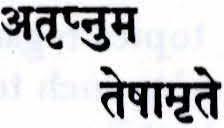

srutiini me vyiisa-mukhiid abh""ik�rwm
atrpnuma k§ulla-sukhiivahiiniirh
te�iimrte kr§!w-kathiimrtaughiit
para-higher; avara-lower; efiiim-of all these; bhagavan-0 my lord, 0 great one; vratiini-occupations; srutiini-heard; me-by me; vyiisa- Vyasa; mukhiit-from the mouth; abhik�[lam-re peatedly; atrpnuma-1 am satisfied; k§ulla-little; sukha-iivahiiniim-that which causes happines ; te§iimout of that; amrta-reality; krfi!la-kathii- talks about the Personality of Godhead, Lord Kn>t:�a; amr ta- oghiit-from the nectar.


TRANSLATION
0 my lord, I have repeatedly heard about these higher and lower statuses of human society from the mouth of Vyasadeva, and I am quite satiated with all these lesser subject matters and their happiness. They have not satisfied me with the nectar of topics about Kr�f!a.
PURPORT
Because people are very much interested in hearing social and historical presentations, Srlla Vyasadeva has compiled many books such as the Purii[laS and Mahiibhiirata. These books are reading matter for the mass of people, and they were compiled with a view to reviving their God consciousness, now forgotten in the conditional life of material existence. The real purpose of such literatures is not so much to present topics of historical references, but to revive the people's sense of God consciousness. For example, Mahiibhiirata is the history of the Battle of Kuruk�etra, and common people read it because it is full of topics regarding the social, political and economic problems ofhuman society. But factually the most important part of Mahiibhiirata is Bhagavad-g'itii, whi�h is automatically taught to readers along with the historical narrations of the Battle of Kuruk�etra.
Text 10] Vidura's Talks with Maitreya
TEXT 10 q�� � ifmf;{ �lr�l
171
Vidura explained to Maitreya his position of being fully satiated with the knowledge of mundane social and political topics and having no more interest in them. He was anxious to hear transcendental topics regarding Lord Sri Kr-�Qa. Because. there were insufficient topics directly concerning Kr�Qa in the Puriir-as, Mahiibhiirata, etc., he was not satisfied and wanted to know more about Kr�Qa. KnTJa-kathii, or topics regarding Kr�l)a, are transcendental, and there is no satiation in hearing such topics. Bhagavadgitii is important on account of its being Kr�TJa-kathii, or speeches delivered by Lord Kr�Qa. The story of the Battle of Kuruk�etra may be interesting for the mass of people, but to a person like Vidura who is highly advanced in devotional service, only Kr�TJa-kathii and that which is dovetailed with Kr�TJa-kathii is interesting. Vidura wanted to hear of everything from Maitreya, and so he inquired from him, but he desired that all the topics be in relationship with Kr�qa. As fire is never satisfied in its consumption of firewood, so a pure·devotee of the Lord never hears enough about Kr�Qa. Historical events and other narrations concerning social and political incidents all become transcendental as soon as they are in relationship with Kw�a. That is the way to transform mundane things into spiritual identity. The whole world can be transformed into VaikuJ;J�ha if all worldly activities are dovetailed with KnTJa-katha.
There are two important Kr�TJa-kathiis current in the world-Bhagavadgita and Srimad-Bhiigavatarr�;. Bhagavad-gitii is Kr�TJa-kathii because it is spoken by Kr�Qa, whereas Snmad-Bhiigavatam is Kr§TJa-kathii because it narrates about Kr!!Qa. Lord Caitanya advised all His disciples to preach KnrJa-kathii all over the world without discrimination because the transcendental value of Kr�TJa-katha can purify one and all from material contamination.
TEXT ll
kas trpnuyiit tzrtha-pado 'bhidhiiniit satre§u vafl. siiribhir i{lyamaniit yafl. kar[la-nii{llrh puru§asya yiito bhava-pradiirh geha-ratirh chinatti
kafl.-who is that man; trpnuyat-that can be satisfied; tirtha-padaf!whose lotus feet are all the places of pilgrimage; abhidhanat-from the

172 Srimad-Bhagavatam [Canto 3, Ch. 5
�s� ri! en v_tffil(t6€1ql;wl({ I �: �;nit � � � � fi§;rfu������
talks of; satre.su-in human society; va�-one who is;suribhi�-by great devotees;iflyamiiniit-one who is so worshiped;yafl-who;karrta-nii{iimin the holes of the ears; purufiasya-of a man;yiita�-entering; bhavapradiim-that which awardsbirths and deaths;geha-ratim-family affection; chinatti-is cut off.
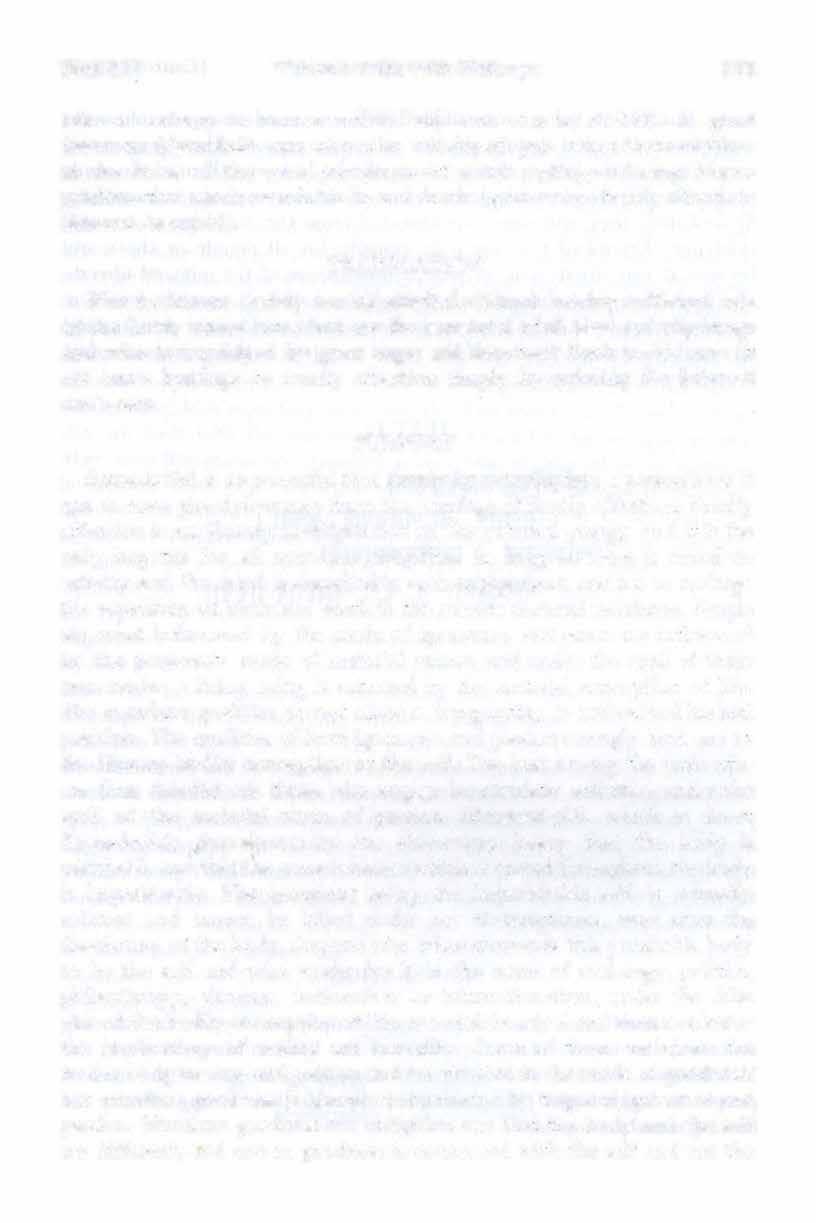
TRANSLATION
Who in human society can be satisfied without hearing sufficient talk of the Lord, whose lotus feet are the sum total of all places of pilgrimage and who is worshiped by great sages and devotees? Such topics can cut off one's bondage to family affection simply by entering the holes of one's ears.
PURPORT
Knrta-kathii is so powerful that simply by entering into a person's ear it can at once give deliverance from the bondage of family affection. Family affection is an illusory manifestation of the external energy, and it is the only impetus for all mundane activities. As long as there is mundane activity and the mind is absorbed in such engagement, one has to undergo the repetition of birth and death in the current material nescience. People are most influenced by the mode of ignorance, and some are influenced by the passionate mode of material nature, and under the spell of these two modes a living being is actuated by the material conception of life. The mundane qualities do not allow a living entity to understand his real position. The qualities of both ignorance and passion strongly bind one to the illusory bodily conception of the self. The best among the fools who are thus deluded are those who engage in altruistic activities under the spell of the material mode of passion. Bhagavad-gita, which is direct Kr�rta-kathii, gives humanity the elementary lesson that the body is perishable and that the consciousness which is spread throughout the body is imperishable. The conscious being, the imperishable self, is eternally existent and cannot be killed under any circumstances, even after the dissolution of the body. Anyone who misunderstands this perishable body to be the self and who works for it in the name of sociology, politics, philanthropy, altruism, nationalism or internationalism, under the false plea of the bodily conception of life, is certainly a fool and does not know the implications of reality and unreality. Some of them are above the modes of ignorance and passion and are situated in the mode of goodness, but mundane goodness is always contaminated by tinges of ignorance and passion. Mundane goodness can enlighten one that the body and the self are different, and one in goodness is concerned with the self and not the
Text ll] Vidura's Talks with Maitreya 173
body. But due to being contaminated, those in mundane goodness cannot understand the real nature of the self as a person. Their impersonal conception of the self as distinct from the body keeps them in the mode of goodness within material nature, and unless they are attracted by Knrw-kathii, they will never be liberated from the bondage of material existence. Kr�r:za-kathii is the only remedy for all people of the world because it can situate one in pure consciousness of the self and .liberate one from material bondage. To preach Kr�fta-kathii aU over the world, as recommended by Lord Caitanya, is the greatest missionary activity, and all sensible men and women of the world may join in this great movement started by Lord Caitanya.
TEXT 12



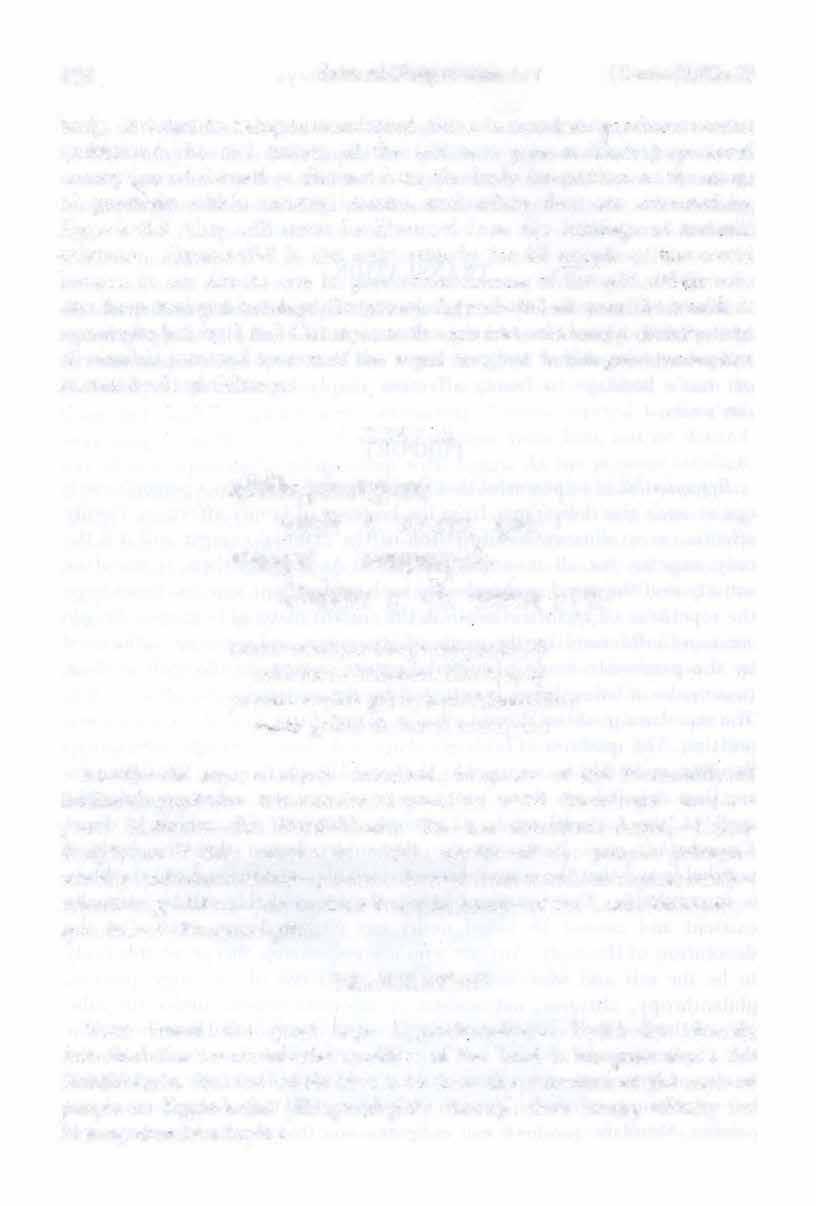
�fq ij lfR6'11ii �: I 4r.c"l"li st1Riij(C41flll���� 3 �: �1411(����II
munir vivak�ur bhagavad-gu'(liiniirh
sakhiipi te bhiiratam iiha kr�r:za� yasmin nr'!liirh griimya-sukhiinuviidair matir grhTtii nu hare� kathiiyiim
munifl -the sage; vivak§ufl-described; bhagavat-of the Personality of Godhead; guriiniim- transcendental qualities; sakhii- friend; api- also; teyour; bhiiratam-the Mahiibhiirata; iiha-has described; krfirafl- Kr�!ladvaipiiyana Vyasa; yasmin-in which; nrriim-of the people; griimyaworldly; sukhii-anu viidaifl- pleasure derived from mundane topics; matiflattention;grhitii nu-just to draw towards; hare[l-of the Lord; kathiiyiimspeeches of (Bhagavad-gitii).
TRANSLATION
Your friend the great sage Kr!!f.la-dvaipayana Vyiisa has already described the transcendental qualities of the· Lord.in his great work; the Mahabharata. But the whole idea is to draw the attention of the mass of people to Kr!!f.la-kathii [Bhagavad-gita) through their strong affinity for hearingmundanetopics.
174 Srimad-Bhagavatam (Canto 3, Ch. 5
-�un;rt
The great sage Krf}J;la-dvaipayana Vyasa is the author of all Vedic literature, of which his works Vediinta-sutra, Srimad-Bhiigavatam and Mahiibhiirata are very popular readings. As stated in Bhiigavatam (1.4.25), Srila Vyasadeva compiled the Mahiibhiirata for the less intelligent class of men who take more interest in mundane topics than in the philosephy of life. The Vediinta-sutra was compiled for persons already above the mundane topics, who might already have tasted the bitterness of the so-called happiness of mundane affairs. The first aphorism of Vediinta-sutra is athiito brahma-jipiiisii, i.e., only when one has finished the business of mundane inquiries in the marketplace of sense gratification can one make relevant inquiries regarding Brahman, the Transcendence. Those persons who are busy with the mundane inquiries which fill the newspapers and other such literatures are classified as stri-sudra-dvijabandhus, or women, the laborer class and unworthy sons of the higher classes (briihmaf)a, k�atriya and vaisya). Such less intelligent men cannot understand the purpose of Vediinta-sutra, although they may make a show of studying the siitras in a perverted way. The real purpose of Vedanta-sutra is explained by the author himself in the Srimad-Bhagavatam, and anyone trying to understand Vedanta-sutra without reference to Srimad
Bhiigavatam is certainly misguided. Such misguided persons, who are interested in the mundane affairs of philanthropic and altruistic work under the misconception of the body as the self, could better take advantage of the Mahabharata, which was specifically compiled by Srila Vyasadeva for their benefit. The great author has compiled the Mahabhiirata in such a way that the less intelligent class of men, who are more interested in mundane topics, may read the Mahiibhiirata with great relish and in the course of such mundane happiness can also take advantage of Bhagavad-gitii, the preliminary study of Srimad-Bhiigavatam or the Vediinta-sutra. Srila Vyasadeva had no interest in writing a history of mundane activities other than to give less intelligent persons a chance for transcendental realization through Bhagavad-gitii. Vidura's reference to the MahiibhiiraJa indicates that he had heard of the Mahiibhiirata from Vyasadeva, his real father, while he was away from home and was touring the places of pilgrimage.

TEXT 13

Text 13] Vidura's Talks with Maitreya 175
PURPORT
��RiflY:P'I+tl�

sii sraddadhiinasya vivardhamiinii viraktim anyatra karoti ptuhsa{t hare[! padiinu.smrti-nirvrtasya samasta-du{l.khiipyayam. iisu dhatte

sa-those topic of Kr�pa, or Kr. s�Ja-katha; sraddadhanasya-of one who is anxious to hear; vivardhamana-gradually increasing; viraktim-indifference; anyatra-in other things (than uch topics);karoti-does; pu rhsa[l. -of one who is so engaged; hare{t- of ti'H� Lord; pada-anusmrti- constant remembrance of the lotus feet of the Lord; nirvrtasya- one who has achievedsuch transcendental bliss; samasta-du{l.kha-all miseries; apyayamvanqui hed; asu- wi tho11 L delay; dhatte-cxecutes.
TRANSLATION
For one who is anxious to engage constantly in hearing such topics, Kr�J;ta-kathii graduaJiy increases his indifference towards all other things. Such constant remembrance of the lotus feet of Lord Kr�J;ta by the devotee who has achieved transcendental bliss vanquishes all his miseries without delay.
PURPORT
We must certainly know that en the absolute plane KnTJ-a-kathii and Kr�r:ra are one and the same. The Lord is the Absolute Truth, and therefore llis name, form, quality, etc., which are all understood to be KnTJ-alwthii, are nondifferent from Him. Bhagavad-g'itii, being spoken by the Lord, is as good as the Lord Himself. When a sincere devotee reads Bhagavad-g'itii, this is as good as his seeing the Lord eye to eye in his personal presence, but this is not so for the mundane wrangler. All the potencies of the Lord are there when one reads Bhagavad-g'itii, provided it is read in the way recommended in the G'itii by the Lord Himself. One cannot foolishly manufacture an interpretation of Bhagavad-g'itii and still bring about transcendental benefit. Anyone who tries to squeeze some artificial meaning or interpretation from Bhagavad-g'itii for an ulterior motive is not .�raddadhiina-purhsa (one engaged anxiously in bona fide hearing of KnTJ-a-kathii). Such a person cannot derive any benefit from reading Hhagavad-g'itii, however great a scholar he may be in the estimation of a layman. The sraddadhiina, or faithful devotee, can actually derive all
176 Srimad-Bhagavatam
": q;::I�WRIMtf�
[Canto 3, Ch. 5
the benefits of Bhagavad-gitii because by the omnipotency of the Lord he achieves the transcendentalblisswhichvanquishesattachmentand nullifies all concomitant material miseries. Only the devotee, by his factual experience, can understand the import of this verse spoken by Vidura. The pure devotee of the Lord enjoys life by constantly remembering the lotus feet of the Lord by hearing Kr�TJa-kathii. For such a devotee there is no such thing as material existence, and the much advertised bliss of brahmiinanda is like a fig for the devotee who is in the midst of the transcendentalocean of bliss.
TEXT 14


\lll tiinc chocya-socyiin avido 'nusoce hare� kathiiyiim vimukhiin aghena k,�irwti devo 'nimi§as tu ye�iim iiyur vrthii-viida-gati-smrtiniim
tiin-all those;socya- pi tiable;socyiin-of the pi tiable; avida�-ignorant; anusoce-1 pity; hare�-of the Lord; kathiiyiim-to the topics of; vimukhiin-adverse; aghena-because of sinful activities; kfiiroti-decaying; deva�-0 sage; ani mi�a�-eternal time; tu-but; ye,siim- of whom; iiyu�duration of life; vrthii-uselessly; viida-philosophical speculations; gatiultimate goal; smrtiniim-of those following different rituals.

TRANSLATION
0 sage, persons who, because of their sinful activities, are adverse to the topics of Transcendence and thus are ignorant of the purpose of the Mahabharata (Bhagavad-gita) are pitied by the pitiable. I also pity them because I see how their duration oi' life is spoiled by eternal time while they involve themselves in presentations of philosophical speculation, theoreticalultimate goals of life, anddifferent modes ofritual.
PURPORT
According to the modes of material nature, there are three kinds of relationships between human beings and the Supreme Personality of
Text 14) Vidura's Talks with Maitreya 177
.
": � �JFcciW<�Wi 1 fttunRt �sf.l[l{q� iM'41�1cua:•rRI%fiW<I'( II�
Godhead. Those who are in the modes of ignorance and passion are adverse to the existence of God, or else they formally accept the existence of God in the capacity of an order supplier. Above them are those who are in the mode of goodness. This second class of men believe the Supreme Brahman to be impersonal. They accept the cult of bhakti, in which hearing of Kr§rJ a-kathii is the first item, as a means and not the end. Above them are those who are pure devotees. They are situated in the transcendental stage above the mode of material goodness. Such persons are decidedly convinced that the name, form, fame, qualities, etc., of the Personality of Godheadare nondifferent from one another on the absolute plane. For them, hearing of the topics of Kr;;l)a is equal to meeting with Him eye to eye. According to this class of men, who are situated in pure devotional service to the Lord, the highest goal of human life is puru�iirtha, devotional service to the Lord, the real mission of life. The impersonalists, because they engage in mental speculation and have no faith in the Personality of Godhead, have no business hearing the topics of Kn>l)a. Such persons are pitiable for the first-class pure devotees of the Lord. The pitiable impersonalists pity those who are influenced by the modes of ignorance and passion, but the pure devotees of the Lord take pity on them both because both waste their most valuable time in the human form of life in false pursuits, sense enjoyment and mental speculative presentations of different theories and goals of life.
TEXT 15 � � �q�: �llt€4 � �" � � �'Efl
ftAA wt: � �: II�'-\11
tad asya kau§iirava sarma-diilur hare(t kathiim-eva kathiisu siiram
uddhrtya pu§pebhya iviirla-bandho siviiya nalt kirtaya tirtha-kirte[t

tat-therefore; asya- His; kau�iirava-0 Maitreya; sar ma-diitu� - of one who awards good fortune; hare� - of the Lord; kathiim-topics; evaonly; kathiisu-of aU topics; siiram-the essence; uddhrtya-by quoting; pu�pebhya[!-from the flowers; iva-like that; arta-bandho-of the friend


178 Srimad-Bhagavatam [Canto 3, Ch. 5
of the distressed; sivaya-for welfare; na�- of us; kirtaya-kindly describe; tirtha-pilgrimage; kirte�-of glorious.
TRANSLATION
0 Maitreya, 0 friend of the distressed, the glories of the Supreme Lord can alone do good for people aU over the world. Therefore, just as bees coUect honey from flowers, kindly describe the essence of alltopics-the topics of the Lord.
PURPORT
There are many topics for different persons in different modes of material nature, but the essential topics are those in relationship with the Supreme Lord. Unfortunately, materilllly affected conditioned souls are all more or less adverse to topics of the Supreme Lord because some of them do not believe in the existence of God and some of them believe only in the impersonal feature of the Lord. In both cases there is nothing for them to say of God. Both the nonbelievers and the impersonalists deny the essence of all topics; therefore, they engage in topics of relativity in various ways, either in sense gratification or mental speculation. For the pure devotees like Vidura, the topics of both the mundaners and the mental speculators are useless in all respects. Thus Vidura requested Maitreya to talk of the essence only, the talks of Kr�r)a, and nothing else.
TEXT 16

� N'ijij�.-qfu:tf<t+J�qP.f
ifiijf.Rm:: st•lilijti:IRfi: I :qm
sa visva-janma-sthiti-sarityamiirthe krtiivatiira(t pragrhita-sakti(l. cakiira karmii[Ly atipuru�ii!ti
yiini.svara(t kirtaya tiini mahyam
sa�-the Personality of Godhead; visva-universe; janma-creation; sthiti-maintenl!nce; samyama-arthe-with a view to perfect control; krtaaccepted; avatura�-incarnation; pragrhita-accomplished with; sakti[l.potency; cakara-performed; karma�i-transcendental activities; atipuru�ar-i-superhuman;yani-all those; isvara[l.-the Lord; kirtaya-please chant; tani-all those; mahyam-unto me.
Text 16] Vidura's Talks with Maitreya 179
��\�'ilfUI ��:
�������
� m
TRANSLATION
Kindly chant all those superhuman transcendental activities of the supreme controller, the Personality of Godhead, who accepted incarnations fully equipped with all potency for the full manifestation and maintenance of the cosmic creation.
PURPORT
Vidura was undoubtedly very eager to hear about Lord Kr�t:Ja in particular, but he was overwhelmed because Lord Kr�t:Ja had just passed away from the visible world. He therefore wanted to hear about Him in His puru�a incarnations, which He manifests with full potencies for the creation and maintenance of the cosmic world. The activities of the puru�a incarnations are but an extension of the activities of the Lord. This hint was given by Vidura to Maitreya because Maitreya could not decide which part of the activities of Lord Kr�t;�a should be chanted.
TEXT 17

sri suka uviica
sa evarh bhagaviin pr�taf:t k�attrii kau�iiravo munih purhsiirh ni�ireyasiirthena tam iiha bahu-miinayan
sri suka[l uvaca- Sri Sukadeva Gosvami said; sa[l- he ; evam-this; bhagaVtin- the great sage; pntaft -being requested ; k§altra-by Yidura; kau§a· rava[l-Maitreya; muni[l-the great sage; puritsiim-for all peo ple; ni�sreyasa- for the greatest welfare; arthena--for that; tam-unto him; ahanarrated; bahu- greatly ; manayan-honored.
TRANSLATION
Sukadeva Gosvami said: The great sage Maitreya Muni, after honoring Vidura very greatly, began to speak, at Vidura's request, for the greatest welfare of all people.
180 Srimad-Bhagavatam [Canto 3, Ch. 5
�� �����:���J!Fr: I
� frr:�;;m,ij;r � if! � 11�\911
The great sage Maitreya Muni is described here as bhagaviin because he surpassed all ordinary human beings in learning and experience. Thus his selection of the greatest welfare service for the world is considered authoritative. The all-inclusive welfare service for the entire human society is devotional service to the Lord, and, as requested by Vidura, the sage described the same very appropriately.
TEXT 18

maitreya uviica siidhu pr�tam tvayii siidho lokiin siidhv anugrh[lata kirtirh vitarwatii loke iitmarw 'dhok§ajiitmana�
maitreyaft uvaca-Sri" Maitreya said; sadhu-all good; prfttam-I am asked; tvaya-by you; siidho-0 good one; lolzan-all the people; siidhu an�grh�atii-showing mercyin goodness; kirtim-glories; vitanvata-broadcasting; loke-in the world; iitmanaft-of the self; adhok,saja-the Transcendence; iitmanaft-mind.

TRANSLATION
Sri Maitreya said: 0 Vidura, all glory unto you. You have inquired from me of the greatest of all goodness, and thus you have shown your mercy both to the world and to me because your mind is always absorbed in thoughts of the Transcendence.
PURPORT
Maitreya Muni, who was experienced in the science of Transcendence, could understand that Vidura's mind was fully absorbed in Transcendence. Adhok§aja means that which transcends the limits of sense perception or sensuous experience. The Lord is transcendental to our sense experience, but He reveals Himself to the sincere devotee. Recause Vidura was always absorbed in thought of the Lord, Maitreya could estimate Vidura's tran-
Text 18] Vidura's Talks with Maitreya 181
PURPORT
scendental value. He appreciated the valuable inquiries of Vidura and thus thanked him with great honor.
TEXT 19

�*latlG:�I�Uieft4'� I � �: ������
naitac citrarh tvayi k�al/:ar bada.raya(wviryaje grhito 'nanya-bhavena yat tvaya harir isvara!t
na-never; etat-such inquiries; citram-very wonderful; tvayi-in you; k�atta�-0 Vidura; badaraya(w-of Vyasadeva; v"iryaje-born from the semina; grh!ta�t-acccptcd; anan.ya-bhavena-without deviation from the thought; yat-because; tvaya-by you; hariQ.-Lhe Personality of Godhead; L.�vara!t-Lhc Lord.

TRANSLATION
0 Vidura, it is not at all wonderful that you have so accepted the Lord without deviation of thought, for you are born from the semina of Vyasadeva.
PURPORT
The value of great parentage and noble birth is evaluated here in connection with the birth of Vidura. The culture of a human being begins when the father invests his semina in the womb of the mother. According to his status of work, a living entity is placed in a particular father's semina, and because Vidura was not an ordinary living entity, he was given the chance to be born fro m the semina of Vyasa. The birth of a human being is a great science, and therefore reformation of the act of impregnation according to the Vedic ritual called Garbhadhan.a-sarhskiira is very important for generating good population. The problem is not to check the growth of the population, but to generate good population on the level of Vidura, Vyasa and Maitreya. There i no need to check the growth of population ifthe children are born a·s human beings with all precautions regarding their birth. So-called birth control is not only vicious but also useless.
182 Srimad-Bhagavatam [Canto 3, Ch. 5
TEXT 20

¥{(O>toif�INI�•I'41'l �� q¥{: I
�:���tJPUiilRT: II� o II
mar-{iavyasiipiid bhagaviin prajii-sarhyamano yama[t bhriitn{t k§etre blwjiuayiim jata� satyavati-wtat
mar{iavya-the great r'i Miir;J.�avya Muni; siipiit-byhis curse; bhagaviinthe greatly powerful; prajii-one who is born; samyamana[l-controller of death;yama.�-known as Yamariija; bhriitu�-of the brother; k§etre-in the wife; bhuj�yiiyiim-kept; jiitaf!.-born; satyavati-Satyavati (the mother of both Vicitravirya and Vyasadeva); sutiit-hy the son (Vyasadeva).



TRANSLATION
I know that you are now Vidura due to the cursing of MiiJ;u;lavya Muni and that formerly you were King Yamaraja, the great controller of living entities after their death. You were begotten by the son of Satyavati, Vyasadeva, in the kept wife of his brother.
PURPORT
Miit:��avya Muni was a great sage (Cf. Bhiig. 1.13.1), and Vidma was formerly the controller Yamariija, who takes charge of the living entities after death. Birth, maintenance and death are three conditional states of the living entities who are within the material world. As the appointed controller after death, Yamariija once tried Miit:�<;Javya Muni for his child· hood profligacy and ordered him Lo be pierced with a lance. Mii�lc;lavya, being angry at Yamariija for awarding him undue punishment, cursed him to become a siidra (member of the less intelligent laborer class). Thus Yamaraja took birth in the womb of the kept wife of Vicitravirya from the semina of Vicitravirya's brother, Vyasadeva. Vyasadeva is the son of Satyavatl by the great King Santanu, the father of Bhi�madeva. This mysterious history of Vidura was known to Maitreya Muni because he happenedto be a contemporary friend of Vyiisadeva's. In spite of Vidura's birth in the womb of a kept wife, because he had otherwise high parentage and great connection, he inherited the highest talent of becoming a great devotee of the Lord. To take birth in such a great family is understood to
Text 20] Vidura's
Talks with Maitreya
183
be an advantage for attaining devotional life. Vidura was given this chance due to his previous greatness.
TEXT 21
��Fwi��: ('11�1� �I
�����SS�"#\W�I��'l_ll��ll
bhaviin bhagavato nityarh
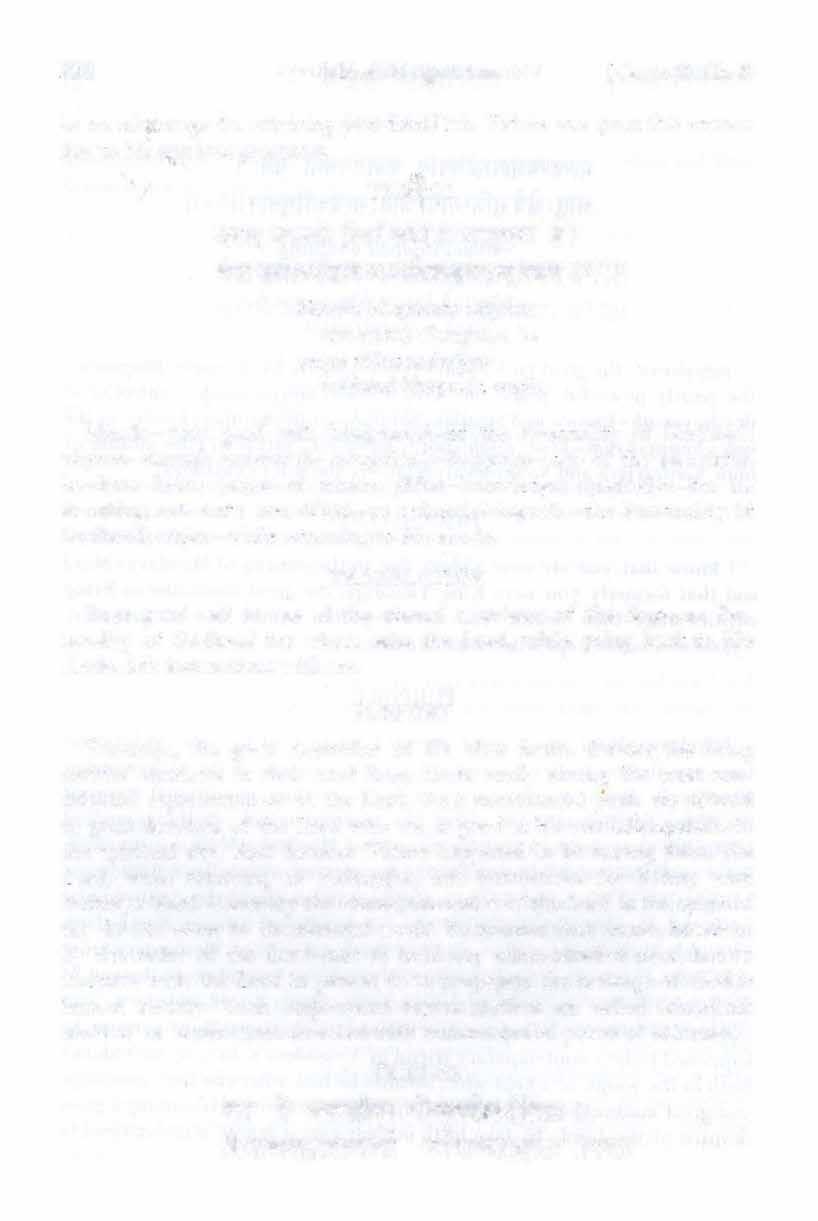
sammata� siinugasya ha yasya jiiiinopaddiiya miidisad bhagaviin vrajan
bhaviin-your good self; bh agavata[t-of the Personality of Godhead; nityam-eternal; sa mmata,h- recognized;siinugasya- one of Lhe associates; ha-have been; yasya-of whom; jiiiina-knowledge; upad esiiya-for in-· structing; mii-unto me; iidisat-so ordered; bhag aviin- Lh e Personality of Godhead; vrajan-while returning to His abode.
TRANSLATION
Your good self is one of the eternal associates of the Supreme Personality of Godhead for whose sake the Lord, while going back to His abode, left instructions with me.
PURPORT
Yamaraja, the great controller of life after death, decides the living entities' destinies in their next lives. He is surely among the most confidential representatives of the Lord. Such confidential posts are offered to great devotees of the Lord who are as good as His eternaLassociates in the spiritual sky. And because Vidura happened to be among them, the Lord, while returning to Vaikur:t1ha, left instructions for Vidura with Maitreya Muni. Generally the eternal associates of the Lord in the spiritual sky do not come to the material world. Sometimes they come, however, by the order of the Lord-not to hold any administrative post, but to associate with the Lord in person or to propagate.the message of God in human society. Such empowered representatives are called saktyiivesa avatiiras, or incarnations invested with transcendental power of attorney.
184 Srimad-Bhagavatam [Canto 3, Ch. 5
at?t ij �m'4ti\et ��ifmn: 1 AlQR4&"A�If'ijl�i �ol�··�!l\�1: ����II
TEXT 22
atha te bhagaval-Ulii yogamiiyoru-brrhhitii(1 visva-sthity-udbhaviintiirthii van:wyiimy anupurvasa�
atka-therefore; te-unto you; bhagavat-pertaining to the Personality of Godhead; lilaft-pastimes; yoga-maya- energy of the Lord; uru-_greatly; bphhataft-extended by; visva-of the cosmic world; sthiti-maintenance; udbhava-creation; anta-dissolution; arthaft-purpose; var!wyami- I shall describe; anupurvasafl - systematically.
TRANSLATION
I shall therefore describe to you the pastimes by which the Personality of Godhead extends His transcendental potency for the creation, maintenance and dissolution of the cosmic world as they occur one after another.
PURPORT
The omnipotent Lord, by His different energies, can perform anything and everything He likes. The creation of the cosmic world is done by His yoga-maya energy.
TEXT 23



3ll00!13ffilllS� �: I
bhagaviin eka iisedam agra iitmiitrnaniirh vibhu(t iitmecchiinugatiiv iitmii
niiniimaty-upalak�a[!a(1
bhagavan-the Personality of Godhead; eka[1 -one without a second; iisa-was there; idam-this creation; agre -prior to the creation; atma-in His own form; atmanam-of the living entities; vibhufl-master ; atmaSelf; iccha-desire; anugatau-being merged in; atma.-Self; nanamatidifferent vision; upalak , sa�afl-symptoms .

TRANSLATION
The Personality of Godhead, who is the master of aU living entities, existed prior to the creation as one without a second. It is by His will only
Text 23] Vidura's Talks with Maitreya
185
3ll���0•a••�:tf.tRm��: ������
that creation is made possible and again everything merges in Him. This Supreme Self issymptomized by different names.

PURPORT
The great ·age here begins to explain the purpose of the four original verses of the Sr!mad-Bhagavatam. Although they have no access to the Sr!mad-Bhagavatam, the followers of the Miiyiiviidi (impersonalist) school sometimes crew out an imaginary explanation of the original four verses, but we must accept the actual explanation given herein by Maitreya Muni because he, along with Uddhava, personally heard it directly from the Lord. The first line of the original four verses runs, aham evasam evagre. The word aham is misinterpreted by the Miiyiiviidi school into meanings which no one but the interpreter can understand. Here aham is explained as the Supreme Personality.of Godhead, not the individualliving entities. Before the creation, there was only the Personality of Godhead; there were no puru§a incarnations and certainly no living entities, nor was there the material energy, by which the manifested creation is effected. The puru§a incarnations and all the different energies of the Supreme Lord were merged in Him only.
The Personality of Godhead is described herein as the master of all other living entities. He is like the sun disc, and the living entities are like the molecules of the sun's rays. This existence of the Lord before the creation is confirmed by the sru tis : viisudevo vii idarh agra asit n.a brahmii na ca saTikara[t eko vai niiriiya[ta iisit na brahmii n.a isiin.o. Because everything that be is an emanation from the Personality of Godhead, He therefore always exists alone without a second. He can so exist because He is all-perfect and omnipotent. Everything other than Him, including His plenary expansions the Vi�rtu-tattvas, is His part and parcel. Before the creation there were no Kiiraryiin_1avasiiyl or Garbhodakasayl or K�lrodakasayi Yi$1)US, nor was there Brahma nor Sarikara. The Yi$J)LI plenary expansion and the living entities beginning from Brahma are separated parts and parcels. Although the spiritual existence was there with the Lord, the material existence was dormant in Him. By His will only is the material manifestation done and undone. The diversity of the Vaikurythaloka is one with the Lord, just as the diversity of soldiers is one with and the same as the king. As explained in Bhagavad-g!ta (9. 7), the material creation takes place at intervalsby the will of the Lord, and in the periods between dissolution and creation, the living entities and the material energy remain dormant in Him.

186 Srimad-Bhagavatam [Canto 3, Ch. 5
sa vii e�a tadii dra§tii niipasyad drsyam ekariit mene 'santam iviitmiinarh
supta-saktir asupta-drk
sa[l-the Personality of Godhead; va-eilher; efiafl-all these; tada-'-at that time; drafita-the seer; na-did not; apasyat-see; drsyam-the cosmic creation; ekarat-undisputed proprietor; mene-thought like this; asantam-nonexistent; iva-like that; atmanam-plenarymanifestations; suptaunmanifested; sakt*-material energy; asupta-manifested; drk-internal potency.

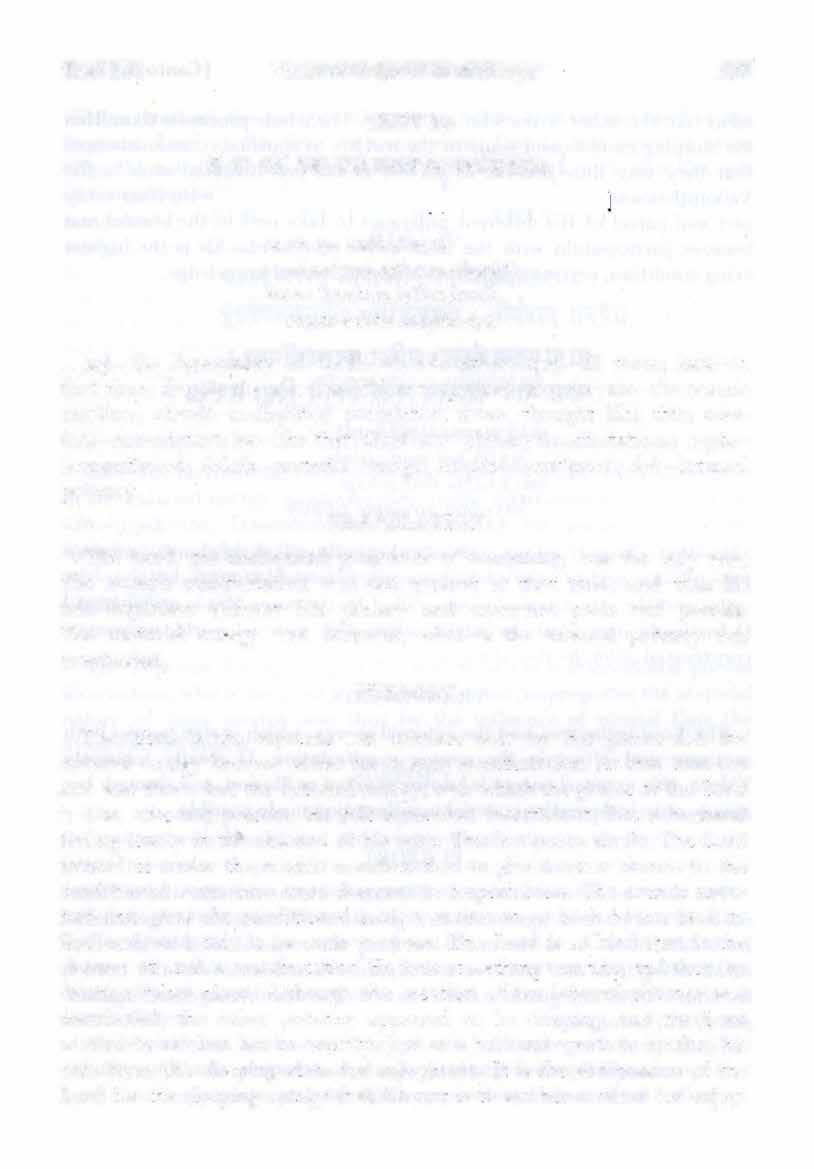
TRANSLATION
The Lord, the undisputed proprietor of everything, was the only seer. The cosmic manifestation was not present at that time, and thus He felt imperfect without His plenary and separated parts and parcels. The material energy was dormant, whereas the internal potency was manifested.
PURPORT
The Lord is the supreme seer because only by His glance did the material energy become aclive for cosmic manifestation. At thattime the seer was there, but the externat energy, over which the glance ofthe Lord is cast, was not present. He felt somewhat insufficient, like a husband feeling lonely in the absence of his wife. This is a poetic simile. The Lord wanted to create the cosmic manifestation to give another chance to the conditioned souls who were dormant in forgetfulness. The cosmic manifestation gives the conditioned souls a chance to go back home, back to Godhead, and that is its main purpose. The Lord is so kind that in the absence of such a manifestation He feels something wanting, and thusthe creation Lakes place. Although the creation of the internal potency was manifested, the other potency appeared to be sleeping, and the Lord wanted to awaken her to activity, just as a husband wants to awaken his wife from the sleeping state for enjoyment. It is the compassion of the Lord for the sleeping energy that He wants to see her awaken for enjoy-
Text24) Vidura'sTalkswithMaitreya
TEXT24 � � �" �rn'1Nt��tu��Efi(il,l
ijft (ijft II�\?II ...
187
ment like the other wives who are awake. The whole process is to enliven the sleeping conditioned souls to the real life of spiritual consciousness so that they may thus become as perfect as the ever-liberated souls in the VaikuQ.thalokas. Since the Lord is sac-cid-iinanda-vigraha, He likes every part and parcel of His different potencies to take part in the blissful rasa because participation with the Lord in His eternal rtisa-lilii is the highest living condition, perfect in spiritual bliss and eternal knowledge.
TEXT 25



m����: �:Q<(Q<(IR"•It
lf1ln Wffll ¥t61¥ntl � � fti: II��II
sii vii etasya sarhdra�tu� sakti(! sa.d-asad-iitmikii miiyii niima mahiibhiiga · yayedarh nirmame vibhu�
sa-that external energy; vii-is either; etasya- of the Lord; sarhdrafitu[t-of the perfect ·ecr; saktilt-energy; sat-asat-atmika- both as the cau ·c and the effect; maya nama-called by the name Maya; mahiibhiiga0 fortunate one; yaya- by which; idam-this material world;nirmameconstructed; vibhu�- the Almighty.
TRANSLATJON
The Lord is the seer, and the external energy, which is seen, works both as cause and effect in the cosmic manifestation. 0 greatly fortunate Vidura, this external energy is known as maya or illusion, and through her agency only is the entire material manifestation made possible.
PURPORT
The material nature, known as maya, is both the material and efficient cause of the cosmos, but in the background the Lord is the consciousness for all activities. As in the individual body the consciousness is the source of all energies of the body, so the supreme consciousness of the Lord is the source of all energies in material nature. This is confirmed in Bhagavadgitii (9.10) as follows:
m ayiidhyak� e rw
prakrt*suyatesacaracaram hettut.iinena kannteyajagad viparivartate
188 Srimad-Bhagavatam [Canto 3, Ch. S
TEXT 26



Cf4R�lit41 (I �gtll+tU411l1ioO��H I ,�UIItll¥(�ort eft� � ������
kiila-vrttyii tu miiyiiyiirh
gu[!a-mayyiim adhok�aja� puru:�e[!iitma-bhutena viryam iidhatta viryaviin
kala-the eternal time; vrttya-by the influence of; tu- bu t; mayayiimin the external energy; gu!ta-mayyam-in the quali tative modes of nature; adhokflajaft-the Transcendence; puru.se!ta-by the purufla incarnation; atma-bhiitena-who is the plenary expansion of the Lord; viryam-the seeds of the living entities; iidhat ta- impregnated; viryaviin-the Supreme Living Being.
TRANSLATION
The Supreme Living Being in His feature as the transcendental puru�a incarnation, who is the Lord's plenary expansion, impregnates the material nature of three modes, and thus by the influence of eternal time the living entities appear.
PURPORT
The offspring of any living being is born after the father impregnates the mother with semina and the living entity floating in the semina of the father takes the shape of the mother's form. Similarly, mother material nature cannot produce any l iving entity from her material elements unless and until she is impregnated with living entities by the Lord Himself. That is the mystery of th e generation of the living entities. This impregnating process is performed by the first puru�a incarnation, Karariirl)avasayi Vi�f}U. imply by His glance over material nature, the whole matter is accomplished.
We should not understand the process of impregnation by the Personality of Godhead in terms of our conception of sex. The omnipotent Lord can impregnate just by His eyes, and therefore He is called all-
Text 26] Vidura's Talks with Maitreya 189
"Throughout all the energies of material nature there is the hand of the Supreme Lord as the final superintendent. Due to this supreme cause only, the activities of material nature appear planned and systematic, and all things regularly evolve."
potent. Each and every part of His transcendental body can perform each and every function of the other parts. This is confirmed in the Brahmasamhita (Bs. 5.32): angani yasya sakalendriya-vrttimanti. In Bhagavad-gita also (14.3), the same principle is confirmed: mama yonir mahad brahma tasmin garbham dadhiimy aham. When the cosmic creation is manifested, the living entities are directly supplied from the Lord; they are never products of material nature. Thus, no scientific advancement of material science can ever produce a living being. That is the whole mystery of the material creation. The living entities are fore ign to matter, and thus they cannot be happy unless they are situateu in the same spiritual life as the Loru. The mistaken living being, out of forgetfulness of this original condition of life, unnecessarily wastes time tryingto become happy in the material world. The whole Vedic process is to remind oneof this essential feature of life. The Lordoffer the conditioned soul a material body for his so-called enjoyment , but ifone doe s not come to his senses and enter into ·piritual consciousness, the Lord again puts him in the unmanifested condition as it existed in the beginning of th e creation. The Lord is descri bed here as viryaviin , or the g reatest potent being, because He impregnates material nature with innumerable living entities who are conditioned fromtime immemorial. ·

TEXT


/.ato 'bhava.n rnahal-la.llvam avyak tal kiila-codit.iit;

vijii.iiniil.mii "tnw-deha-stlwm Vl:svarh vyarijarhs tamonuda{l.
tata�- therc after; abhavat - c ame into existcnce; mahat-supreme; tattvam-sum LolaI; avya/d;iit-from the unmanifcstcd; kiila- coditiit- by the interaction of time; viji'iiiniitmii-unalloy ed goodness; iitma-deha-s tha msilualcd on l11c bodily elf; visvarn- omplcle universes; vyari ja.n - manifcsled; tarnonuda{1- the supreme ligh L.
TRANSLATION
Thereafter, influenced by the interactions of eternal time, the supreme sum total of matter called the mahat-tattva became manifested, and in this mahat-tattva the unalloyed goodness, the Supreme Lord, sowed the seeds of universal manifestation out of His own body.

190 Srimad-Bhagavatam [Canto 3, Ch. 5
27 aJ1S+iCC-l'i("Ei'*4'iotl"dil�l��ft\�11((I ��U�sM.tli?;ciJII�"II
PURPORT
In due course of time, the impregnated material energy was manifested first a the total material ingredients. Every thing takes its own time to fructify, and therefore the word kiila-coditiit, influenced by time, is used herein. The rnahat-tattva is the total consciousness because a portion of it is represented in everyone as the intellect. The rnahat-tattva is directly connected with the supreme consciousness of the Supreme Being, but still it appears as matter. The rnahat-tattva or shadow of pure consciousness is the germinating place of all creation. It is pure goodness with the slight addition of the material mode of passion, and therefore activity is generated from this point.
TEXT 28


w 'py arhsa-gu(W-kiiliit mii bhagavad-dr�(i-gocara{l atmarwrh vyakarod iilmii visvasva.�va si.�rl•�aya
satt -mahat-tat t va; api- also; arh.sa-puru�a plenary e xpansion; gu(IGchiefly the q uali ty of ignorance; 1-.:iila.-the duration of time; iitmii-full con ciousness; bhagavat-the Personality of Godhead; drHi-gocara[t-range of sight; iit miinam - many different forms; vya/mrut-diffcrcntiated; almareservoir; visvasya-the would-be entitics; asya-of this; si�rlr�uyii- generate the false ego.
TRANSLATION
Thereafter the mahat-tattva differentiated itself into many different forms as the reservoir of the would-be entities. The mahat-tattva is chiefly in the mode of ignorance, and it generates the false ego. Jt is a plenary expansion of the Personality of Godhead with full consciousness of creative principles and time for fructification.
PURPORT
The mahat-tattva is the via medium between pure spirit and material existence. It is the junction of matter and spirit wherefrom the false ego of th · living en t ity i. generated. All living entities are di fferentiatc u parts and parcels of the Personality of Godhead. Under the pressure of false ego, the conditioned souls, although parts and parcels of tl1e Supreme Personality of Godhead, claim to be the enjoyers of material nature. This false ego is the binding force of material existence. The Lord again and
Text 28] Vidura's Talks with Maitreya 191
�s<4�gultit�.+t•l€4'(tf!•n"itu1 SCI�I;f�¥ili1\IE+llfit�����11�<::11
again gives a chance to the bewildered conditioned souls to get free from this false ego, and that is why the material creation takes place at intervals. He gives the conditioned souls all facilities for rectifying the activities of the false ego, but He does not interfere with their small independence as parts and parcels of the Lord.
TEXT 29

qc'E1'*41fltc4iuna:ca� 6415tl�a 1
ttil4t.a<
UiEfrilt�l �f�+t'il'l�: I �cW��� 611i(i�� � 11��11
tnahat-tattviid vikurviirtiid aharh-tattvam vyajiiyata
kiirya-kiirarta-kartriitmii bhutendriya-mano-maya� vaikiirikas taijasas ca tamasas cety aharh tridhii
mahat-the great; tattviit-causal truth; vikurvii�uit- being transformed; aham-fal e ego; tattvam- material truth; vyajiiyata-became manifested; kiirya-effccts; kiirarta- causc ; kartr-doer; iitmii-soul or source; bhutamaterial ingredients; indriya-senses ; mana� -maya� - hovering on the mental plane; vaikiirikalt-modeof goodness; taijasa� -mode of passion; tiimasa�- modc of ignor a nce ; ca-and; iti-thus; aham-false ego; tridhii-lhree kinds.
TRANSLATION
Mahat-tattva, or the great causal truth, transforms into false ego, which is manifested in three phases-cause, effect and the doer. All such activities are on the mental plane and are based on the material elements, gross senses and mental speculation. The false ego is represented in three different modes-goodness, passion and ignorance.
PURPORT
A pure living entity in his original spiritual existence is fully conscious of his constitutional position as an eternal servitor of the Lord. All souls who are situated in such pure consciousness are liberated, and therefore they eternally live in bliss and knowledge in the various V aikut:ttha planets in Lhe spiritual sky. When the material creation is manifested, it is not meant for them. The eternally liberated souls are called nitya-muktas,
192 Srimad-Bhagavatam [Canto 3, Ch. 5
and they have nothing to do with the material creation. The material creation is meant for rebellious souls who are not prepared to accept subordination under the Supreme Lord. This spirit of false lordship is called false ego. It is manifested in three modes of material nature, and it exists in mental speculation only. Those who are in the mode of goodness think that each and every person is God, and thus they laugh at the pure devotees who try to engage in the transcendental loving service of the Lord. Those who are puffed up by the mode of passion try to lord it over material nature in various ways. Some of them engage in altruistic activities as if they were agents appointed to do good to others by their mental speculative plans. Such men accept the standard ways of mundane altruism, but their plans are made on the basis of false ego. This false ego extends to the limit of becoming one with the Lord. The last class of egoistic conditioned souls- those in the mode of ignoranc�-are misguided by identification of the gross body with the self. Thus, all their activities are centered around the body only. All these persons are given the chance to play with false egoistic ideas, but at the same time the Lord is kind enough to give them a chance to take help from scriptures like Bhagavadgita and Srimad-Bhiigavatam so that they may understand the science of J<.r�J;ta and thus make their lives successful. The entire material creation, therefore, is meant for the falsely egoistic living entities hovering on the mental plane under different illusions in the modes of material nature.
TEXT 30

31l6"'41fd:tli4iunrq;fl
�'t.lfttt<la:� I
-¥1REf.l� ir � 31'lfif¥1qlt;f �: ll�oll
ahatn-tattviid vikurvii{liin mano vaikiirikiid abhiit vaikiirikiis ca ye devii arthiibhivyanjanam yataft
aham-tattviit-from the principle of false ego; vikurvii[liit-by trans.formation; m.anaft-the mind; vaikiirihiit-by interaction with the mode of goodness; abhut-generated; vaikiirikiift-by interaction with goodness; caalso; ye-all these; deviift-demigods; artha-the phenomenon; abhivyaiijanam-physical knowledge; yataft-the source.
TRANSLATION
The false ego is transformed into mind by interaction with the mode of goodness. All the demigods who control the phenomenal world are also
Text 30] Vidura's Talks with Maitreya 193
products of the same principle, namely the interaction of false ego and the mode of goodness.
PURPORT
False ego interacting with the different modes of material nature is the source of all materials in the phenomenal world.
TEXT 31

taijasiin!ndriyii[!y eva
jiiiina-karma-mayiini ca
taijasiini- the mode of passion; indriyar.i-the senses; eva-certainly; jniina-knowledge, philosophical speculations; karma-fruitive activities; mayani-predominating; ca-also.
TRANSLATION
The senses are certainly products of the mode of passion in false ego, and therefore philosophical speculative knowledge and fruitive activities are predominantly products of the mode of passion.
PURPORT
The chief function of the false ego is godlessness. When a person forgets his constitutional position as an eternally subordinate part and parcel of the Supreme Personality of Godhead and wants to be happy independently, he functions mainly in two ways. He first attempts to act fruitively for personal gain or sense gratification, and after attempting such fruitive activities for a considerable time, when he is frustrated, he becomes a philosophical speculator and thinks himself to be on the same level as God. This false idea of becoming one with the Lord is the last snare of the illusory energy, which traps a living entity into the bondage of forgetfulness under the spell of false ego.
The best means of liberation from the clutches of false ego is to give up the habit of philosophical speculation regarding the Absolute Truth. One should know definitely that the Absolute Truth is never realized by the philosophical speculations of the imperfect egoistic person. The Absolute Truth or the Supreme Personality of Godhead is realized by hear-
194 Srimad-Bhigavatam [Canto 3, Ch. 5
��r.fmS(�t�q $t�Efi'iq�nf;r !if II�� II
ing about him in all submission and love from a bona fide authority who is a representative of the twelve great authorities mentioned in the Sr""imad-Bhiigavatam. By such an attempt only can one conquer the illusory energy of the Lord, although for others she is unsurpassable, as confirmed in Bhagavad-g""itii (7.14).
TEXT 32


�'{6G.t¥Ufa\4a:�{Q¥Ut:'lif: ����II
tiimaso bhuta-sukfimiidir yatalt kham lihgam iitmana�
tiimasa�-from the mode of passion; bhilta-silkfimiidi�-subtle sense objects; yataft-from which; kham-the sky; lingam-symbolic representation; iitmana�-of the Supreme Soul.
TRANSLATION
The sky is a product of sound, and sound is the transformation of egoistic passion. In other words, theskyisthesymbolicrepresentationof theSupremeSoul.
PURPORT
In the Vedic hymns it is said, etasmiid iitmana� iikiisa� sambhuta�. The sky is the symbolic representation of the Supreme Soul. Those who are egoistic in passion and ignorance canuot conceive of the Personality of Godhead. For them the sky is the symbolic representation of the Supreme Soul.
TEXT 33
�P'If�t�lit;r ¥141€1i\R.fd ;rll: I
kiila-miiyiirhsa-yogena
bhagavad-v""ikfiitam nabhalt
nabhaso' nusrtath spadarh
vilwrvan ninname 'nilam
kiila-time; maya-external energy; arhsa-yogena- partly mixed; bhagavat-the Personality of Godhead; vik§itam-glanced over; nabha[l-the sky; nabhasa[t-from the sky; anusrtam-being so contacted; sparsam- touch; vikurvat- being transformed; nirmame-was created; anilam-the air.
Text 33] Vidura'sTalkswith Maitreya 195
��
������
m �t�f4laiit�
TRANSLATION
Thereafter the Personality of Godhead glanced over the sky, partly mixed with eternaJ time and external energy, and thus developed the touch sensation, from which the air in the sky was produced.
PURPORT
All material creations take place from subtle to gross. The entire universe has developed in that manner. From the sky developed the touch sensation, which is a ·mi xture of eternal time, the external energy and the glance of the Personality of Godhead. The touch sensation developed into the air in the sky . Similarly, all other gross matter also developed from subtle to gross: sound developed into sky, touch developed into air, form developed into fire, taste developed into water, and smell developed into earth.
TEXT
anilo 'pivikurvii(W nabhasoru-baliinvitaft sasarja riipa-tan-matrarh jyotir lokasya locanarn
ani la[t -air; api-also ; vikurvarw�-being transformed; nabhasa- sky; uru-bala-anvita�-extremely powerful; s asarja-created ; rilpa-form; tatmatram-sense perception; jyoti[t-electricity; lokas ya-of the world; locanam-light to see.
TRANSLATION
Thereafter the extremely powerful air, interacting with the sky, generated the form of sense perception, and the perception of form transformed into electricity, the light to see the world.
TEXT 35

'lf.l�wtl�J ����I
'll\4'<llwtl � �(qffij.{t4(�t:/11��11
anileniinvitarhjyotir vikurvatparavl:k�itam
196 Srimad-Bhagavatam [Canto 3, Ch. 5
�ftrn�
34 �itsfit A�an ;Jit«lVii<?H�: 1 m �6fltlsi
Jl'ii4wt'( II �'flll
adhattiimbho rasa-mayarit kiila-miiyiiritsa-yogata[t
anilena-by the air; anvitam-interacted; jyoti[!-electricity; vikurvatbeing transformed; paravik§ita m-being glanced over by the Supreme; adhatta-created; ambha{l rasa-mayam-water with taste; kala-eternal time; miiylirhsa-external energy ; yogata{t-by a mixture.
TRANSLATION
Whenelectricity was,surchargedintheairand was gl.ancedoverbythe Supreme,at thattime, bya mixture of eternal timeandexternalenergy, thereoccurredthecreationofwaterand taste.
TEXT36

jyoti�iimbho ' nusa rhsrfitarh vikurvad brahma-vtkfiitam mah"irit gandha-gul}iim iidhiit kiila-miiyaritsa-yogata[t
jyoti§a-electricity; ambha{l-water; an.u.sarhsrstam- thus created; vikurvat-duetotransformation;brahma-theSupreme;vik§itam- so glanced over; mahim-the earth; gandha-smell; gurtam-qualificalion; iidhat- was created; kala-eternal time; maya-external energy; arhsa-partially; yogata{l-byintermixture.
TRANSLATION
Thereafter the water produced from electricity was glanced over by the Supreme Personality of Godhead and mixed with eternal time and external energy. Thus it was transformed into the earth, which is qualifiedprimarilybysmell.
PURPORT
From the descriptions of the physical elements in the above verses it is clear that in all stages the glance of the Supreme is needed with the other additions and alterations. In every transformation, the last finishing touch is the glance of the Lord, who acts as a painter does when he mixes different colors to transform them into a particular color. When one element mixes with another, the number of its qualities increases. For
Text36] Vidura ' s Talks with Maitreya
197
�lf<t'4lwflSa4(le� I
'lff �gullqlli4lff,hiSqlld�itlt•M: II�� II
example, the sky is the cause of air. The sky has only one quality, namely sound, but by the interaction of the sky with the glance of the Lord, mixed with eternal time and external nature, the air is produced, which has two quaJities-sound and touch. Similarly after the air is created, interaction of sky and air, touched by time and the external energy of the Lord, produces electricity. And after the interaction of electricity with air and sky, mixed with time, external energy and the Lord's glance over them, the water is produced. In the final stage of sky there is one quality, namely sound; in the air two qualities, sound and touch; in the electricity three qualities, namely sound, touch and form; in the water four qualities, sound, touch, form and taste; and in the last stage of physical development the result is earth, which has all five qualities-sound, touch, form, taste and smell. Although they are different mixtures of different materials, such mixturesdo not take place automatically,justas amixture ofcolorsdoes nottake place automatically without the touch of the living painter. The automatic systemis factually activated by the glancing touch of the Lord. Living consciousness is the final word in all physical changes. This factis mentioned in Bhagavad-gltii as follows:
mayiidhyak�er-a prakrt* suyate sacariicaram
hetuniinena kaunteya jagad viparivartate (Bg. 9.10)
The conclusionisthatthe physical elements maywork verywonderfully to the laymen's eyes, but their workings actually take place under the supervision of the Lord. Those who can mark only the changes of the physical elements and cannot perceive the hidden hands of the Lord behind them are certainly less intelligent persons, although they may be advertisedasgreatmaterial scientists.
TEXT 37

bhutiiniim nabha iidlniim yad yad bhavyiivarii-varam te�iim pariinusamsargiid· yathii san.khyam gurp'in viduft
bhutiiniim-of all the physical elements; nabhaft - the sky; iidiniimbeginningfrom;yat-as; yat- andas; bhavya-0 gentle one;avarii-inferior;
198 Srimad-Bhagavatam [Canto3,Ch. 5
� ;rll � �oqfctOiH'{ I � ���tP.rm� � f?t�: ��
varam-superior; te�arn-all of them; para-the Supreme; annsarnsargatlast touch; yatha-as many; sarikhyam-numbcr; gn(liin-qualities; vidu(tyou may understand.
TRANSLATION
0 gentle one, of all the physical elements, beginning from the sky down to the earth, all the inferior and superior qualities are due only to thefinal touchofthe glanceof theSupremePersonali tyof Godhead .
TEXT38

��:�fctqO:m�Pmlf�: t
-«llll(itl«.<tt$4414hn:�:SU!'t'Stlt�
ete devii(t kalii vi,�(J.O� kala-mayiirhsa-lihginab. n.iiniitvat svakriyanisa� prow[! priiiijalayo vibhu m
ete-of all these physical elements; deva�-the controlling demigods; kala�-parts and parcels; viwo�-of the Supreme Personality of Godhead; kala-time; maya-external energy; arhsa-part and parcel; liligina{l so embodied; nanatvat-because of various; svakriya-personal duties; anisa{�not being able to perform; procu�-uttered; prafijalaya�-fascinating; vibhnm-unto the Lord.
TRANSLATION
The controllingdeitiesofalltheabove-mentionedphysicalelementsare empowered expansions of Lord Vi�J;tU. They are embodied by eternal time under the external energy, and they are His parts and parcels. Because they were entrusted with different functions of universal duties and were unable to perform them, theyofferedfascinatingprayers tothe Lordasfollows:
PURPORT
The conception of various controlling demigods who inhabit the higher planetarysystems for the management of universalaffairs is not imaginary, as proposed by persons with a poor fund of knowledge. The demigods are expanded parts and parcels of the Supreme Lord Vi�J;tu, and they are embodied by time, external energy and partial consciousness of the Supreme. Human beings, animals, birds, etc., are also parts and parcels of
Text 38] Vidura's Talks with Maitreya 199
������
the Lord and have different material bodies, but they are not the controlling deities of material affairs. They are, rather, controlled by such demigods. Such control is not superfluous; it is as necessary as the controlling departments in the affairs of a modern state. The demigods should not be despised by the controlled living beings. They are all great devotees of the Lord entrusted to execute certain functions of universal affairs. One may be angry with Yamaraja for his thankless task of punishing sinful souls, but Yamaraja is one of the authorized devoteP.R of the Lord, and so are all the other demigods. A devotee of the Lord is never controlled by such deputed demigods, who function as assistants of the Lord, but he shows them all respects on account of the responsible positions to which they have been appointed by the Lord. At the same time, a devotee of the Lord does not foolishly mistake them to be the Supreme Lord. Only foolish persons accept the demigods as being on the same level as Vi��IU; actually they are all appointed as servants of V i�pu.
Anyone who places the Lord and the demigods on the same level is called a pii�a!lt)i, or atheist. The demigods are worshiped by persons who are more or less adherents to the processes of jniina, yoga and karma, i.e., the impersonalists, meditators and fruitive workers. The devotees, however, worship only the Supreme Lord Vi�!)u. This worship is not for any material benefit, as desired by all the materialists, even up to the salvationists, mystics and fruitive workers. Devotees worship the Supreme Lord to attain unalloyed devotion to the Lord. The Lord, however, is not worshiped by others who have no program for attaining love of God, which is the essential aim of human life. Persons who are adverse to a loving relationship with God are more or less condemned by their own actions.
The Lord is equal to every living entity, just like the flowing Ganges. The Ganges water is meant for the purification of everyone, yet the trees on the banks of the Ganges have different values. A mango tree on the bank of the Ganges drinks the water,and the nim tree also drinks the same water. But the fruits of both trees are different. One is celestially sweet, and the other is hellishly bitter. The condemned bitterness of the nim is due to its own past work, just as the sweetness of the mango is also due to its own karma. The Lord says in Bhagavad-gitii:
tiin aharh dvi§ata� kruriin sarhsiire�u nariidhamiin

k�ipiimy ajasram asubhiin iisurisv eva yoni�u
"The envious, the mischievous, the lowest of mankind, these do I ever put hack into the ocean of material existence, into various demonic species of life." (Bg. 16.19). Demigods like Yamaraja and other controllers
200 Srimad-Bhagavatam [Canto 3, Ch. 5
are there for the unwanted conditioned so uls who always engage in threatening the tranquility of the kingdom of God. Since all the de migods are confidential devotee-servitors of the Lord, they are never to be condemned.
TEXT 39


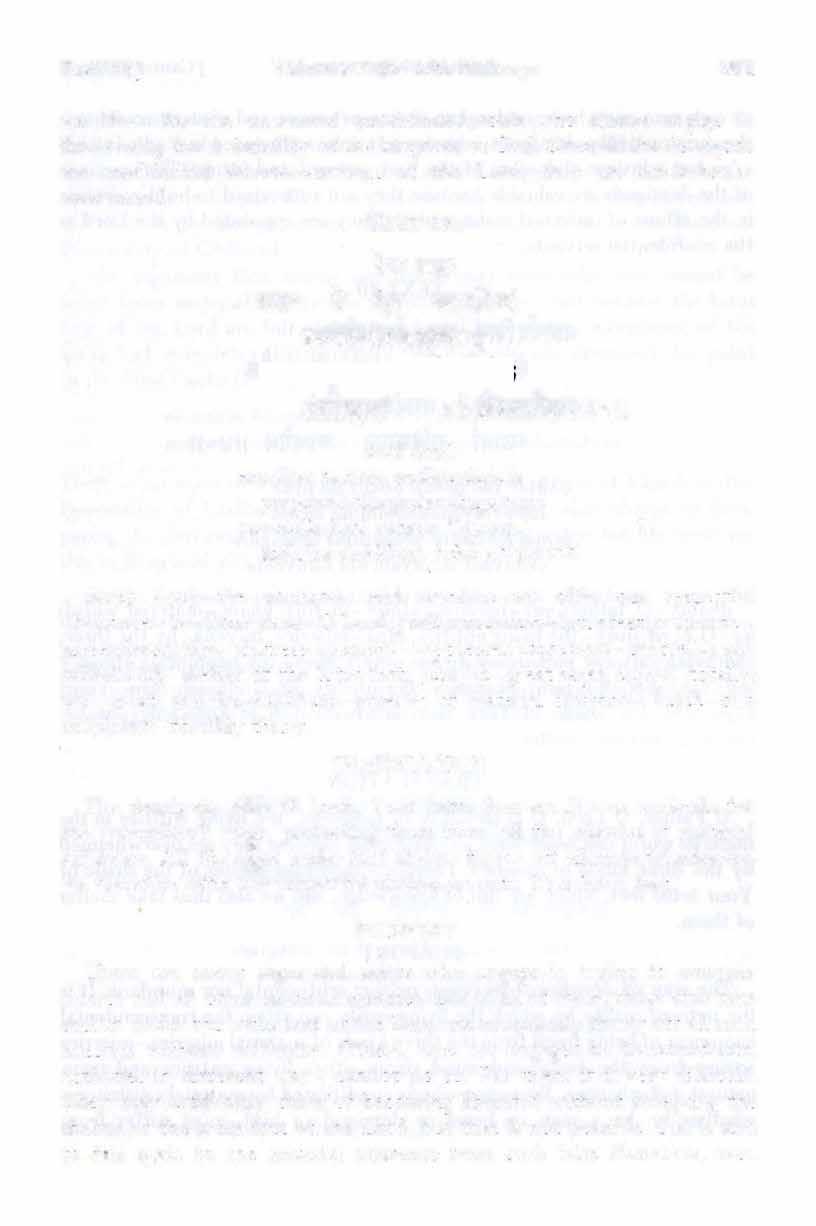
�:� Gtf��"l ����II

devii ucuft namiima te deva padiiravindarh
prapanna-tiipopasamiita.patram yan-mula-ketii yatayo 'iijasoru
sruhsiira -duftkham bahir utk!iipanti
deviift ucuft-the de migods said; namiima-we offer our respectful obeisances; te- Your; deva-0. Lord;padii-aravinda.m-lotus feet;pra.panrwsurrendered; tiipa-di st re ss; upa.sama.-. uppresses; iitapalram--u mbreiIa; ya.tmula -ket a.ft -shelte r of the lotus feet; yataya(t-great sages; aiijasii-totally; uru-great; sarhsiira.-du [l.khnm -miseries of material existence; ba.hift-ou t; utk!iipanti-for cibly t hrow.

TRANSLATION
The demigods said: 0 Lord, Your lotus feet are like an umbrella for the surrendered souls, protecting them from all the miseries of material existence. All the sages under that shelter throw off all material miseries. We therefore offer our respectful obeisances unto Your lotus feet.
PURPORT
There are many sages and saints who engage in trying to conquer rebirth and all other material miseries. But of all of them, those who take shelter under the lotus feet of the Lord can completel y throw off all such miseries without difficulty. Others, who are e ngaged in transcendental ac t.ivilies in diffen:n t way , cannot do so. For them it is very diffi c u It. They may a rt ifi c ially think of becoming liberated without acce pting the shelter of the lotus fe e t of the Lord, but that is not possible. One is sure to fall a gain to the material existence from such false liberation, e ven
Text 39] Vidura's Talks with Maitreya 201
��: ;mq � � 'fa:Hfel;( st4"*fttf�JUd4'14{ I 1«t�S�(11�
though one may have undergone severe penances and austerities. This is the opinion of the demigods, who are not only well versed in Vedic knowledge but who are also seers of the past, present and future. The opinions of the demigods are valuable because they are authorized to hold positions in the affairs of universal management. They are appointed by the Lord as His confidential servants.
TEXT 40


dhiitar yad asmin bhava Isa jiviis tiipa-traye[!iibhihatii na sarma iitmal labhante bhagavarhs taviihghricchiiyiirh savidyiim ata iisrayema
dhiitaft-0 father; yat- because; asmin-in this; bhave-material world; iSa-0 Lord;jiviift-the living entities;tapa-miseries; traye!w-by the three; abhihatiift-always embarrassed; na-never; sarma-in happiness; iitmanself; labhante-do gain; bhagavan - Personality of Godhead; tava- Your;· arighri-chiiyiim-shade of Your feet; savidyiim-full of knowledge; ata[lobtain; asrayema-shelter.
TRANSLATION
0 Father, 0 Lord, 0 Personality of Godhead, the living entities in the materialworld can never have any happiness because they are overwhelmed by the three kinds of miseries. Therefore they take shelter of the shade of Your lotus feet, which are full of knowledge, and we alsO thus take shelter of them.
PURPORT
The way of devotional service is neither sentimental nor mundane. It is the path of reality by which the living entity can attain the transcendental happiness of being freed from the three kinds of material miseries-miseries arising from the body and mind, from other living entities and from natural disturbances. Everyone who is conditioned by material existencewhether he be a man. or beast or demigod or bird-must suffer from
202 Srimad-Bhagavatam [Canto 3, Ch. 5
�� � (��m«�N'SI4onflt1tta1 WI � I � �·ICi�ctlsjU� � � 11\loll
iidhyatmic (bodily or mental) pains, iidhibautic pains (those offered by living creatures), and iidhidaivic pains (those due to supernatural disturbances). His happiness is nothing but a hard struggle to get free from the miseries of conditional life. But there is only one way he can be rescued, and that is by accepting the shelter of the lotus feet of the Supreme Personality of Godhead.
The argument that unless one has proper knowledge one cannot be freed from material miseries is undoubtedly true. But because the lotus feet of the Lord are full of transcendental knowledge, acceptance of His lotus feet completes that necessity. We have already discussed this point in the First Canto (I.2.7):
viisudeve bhagavati bhakti-yoga� prayojita�
janayaty iisu vairiigyarh jfiiinaritca yad ahaitukam
There is no want of knowledge in the devotional service of Vasudeva, the Personality of Godhead. He, the Lord, personally takes charge of dissipating the darkness of ignorancefrom the heart of a devotee. He confirms this in Bhagavad-gitii (10.10):
tesiirh satata-yukatiiniirh bhajatiirh priti-purvakam
dadiimi buddhi-yogarh tarh yena miim upayiinti te
Empiric philosophical speculation cannot give one relief from the threefold miseries of material existence. Simply to endeavor for knowledge without devoting oneself to the Lord is a waste of valuable time.
TEXT 41

� ;;rit i{ctqtwft��:��
�qq.fiG:QRaw:w
q� � ijt+f�: �: mHil
miirganti yat te mukha-padma-nit;lais
chanda�-supar{lair r�ayo vivikte
yasyiighamar�oda-sarid-variiyii� padarh padarh t"irtha-pada� prapannii�
miirganti - searching after; yat- as; te- Your; mukha-padma- lotuslike face; nigai�- by those who have taken shelter of such a lotus flower; chanda!t- Vedic hymns; suparr-a*-by the wings; r�aya� - the sages; vivi-
Text 41] Vidura's Talks with Maitreya 203
�I
kte-in clear mind;yasya-whose;agha-marfioda-that which offersfreedom from all reactions to sin; sarit-rivers; variiyii�-in the best; padam padamin every step; tirtha-pada{1-one whose lotus feet are as good as a place of pilgrimage;prapanniih-taking shelter.
TRANSLATION

The lotus feet of the Lord are by themselves the shelter of all places of pilgrimage. The great clear-minded sages, carried by the wings of the Vedas, always search after the nest of Your lotuslike face. Some of them surrender to Your lotus feet at every step by taking shelter of the best of rivers [the Ganges] , which can deliver one from all sinful reactions.
PURPORT
The paramaharhsas are compared to royal swans who make their nests on the petals of the lotus flower. The Lord's transcendental bodily parts are always compared to the lotus flower because in the material world the lotus flower is the last word in beauty. The most beautiful thing in the worldis the Vedas, or Bhagavad-g"itii, becausetherein knowledgeis imparted by the Personality of Godhead Himself. The paramahamsa makes his nest in the lotuslike face of the Lord and always seeks shelter at His lotus feet, which are reached by the wings of Vedic wisdom. Since the Lord is the original source of all emanations, intelligent persons, enlightened by Vedic knowledge, seek the shelter of the Lord, just as birds who leave the nest again search out the nest to take complete rest. All Vedic knowledge is meant for understanding the Supreme Lord, as stated by the Lord in Bhagavad-g"itii: vedais ca sarvair. aham eva vedya{'l (Bg. 15.15). Intelligent persons, who are like swans, take shelter of the Lord by all means and do not hover on the mental plane by fruitlessly speculating on different philosophies.
The Lord is so kind that He has spread the River Ganges throughout the universe so that by taking bath in that holy river everyone can get release from the reactions of sins, which occur at everystep. There aremanyrivers in the world which are able to evoke one's sense of God consciousness simply by one's bathing in them, and the River Ganges is chief amongst them. In India there are five sacred rivers, but the Ganges is the most sacred. The River Ganges and Bhagavad-g"itii are chief sources of transcendental happiness for mankind, and intelligent persons can take shelter of them to go back home, back to Godhead. Even Srlpada Sankaracarya recommends that a little knowledge in Bhagavad-g"itii and the drinking of
204 Srimad-Bhagavatam [Canto 3, Ch. 5
a little quantity of Ganges water can save one from the p unishment of Yamaraja.
TEXT 42
yac chraddhaya sruta-vatyii ca bhaktyii
sammrjyamanc hrdayc 'vadhaya
jfiiincna vairagya-balcna dhTrii
vrajcma tat tc •;Lghri-sarojapTtham
yat-that which; sraddhaya-by eagerness; sruta-vatya- imply by hearing; ca-also; bhaktya-in devotion; sammrjyamane-being cleansed; hrdayc-in the heart; avadhaya-meditation; jfiiinena-by knowledge; vairagya-detachment; balena-by the strength of; dhTrii�-pacified; vrajema-must go to; tat-that; te-Your; arighri-feet; sara�-japTtham-lotus sanctuary.


TRANSLATION
Simply by hearing about Your lotus feet with eagerness and devotion and by meditating upon them within the heart, one at once becomes enlightened with knowledge, and on the strength of detachment one becomes pacified. We must therefore take shelter of the sanctuary oi' Your lotus feet.
PURPORT
The miracles of meditating on the lotus feet of the Lord with eagerness and devotion are so great that no other process can compare to it. The minds of materialistic persons are so disturbed that it is almost imposs ible for them to search after the Supreme Truth by personal regulative endeavors. But even such materialistic men, with a little eagerness for hearing about the transcendental name, fame, qualities, etc. , can surpass all other methods of attaining knowledge and detachment. The conditioned soul is attached to the bodily conception of the self, and the re fore he is in ignorance . Culture of self-knowledge can bring abou L detachment from material affection, and without such detachment there is no meaning to knowledge. The most stubborn attachment for material enjoyment is sex
Text 42] Vidura's Talks with Maitreya 205
��
"� ��tmm���
���o$1.�1 �� �� �'l�¥ttit
� �o•t�il�w:t ito
11\10{11
life. One who is attached to sex life is to be understood as devoid of knowledge. Knowledge must be followed by detachment. That is the way of selfrealization. These two essentials for self-realization, knowledge and detachment, become manifest very quickly if one performs devotional service to the lotus feet of the Lord. The word dhira is very significant in this connection. A person who is not disturbed even in the presence of cause of disturbance is called dhira. Sri Yamunacarya says, "Since my heart has been overwhelmed by the devotional service of Lord Kr�t:�a, I cannot even think of sex life, and if thoughts of sex come upon me I at once feel disgust." A devotee of the Lord becomes an elevated dhira by the simple process of meditating in eagerness on the lotus feet of the Lord. Devotional service entails being initiated by a bona fide spiritual master and following his instruction in regard to hearing about the Lord. Such a bona fide spiritual master is accepted by regularly hearing from him about the Lord. The improvement inknowledge and detachmentcanbe perceived by devotees as an actual experience. Lord Sri Caitanya Mahaprabhu strongly recommended this process of hearing from a bona fide devotee, and by following this process one can achieve the highest result, conquering all other methods.
TEXT 43

�qf�·d�44¥1N

9)afc161(� qa;IJi�· . � I
�� Sl4"-0€4sr.f ��I'( 11\l�ll
visvasya janma-sthiti-sarhyamiirthe krtiivatiirasya padiimbujarh te vrajema sarve sara!tarh yad isa smrtarh prayacchaty abhayarh svapurhsiim
vilvasya-of the cosmic universe; jan ma-creation; sthiti-maintenance; sarhyamiirthe-for the dissolution also; krta-accepted or assumed; avatiirasya-of the incarnations; pada-ambujam-lotus feet; te-Your; vrajemalet us take shelter of; sarve-all of us; sara�am-shelter; yat-that which; iSa-0 Lord; smrtam-remembrance ; prayacchati-awarding ; abhayamcourage; svapurhsiim-of the devotees.
206 Srimad-Bhagavatam [Canto 3, Ch. 5
����
0 Lord, You assume incarnati ons for the creation, maintenance and dissolution of the cosmic manifestation, and therefore we all take shelter of Your lotus feet because they always award remembrance and courage to Your devotees.
PURPORT

For the creation, maintenance and dissolution of the cosmic manifestations there are three incarnations: Brahma, Vi�I)U and Mahesvara (Lord Siva). They are the controllers or masters of the three modes of material nature, which cause the phenomenal manifestation. Vi�I)U is the master of the mode of goodness, Brahma is the master of the mode of passion, and Mahesvara is the master of the mode ofignorance. There are different kinds of devotees according to the modes of nature. Persons in the mode of goodness worship Lord Vi�I)U, those in the mode of passion worship Lord Brahma, and those in the mode of ignorance worship Lord Siva. All three of these deities are incarnations ofthe Supreme Lord Kr�l)a because He is the original Supreme Personality of Godhead. The demigods directly refer to the lotus feet of the Supreme Lord and not to the different incarnations. The incarnation of Vi�I)U in the material world is, however, directly worshiped by the demigods. Itislearned from various scriptures that the demigods approach Lord Vi�I)U in the ocean of milk and submit their grievances whenever thereis some difficultyin the administration of universal affairs. Although they are incarnations of the Lord, Lord Brahmii and Lord Siva worship Lord Vi�l)u, and thus they are also counted amongst the demigods and not as the Supreme Personality of Godhead. Persons who worship Lord Vi�I)U are called demigods, and persons who do not do so are called asuras, or demons. Vi�l)u always takes the part of the demigods, but Brahma and Siva sometimestake the side of the demons; it is not that they become one in interest with them, butsometimes theydo something inorder togain controlover the demons. TEXT44

Text 44] Vidura's Talks with Maitreya 207 TRANSLATION
*4�1�'1·\tsm« � &{¥(1(flt�'{4\(ISIIIIUIII( I ·trt � cmatsft � �ri �wt: CA:Ii'$1'( mum
Srimad-Bhigavatam
yat sanubandhe 'sati deha-gehe mamahamity-u{lha-duragraharzam
pumsam suduram vasato 'pi puryam
bhajema tat te bhagavan padabjam

yat- because; siinubandhe-duetobecomingentangled; asati- thusbeing; deha-the gross material body; gehe-in the home; mama- mine; aham-1; iti- thus; ii{lha-great, deep; duniigrahiirziim-undesirable eagerness; pumsiim-of persons; suduram-far away; vasata� - dwelling; api-although; puryam- within the body; bhajema -let us worship; tat-therefore; te- Your; bhagavan-0 Lord; padiibjam-lotus feet.
TRANSLATION
0 Lord, persons who are entangled by undesirable eagerness for the temporary body and kinsmen, and who are bound by thoughts of "mine" and "I," are unable to see Your lotus feet, although they are situated within their own bodies. But let us take shelter of Your lotus feet.
PURPORT
The whole Vedic philosophy of life is that one should get rid of the material encagement of gross and subtle bodies, which only cause one to continue in a condemned life of miseries. This material body continues as long as one is not detached from the false conception of lording it over material nature. The impetus for lording over material nature is the sense of "mine" and "1." "I am the lord of all that I survey. So many thingsI possess, and I shall possess more and more. Who can be richer than I in wealth and education? I am the master, and I am God. Who else is there but me?" All these ideas reflect the philosophy of aham- mama, the conception that "I am everything". Persons conducted by such a conception of life can never get liberation from material bondage. But even a person perpetually condemned to the miseries of material existence can get relief from bondage if he simply agrees to hear only Kr:§!za-kathii. In this age of Kali, the process of hearing Kmw-kathii is the most effective means to gain release from unwanted family affection and thus find permanent freedom in life. The age of Kali is full of sinful reactions, and people are more and more addicted to the qualities of this age, but simply by hearing and chanting of Kmw-kathii one is sure to go back to Godhead. Therefore, people should be trained to hear only Kr:�rza-kathiiby all means-in order to get relief from all miseries.
208
[Canto 3, Ch. 5
� � ijijft�fit�� q(a(aa�: m sttit " �� ;@ -� �efcl�aa���n il\l�ll
tan vai hy asad-vrttibhir ak�ibhir ye parahrtiintar-manasa� paresa atho na pasyanty urugiiya niinam ye te padanyiisa-viliisa-lak�ya�

tiin-the lotusfeet of the Lord;vai-certainly;hi-for;asat-materialistic; vrttibh*-by those who are influenced by external energyi ak�ibhift-by thesenses;ye-those;pariihrta-missingatadistance;anta�-manasa�- of the internal mind; paresa-0 Supreme; atho-therefore; na-never; pasyantican see;urugiiya-0 great;niinam-but;ye-those;te-who are;padanyiisaactivities;viliisa-transcendental enjoyment;lak�yii�-those who see.
TRANSLATION
0 great Supreme Lord, offensive persons whose internal vision has been too affected by external materialistic activities cannot see Your lotus feet, but they are seen by Your pure devotees, whose one and only aim is to transcendentally enjoy Your activities.
PURPORT
As stated in Bhagavad-gitii (18.61), the Lord is situated in everyone's heart. It is natural that one should be able to see the Lord at least within himself. But that is not possible for those whose internal vision has been covered by external activities. The pure soul, which is symptomized by consciousness, can be easily perceived even by a common man because consciousnessis spreadall over the body.Theyoga system asrecommended in Bhagavad-gitii is to concentrate the mental activities internally and thus see the lotus feet of the Lord within oneself. But there are many so-called yogis who have no concern with the Lord but are only concerned with consciousness, which they accept as the final realization. Such realization of consciousness is taught by Bhagavad-gitii within only a few minutes, whereas the so-called yogis take continuous years to realize it because of their offenses at the lotus feet of the Lord. The greatest offense is to deny
Text45) Vidura's Talks with Maitreya
TEXT45
209
the existence of the Lord as separate from the individual souls or to accept the Lord and the individual soul as one and the same. The impersonalists misinterpret the theory of reflection, and thus they wrongly accept the individual consciousness as the supreme consciousness.
The theory of the reflection of the Supreme can be clearly understood without difficulty by any sincere common man. When there is a reflection of the sky on the water, both the sky and the stars are seen within the water, but it is understood thatthe sky and the stars are not to be accepted on the same level. The stars are parts of the sky, and therefore they cannot be equal to the whole. The sky is the whole, and the stars are parts. They cannot be one and the same. Transcendentalists who do not accept the supreme consciousness as separate from the individual consciousness are as offensive as the materialists who deny even the existence of the Lord. Such offenders cannot actually see the lotus feet of the Lord within themselves, nor are they even able to see the devotees of the Lord. The devotees of the Lord are so kind that they roam to all places to enlighten people in God consciousness. The offenders, however, lose the chance to receive the Lord's devotees, although the offenseless common man is at once influenced by the devotees' presence. In this connection there is an interesting story of a hunter and Devar�i Narada. A hunter in the forest, although a great sinner, was not an intentional offender. He was at once influenced by the presence of Narada, and he agreed to take the path of devotion, leaving aside his hearth and home. But the offenders Nalakuvara and Mal)igrlva, even though living amongst the demigods, had to undergo the punishment of becoming trees in their next lives, although by the grace of a devotee they were later delivered by the Lord. Offenders have to wait until they receive the mercy of devotees, and then they can become eligible to see the lotus feet of the Lord within themselves. But due to their offenses and their extreme materialism, they cannot see even the devotees of the Lord. Engaged in external activities, theykill the internal vision. The Lord's devotees, however, do not mind the offenses of the foolish in their many gross and subtle bodily endeavors. The Lord's devotees continue to bestow the blessings of devotion upon all such offenders without hesitation. That is the nature of devotees.

210 Sr'imad-Bhagavatam [Canto 3, Ch. 5
TEXT 46 ��� �:· SI'Wf�l A�&\l�lttl � I
panena te deva kathii-sudhiiyii{lpravrddha-bhaktyii visadiisayii ye vairiigya-siirarh pratilabhya bodharh yathiiiijasanviyur aku[tfha-dhi§!lJam

piinena-by drinking; te-of You; deva-0 Lord; ka thii- topics; sudhiiyii�-of the nectar; pravrddha - highly enlightened; bhaktyii-by devotional service; visada-iisayii- with a greatly serious attitude; yethose; vairiigya-siiram-the entire purport of renunciation; pratilabhyaachieving; bod/tam-intelligence; yathii-as much as; a njasii- quickly; anviyu?l- achieve; akufltha-dhi§rtyam- Vaikur:tthaloka in the spiritual sky.
TRANSLATION
0 Lord, persons who, because of their serious attitude, attain the stage of enlightened devotional service achieve the complete meaning of renunciation and knowledge and attain the VaikuJ;tthaloka in the spiritual sky simply by drinking the nectar of Your topics.
PURPORT
The difference between the impersonalistic mental speculators and the pure devotees of the Lord is that the former pass through a miserable understanding of the Absolute Truth at every stage,whereas the devotees enter into the kingdom of all pleasures even from the beginning of their attempt. The devotee has only to hear about devotional activities, which are as simple as anything in ordinary life, and he also acts very simply, whereas the mental speculator has to pass through a j ugglery of words, which are partially facts and partially a make-show for the maintenance of an artificial impersonal status. In spite of his strenuous efforts to attain perfect knowledge, the impersonalist attains merging into the impersonal oneness of the brahmajyoti of the Lord, which is also attained by the �nemies of the Lord simply because of their being killed by Him. The devotees, however, attain to the highest stage ofknowledge and renunciation and achieve the Vaikut:�thalokas, the planets in the spiritual sky. The impersonalist attains only the sky, and does not achieve any tangible transcendental bliss, whereas the devotee attains to the planets where real spiritual life prevails. With a serious attitude, the devotee throws away all
Text 46) Vidura's Talks
Maitreya �(jJqijj(
qtu�ttl�l�<1io��
with
�� iff�
II \l �II
211
achievements like so much dust, and he accepts only devotional service, the transcendental culmination.
TEXT47 � ��� � � il�81'( I � �: �4 Fr.i:Tf�
�
m�: � G �ij 11\l�ll
tathiipare ciitma-samiidhi-_yogabalena jitvii prakrtirit bali§thiim tviim evadhtra"f! puru§arit viSanti te§iirit srama[t syiin na tu sevayii te

tathii-as far as; apare-others; ca-also; atma-samiidhi-transcendental self-realization;yoga-means; balena-by the strength of;jitva-conquering; prakrtim-acquired nature or modes of nature; bali�_thiim- very powerful; tviim- You; eva -only; dh'irii�-pacified; puru�am-person; visanti-enters into; te�iim-for them; srama�-much labor; syiit-has to be taken; nanever; tu-but ; sevayii-by serving;te-of You.
TRANSLATION
Others, who are pacified by means of transcendental self-realization and have conquered over the modes of nature by dint of strong power and knowledge, also enter into You, but for them there is much pain, whereas the devotee simply discharges devotional service and thus feels no such pain.
PURPORT
In terms of a labor of love and its returns, the bhaktas, or devotees of the Lord, always have priority over persons who are addicted to the association of jniinis, or impersonalists, and yogis, or mystics. The word apare (others) is very significant in this connection. "Others" refer to the jniinis and the yogis, whose only hope is to merge into the existence of the impersonal brahmajyoti. Although their destination is not so important in comparison to the destination of the devotees, the labor of the nondevotees is far greater than that of the bhaktas. One may suggest that there is sufficient labor for the devotees also in the matter of discharging devotional service. But that labor is compensated by the enhancement of
212 Srimad-Bhagavatam [Canto 3, Ch. 5
transcendental pleasure. The devotees derive more transcendental pleasure while engaged continuously in the service of the Lord than when they have no such engagement. In the family combination of a man and a woman there is much labor and responsibility for both of them, yet when they are single they feel more trouble for want of their untied activities.
The union of the impersonalists and the union of the devotees are not on a par. The impersonalists try to fully stop their individuality by attaining siiyujya-mukti, or unification by merging into oneness, whereas the devotees keep their individuality to exchange feelings in relationship with the Supreme Individual Lord. Such reciprocation of feelings takes place in the transcendental Vaikul)tha planets, and therefore the liberation sought by theimpersonalistsis already achieved in devotional service. The devotees attait:t mukti automatically while continuing the transcendental pleasure of maintaining individuality. As explained in the previous verse, the destination of the devotees is Vaikul)tha, or akur.tha-dhifi[lya, the place where anxieties are completely eradicated. One should not mistake the destination of the devotees and that of the impersonalists to be one and the same. The destinations are distinctly different, and the transcendental pleasure derived by the devotee is also distinct from cinmiitra, or spiritual feelings alone.

�m: �� � �: ;f ;r �lst+t(ij�S!Rtii�?t ij 11\?�11
tat te vayarh loka-sisrk�ayiid_ya
tvayiinusrHiis tribhir iitmabhi� sma sarve viyuktii� svavihiira-tantrarh
na saknumas tat pratihartave te
tat-therefore; te- Your; vayam- all of us; loka-world; sisrk§ayii- for the sake of creation; iidya-the original; tvayii-by You; anusr§tii�-being created one after another; tri bhi�-by the three modes of nature; iitmabhi�-by one's own; sma-in the past; sarve-all; viyukta{t -separated ; svavihiira-tantram-the network of activities for one's own pleasure; na-not; s'aknuma�- cou ld do it; tal - that; pratihartave-to award; te-unto Your.


Text 48] Vidura's Talks with Maitreya 213
� �
TEXT 48 ri
0 Original Person, we are therefore but Yours only. Although we are Your creatures, we are born one after another under the iniluence of the three modes of nature, and for this reason we are separated in action. Therefore, after the creation we could not act concertedly for Your transcendental pleasure.
PURPORT
The cosmic creation is working under the influence of the three modes of the external potency of the Lord. Different creatures are also under the same influence, and therefore they cannot act concertedly in satisfying the Lord. Because ofthis diverse activity, there cannot be any harmony in the material world. The best policy, therefore, is to act for the sake of the Lord. That will bring about the desired harmony.
TEXT 49

_yavad balirh te 'ja harama kale
yathii vayarh cannam adama yatra
yathobhaye�am ta ime hi lokii
balilh haranto 'nnam adanty anuha{t
yiivat-as it may be; balim-offerings; te- Your; aja-0 unborn one; hariima-shall offer; kale-at theright time;yatha-as much as; vayam-we; ca-also; annam-food grains; adiima-shall partake; yatra-whereupon; yathii-as much as; u bhaye§iim-both for You and us;ta-all;ime-these living entities; hi-certainly;lokii�-in the world; balim-offerings; harantafl-whi le offering; ann am-grains; adanti-eat; anuhiifl-without disturbance.

TRANSLATION
0 unborn one, please enlighten us regarding the ways and means by which we can offer You all enjoyable grains and commodities so that both we and all other living entities in this world can maintain ourselves without disturbance and can easily accumulate the necessities of life both for You and ourselves.
214 Srimad-Bhagavatam [Canto 3, Ch. 5
TRANSLATION
���� �m � -etl?t+iG.I+i � I � �it re: � "' �T���n
ll'tl�ll
Developed consciousness begins from the human form of life and further increases in the form of the demigods living in higher planets. The earth is situated almost in the middle of the universe, and the human form of life is the via medium between the life of the demigods and that of the demons. The planetary systems above the earth are especially meant for the higher intellectuals, called demigods. They are called demigods because although their standard of life is far more advanced in culture, enjoyment, luxury, beauty, education and duration of life, they are always fully God conscious: Such demigods are always ready to render service to the Supreme Lord because they are perfectly aware of the fact that every living entity is constitutionally an eternal subordinate servitor of the Lord. They also know that it is the Lord only who can maintain all living entities with all the necessities of life. The Vedic hymns, "eko bahuniim vidadhiiti kiimiin," "tii enam abruvan iiyatanarh na� prajiinihi yasmin prati:�.thitii annam adiime," etc., confirm this truth. In Bhagavad-gitii also, the Lord is mentioned as bhuta-bhrt, or the maintainer of all living creatures.
The modern theory that starvation is due to an increase in population is not accepted by the demigods or the devotees of the Lord. The devotees or demigods are fully aware that the Lord can maintain any number of living entities provided they are conscious of how to eat. If they want to eat like ordinary animals, who have no God consciousness, then they must live in starvation, poverty and want, like the jungle animals in the forest. The jungle animals are also maintained by the Lord with their respective foodstuffs, but they are not advanced in God consciousness. Similarly, human beings are provided with food grains, vegetables, fruits and milk by the grace of the Lord, but it is the duty of human beings to acknowledge the mercy of the Lord. As a matter of gratitude, they should feel obliged to the Lord for their supply of foodstuff, and they must first offer Him food in sacrifice and then partake of the remnants.
In Bhagavad-gitii it is confirmed (3.13) that one who takes foodstuff after a performance of sacrifice eats real food for proper maintenance of the body and soul, but one who cooks for himself and does not perform any sacrifice eats'only lumps·of sin in the shape of foodstuffs. Such sinful eating can never make one happy or free from scarcity. Famine is not due to an increase in population, as less intelligent economists think. When human society is grateful to the Lord for all His gifts for the maintenance of the living entities, then there is certainly no scarcity or want in society. But when men are unaware of the intrinsic value of such gifts from the

Text 491 Vidura's Talks with Maitreya 215
PURPORT
Lord, surely they are in want. A person who has no God consciousness may live in opulence for the time being due to his past virtuous acts, but if one. forgets his relationship with the Lord, certainly he must await the stage of starvation by the law of the powerful material nature. One cannot escape the vigilance of the powerful material nature unless he leads a God conscious or devotional life.
TEXT 50

� i{: §(IOII'fR! ('tl�:ql�j
� 311Q': �: �ton 1
tvarh nafl. suriiru"im asi siinvayiiniirh kuta-stha iidyafl. puru§af/. puriir-afl. tvarh deva saktyiirh gur-a-karma-yonau retas tvajiiyiirh kavim iidadhe 'jafl.
tvam-Your Lordship; nafl.-of us; suriir-iim-of the demigods; asi- You are; siinvayiiniim-with different gradations; ku ta-stha� -one who is unchanged; iidyafl.- without any superior; puru§af/.-the founder person; puriir-afl.- the oldest, who has no other founder; tvam- You; deva-0 Lord; saktyiim-unto the energy; gur-a-karma-yonau-unto the cause of the material modes and activities; retafl.-semina of birth; tvajiiyiim- for begetting; kavim-the total living entities; iidadhe-initiated; aja[l.-one who is unborn.
TRANSLATION
You are the original personal founder of all the demigods and the orders of different gradations, yet You are the oldest and are unchanged. 0 Lord, You have no source or superior. You have impregnated the external energy with the semina of the total living entities, yet You are unborn.
PURPORT
The Lord, the Original Person, is the father of all other living entities, beginning from Brahma, the personality from whom all other living entities in different gradations of species are generated. Yet the supreme father has no other father. Every one of the living entities of all grades, up to Brahma, the origi�al creature of the universe, is begotten by one
216 Srimad-Bhagavatam [Canto 3, Ch. 5
�� � �IJ1Ciiijtf1;{t tl*'illlllf iii���:
�
11'-\oll
father, but He, the Lord, has no father. When He descends on the material plane, out of His causeless mercy He accepts one of His great devotees as His father to keep pace with the rules of the material world. But since He is the Lord, He is always independent in choosing who will become His father. For example, the Lord came out of a pillar in His incarnation as Nr�imhadeva, and by the Lord's causeless mercy, Ahalya came out of a stone by the touch of the lotus feet of His incarnation as Lord Sri Rama. He is also the companion of every living entity as the Supersoul, but He is unchanged. The living entity changes his body in the material world, but even when the Lord is in the material world, He is ever unchanged. That is His prerogative.
As confirmed in Bhagavad-g"ltii, the Lord impregnates the external or material energy (Bg. 14.3), and thus the total living entities later come out in different gradations, beginning from Brahma, the first demigod, down to the insignificant ant. All gradations of living entities are manifested by Brahma and the external energy, but the Lord is the original father of everyone. The relationship of every living being with the Supreme Lord is certainly one of son and father and not one of equality. Sometimes in love the son is more than the father, but the relationship of father and son is one of the superior and the subordinate. Every living entity, howe-ver great he may be, even up to demigods like Brahma, lndra, etc., is an eternally subordinate servitor of the supreme father. The mahat-tattva principle is the generating source of all the modes of material nature, and the living entities take birth in the material world in bodies supplied by the mother, material nature, in terms of their previous work. The body is a gift of material nature, but the soul is originally part and parcel of the Supreme Lord.

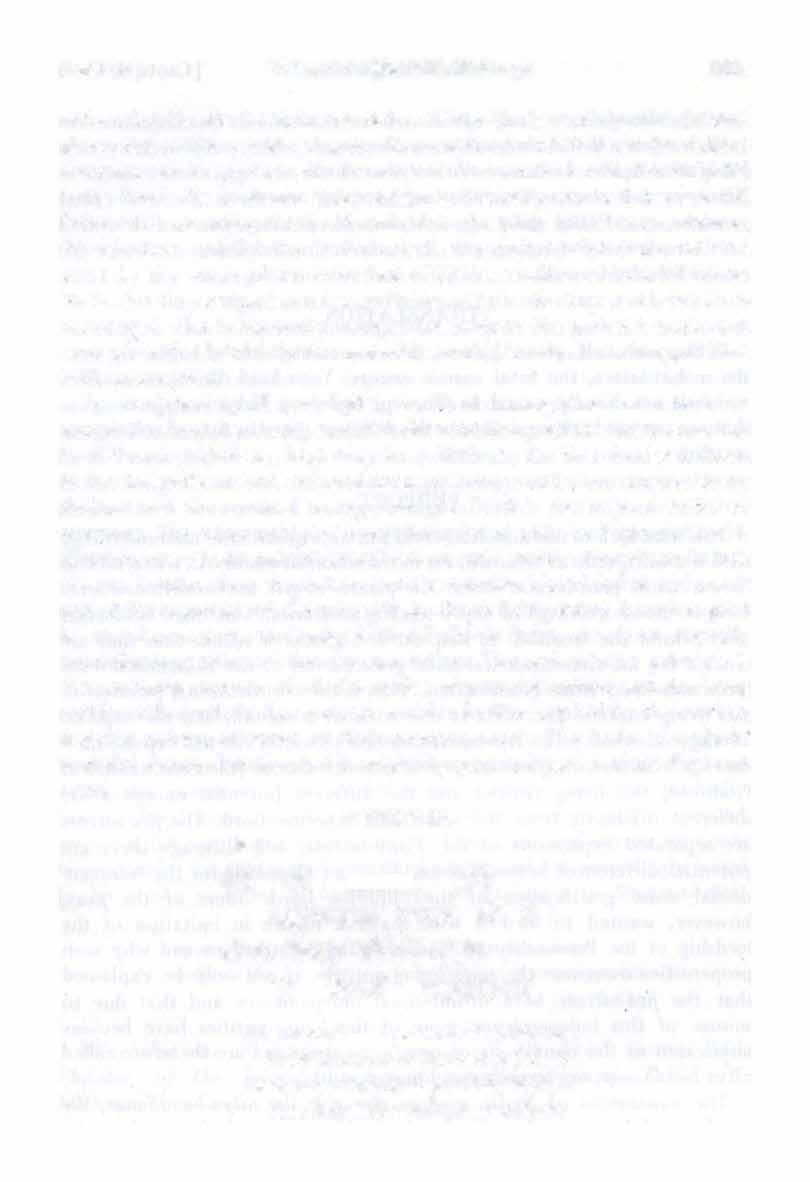
Text 51] Vidura 's Talks with Maitreya 217
TEXT 51 m ql( �<:�f!�·:u �;.r il'\(N¥41<:'4'{ �llt ft � I �;r:�: qft�ft: �� �Cf �'ij �{ltJIT1{_ tato vayarh mat-pramukhii yad-arthe babhuvimiitman karaviima kim te tvarh naft svacak§uft paridehi saktyii deva kriyiirthe yad-anugrahartiim
tata{t-therefore; vayam-all of us; mat-pramukhii�- coming from the total cosmos, the mahat-tattva; yat-a rthe-for the purpose of which; babhiivima-created; iitman-the self; karaviima-shall do; kim-what; tey our service; tvam-Yourself; na�-to us; sva c ak�u�-personal plan; paridehi-specifically grant us; saktyii-with potency to work; deva-0 Lord; kriyii rthe-for acting; yat - that which; anugrahiiriim-of those who are specifically favored.
TRANSLATION


0 Supreme Self, please give us, who are created in the beginning from the mahat-tattva, the total cosmic energy, Your kind directions on how we shall act. Kindly award us Your perfect knowledge and potency so that we can render You service in the different departments of subsequent creation.
PURPORT
The Lordcreatesthismaterial worldand impregnatesthe materialenergy with the living entities who will act in the material world. All these actions have a divine plan behind them. The plan is to give the conditioned souls who so desire a chance to enjoy sense gratification. But there is another plan behind the creation: to help the living entities realize that they are created for the transcendental sense gratification of the Lord and not for their individual sense gratification. This is the constitutional position of the living entities. The Lord is one without a second, and He expands Himself into many for His transcendental pleasure. All the expansionsthe V4ru-tattvas, the fiva-tattvas and the sakti-tattvas (the Personalities of Godhead, the living entities and the different potential energies)-are different offshoots from the same one Supreme Lord. The fiva-tattvas are separated expansions of the Vi�ru-tattvas, and although there are potential differences between them, they are all meant for the transcen· dental sense gratification of the Supreme Lord. Some of the jivas, however, wanted to lord it over material nature in imitation of the lordship of the Personality of Godhead. Regarding when and why such propensities overcame the pure living entities, it can only be explained that the fiva tattvas have infinitesimal independence and that due to misuse of this independence some of the living entities have become implicated in the conditions of cosmic creation and are therefore called nitya-bimdhanas , or eternally conditionedsouls.
The expansions of Vedic wisdom also give the nitya-bandhanas, the conditioned living entities, a chance to improve, and those who take
218 Srimad-Bhigavatam (Canto 3, Ch. 5
advantage of such transcendental knowledge gradually regain their lost consciousness of rendering transcendental loving.service to the Lord. The demigods are amongst the conditioned souls who have developed this pure consciousness of service to the Lord, but at the same time they continue to desire to lord it over the material energy. Such mixed consciousness puts a conditioned soul in the position of managing the affairs of this creation. The demigods are entrusted leaders of the conditioned souls. As some of the old prisoners in government jails are entrusted with some responsible work of prison management, so the demigods are improved conditioned souls acting as representatives of the Lord in the material creation. Such demigods are devotees of the Lord in the material world and are completely free from all material desire to lord it over the material energy. They havebecome pure devotees and have no desirebutto servethe Lord. Any living entity who desires a position in the material world may desiresointhe serviceof the Lord andmay seekpowerand intelligence from the Lord, as exemplified by the demigods in this particular verse. One cannot do anything unless he is enlightened and empowered by the Lord. The Lord says in Bhagavad-gitii (15.15), matta� smrtir jriiinam apohanarh ca. All recollections, knowledge, etc., as well as all forgetfulness, are engineered by the Lord, who is sitting within the heart of everyone. The intelligent man seeks the help of the Lord, and the Lord helps the sincere devotees engaged in His multifarious services.
The demigods are entrusted by the Lord to create different species of living entities according to their past deeds. They are herein asking the favor of the Lord for the intelligence and power to carry out their task. Similarly, any conditioned soul may also engage in the service of the Lord under the guidance of an expert spiritual master and thus gradually become freed from the entanglement of material existence. The spiritual master is the manifested representative of the Lord, and anyone who puts himselfunder the guidance of a spiritual master and acts accordingly is said to be acting in terms of buddhi-yoga, as explained in Bhagavad-gitii:
vyavasiiyatmikii buddhir ekena kurn-nandana
bahu-siikhii hy anantiis ca buddhayo 'vyavasiiyiniim (Bg. 2.41)
Thus end the Bhaktivedanta purports of the Third Canto, Fifth Chapter, of the Srlmad-Bhagavatam, entitled "Vidura 's Talks with Maitreya."

Text 51] Vidura's Talks with Maitreya 219
CHAPTER SIX
creationof the Universal Form TEXT

r�ir uviica
iti tiisiirh sva-saktinarh
satiniim asametya sa�
prasupta loka-tantrii[!iirh
nisiimya gatim isvara�
sri rsih uviica-the ��i Maitreya said; iti-thus; tiisiim-their; svasaktiniim-own potency; satiniim-so situated; asametya-without combination;sa�-He (the Lord); prasupta-suspended;loka-tantrii[!iim-in the universal creations;nisiimya-hearing;gatim-progress;isvara�-the Lord.


TRANSLATION
The \t!!i Maitreya said: The Lord thus heard about the suspension of the progressive creative functions of the universe due to the noncombination. of His potencies, such as the mahat-tattva.
PURPORT
There is nothing wanting in the creation of the Lord;all the potencies are there in a dormant state. But unless they are combined by the will of the Lord, nothing can progress. The suspended progressive work of creation can only be revived by the direction of the Lord. TEXT2
l csmq�cU..:t �mm��*h1'1iijfflf1jq(1if� �: 1 Pl�il¥04 ��:II�II
ifil� � �� ��'4JRfiJ1(isti�HI �;.ft��r.rt qui � II � II 221
kiila-sarhjiiiirh tadii devirh
bibhrac-chaktim urukrama� trayovirhsati tattviiniirh gar-am yugapad iivisat
kiila-sarhjiiiim- known as Kall; tadii-at that time; devim-the goddess; bibhrat-destructive; saktim-potency; urukrama� - the supreme powerful; trayovirhsati-twenty-three ; tattviiniim-of the elements; gar-am-all of them; yugapat- simultaneously ; avisat-entered.
TRANSLATION
The Supreme Powerful Lord then simultaneously entered into the twenty-three elements with the goddess Kali, His external energy, who aloneamalgamatesallthedifferentelements.
PURPORT
The ingredients of matter are counted as twenty-three: the total material energy, false ego, sound, touch, form, taste, smell, earth, water, fire, air, sky, eye, ear, nose, tongue, skin, hand, leg, evacuating organ, genitals, speech and mind. All are combined together by the influence of time and are again dissolved in the course of time. Time, therefore, is the energy of the Lord and acts in her own way by the direction of the Lord. This energy is called Kafi and is represented by the dark destructive goddess generally worshiped by persons influenced by the mode of darkness or ignorance in material existence. In the Vedic hymn this process is described as mula-prakrtir avikrtir mahadadyiib, prakrti-vikrtayarh saptasorasakas tu vikaro na prakrtir na vikrtib- puru�ab,. The energy which acts as material nature in a combination of twenty-three ingredients is not the final source of creation. The Lord enters into the elements and applies His energy, called Kali. In all other Vedic scriptures the same principle is accepted. In Brahma-sarhhita it is stated:
eko 'py asau racayiturh jagadar-{la-kotirh yac-chak tir asti jagadar-{la-caya yad-antab, ar-{lantarastha-paramar-u-cayantara-stharh govindam adi-puru�arh tam aharh bhajami (Bs. 5.35)
"I worship the primeval Lord, Govinda, who is the original Personality of Godhead. By His partial plenary expansion [Maha-Vi!)�;tu], He enters into material nature,and then into each and everyuniverse [as Garbhodakasayi

222 Srimad-Bh�gavatam
[Canto 3, Ch. 6
Vi�J;IU], and then [as K�irodakasayl Vi�J;Iu] into all the elements, including every atom of matter.Such manifestations of cosmic creation are innumerable, both in the universes and in the individual atoms." Similarly, this is confirmed in Bhagavad-gitii (Bg. 10.42):
athavii bahunaitena kim jniitena taviirjuna vi�tabhyiiham idam krtsnam ekiimsena sthito jagat.
"0 Arjuna, there is no necessity of your knowing about My innumerable energies, which act in various ways. I enter into the material creation by My partial plenary expansion [Paramatma, or the Supersoul] in all the universes and in all the elements thereof, and thus the work of creation goes on." The wonderful activities of material nature are due to Lord Kr�J;Ia, and thus He is the final cause or the ultimate cause of all causes.
TEXT3
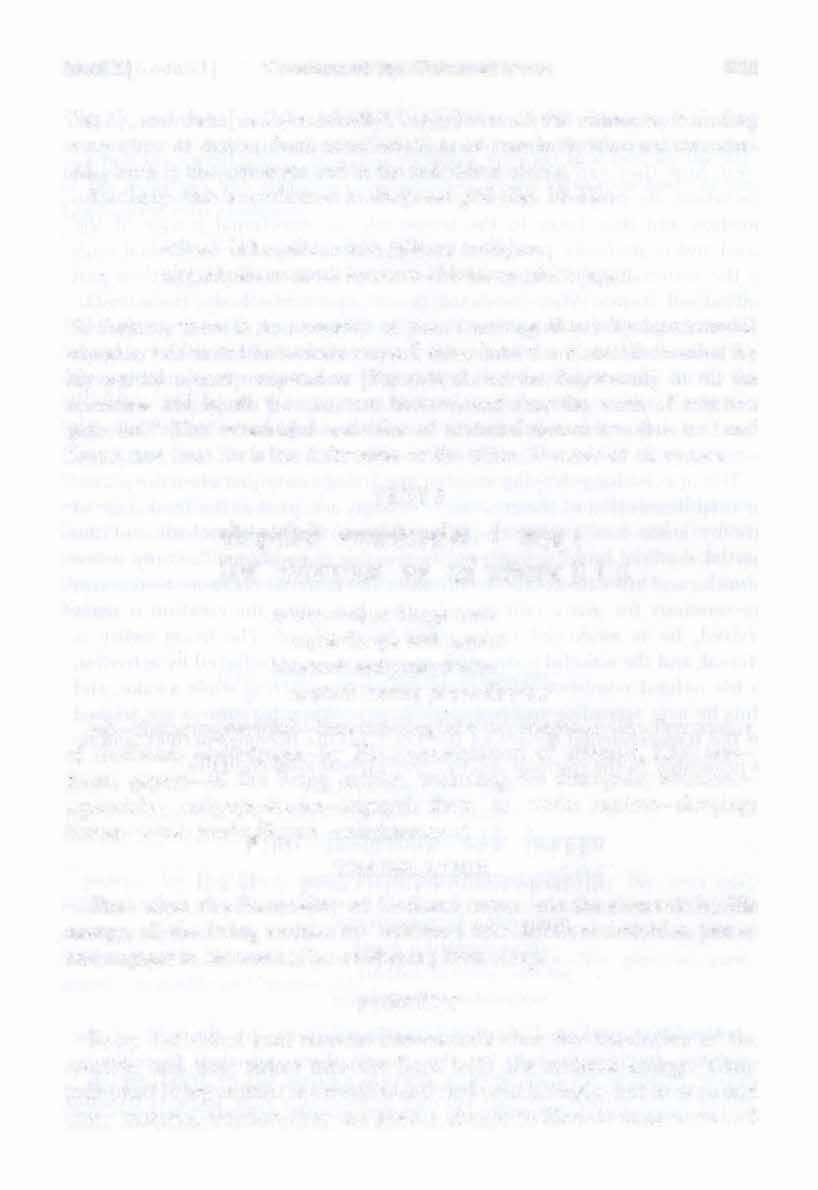
fWii ��Jffit uS d Sl(t�q'{ II � II
so 'nupravi�to bhagaviims ce�tiiriiperta tam gartam bhinnam samyojayiimiisa suptam karma prabodhayan
sa�-that; anuprav�ta�-thusenteringlateron; bhagaviin-the Personality of Godhead; ce§tiiri.iper-a-by His representation of attempt, Kafi; tamthem; gar-am-all the living entities, including the demigods; bhinnamseparately; samyojayiimiisa-engaged them to work; suptam-sleeping; karma-work; prabodhayan- enlightenment.
TRANSLATION
Thus when the Personality of Godhead enters into the elements by His .energy, all the living entities are enlivened into different activities, just as one engages in his work after awakening from sleep.
PURPORT
Every individual soul remains unconscious after the dissolution of the creation and thus enters into the Lord with His material energy. These individualliving entities areconditioned soulseverlastingly,but in each and every material creation they are given a chance to liberate themselves and
Text3) Creation of the Universal Form 223
��!l�ctul � ttUf1{
ms�m
I
become free souls. They are all given a chance to take advantage of the Vedic wisdom and find out what is their relationship with the Supreme Lord, how they can be liberated, and what the ultimate profit is in such liberation. By properly studying the Vedas one becomes conscious of his position and thus takes to the transcendental devotional service of the Lord and is gradually promoted to the spiritual sky. The individual souls in the material world engage in different activities according to their past unfinished desires. After the dissolution of a particular body, the individual soul forgets everything, but the all-merciful Lord, who is situated in everyone's heart as the witness, the Supersoul, awakens him and reminds him of his past desires, and thus he begins to act accordingly in his next life. This unseen guidance is described as fate, and a sensible man can understand that this continues his material bondage in the three modes of nature.
The unconscious sleeping stage of the living entity just after the partial or total dissolution of the creation is wrongly accepted as the final stage of life by some less intelligent philosophers. After the dissolution of the partial material body, a living entity remains unconscious for only a few months, and after the total dissolution of the material creation, he remains unconscious for many millions of years. But when the creation is again revived, he is awakened to his work by the Lord. The living entity is eternal, and the wakeful state ofhis consciousness,manifested byactivities, is his natural condition of life. He cannot stop acting while awake, and thus he acts according to his diverse desires. When his desires are trained in the transcendental service of the Lord, his life becomes perfect, and he is promoted to the spiritual sky to enjoy eternal awakened life.
TEXT4
prabuddha-karmii daivena trayovirhsatiko ga[la�
prerito 'janayat sviibhir miitrii.bhir adhipiiru�am
prabuddha-awakened; karma-activities; daivena-by the will of the Supreme; trayuvirhsatika�-by the twenty-three principal ingredients; garw(t-combinalion ;prerita(t-induced by; ajanayat- manifested; sviibhi�
by IIis personal; miitriibh*-by plenary expansion; adhipiiru�am-the gigan l i e universal form (vi.�va-riipa).

224 Srimad-Bhagavatam [Canto 3, Ch. 6
�'it �� � 'fUr: I itftij)�;{if€(Ctl�� II \? II
When the twenty-three principal elements were set in action by the will of the Supreme, the gigantic universal form, or the visva-n1pa body of the Lord, came into existence.
PURPORT
The virata-riipa or visva-riipa, the gigantic universal form of the Lord, which is very much appreciated by the impersonalist, is not an eternal form of the Lord. It is manifested by the supreme will of the Lord after the ingredients of material creation. Lord Kr�J)a exhibited this virata or visva-riipa to Arjuna just to convince the impersonalists that He is the original Personality of Godhead. Kr�J)a exhibited the virata-riipa; it is not that Kr�J)a was exhibited by the virata-riipa. The virata-riipa is not, therefore, an eternal form of the Lord exhibited in the spiritual sky; it is a material manifestation of the Lord. The arca-vigraha, or the worshipable Deity in the temple, is a similar manifestation of the Lord for the neophytes. But in spite of their material touch, such forms of the Lord as the viriita and area are all nondifferent from His eternal form as Lord

TEXTS
� mr<n(<lf4cfl41'51�1 A'l�··uu I

����WMlEfiiiRr.:«n II '-\II
parera visatii svasmin miitraya viSva-srg-gara/.t cuk§obhanyonyam �iidya yasmillokas caracarii/.t
parera-by the Lord; visatii-thus entering; svasmin-by His own self; matraya-by a plenary portion; visva-srk-the elements of universal creation; gara/.t-all; cuk, w bha-transformed; anyonyam-one another; asadya-having obtained; yasmin-in which; lokafr-the planets; cariiacariil).-movable and immovable.
TRANSLATION
As the Lord, in His plenary portion, entered into the elements of the universal creation, they transformed into the gigantic form in which all the planetary systems and all movable and immovable creations rest.
Text 5] Creation of the Universal Form 225
TRANSLATION
The elements of cosmic creation are all matter and have no potency to increase in volume unless entered into by the Lord in His plenary portion. This means that matter does not increase or decrease unless it is spiritually touched. Matter is a product of spirit and increases only by the touch of spirit. The entire cosmic manifestation has not assumed its gigantic form by itself, as wrongly calculated by less intelligent persons. As long as spirit is within matter, matter can increase as needed; but without the spirit, matter stops increasing. For example, as long as there is spiritual consciousness within the material body of a living entity, the body increases to the required size, but a dead material body, which has no spiritual consciousness, stops increasing. In Bhagavad-gitii (Chapter Two) importance is given to the spiritual consciousness, not the body. The entire cosmic body increased by the same process thatwe experience in our small bodies. One should not, however, foolishly think that the individual infinitesimal soul is the cause of the gigantic manifestation of the universal form. The universal form is called the viriita-rupa because the Supreme Lord is within it in His plenary portion.
TEXT6

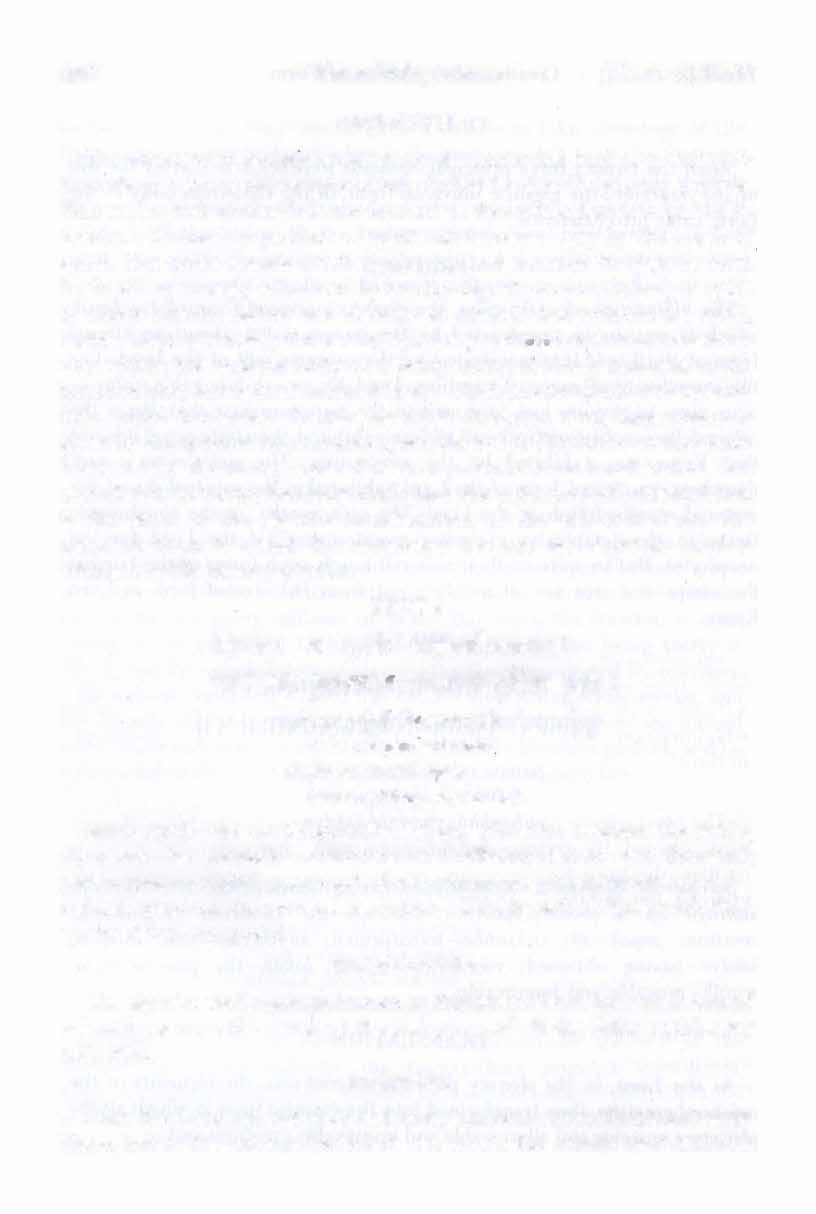
hirar-maya/:1. sw puru�a/:1. sahasra parivatsariin ar,Pa-kosa uviisiipsu
sarva-sattvopabphhita/:1.
hirar-maya/:1.-the Garbhodakasayi Vi�!)u, who also assumes the viriitariipa; sai).-He; puru�a/:1.-incarnation of Godhead; sahasra-one thousand; parivatsariin- celestial years; iir-�a-kosa-within the global universe; uviisaresided; apsu-on the water; sarva-sattva-all living entities lying with Him; upabphhita[l-so spread.
TRANSLATION
The gigantic virata-purullJa known as HiraQmaya lived for one thousand celestial years on the water of the universe, and all the living entities lay with Him.
PURPORT
After the Lord entered each and every universe as the Garbhodakasay1 Vi�!)U, half of the universe was filled with water. The cosmic manifestation
226 Srimad-Bhagavatam [ Canto 3, Ch. 6
PURPORT
ml44�t � �: e((ilqf««"Co'{l auo�i\� '3'E4R11"U e=fu'fi(tqtjf((l: II �II
of the planetary systems, outer space, etc., which are visible to us,is only one half of the complete universe. Before the manifestation takes place and afterthe entrance of Vi!!I).U within the universe,there is a period ofone thousand celestial years. All the living entities injected within the womb of the mahat-tattva are divided in all universes with the incarnation of Garbhodakasayi Vi�l).u, and all of them lie down with the Lord until Brahma is born. Brahma is the first living being within the universe, and from him all other demigods and living creatures are born. Manu is the origina:l father of mankind, and therefore, in Sanskrit, mankind is called miinu�ya. Humanity in different bodily qualities is distributed throughout the various planetary systems.
TEXT7

« �ft��tTllt �!!4��Rh+tl'{ I
�W�SS�IWi�Efi\:tl �� II \9 II
sa vai visva-srjiim garbho deva-karmiitma-saktiman vibabhiijiitmanii "tmiinam ekadhii dasadhii tridhii
salt -that; vai-certainly; visva-srjiim-of the gigantic viriita form; garbhalt - total energy; deva-living energy; karma-ac tivity of life; iitmaself; saktiman-full with potencies; vibabhaja-divided; atmama- by Himself; atmanam-Himself; e1wdhii-in oneness; dasadhii-in ten; tridha-and in three.
TRANSLATION
The total energy of the mahat-tattva, in the form of the gigantic viratariipa, divided Himself by Himself into the consciousness of the living entities, the life of activity, and self-identification, which are subdivided into one, ten and three respectively.
PURPORT
Consciousness is the sign of the living entity or the soul. 'J,'he existence of the soul is manifest in the forin of consciousness, called jfiiina-sakti. The total consciousness is that of.the gigantic viriita-riipa, and the same consciousness is exhibited in individual persons. The activity of consciousness is performed through the air of life which is of ten divisions. The airs of life are called priirw, apiina, udiina, vyiina and samiina and are also differently qualified as niiga, kurma, krkara, devadatta and dhanafijaya.
Text7] Creation of the Universal Form 227
The consciousness of the soul becomes polluted by the material atmosphere, and thus various activities are exhibited in the false ego of bodily identification. These various activities are described in Bhagavad-gitii (Bg. 2.41) as bahu-sakhii hy anantiis ca buddhayo 'vyavasiiyiniim. The conditioned soul is bewildered into various activities for want of pure consciousness. In pure consciousness the activity is one. The consciousness of the individual soul becomes one with the supreme consciousness when there is complete synthesis between the two.

The monist believes that there is only one consciousness, whereas the siitvatas, or the devotees, believe that although there is undoubtedly one consciousness, they are one because there is agreement. The individual consciousness is advised to dovetail with the supreme consciousness, as instructed by the Lord in Bhagavad-gitii (Bg. 18.66): sarva-dharmiin parityajya miim ekam sara[lam vraja. The individual consciousness (Arjuna) is advised to dovetail with the supreme consciousness and thus maintain his conscious purity. It is foolish to try to stop the activities of consciousness, but they can be purified when they are dovetailed with the Supreme. This consciousness is divided into three modes of self-identification according to the proportion of purity: iidhyiitmic or self-identification with the body and mind, iidhibhautic or self-identification with the material products, and adhidaivic or self-identification as a servant of the Lord. Of the three, iidhidaivic self-identification is the beginning of purity of consciousness in pursuance of the desire of the Lord.
TEXT 8
� U��('(*41wtliil€¥if�t: q(+U€¥iwt: I
A"4tliRI� II � II
e�a hy ase�a-sattviiniim iitmiirnsa� paramiitmana�
iidyo 'vatiiro yatriisau
bhuta-griimo vibhiivyate
e�ah- this; hi-certainly; ase�a- unlimited; sattviiniim-living entities; iit ma-Self; amsaft- part; paramiitmana�-of the Supersoul; iidya�-the first; avatiira�-incarnation; yatra-whereupon; asau-all those; bhiitagriima�-the aggregate creations; vibhiivyate-flourish.
TRANSLATION
The gigantic universal form of the Supreme Lord is the first incarnation and plenary portion of the Supersoul. He is the Self of an unlimited
228 Srimad-Bhagavatam [Canto 3, Ch. 6
��� �
number of living entities, and in Him rests the aggregate creation, which thus flourishes.
PURPORT
The Supreme Lord expands Himself in two ways, by personal plenary expansions and separated minute expansions. The personal plenary expansions are Vi�l)u-tattvas, and the separated expansions are living entities. Since the living entities are very small, they are sometimes described as the marginal energy of the Lord. But the mystic yogis· consider the living entities and the Supersoul, Paramatma, to be one and the same. It is, however, a minor point of controversy; after all, everything created rests on the gigantic viriita or universal form of the Lord.
TEXT 9
siidhyiitma"(t siidhidaivas ca siidhibhuta iti tridhii viriit priir-o dasa-vidha ekadhii hrdayena ca
sa-iidhyiitma"(t-the body and mind with all the senses; sa-iidhidaivaftand the controlling demigods of the senses; sa-iidhibhuta�- the present objectives; iti- thus; tridhii- three; viriit- gigantic; priir-a�-moving force; dasa-vidha"(t-ten kinds; ekadhii-one only; hrdayena- living energy; caalso.
TRANSLATION
The gigantic universal form is represented bythree, ten and one in the sensethatHe is the body and themind and senses, He isthe dynamic force for all movements by ten kinds of life energy, and He is the one heart where life energy is generated.
PURPORT
In Bhagavad-gitii (7.4-5) it is stated that the eight elements earth, water, fire, air, sky, mind, intelligence and false ego are aU products of the Lord's inferior energy, whereas the living entities, who are seen to utilize the inferior energy, originally belong to the superior energy, the internal
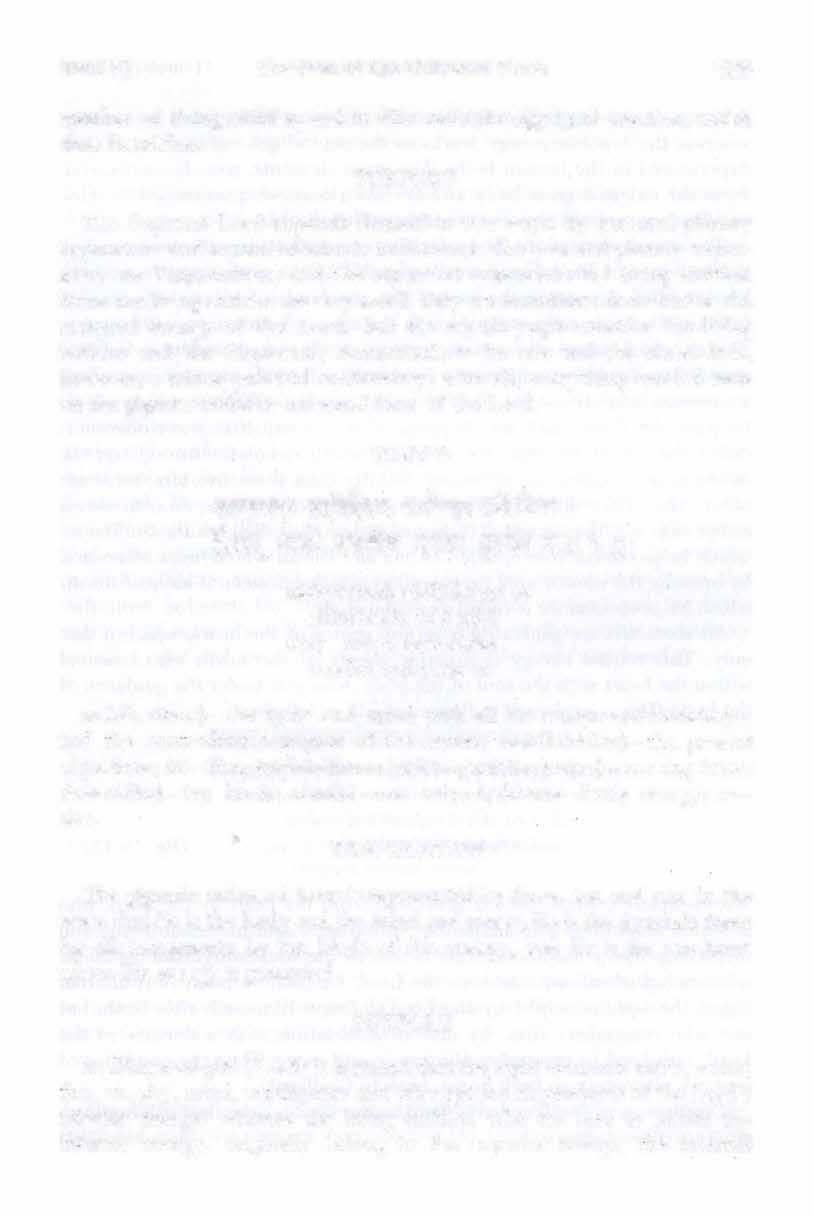
Text 9] Creation of the Universal Form 229
f{m._
(119041�: ���� ��h I
!ttult � � �� II � II
potency of the Lord. The eight inferior energies work grossly and subtly, whereas the superior energy works as the central generating force. This is experienced in the human body. The gross elements, namely, earth, etc., form the external gross body and are like a coat, whereas the subtle mind and false ego act like the inner clothing of the body.
The movements of the body are first generated from the heart, and all the activities of the body are made possible by the senses, powered by the ten kinds of air within the body. The ten kinds of air are described as follows: The main air passing through the nose in breathing is called priirta. The air which passes through the rectum as evacuated bodily air is called apiina. The air which adjusts the foodstuff within the stomach and which sometimes sounds as belching is called samiina. The air which passes through the throat and the stoppage of which constitutes suffocation is called the udiina air. And the total air which circulates throughout the entire body is called the vyiina air. Subtler than these five airs, there are others also. That which facilitates the opening of the eyes, mouth, etc., is called niiga air. The air which increases appetite is called krkara air. The air which helps contraction is called kurma air. The air which helps relaxation by opening the mouth wide (in yawning) is called devadatta air, and the air which helps sustenance is called dhanan,jaya air.
All these airs are generated from the center of the heart, which is one only. This central energy is superior energy of the Lord, who is seated within the heart with the soul of the body, who acts under the guidance of the Lord. This is explained in Bhagavad-gitii as follows:
sarvasya ciiharh hrdi sannivi�to matta� smrtir jfiiinam apohanarh ca vedais ca sarvair aham eva vedyo

vediinta-krd veda-vid eva ciiham (Bg. 15.15)
The complete central force is generated from the heart by the Lord, who is seated there and who helps the conditioned soul in remembering and forgetting. The conditioned state is due to the soul's forgetfulness of his relationship of subordination to the Lord. One who wants to continue to forget the Lord is helped by the Lord to forget Him birth after birth, but one who remembers Him, by dint of association with a devotee of the Lord, is helped to remember Him more and more. Thus the conditioned soul can ultimately go back home, back to Godhead.
Thisprocessof tramocendental helpbythe Lord is described in Bhagavadgitii (10.10) as follows:
230 Srimad-Bhagavatam [Canto 3, Ch. 6
Creation of the Universal Form
tesam satata-yuktanam bhajatam priti-piirvakam
dadami buddhi-yogam tam yena mam upayanti te
The buddhi-yoga process of self-realization with intelligence transcendental to the mind (devotional service) can alone elevate one from the conditioned state of material entanglement in the cosmic construction. The conditioned state. of the living entity is like that of a person who is within the depths of a huge mechanical arrangement. The mental speculators can reach the point of buddhi-yoga after many, many lifetimes of speculation, but the intelligent person who begins from the platform of intelligence above the mind makes rapid progress in self-realization. Because the buddhi-yoga process entails no fear of deterioration or retrogression at any time, it is the guaranteed path to self-realization, as confirmed in Bhagavad-gitii (2.40). The mental speculators cannot understand that the two birds ( Sve. Up.) sitting in one tree are the soul and the Supersoul. The individual. soul eats the fruit of the tree, while the other bird does not eat the fruit but only observes the activities of the eating bird. The .witness bird helps the bird which eats the fruit to perform fruitful activities without attachment. One who cannot understand this difference between the soul and the Supersoul, or God and the living entities, is certainly still in the entanglement of the cosmic machinery and thus -must still await the time when he will be free from bondage.
TEXT 10



t4o�it(JQ�\�wt
smaran vi.Sva-srjam iSo
vijniipitam adhok�aja�
viriijam atapat svena
tejasai�am vivrttaye
smaran-remembering; vi.Sva-srjiim-of the demigods entrusted with the task of cosmic construction; "i.?a�-the Supreme Lord; vijnapitam-as He was prayed for; adh ok§aja�-the Transcendence; viriijam-the gigantic universalform; atapat-considered thus; svena-by His own; tejasii-energy; e�iim-for them; vivrttaye-understanding.
TRANSLATION
The Supreme Lord is the Supersoul of all the demigods who are entrusted with the task of constructing the cosmic manifestation. Being
Text 10]
231
�ft1fJ�I&ftVlf<t(lljqdii�1P: I
� � u
�oil
thus prayed to [by the demigods], He thought to Himself and thus manifestedthegiganticformfor theirunderstanding.
PURPORT
The impersonalists are captivated by the gigantic universal form of the Supreme. They think that the control behind this gigantic manifestation is imagination. Intelligent persons, however, can estimate the value of the cause by observing the wonders of the effects. For example, the individual human body does not develop from the womb of the mother independently but because the living entity, the soul, is within the'body. Without thelivingentity, a materialbody cannot automatically take shape or develop. When any material object displays development, it must be understood that there is a spiritual soul within the manifestation. The gigantic universe has developed gradually, just as the body of a child develops. The conception that the Transcendence enters within the universe is, therefore, logical. As the materialists cannot find the soul and the Supersoulwithin the heart, similarly, for want of sufficient knowledge, they cannot see that the Supreme Soul is the cause of the universe. The Lord is therefore described in the Vedic language as aviiri-m.rllwsa-gocamfl, beyond the conception of words and minds.
Due to a poor fund of knowledge, the mental speculators try to bring the Supreme within the purview of words and minds, but the Lord refuses to be so intelligible; the speculator has no adequate words or mind to gauge the infinity of the Lord. The Lord is called adhok�aja, or the person who is beyond perception by the blunt, limited potency of our senses. One cannot perceive the transcendental name or form of the Lord by mental speculation. The mundane Ph.D.'s are completely unable to speculate on the Supreme with their limited senses. Such attempts by the puffed up Ph.D.'s are compared to the philosophy of the frog in the well. A frog in a well was informed of the gigantic Pacific Ocean, and he began to puff himself up in order to understand or measure the length and breadth of the Pacific Ocean. Ultimately the frog burst and died. The title Ph.D. can also be interpreted as Plough Department, a title meant for the tillers in the paddy field. The attempt of the tillers in the paddy field to understand the cosmic manifestation and the cause behind such wonderful work can be compared to the endeavor of the frog in the well to calculate the measurementof the Pacific Ocean.
The Lord can reveal Himself only to a person who is submissive and who engages in His transcendentalloving service. The demigods controlling the elements and ingredients of universal affairs prayed to the Lord for

232 Srimad-Bhagavatam [Canto 3, Ch. 6
guidance, and thus He manifested His gigantic form, as He did at the request of Arjuna.
TEXT 11
9N ij4Aifild84A �\:ll'4dwtlr.. ( I
f.t(flltl;:a�lidmfir1t �: IT! "��"
atha tasyiibhitaptasya katidhiiyataniini ha nirabhidyan.ta deviiniirh tiini me gadata� srr-u
atka-therefore; tasya-His;abhitaptasya- interms of His contemplation; katidhii-how many; iiyataniini-embodiments; ha-there were; nirabhidyanta-by separated parts; deviiniim-of the demigods; tiini-all those; me gadata�- described by me; srr-u -just hear.
TRANSLATION
Maitreya said: You may now hear from me how the Supreme Lord separated Himself into the diverse forms of the demigods after the manifestation of the gigantic universal form.
PURPORT
The demigods are separated parts and parcels of the Supreme Lord, as are all other living entities. The only difference between the demigods and the ordinary living entities is that when the living entities are rich in pious acts of devotional service to the Lord, and when their desire to lord it over material energy has vanished, they are promoted to the posts of demigods, who are entrusted by the Lord to execute themanagement of the universal affairs.
TEXT 12
d4Aiffcd�f.mWil4NiilsA�I�qq;( I
V'n�tiR� � srfrnM11��11
tasyiignir iisyarh nirbhinnarh
loka-piilo 'viSat padam
viicii sviirhsena vaktavyarh
yayiisau pratipadyate
tasya- His; agni�-fire; iisyam-mouth; nirbhinnam-thus separated; loka-piila� -the directors of material affairs; avisat-en tered ; padam-re-

Text 12] Creation of the Universal Form 233
spective positions; vaca-by words; sva-amsena-by one's own part; vaktavyam-speeches; yaya-by which;asau-they; pratipadyate-express.
TRANSLATION
Agni or heat separated from His mouth, and all the directors of material affairs entered into it in their respective positions. By that energy the living entity expresses himself in words.
PURPORT
The mouth of the gigantic universal form of the Lord is the source of the speaking power. The director of the fire element is the controlling deity or the adhidaiva. The speeches delivered are adhyiitma, or bodily functions, and the subject matter of the speeches is material productions, or the iidhibhuta principle.
TEXT 13 �

nirbhinnam talu varu!lo loka-palo'visadd hare� jihvayamsena ca rasam yayasau pratipadyate
nirbhinnam-separated; talu-palate; varu!la�-the deity controlling air; loka-pala�-director of the planets; avisat-entered; hare�-of the Lord; jihvayii amsena-with the part of the tongue; ca-also; rasam-tastes; yayiiby which; asau-the living entity; pratipadyate-expresses.

TRANSLATION
When the patate of the gigantic form was separately manifested, Varul}a, the director of air in the planetary systems, entered· therein, and thus the living entity has the facility to taste everything with his tongue.
TEXT 14

234 Srimad-Bhigavatarn [Canto 3, Ch. 6
CRUft \'S)Mii\Sf4ij((: I � � � 11frnm ������
�
�3IPr.ftwmftqil(IRij6f� I m�•d� � srfdqRl.f(l)�11�v11
Creation of the Universal Form
nirbhinne asvinau niise
vifi[Wr iivisatiirh padam
ghriirteniirhsena gandhasya pratipattir yato bhavet
nirbhinne-thus being separated; asvinau-the dual Asvin1s; niise-of the two nostrils; vi§[tO[l-of the Lord; iivisatiim-entering; padam-post; ghriir-ena arhse�a-by partially smelling; gandhasya-aroma; pratipattiflexperience; yatab--whereupon; bhavet-becomes.
TRANSLATION
When the Lord's two nostrils separately manifested, the dual ASvinikumaras entered them in their proper positions, and because of this the living entities can smell the aromas of everything.
TEXT 15
nirbhinne ak�irti tva�tii
loka-piilo' visad vibhobcak�u�iirhsena riipiirtiirh pratipattir yato bhavet
nirbhinne-thus being separated; ak§ipi-the eyes; tva�tii-the sun; loka-piila�-director of light; avisat-entered; vibho[l-of the great; cak§U§iiarhsena- by the part of the eyesight; riipiirtiim-of the forms; pratipattiflexperience; yatab--by which; bhavet-becomes.
TRANSLATION
Thereafter, the two eyes of the gigantic form of the Lord separately manifested. The sun, the director of light, entered them with the partial representation of eyesight, and thus the living entities can have vision of forms.
TEXT 16

Text 16 J
235
��mte'"NNIJtS,_ijfl'll:l
q'tf�tt � slfaq�4at¥1�II��II
������� sn�ttf�tt m� � SIRiQQ�lit'\II
Srimad-Bhagavatam
nirbhinniiny asya carmiirti loka-piilo' nilo' visat priirteniirhsena sarhsparsarh yeniisau pratipadyate
nirbhinniini-being separated; asya- of the gigantic form;carmiirt i- skin; loka-piila�-the director; anila�-air; avisat-entered; prii[tena arhsenathe part of the breathing; sarhsparsam-touch; yena-by which; asau-the living entity; pratipadyate-can experience.

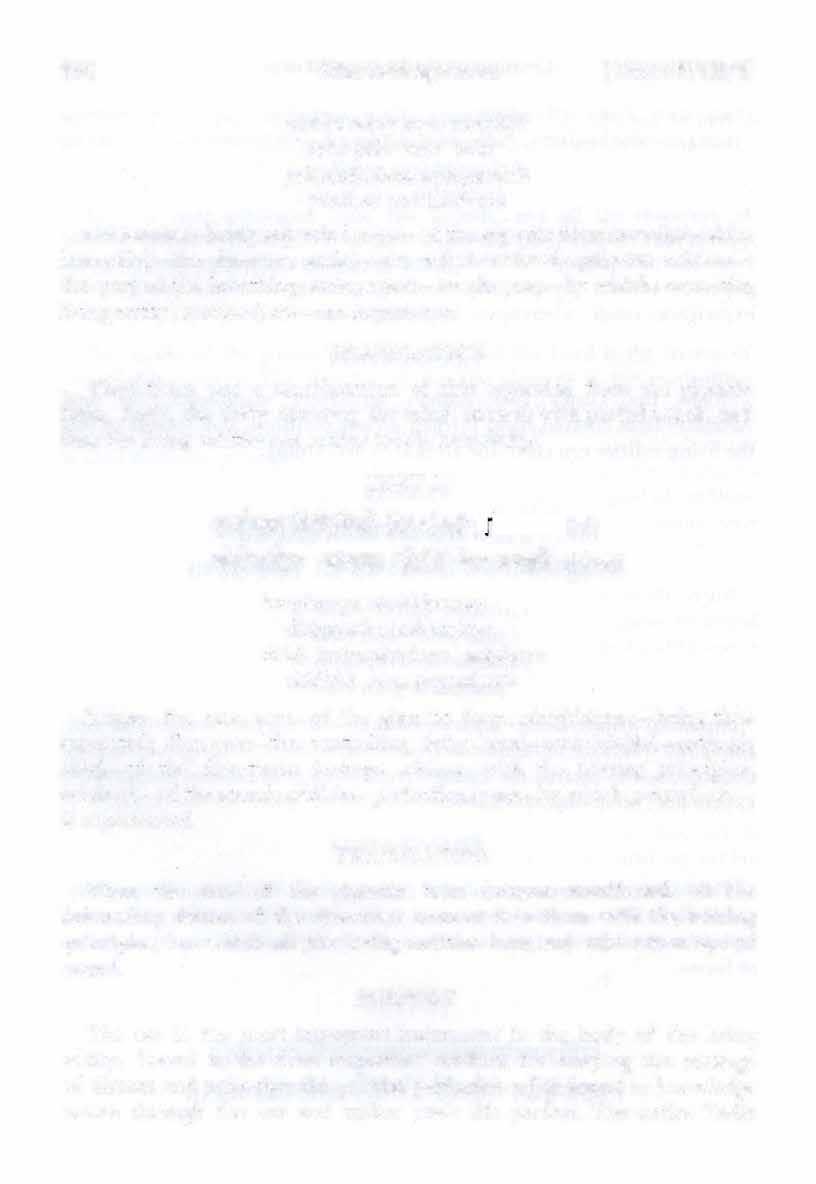
TRANSLATION
When there was a manif estation of skin separated from the gigantic form, Anila, the deity directing the mind, entered with partial touch, and thus the living entities can realize tactile knowledge.
TEXT
karrtiivasya vinirbhinnau dhi�[tyarh svarh vivisur disa� srotrertiirhsena sabdasya siddhirh yena prapadyate
kar!lau- the ears; asya-of the gigantic form; vinirbhinnau-being thus separated; dhi�rtyam-the controlling deity; svam-own; vivisu�- entered; disa� - of the directions; srotrerta arhsena- with the hearing principles; sabdasya-of the sou nd ; siddhim-perfection; yena-by which;prapadyateis experienced.

TRANSLATION
When the ears of the gigantic form became manifested, all the controlling deities of the directions entered into them with the hearing principles, by which all the living entities hear and take advantage of sound.
PURPORT
The ear is the most important instrument in the body of the living entity. Sound is the most important medium for carrying the message of distant and unknown things. The perfection of all sound or knowledge enters through the ear and makes one's life perfect. The entire Vedic
236
[ Canto 3, Ch. 6
17 ��Fl�t�i w�� 1 it�oli�wt �� f«ft iR � 11�\911
system of knowledge is received by aural reception only, and thus sound is the mostimportant source ofknowledge.
TEXT 18
fil'ql(� ft�A'�: ,.
Qwr �: 'Pi �� SlfaqQ�IIt(;II
tvacam asya vinirbhinniirh
vivisur dhi§rtyam O§adhi{t arhsena romabhi(l kartt;lurh
yair asau pratipadyate
tvacam-skin;asya-of the gigantic form; vinirbhinniim-being separately manifested; vivisu�-entered; dhi§r-yam-the controlling deity; O§adhiftsensations; arhsena-with parts; romabhi�-through thehairs on the body; kartt;liim-itching; yai�-by which; asau-the living entity; pratipadyateexperiences.
TRANSLATION
When there was a separate manifestation of skin, the controlling deities of sensations and its differentparts enteredinto it, and thus the livingentitiesfeelitchingandhappinessduetotouch.
PURPORT
For sense perception there are two principal items, touch and itching, and both of them are controlled by the skin and hairs on the body. According to Sri Visvanatha Cakravartl, the controlling deity of touch is the air passing within the body, and the controlling deity of the hairs on the body is O�adhya. For the skin the object of perception is touch, andfor thehairs on the body the object of perceptionisitching.
TEXT 19

11(�Af.lf«�•aqaA� 1
�efijwt �WIR:UCUI'I� �WIIt�II
metjhrarh tasya vinirbhinnarh
sva-dhi§rtyarh ka
upiivisat retasiirhsena yenasav
iinandarh pratipadyate
Text 19] CreationoftheUniversalForm 237
mephram-genitals; tasya- of the gigantic form; vinirbhinnam-being separated; sva-dhi§r-yam-own position; kaft - Brahma , the original living creature; upavisat-entered; retasa arhsena-with the part of the semina; yena-by which; asau-the living entity; iinandam-sex pleasure; pratipadyate-experiences .

TRANSLATION
When the genitals of the gigantic form separately bec;Ime manifest, then Prajapati, the original living creature, entered into them with his partial semina, and thus the living entities can enjoy sex pleasure.
TEXT 20
g(!m
gudarh purhso vinirbhinnarh mitro lokesa avisat payunarhsena yenasau visargarh pratipadyate
gudam-evacua t ing ou tlet; purhsafl-of the gigantic form; vinirbhinnambeing separately manifested; mitrafl- the sun-god; lokesaft- the director named Mitra; aviSat- entered; payuna arhsena-with the partial evacuation process; yena-by which; asau-the living entity; visargam-evacuation; pratipadyate-performs.
TRANSLATION
The evacuating channel separately became manifest, and the director named Mitra entered into it with partial organs of evacuation. Thus the living entities are able to pass stool and urine.
TEXT 21

((ijM$ �:\.4�fa<&f4VC( I
•n�i�;w � qqJ !f' smi n�tll
hastav asya vinirbhinnav indrafl svar-patir iivisat vartayamsena purU§O yaya vrttirh prapadyate
hastau-hands;asya-of the gigantic form;vinirbhinnau-being separately manifested; indraft- the King of heaven; svaft-patifl-the ruler of heavenly
238 Srimad-Bhagaviltam [Canto 3, Ch. 6
�"flr.iTtil. snf�hl(( ' qaa-sfi;w � ft� srhw II�oil
planets;avisat-entered into it; vartaya aritsena-with partial mercantile principles; purn§a�-the living entity; yayii-by which; vrttim- b usiness of livelihood; prapadyate-transacts.
TRANSLATION
Thereafter, when the hands of the gigantic form separately became manifested, Indra, the ruler of the heavenly planets, entered into them, and thus the living entity is able to transact business for his livelihood.
TEXT 22

qtc(fC1(.4��
� � � � � JlqqW ����II
piidiiv asya vinirbhinnau lokeso vi�rtur iivisat
gatyii sviiritsena puro�o yayii priipyarit prapadyate
piidau-the legs; asya-of the gigantic form; vinirbhinnau-being manifested separately; lokesal;t vi�rtu/:t-the demigod Vi�l)u (not the Personality of Godhead); iivisat- entered; gatyii- by the power of movement; svaarhsena-with his own parts; puru�al;t-living entity; yayii- by which; priipyam-destination; prapadyate-reaches.
TRANSLATION
Thereafter the legs of the gigantic form separatelybecame manifest, and the demigod named Vi��u [not the Personality of Godhead] entered with partial movement. This helps the living entity to move to his destination.
TEXT
buddhirh ciisya vinirbhinniirh
viigiSo dhi�pyam aviSat
bodheniirhsena boddhavyam
pratipattir yato bhavet
buddhim-intelligence; ca- also ;asya-of the gigantic form; vinirbhinniim -being separately manifested; viigiSal;t-Brahma, lord of the Vedas; dh4rtyam-the controlling power; iivisat-entered in; bodhena arhsena-
Text 23] Creation of the Universal Form 239
N'�<•f4�nt 1
�ttl•ftitN�'""'\ld\I
23 ��
� itl(otll{_Jt�qR\ttJl�11��11.
with his part of intelligence; boddhavyam-the matter of understanding; pratipattifl-understood;yata�-by which; bhavet-so becomes.
TRANSLATION
When the intelligence of the gigantic form separately became manifest, Brahma, the lord of the Vedas, entered into it with the partial power of understanding, and thus an object of understanding is experienced by the living entities.
TEXT 24

hrdayarh ciisya nirbhinnarh candramii dhi�r-yam iivisat manasiirhsena yeniisau. vikriyiirh pratipadyate
hrdayam-heart; ca-also; asya-of the gigantic form; nirbhinnam-being manifested separately; candramii-the moon demigod; dhi�r-yam-with controlling power;iivisat-entered into;manasii arhsena-partly with mental activity; yena-by which; asau-the living entity; vikriyiim-resolution; pratipadyate-transacts. ·
TRANSLATION
After that, the heart of the gigantic form separately manifested itself, and into it entered the moon demigod with partial mental activity. Thus the living entity can conduct his mental speculations.
TEXT 25
iitmiinam ciisya nirbhinnam abhimiino 'visat padam karmar-iirh.Sena yeniisau
kartavyarhpratipadyate
iitmiinam-false ego; ca-also; asya-of the gigantic form; nirbhinnambeing separately manifested; abhimiina�-false identification; avisat-entered;padam-in position; karmar-ii-activities;arhsena-by the part;yena-
240 Srimad-Bhagavatam [Canto 3, Ch. 6
w:f:q�Mnf�1�O�+tlfcf� I +t�i�Wf �1m fer� �ij ������
3lm�rwf��r.ilsftl�•�G:'( 1 �� � � scf6qta{t ������
by which; asau-the living entity; kartavyam-objective activities; pratipadyate-takes in.
TRANSLATION
Thereafter the materialistic ego of the gigantic form separately mani· fested itself, and into it entered Rudra, the controller of false ego, with his own partial activities, by which the living entity transacts his objective actions.
PURPORT
The false ego of materialistic !dentity is controlled by the demigod Rudra, an incarnation of Lord Siva. Rudra is the incarnation of the Supreme Lord who controls the mode of ignorance within material nature. The activities of the false ego are based on the objective of the body and mind. Most persons conducted by the false ego are controlled by Lord Siva. When one reaches a finer version of ignorance, he falsely thinks of himself as the Supreme Lord. That egoistic conviction of the conditioned soul is the last snare of the illusory energy which controls the entire material world.
TEXT 26

�:q�FtRffi.t��wqlql��� I
f:q�c:ti�c:t iRmi �
swMqQ�������
sattvam ciisya vinirbhinnam
mahiin dhi�rtyam-upiiviSat
citteniirhsena yeniisau
vijiiiinam pratipadyate
sattvam-consciousness; ca-also; asya-of the gigantic form; vtmrbhinnam-being separately manifested; mahiin-the total energy, mahattattva; di§rtyam- with control; upaviSat-entered into; cittena amsenaalong with his part of consciousness; yena-by which; asau-the living entity; vijniinam-specific knowledge;pratipadyate-cult ivates.

TRANSLATION
Thereafter, when His consciousness separately manifested itself, the total energy,mahat-tattva, entered with His conscious part. Thus the living entity is able to conceive specific knowledge.
Text 26] Creation of the Universal Form 241
TEXT 27

�uils� � q:p;'-d�� I gun;rt �l � 3fij� ��: II�\911
Sir�r.o 'sya dyaur dharii padbhyiirh kharh niibher udapadyata gur-iiniirh vrttayo ye�u pratiyante suriidayafl
Sir� r-aft-head; asya-of the gigantic form; dyauft-the heavenlyplanets; dharii-earthly planets; padbhyiim-on His legs; kham-the sky; niibheflfrom the abdomen; udapadyata-became manifested; gur.iiniim-of the three modes of nature; vrttayaft-reactions; ye� u-in which; pratiyantemanifest; sura- iidayafl-the demigodsandothers.
TRANSLATION
Thereafter, from the head of the gigantic form, the heavenly planets were manifested, and from His legs the earthly planets and from His abdomen the sky separately manifested themselves. Within them the demigods and others also were manifested in terms of the modes of material nature.
TEXT 28 atwt';ij�
��n sA�
�u �:� qoNt it =if � ������
iityantikena sattvena
divarh deviifl prapedire
dhariirh rajafl sva-bhiivena
par.ayo ye ca tiin anu
iityantikena-excessive; sattvena-by the mode of goodness; divam-in the higher planets; deviift-the demigods; prapedire-have been situated; dhariim-on the earth; rajaft-mode of passion; sva-bhiivena-by nature; par.ayaft-the human being; ye-all those; ca-also; tan-their; anusubordinate .
TRANSLATION
The demigods are situated in the heavenly planets qualified by the superexcellent quality of the mode of goodness, whereas the human
242 Srimad-Bhagavatam [Canto 3, Ch. 6
1
��
beings, because of their nature in the mode of passion, live on the earth in company with their subordinates.
PURPORT
In Bhagavad-gitii (14.14-15) it is said that those who are highly developed in the mode of goodness are promoted to the higher, heavenly planetary system, and those who arc overpoweredby the mode ofpassion are situated in the middle planetary systems, the earth and similar planets. But those who are surcharged with the mode of ignorance are degraded to the lower planetary systems or to the animal kingdom. The demigods are highly developed in the mode of goodness, and thus they are situated in the heavenly planets. Below human beings are the animals, although some of them mingle with human society; cows, horses, dogs, etc., are habituated to live under the protection of humanbeings.
The word iityantikena is very significant in this verse. Bydevelopment of the mode of goodness of material nature one can become situated in the heavenly planets. But by excessive development of the modes of passion and ignorance, the human being indulges in killing the animals who are meant to be protected by mankind. Persons who indulge in unnecessary animal killing have excessively developed in the modes of passion and ignorance and have no hope of advancing to the mode of goodness; they are destined to be degraded to lower statuses of life. The planetary systems are calculated as upper and lower in terms of the classes of living entities who live there.
TEXT 29

�mil�if �� ��1: 1
��� � � (iJ\(tlqa,f flUO: II�Q..ll
tiirtiyena sva-bhiivena
bhagavan niibhim iisritii�
ubhayor antararh vyoma ye rudra-piir�adiirh gaT)ii�
tiirtiyena-by excessive development of the third mode of material nature, the mode of ignorance; sva-bhiivena-by such nature; bhagavatniibhim- the abdominal navel of the gigantic form of the Personality of Godhead;iisritiifl....:.those who are so situated; ubhayo�-between the two; antaram-in between; vyoma- the sky;ye- all of them; rudra-piir�adiimassociates of Rudra;gaT)ii�-population.
Text 29] Creation of the Universal Form 243
TRANSLATION
Living entities who are associates of Rudra develop in the third mode of material nature, or ignorance. They are situated in the sky between the earthly planets.
PURPORT
This middle portion of the sky is called Bhuvarloka, as confirmed by both Sr!la Visvanatha Cakravart1 and Sr!la jlva Gosvam1. In Bhagavadgita it is stated that those who develop in the mode of passion are situated in the middle region. Those who are situated in the mode of goodness are promoted to the regions of the demigods, those who are situated in the mode of passion are placed in human society, and those who are situated in the mode of ignorance are placed in the society of animals or ghosts. There are no contradictions in this conclusion. Numerous living entities are distributed all over the universe in different planets and are so situated in terms of their own qualities in the modes of material nature.
TEXT 30

�Sl{i\IIRUi\ �:11� o II
mukhato 'vartata brahma
puru:;asya kurudvaha
yas tunmukhatvad van;tanam
mukhyo 'bhud brahma[lo guru�
mukhata� - from the mouth; avartata-generated; brahma-the Vedic wisdom; puru:;asya-of the virata-puru:;a, the gigantic form; kuru-udvaha0 chief of the Kuru dynasty; ya�-who are; tu-due to; unmukhatvatinclined to; var[lanam-of the orders of society; mukhya�-the chief; abhiit-so became; bnihmar-a�- called the brahma[las; guru� - the recognized teacher or spiritual mas�er.


TRANSLATION
0 chief of the Kuru dynasty, the Vedic wisdom became manifested from the mouth of the virata, the gigantic form. Those who are inclined to this Vedic knowledge· are called brahmaQ.as, and they are the natural teachers and spiritual masters of all the orders of society.
244 Srimad-Bhagavatam [Canto 3, Ch. 6
�� ;m ��I
As confirmed in Bhagavad-gitii (Bg. 4.13), the four orders of human society developed with the order of the body of the gigantic form. The bodily divisions are the mouth, arms, waist and legs. Those who are situated on the mouth are called briihmal}as, those who are situated on the arms are called k�atriyas, those who are situated on the waist are called vaisyas, and those who are situated on the legs are called sudras. Everyone is situated in the body of the Supreme in His gigantic visva-rupa form. In terms of the four orders, therefore, no caste is to be considered degraded because of being situated on a particular part of the body. In our own bodies we do not show any actual difference in our treatment towards the hands or legs. Each and every part of the body is important, although the mouth is Lhe most important of the bodily parts. If other parts are cut off from the body, a man can continue his life, but if the mouth is cut off, one cannot live. Therefore, this most important part of the body of the Lord is called the sitting place of the briihmal}as, who are inclined to the Vedic wisdom. One who is not inclined to the Vedic wisdom but to mundane affairs cannot be cal.led a briihmal}a, even if he is born of a briihmal}a family or father. To have a briihmal}a father does not qualify one as a briihmaf}a. The main qualification of a briihmal}a is to be inclined to the Vedic wisdom. The Vedas are situated on the mouth of the Lord, and therefore anyone who is inclined to the Vedic wisdom is certainly situated on the mouth of the Lord, and he is a briihmaf}a. This inclination towards Vedic wisdom is also not restricted to any particular caste or community. Anyone from any family and from any part of the world may become inclined to the Vedic wisdom, and that will qualify him as a real briihmaf}a.
A real briihmal}a is the natural teacher or spiritual master. Unless one has Vedic knowledge, one cannot become a spiritual master. The perfect knowledge of the Vedas is to know the Lord, the Personality of Godhead, and that is the end of Vedic knowledge, or Vedanta. One who is situated in the impersonal Brahman and has no information of the Supreme Personality of Godhead may become a briihmal}a, but he cannot become a spiritual master. It is said: �at-karma-nipuT,lo vipro mantra-tantra-visiirada�, avaiflr-ava guru asat sat sva-paco vaiflr-ava gurufl.. An impersonalist can become a qualified briihma'{la, but. he cannot become a spiritual master unless and until he is promoted to the stage of a Vai��ava, or a devotee of the Personality of Godhead. Lord Caitanya, the great authority of Vedic wisdom in the modern age, stated:

Text 30] Creation of the Universal Form 245
PURPORT
Srimad-Bhagavatam
kibiivipra-kiba-nyiisi sudra kene naya yei kr�f!a tattvavitta sei guru haya.
A person may be a briihma1Ja or a sudra or a sannyiisL, but if he happens to be well versed in the science of Kn;t:�a, then he is fit to become a spiritual master.The qualification, then,of a spiritualmaster is not to be a qualified briihma[!a, but to be well versed in the science of Kr�Qa.
One who is conversant with Vedic wisdom is a briihmaf}a. And only a briihma[!a who is a pure Vai�pava and knows all the intricacies of the science of Kr�Qa can become a spiritual master.
TEXT 31

biihubhyo 'vartata k�atram
k�atriyas tad anuvratab, yo jiitas triiyate var[!iin pauru�a� ka1Jtaka-k�atiit
biihubhyafi,-from the arms; avartata-generated; k�atram-the power of protection; k�atriyafi.-in relation to the power of protection; tat-that; anuvratafi.-follo wers; yafi.- one who;jiitafi.-so becomes; triiyate- delivers; varp.iin-the other occupations;pauru�afi.-representative of the Personality of Godhead; kartaka-disturbing elements like thieves and debauchees; k�atiit-mischief.
TRANSLATION
Thereafter the power of protection was generated from the arms of the gigantic virata form, and in relation to such power the �atriyas also came into existence by following the �atriya principle of protecting society from the disturbance of thieves and miscreants.
PURPORT
As the briihma[!as are recognized by their particular qualification of inclinationtowardsthe transcendental knowledgeof Vedic wisdom,so also the k�atriyas are recognized by the power to protect society from the disturbing elements of thieves and miscreants. The word anuvrata(l is significant. A person who follows the k�atriya principles by protecting society from thieves and miscreants is called a k�atriya, notthe one who is
246
[Canto 3, Ch. 6
ifl�sq�� � �fSttf(ij((�*H I � �Rf��tiWf:�
11��11
simply born a k�atriya. The conception of the caste system is always based on quality and not on the qualification of birth. Birth is an extraneous consideration; it is not the main feature of the orders and divisions. In Bhagavad-gita the qualifications of the briihma[las, k�atriyas, vaisyas and sudras are specifically mentioned, and it is understood that all such qualifications are needed before one can be designated as belonging to a particular group (Bg. 18.41).
Lord Vi�J;JU is always mentioned as the puru�a ·in all Vedic scriptures. Sometimes the living entities are also mentioned as puru�as, although they are essentially puru�a-sakti (para-sakti or parii-prakrti), the superior energy of the puru�a. lllusioned by the external potency of the puru�a (the Lord), the living entities falsely think of themselves as the puru�a although they actually have no qualifications. The Lord has the power to protect. Of the three deities Brahma, Vi�J;JU and Mahe8vara, the first has the power to create, the second has the power to protect, and the third has the power to destroy. The word puru�a is significant in this verse because the k�atriyas are expectedto representthe puru�a Lord in giving protection to the prajiis, or all those who ate born in the land and water. Protection is therefore meant for both man and the animals. In modern society the prajiis are not protected from thehands of thieves and miscreants. The modern democrat· ic state, which has no k�atriyas, is a government of the vaisyas and sudras, and not of briihma[!as and k�atriyas as formerly. Maharaja Yudhi�thira and his grandson Maharaja Parik�it were typical k�atriya kings, for they gave protection to all men and animals. When the personification of Kali attempted to kill a cow, Maharaja Parik:sit at once prepared himself to kill the miscreant, and the personification of Kali was banished from his kingdom. That is the sign of puru�a, or the representative of Lord Vi�J;JU. According to Vedic civilization, a qualified k�atriya monarch is given the respect of the Lord because he represents the Lord by giving protection to the prajiis. Modern elected presidents cannot even give protection from theft cases, and therefore one has to take protection from an insurance company. The problems of modern human society are due to the lack of qualified briihma[las and k�atriyas and the over-influence of the vaisyas and sudras by so-called general franchise. TEXT

Text 32) Creation of the Universal Form 247
�� 64MciTJtEQNEfiUR�: I ��«19;'ACCl �m1\ turf �: (144CC�( ����II
32
Srimad-Bhagavatam
viso 'vartanta tasyorvor
loka-vrttikarir vibhob vaisyas tad-udbhavo vartiirh
n[[tiirh yab sarnavartayat

visab-means of living by production and distribution; avartantagenerated; tasya- His (the gigantic form's); urvo(1-from the thighs; lokavrttikarl/:1-means of livelihood; vibhob-of the Lord; vaisyab-the mercantile community; tat-their; udbhavalt-orienlation; viirtiirn-means of living; nrftarn.:__of all men; yab-one who; samavartayat-execu ted.
TRANSLATION
· The means of livelihood of all persons, namely production of grains and their distribution to the prajas, was generated from the thighs of the Lord's gigantic form. The mercantile men who take charge of such execution are called vaisyas.
PURPORT
Human society's means of living is cl.earl.y mentioned here as visa, or agriculture and the business of distributing agricultural product , which involves transport, banking, etc. Industry is an artificial means of livelihood, and large -scale industry especially is the source of all the problems of society. In Bhagavad-gitii also the duties of the vaisyas, who are engaged in visa, are stated as cow protection, agriculture and business. We have already discussed that the human being can safely depend on the cow and agricultural land for his livelihood.
The exchange of produce by banking and transportation is a branch of this type of living. The vaisyas are divided into many subsections: some of them are caJied khetry, or landowners, some are called krfiana, or land tillers, some of them are called tilvanika, or grain raisers, some are called gandhavanika, or merchants in spices, and some are call.ed wvar[tavanika, or merchants in· gold and banking. The briihrna[tas are the teachers and spiritual masters, the k�atriyas protect the citizens from the hands of thieves and miscreants, and the vaisyas are in charge of production and distribution. The sudras, the unintelligent class of men who cannot act independently in any of the above mentioned activities, are meant for serving the three higher classes for their livelihood.
Formerly, the briihrna[tas were given all the necessities of I ife by the k�atriyas and vaisyas because they had no time to spend making a living. The k�atriyas would collect taxes from the vaisyas and sudras, but the

248
[Canto 3, Ch. 6
briihma(laS were exempt from paying income tax or land revenue. That system of human society was so nice that there were no political, social and economic upheavals. The different castes or var(la clas ifications are therefore essentialfor maintaining a peaceful human ociety.
TEXT 33




������
padbhyiirh bhagavato jajne susru�ii dharma-siddhaye tasyiirh jiita!t purii sudro yad-vrttyii tu,�yate har*
padbhyiim-from the legs; bhagavata?t-of the Personality of Godhead; jajne-became manifested; susrii,sii- service; dharma- occupati0 nal duty; siddhaye-forthe matter of; tasyiim-i nthat; jiita?t-beinggenerated; puriiformerly; sudra�-the servitors; yat-vr tt yii- the occupation by which; tu�yate -becomes satisfied; haritt-the Supreme Per onaJity of Godhead.


TRANSLATION
Thereafter service manifested from the legs of the Personality of Godhead for the sake of perfecting the religious function. Situated on the legs are the siidras, who satisfy the Lord by service.
PURPORT
Service is the real constitutional occupation of all living entities. The living entities are meant to render service Lo the Lord and they can attain religious perfection by this service attitude. One cannol attain religious perfection simply by speculating to attain theoretical knowledge. The jniini division of spiritualists go on speculating only to di Linguish the soul from matter, but they have no information of the activi·ties of the soul after being liberated by knowledge. It is said that persons who only mentally speculate to know things as they are and who do not engage in the transcendentalloving service of the Lord are simplywasting their time.
It is clearly said here that the principle of service was generated .from the legs of the Lord for the sake of perfecting the religious process, but this transcendental service is different from the idea of service in the material world. In the material world, no one wants to be a servant; everyone wants to become the rna ter becau e false mastership is the basic
Text 33] Creation of the Universal Form 249
�ij
��m:
q:p:ttf �1
�fu:Fr I
disease of the conditioned soul. The conditioned soul in thematerial world wants to lord it over others. Illusioned by the externalenergy of the Lord, he is forced to become a servant of the material world. That is the real position of the conditioned soul. The last snare of the illusory external energy is the conception of becoming one with the Lord, and due to this conception the illusioned soul remains in the bondage of material energy, falsely thinking himself a liberated soul and "as good as Narayar;ta."
It is actually betterto be a sii.dra than to be a briihma'[la and not develop the service attitude because that attitude alone satisfies the Lord. Every living being-even if he be a briihma[la by qualification-must take to the transcendental service of the Lord. Both Bhagavad-gitii and the SrimadBhiigavatam support that this service attitude is the perfection of the living entity. A briihma[la, k�atriya, vaisya or sudra can perfect his occupational duties only by rendering service unto the Lord. . A briihma[la is supposed to know this fact due to his perfection in Vedic wisdom. The other sections are supposed to follow the direction of the brii.hma'{laVai�Qava (one who is a briihmar,a by qualification and a Vai�r;tava by action). That will make the entire society perfect in regard to the order of its social. construction. A disordered society cannot satisfy either the members of the societyor the Lord. Even if one is not a perfect briihma[la, k�atriya, vaisya or sudra but takes to the service of the Lord, not caring for the perfection of his social position,he becomes a perfecthuman being simply by developing the attitude of service to the Supreme Lord.
TEXT 34

� �:(44\iji{OI � �� I
qqlSS��Qi4tlQRQ:��m�VII
ete var'{lii� sva-dharme[la yajanti sva-gurum harim sraddhayii "tma-visuddhyartham yaj jiitii� saha vrttibh*
ete-all these; var(lii�-orders of society; sva-dharme'{la-by one's own occupational duties; yajanti-worship; sva-gurum-withthe spiritualmaster; harim-the Supreme Personality of Godhead; sraddhayii-with faith and devotion; iitma-self; visuddhyartham-for purifying; yat-from whom; jiitii�-born; saha-along with; vrttibh* - occupational duty.
250 Srimad-Bhagavatam [Canto 3, Ch. 6
All these different social divisions are born, with their occupational duties and living conditions, from the Supreme Personality of Godhead. Thus for unconditional life and self-realization one has to worship the Supreme Lord under the direction of the spiritual master.
PURPORT

Since they are born from different parts of the body of the Supreme Lord in His gigantic form, all living entities in all parts of the entire universe are supposed to be eternal servitors of the supreme body. Every part of our own body, such as the mouth, hands, thighs and legs, is meant to render service to the whole. That is their constitutional position. In subhuman life the living entities are not conscious of this constitutional position, but in the human form of life they are supposed to know this through the system of the varrtas, the social orders. As above mentioned, the briihmarta is the spiritual master·of all the orders of society, and thus brahminical culture, culminating in the transcendental service of the Lord, is the basic principle for purifying the soul.
In conditioned life the soul is under the impression that he can become the Lord of the universe, and the last point of this misconception is to think oneself the Supreme. The foolish conditioned soul does not takeinto account that the Supreme cannot be conditioned by miiyii, or illusion. If the Supreme were to become conditioned by illusion, where would be His supremacy? In that case, miiyii or illusion would be the Supreme. Therefore, because the living entities are conditioned, they cannot be supreme. The actual position of the conditioned soul is explained in this verse: all the conditioned souls are impure due to contact with the material energy in three modes of nature. Therefore it is necessary that they purify themselves under the guidance of the bona fide spiritual master, who is not only a briihmarta by qualification but who must also be a Vaigtava. The only self-purifying process mentioned herein is to worship the Lord under the recognized method-under the guidance of the bona fide spiritual master. That is the natural way of purification, and no other method is recommended as bona fide. The other methods of purification may be helpful to come to this stage of life, but ultimately one has to come to this last point before he attains actual perfection. Bhagavad-gitii confirms this truth as follows:
Text 34] Creation of the Universal Form 251
TRANSLATION
bahuniim janmaniim ante jiiiinaviin miirh prapadyate viisudevafi, sarvam iti sa mahiitmii sudurlabhafi,
(Bg. 7.19)

etat k�attar bhagavato
daiva-karmiitma-riipirw� ka� sraddadhyiid upiikartum
yoga-miiyii-balodayam
etat-this; k�attab--0 Vidura; bhagavatafi,-of the Supreme Personality of Godhead; daiva-karma-iitma-riipirwft-of the gigantic form of transcendental work, time and nature; kafi,-who else; sraddadhyiit-can aspire; upiikartum- measure in totality ;yoga-miiyii-:- internal potency; balodayammanifested by the strength of.
TRANSLATION
0 Vidura, who can estimate or measure the transcendental time, work and potency of the gigantic form manifested by the internal potency of the Supreme Personality of Godhead?
PURPORT
The froggish philosophers may go on with their mental speculations on the subject matter of the viriita, the gigantic form exhibited by the yogamiiyii internal potency of the Supreme Personality of Godhead, but factually no one can measure such a vast exhibition. In Bhagavad-gi"tii, Arjuna, the reeognized devotee of the Lord, says:
aneka-biihiida;a-vaktra-netram
pasyiimi tviim sarvato 'nanta-riipam
niintarh na madhyarh na punas taviidim pasyiirni vi.�vesvara vi.4va-riipa
"0 my Lord, 0 gigantie vi.�va-rupa form, 0 master of the universe, I see innumerable hands, bodies, mouths, eyes, etc., in all directions, and they are all unlimited. 1 eannot find the end of this manifestation, nor do I see the miJJle, nor the beginning." (Hg. 11.16)
Bhagavad-gitii was specifically spoken to Arjuna, and the visva-rupa was exhibited before him at his re11w:sl. lie was awarded the specific eyes to
252 Srimad-Bhagavatam [Canto 3, Ch. 6
� �= 'Sf�"41(qlfid ��+t�fquu 1 4ltl+\141'1�l4044(11�'-\11
TEXT 35
see this visva-riipa, yet although he was abl.e to see the Lord's innumerable hands and mouths, he was unable to see Him completely. Since Arjuna was unable to estimate thelength and breadth of the potency of the Lord, who else would be able to do so? Onemay only indulge in miscalculation like the frog philosopher. The frog philosopher wanted to estimate the length and breadth of the Pacific Ocean by his experience of a well three cubic feet large, and thus he began to puff himselfup to become as big as the Pacific Ocean, but at last he burst and died by this process. This story is applicable to the mental philosophers who, under the illusion of the Lord's external energy, indulge in estimating the length and breadth of the Supreme Lord. The best path is to become a cool-headed, submissive devotee of the Lord, try to hear about the Lord from the bona fide spiritual master, and thus serve the Lord in transcendental loving service, as suggested in the previous.verse.
TEXT 36

tathiipi kirtayamy anga yathii-mati yathii-srutam kirtirh harefl sviirh satkarturh giram anyiibhidhiisatim
tathii-therefore; api- although it is so; kirtayiimi-1 do describe; ahga0 Vidura; yathii- as much as; mati-intelligence; yathii-as much as; srutam- heard; kirtim-glories; harefl-of the Lord; sviim-own; satkartumjust purify; giram-speeches; anyiibhidhii-otherwise; asatim-unchaste.
TRANSLATION
In spite of my inability, whatever I have been able to hear [from the spiritual master] and whatever I could assimilate, I am now describing, in glorification of the Lord by pure speech, for otherwise my power of speaking would remain unchaste.
PURPORT
The purification of the conditioned soul necessitates purification of his consciousness. By the presence of consciousness, the presence of the transcendental soul is verified, and as soon as consciousness leaves the body,the materialbody isnot active.Consciousness is p1�rceiVt�d,therefore,
Text 36) Creation of the Universal Form 253
�I
� �6441¥441 44'414tf6
�{(:��f'l('fw'*41fli�Rt�i(11�1\11
by activities. The theory put forward by empiric philosophers that con· sciousness can remain in an inactive state is the proofof their poor fund of knowledge. One should not become unchaste by stopping the activities of pure consciousness. If the activities of pure consciousness are stopped, certainly the conscious living force will be otherwise engaged because unless engaged the consciousness has no standing.Consciousness cannot be silent, even for a moment. When the body does not act, the consciousness acts in the form of dreams. Unconsciousness is artificial; by induced extraneous help, it remains for a limited period, but when the intoxication of the drug is finished or when oneis awake, the consciousness again acts earnestly.



Maitreya's statement is that in order to avoid unchaste conscious activities, he was trying to describe the unlimited glories of the Lord, although he had no capacity to describe them perfectly. This glorification of the Lord is not a product of research, but the result of hearing submissively from the authority of the spiritual master. It is also not possible to repeat all that one has heard from his spiritual master, but one can narrate as far as possibleby one'shonest endeavor. Itdoes not matter whether the Lord's glories are fully explained or not. One must attempt to engage one's bodily, mental and verbal activi ties in the transcendental glorification of the Lord, otherwise such activities will remain unchaste and impure. The existence of the conditioned soul can be purified only by the method of engaging mind and speech in the service of the Lord. The tridal).{ii-sannyasi of the V ai��ava school accepts three rods, representing the vow to engage in the service of the Lord with body, mind and speech, whereas the ekada[L{ii-sannyasi takes the vow to become one with the Supreme. Since the Lord is the Absolute, there is no distinction between Him and His glories. The glories of the Lord as chanted by the V ai��ava-sannyasiare as substantial as the Lord Himself, and thus while glorifying the Lord the devotee becomes one with Him in transcendental interest, although he remains eternally a transcendental servitor. This simultaneously one and different position of the devotee makes him eternally purified, and thus his life becomes a complete success.

254 Srimad-Bhagavatam [Canto 3, Ch. 6
TEXT 37 � � ijrslwn�gGR�:�� � Niltf>.,fidi4l -���\911
Creation of the Universal Form
ekiinta-liibharh vacaso nu purhsiirh
susloka-mauler gu[la-viidam iihu� srutes ca vidvadbhir upakrtayiirh
katha-sudhiiyiim upasamprayogam
ekiinta-the one which has no comparison; labham-gain; vacasa�-by discussions; nu purhsiim-after the Supreme Person; susloka-pious; maule�-activities;gurta-vadam-glorification; iihu�t-it is sosaid; srute�-of the ear; ca-also; vidvadbh*-by the learned; upiikrtiiyiim-being so edited; kathii-sudhiiyiim-in the nectar of such a transcendental message; upasamprayogam-serves the real purpose, being nearer to.

TRANSLATION
The highest perfectional gain of humanity is to engage in discussions of the activities and glories of the pious actor. Such activities are so nicely arranged in writing by the grea�ly learned sages that the actual purpose of the ear is servedjust by being near to them.
PURPORT
The impersonalists are very much afraid of hearing the activities of the Lord becausetheythinkthat thehappinessderived from thetranscendental situation of Brahman is the ultimate goal of life; they think that anyone's activity, even that of the Personality of Godhead,is mundane. But the idea of happiness indicated in this verse is different because it relates to the activities of the Supreme Personality, who has transcendental qualities. The word gurw-viida is significant because the qualities of the Lord and His activities and·pastimes are the subject matter for the discussions of devotees. A r�i like Maitreya is certainly not interested in discussing anything pertaining to mundane qualities, yet he says that the highest perfectional stage of transcendental realization is to discuss the Lord's activities. Srila Jiva Gosvam1, therefore, concludes that topics regarding the transcendental activities of the Lord are far beyond the transcendental realization of kaivalya happiness. These transcendental activities of the Lord are so arranged iri writing by the great sages that simply by hearing of those narrations one becomes perfectly self-realized, and the proper use of the ear and the tongue is also achieved. Srimad-Bhiigavatam is one of such great literatures, and the highest perfectional state of life is attained simply by hearing and reciting its contents.
Text 37]
255
TEXT 38

3tMS'it�d1����iflS� I (fq�(ij((IU..Q NlR ���� II��II
iitmano' vasito vatsa mahimii kavinii "dinii sarhvatsara-sahasriinte dhiyii yoga-vipakkayii
iitmanal;l-of the Supreme Soul; avasital;l- known; vatsa-0 my dear sons; mahimii-glories; kavinii-by the poet Brahma; iidinii-original ; sarhvatsara-celestial year; sahasra-ante-at the end of one thousand; dhiyii-by intelligence; yoga-vipakkayii-by matured meditation.
TRANSLATION
The original poet, Brahma , after mature meditation for one thousand celestial years, could know only that the glories of the Supreme Soul are inconceivable.
PURPORT
There are some froggish philosophers who want to know the Supreme Soul by means of philosophy and mental speculation. And when the devotees, who are, to some extent, in knowledge of the Supreme Lord, admit that the glories of the Lord are inestimable or inconceivable, the froggish philosophers adversely criticize them. These philosophers, like the frog in the well who tried to estimate the measurement of the Pacific Ocean, like to take trouble over fruitless mental speculation instead of taking instructions from devotees like the original poet, namely, Brahma. Lord Brahma underwent a severe type of meditation for one thousand celestial years, yet he said that the glories of the Lord are inconceivable. Therefore what cim the froggish philosophers hope to gain from their mental speculations?
It is said in the Brahma-sarhliitii that the mental speculator may fly through the sky of speculation with the velocity of the mind or the wind for thousands of millions of years, and still he will find it inconceivable. The devotees, however, do not waste time in such vain searching after knowledge of the Supreme, but they submissively hear the glories of the Lord from bona fide devotees. Thus they transcendentally enjoy the process of hearing and chanting. The Lord approves of the devotional activities of the devotees or mahatmas, and He says:
256 Srimad-Bhagavatam [Canto 3, Ch. 6
mahiitmiinas tu miirh piirtha daivirh prakrtim iisritii"{l
bhajanty ananya-manaso jiiiitvii bhiitiidim avyayam
satatarh kirtayanto miirh yatantas ca dr{iha-vratii"{l
na ma syantas ca miirh bhaktyii nitya-yuktii upiisate. (Bg. 9_13 _14)
The pure devotees of the Lord take shelter of the parii-prakrti, the internal potency of the Lord called Lak�m1dev1, Sitadev1, Srimatl RadharaJ;ii or Sr.imatl Rukmil)1dev1, and thus they become actual mahiitmiis or great souls. Mahiitmiis are not fond of indulging in mental speculations, but they actually take to the devotional. service of the Lord, without the slightest deViation. Devotional service is manifested by the primary process of hearing and chanting about the activities of the Lord. This transcendental method practiced by the mahiitmiis gives them sufficient knowledge of the Lord because if the Lord can at all be known to some extent, it is only through the means of devotional service and no other way. One may go on speculating and waste the valuable time of his human life, but that will not help anyone to enter into the precincts of the Lord. The mahiitmiis, however, are not concerned with knowing the Lord by mental speculation because they enjoy hearing about His glorious activities in .His transcendental dealings with His devotees or with the demons. The devotees take pleasure in both and are happy in this life and the life after.
TEXT 39
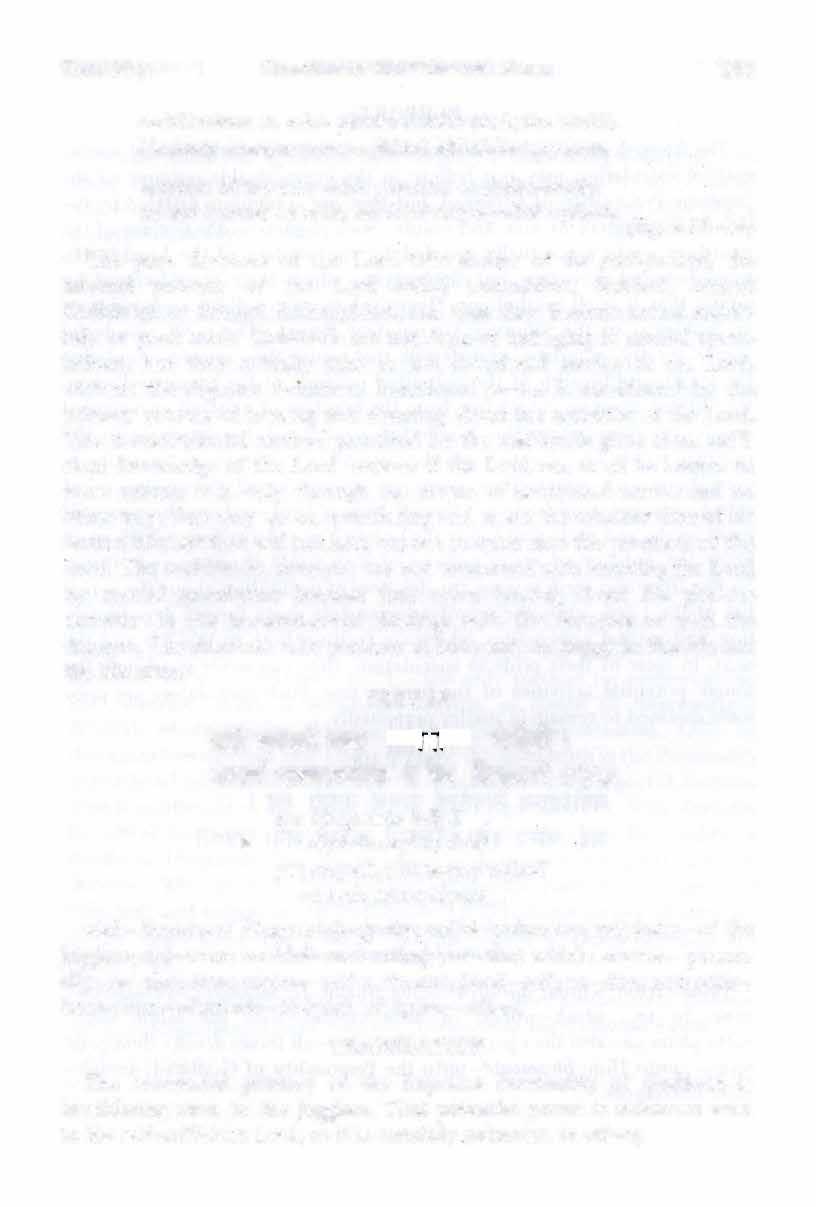
rit � � � I �·"i4R't'i4.1 WI � -<IN� 11�,11
ato bhagavato miiyii
miiyiniim api mohini
yat svayarh ciitma-vartmiitmii
na veda kim-utiipare
ata"{l-therefore; bhagavata[t-godly; miiyii-potencies; miiyiniim-of the jugglers; api-even; mohini-enchanting; yat-that which; svayam-personally; ca-also; iitma-vartma-self-sufficient; iitmii-self; na-does not; vedaknow;kim-what; uta-to speak of;apare-others.



TRANSLATION
The wonderful potency of the Supreme Personality of Godhead is bewildering even to the jugglers. That potential power is unknown even to the self-sufficient Lord, so it is certainly.unknown to others.
Text 39) Creation of the Universal Form
257
PURPORT
The froggish philosophers and mundane wranglers in science and mathematical calculation may not believe in the inconceivable potency of the Supreme Personality of Godhead, but they are sometimes puzzled by the wonderful jugglery of man and nature. Such jugglers and magicians of the mundane world are actually puzzled by the jugglery of the Lord in His transcendental activities, but they try to adjust their bewilderment by saying that it is all mythology. There is, however, nothing impossible or mythological in the Supreme Omnipotent Person. The most wonderful puzzle for the mundane wranglers is that while they remain calculating the length and breadth of the unlimited potency of the Supreme Person, His faithful devotees are set free from the bondage of material encagement simply by appreciating the wonderful jugglery of the Supreme in the practical field. The devotees of the Lord see the wonderful dexterity in everything with which they come in contact in all circumstances of eating, sleeping, working, etc. A small banyan fruit contains thousands of small seeds, and each seed holds the potency of another tree, which again holds the potency of many millions of such fruits as causes and effects. So the trees and seeds engage the devotees in meditation about the activities of the Lord, while the mundane wranglers waste time in dry speculation and mental concoction, which are fruitless both in this life and the next. In spite of their pride in speculation, they can never appreciate the simple potential activities of the banyan tree. Such speculators are poor souls destined to remain in matter perpetually.
TEXT40
44il'sstM �4M �� � Q I
3ft � � �cn«t� � �: ll'ioll
yato 'priipya nyavartanta
viicas ca manasii saha
aharh ciinya ime deviis
tasmai bhagavate nama�
yatap-from whom; apriipya-being unable to measure; nyavartantacease to try; ooca�- words; ca-also; manasii-with the mind; sahawith; aham ca- also the ego; anye-other; ime-all these; devii�-demigods; tasmai-unto Him; bhagavate-unto the Personality of Godhead; nama�offer obeisances. ·

258 Srimad-Bhagavatam (Canto 3, Ch. 6
Words, mind and ego, with their respective controlling demigods, have failed to achieve success in knowing the Supreme Personality of Godhead. Therefore, we simply have to offer our respectful obeisances unto Him as a matter of sanity.
PURPORT
The froggish calculator may raise the objection that if the Absolute is unknowable even by the controlling deities of speech, mind and ego, namely the Vedas, Brahma, Rudra and all the demigods headed by Brhaspati, then why should the devotees be so interested in this unknown object? The answer is that the transcendental ecstasy enjoyed by the devotees in delineating the pastimes of the Lord is certainly unknown to nondevotees and mental speculators. Unless one relishes transcendental joy, naturally one will come back from his speculations and concocted conclusions because he will see them as neither factual nor enjoyable. The devotees can at least know that the Absolute Truth is the Supreme Personality of Godhead Vi�I)U, as the Vedic hymns confirm: tad vi�!tobparamam padam sadii pasyanti suraya[l,. Bhagavad-gitii (Bg. 15.15) also confirms this fact: vedais ca sarvair aham eva vedyal;. By culture of Vedic knowledge one must know Lord Kr�l)a and should not falsely speculate on the word aham or "I." The only method for understanding the Supreme Truth is devotional service, as stated in Bhagavad-gitii (18.55): bhaktyii miim abhijiiniiti yiiviin yas ciismi tattvatal;. Only by devotional service can one know that the ultimate truth is the Personality of Godhead and that Brahman and Paramatma are only His partial features. This is confirmed in this verse by the great sage Maitreya. With devotion he offers his sincere surrender, nama/), to the Supreme Personality of Godhead, bhagavate. One has to follow in the footsteps of great sages and devotees like Maitreya and Vidura, Maharaja Par!k�it and Sukadeva Gosvam!, and engage in the transcendental devotional service of the Lord if he would know His ultimate feature, which is above Brahman and Paramatma.
ThusendtheBhaktivedantaPurportsoftheThird Canto,Sixth Chapter, ofthe Sr!mad-Bhagavatam, entitled·"Creationofthe UniversalForm."

Text 40] Creation of the Universal Form 259 TRANSLATION
CHAPTER SEVEN
Further Inquiries by Vidura TEXTI
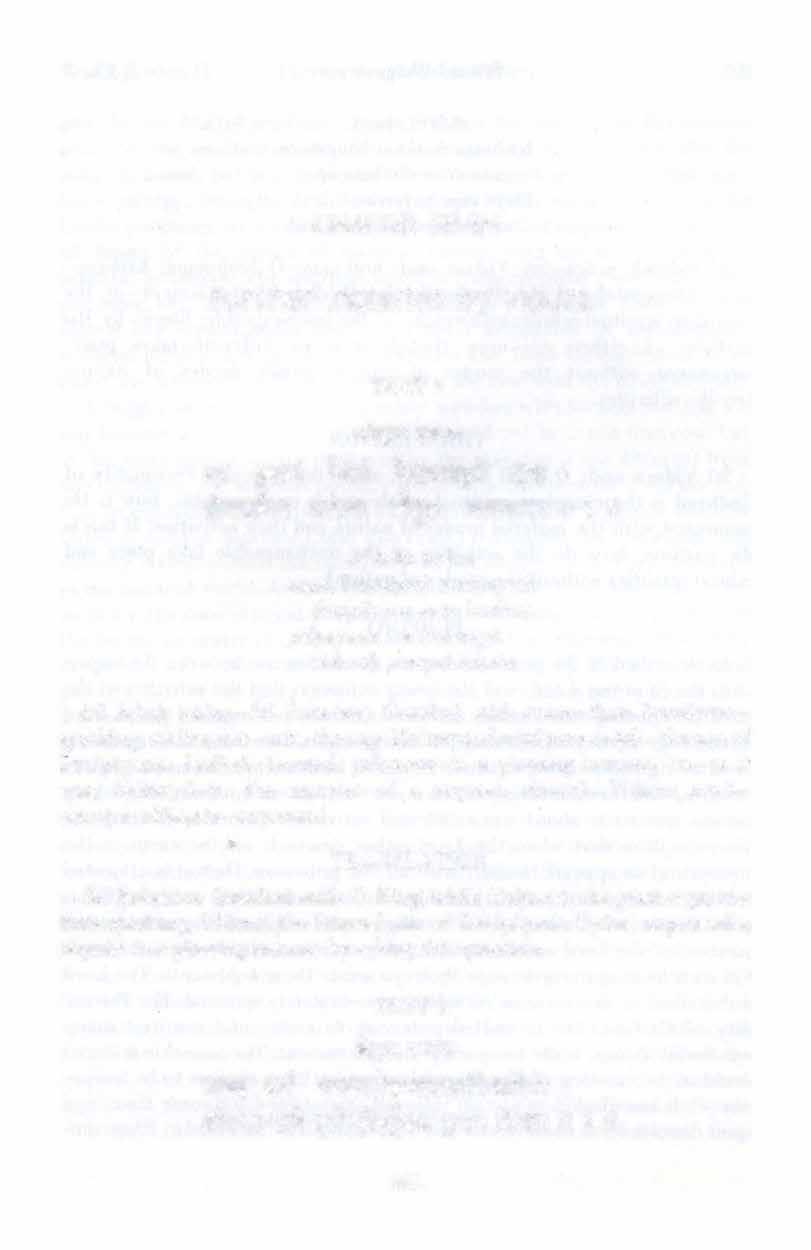
II � II
sri suka uviica evarh bruviirtarh maitreyarh dvaipiiyana-suto budha� prirwyann iva bhiiratyii vidura� pratyabhii§ata
sri sukah uviica-Srl Sukadeva Gosvaml said; evam - thus; bruviinam. . speaking; maitreyam-unto the sage Maitreya; dvaipiiyana-suta�-the son of Dvaipayana; budha�-learned; pri[layan-in a pleasing manner; iva-as it was; bhiiratyii-in the manner of a request; vidura�- Vidura; praticounter; abhii§ata-expressed.
TRANSLATION
Sri Sukadeva Gosvami said: 0 King, while Maitreya, the great sage, was thus speaking, Vidura, the learned son of Dvaipayana Vyasa, expressed a request in a pleasing manner by asking this question.
��qr:;;r �� p �� lqN'iti«l
�: I sftu14Alct ��� �: Sl�¥411ij
TEXT2 �� QIWf � �fttflii"'�IM�IRUU I ���d1tgol�gun: n: II� II 261
Srimad-Bhagavatam
vidura uviica
brahman katham bhagavatas
cinmiitrasyiivikiiril)a� lilayii ciipi yujyeran
nirgul)asya gul)ii� kriyii�
sri vidura� uviica-Sr1 Vidura said; brahman-0 briihmal)a; kathamhow; bhagavata�-of the Personality of Godhead; cit-miitrasya-of the complete spiritual whole; avikiiril)a�-of the unchangeable; lilayii-by His pastime; ca-either; api-even though it is so; yujyerat-takes place; nirgul)asya-without the modes of nature; gul)ii�- modes of nature; kriyii�-activities.
TRANSLATION
Sri Vidura said: 0 great brahma!J.a, since the Supreme Personality of Godhead is the complete spiritual whole and is unchangeable, how is He connected with the material modes of nature and their activities? If this is His pastime, how do the activities of the unchangeable take place and exhibit qualities without the modes of nature?
PURPORT
As described in the previous chapter, the difference between the Supersoul, the Supreme Lord, and _the living entities is that the activities of the Lord in creating the cosmic manifestation are performed by the Lord through the agency of His multifarious energies, but this manifestation is bewildering to the living entities. The Lord is, therefore, the master of the energies, whereas the living entities are subjugated by them. By asking various questions about transcendental activities, Vidura is clearing the · misconception that when the Lord either descends on the earth in His incarnation or appears Himself with all His potencies, He too is subjected to· the influence of miiyii, just like an ordinary living entity. This is generally the calculation of less intelligent philosophers who consider the position of the Lord and that of the living entities to be on the same level. Vidura is hearing the great sage Maitreya refute these arguments. The Lord is described in this verse as cinmiitra, or completely spiritual. The Personality of Godhead has unlimited potencies to create and manifest many wonderful things, both temporary and permanent. Because this material world is the creation of His external energy, it thus appears to be tempo-. rary; it is manifested at certain intervals, maintained for some time, and again dissolved and conserved in His own energy. As described in Bhagavad-

262
[Canto 3, Ch. 7
gitii, bhutvii bhutvii praliyate (Bg. 8.19). But the creation of His internal potency, the spiritual world, is not a temporary manifestation like the material world, but is eternal and full of transcendental knowledge, opulence, energy, strength, beauties and glories. Such manifestations of the Lord's potencies are eternal and are therefore called nirgu'[la, or free from all tinges of the modes of material nature, even up to the mode of material goodness. The spiritual world is transcendental even to material goodness and thus is. unchangeable. Since the Supreme Lord of such eternal and unchangeable qualities is never subjugated by anything like material influence, how can His activities and form be conceived to be under the influence of illusory miiyii, as is the case with the living entities?
A juggler or magician displays many wonders with his acts and arts. He can become a cow by his inagical tactics, and yet he is not that cow;but at th«;! same time, the cow displayed by the magician is not different from him. Similarly,the material potency is notdifferent from the Lord because it is an emanation from Him, but at the same time, that potential manifestation is not the Supreme Lord. The Lord'stranscendental knowledge and potency always remain the same;they do not change, even when displayed in the material world.As stated in Bhagavad-gitii, the Lord descends on the earth by His own internal potency, and therefore there is no question of His becoming materially contaminated, changed or otherwise affected by the modes of material nature. The Lord is sagu'{la by His own internal potency, but at the same time He is nirgu'{la, since He is not in touch with the material energy. The restrictions of the prison house are applicable to prisoners who are condemned by the king's law, hut the king is never affected by such implications, although he may visit the prison house out of his good will. In the Vi�'{lU Puriir.a the six opulences of the Lord are stated to be nondifferent from Him. The opulences of transcendental knowledge, strength, opulence, potency, beauty and renunciation are all identical with the Personality of Godhead. When He personally displays such opulences in the material world, they have no connection with the modes of material nature. The very word cinmiitratvam is the guarantee that the Lord'sactivities are always transcendental,even when displayed in the material world. His activities are as good as the Supreme Personality Himself, otherwise liberated devotees like Sukadeva Gosvami would not have been attracted by them. Vidura inquired howthe Lord's activities can be in the modes of material nature, as is sometimes miscalculated by persons with a poor fund of knowledge. The inebriety of the material qualities is due to the difference between the material body and the spirit soul. The conditioned soul's activities are displayed through the medium

Text 2) Further Inquiries by Vidura 263
of the modes of material nature and are therefore perverted in appearance. However, the Lord's body and the Lord Himself are one and the same, and when the Lord's activities are displayed, they are certainly nondifferent from the Lord in all respects. The conclusion is that persons who consider the Lord's activities material are certainly mistaken.
TEXT3



itlCP41flt14i\� ��"lR11��n I
(Ctij�Jt�
� �MVW� ('(f:\1��: II�II
kripiiyiim udyamo 'rbhasya kamas cikrip4iinyataft
svatas-trptasya ca katharh nivrttasya sadiinyataft
kri{liiyiim-in the matter of playing; u dyamaft-enthusiasm; arbhasyaof the boys; kiimafl-desire ; cikri{li� a-willingness to play; anyatafl-with other boys�svata{l-trptasya-for onewho is self-satisfied; ca-also; kathamwhat for; nivrttasya-one who is detached; sadii-for all time; anyata�totherwise.
TRANSLATION
Boys are enthusiastic to play with other boys or with various diversions because they are encouraged by desire. But there is no possibility of such desire for the Lord because He is self-satisfied and detached from everything.
PURPORT
Since the Supreme· Personality of Godhead is one without a second, there is no possibility that anything besides Himself can exist. He expands Himself by His energies in multiforms of self-expansions and separated expansions as well, just as fire expands itself by heat and light. Since there is no other existence besides the· Lord Himself, the Lord's association with anything manifests His association with Himself. In Bhagavad-gitii (9.4) the Lord says:
mayii tatam idam sarvam jagadavyakta-murtinii
mat-sthiini sarva-bhutiini na ciiham te�v avasthita�
"The complete manifestation of the cosmic situation is an expansion of the Lord Himself in His impersonal feature. All things are situated in Him
264 Srimad-Bhagavatam [Canto3, Ch. 7
only, yet He is not in them." That is theopulence ofthe Lord'sattachment and detachment. He is attached to everything, yet He is detached from all.
0..
asriik�"id bhagaviin visvam
gu[la-mayyii "tma-miiyayii
tayii samsthiipayaty etad
bhuya� pratyapidhiisyati
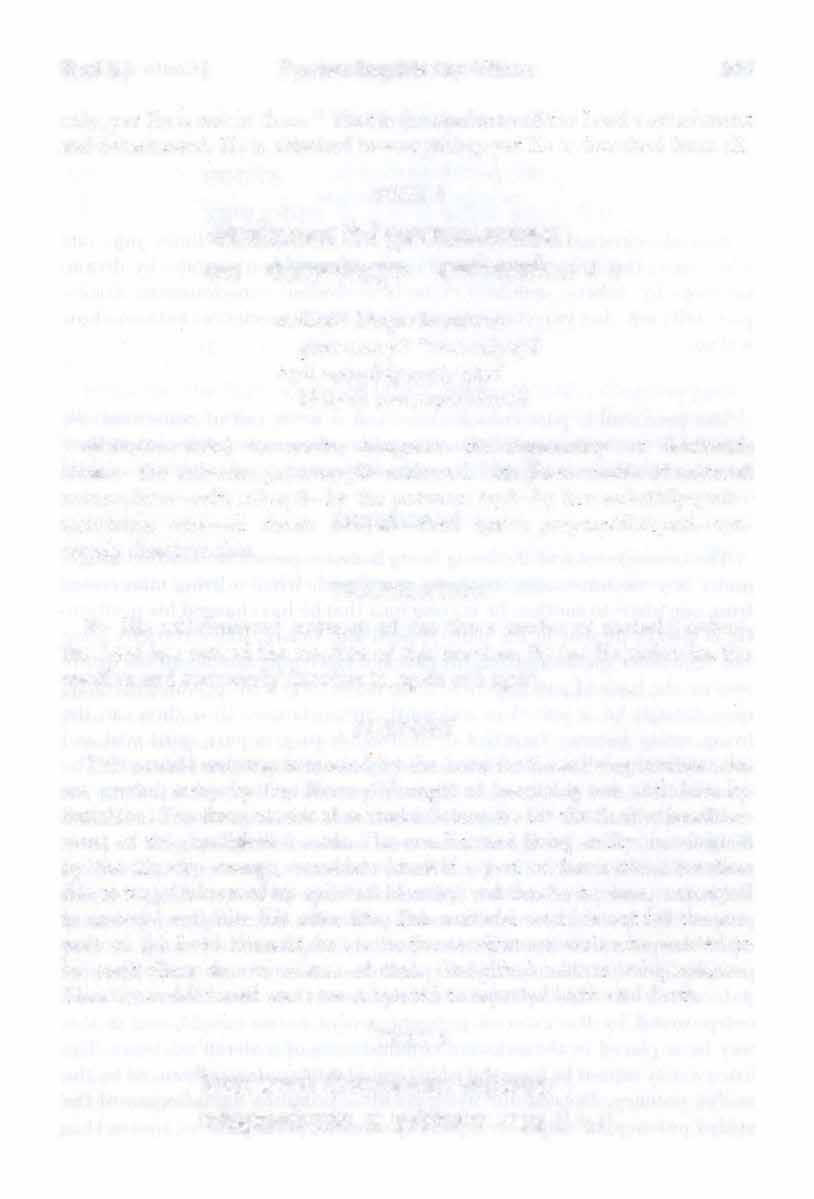
asriik�"it-caused to create; bhagaviin- the Personality of Godhead; viSvam-the universe; gu[lamayyii-endowed with three modes of material nature; iitma-self ; miiyayii-by the potency; tayii-by her; sarhsthiipayatimaintains; etat-all these; bhuya�-then again; praytapidhiisyati- conversely dissolves also.
TRANSLATION
By His self-sheltered potency of the three modes of material nature, the Lord has caused the creation of this universe. By her He maintains the creation and conversely dissolves it, again and again.
PURPORT
This cosmic universe is created by the Lord for those living entities who are carried away by the illusory thought of becoming one with Him by imitation. The three modes of material nature are for the further bewilderment of the conditioned souls. The conditioned living entity, bewildered by the illusory energy, considers himself a part of the material creation due to forgetfulnessof his spiritual identity,andthushe becomes entangled in material activities life after life. This material world is not for the purpose of the Lord Himself, but is for the conditioned souls who wanted to be controllers due to misuse of their God-gifted minute independence. Thus the conditioned souls are subjected to repeated birth and death. TEXT5
Text5] Further Inquiries by Vidura 265
ft.VgulwJqiSS(¥4¥41444411 � ��N44�6'A44:
\l II
TEXT4 �
� II
�:����:�s;qij: I � u ,�61\11� �11'-\11
Srimad-Bhagavatam
desata[l. kiilato yo 'siiv avasthiita{l svato 'nyata{l aviluptiivabodhiitmii
sa yujyetiijayii katham

desata�-circumstantial; kiilata{l-by the influence of time; ya�-one · who; asau-the living entity; avasthiita�-by situation; svata�-by dream; anyata�-by others; avilupta-extinct; avabodha-consciousness; iitmiipure self; sa�-he; yujyeta-engaged; ajayii-with nescience; katham-how is it so.
TRANSLATION
The pure soul is pure consciousness and is never out of consciousness, either due to circumstances, time, situations, dreams or other causes. How then does he become engaged in nescience?
PURPORT
The consciousness of the living being is always presentand never changes under any circumstances, as above mentioned. When a living man moves from one place toanother,he is conscious thathe has changed his position. He is always present in the past, present and future, like electricity. One can remember incidents from his past and can conjecture about his future also on the basis of past experience. He never forgets his personal identity, even though he is placed in awkward circumstances. How then can the living entity become forgetful of his real identity as pure spirit soul and identify with matter unless influenced by something beyond himself? The conclusion is that the living entity is influenced by the avidyii potency, as confirmed in both the Vi§[IU Puriirw and the beginning of SrimadBhiigavatam. The living entity is mentioned in Bhagavad-gitii as pariiprakrti (Bg. 7 .5), and in the Vi§[IU Purana he is mentionedasthe parii-sakti. He is part and parcel of the Supreme Lord as potency and not as the potent. The potent can exhibit many potencies, but the potency cannot equal the potent at any stage. One potency may be overcome by another potency, but to the potent, all potencies are under control. The jiva potency or the kfietrajiia-sakti of the Lord has the tendency to be overpowered by the external potency, avidyii karma-samjfiii, and in this way he is placed in the awkward circumstances of material existence. The living entity cannotbeforgetful of his real identity unless influenced by the avidyii potency. Because the living entity is prone to the influence of the avidyii potency, he can never equal the supreme potent.
266 · .
[Canto 3, Ch. 7
¥4•1etl�4i ��'I �: I � �� � mm � �: �: 11 � 11

bhagaviin eka evai§a sarva-k§etre§V avasthitafl amu§ya durbhagatvam vii kleso vii karmabhifl, kutafl

bhagaviin-the Supreme Personality of Godhead; ekafl, - alone; eva-e�aflall these; sarva- all ; k�etre�u-in the living entities; avasthita�-situated; amu�ya-of the living entities; durbhagatvam-misfortune; vii-either; kle.{a[t-miseries; vii-or; karmabhi?t-by activities; kutafl, - what for.
TRANSLATION

The Lord, as the Supersoul, is situated in every living being's heart. Why then do the living entities' activities result in misfortune and misery?
PURPORT
The next question put forward by Vidura to Maitreya is, "Why are the living entities subjected toso many miseries and misfortunes in. pite of the Lord's presence in their hearts as the Supersoul'?" The body is considered a fruitful tree, and the living entity and the Lord as Supersoul are like two birds seated in that tree. The individual soul is eating the fruit of the tree, but the Supersoul, the Lord, is witnessing the activities of the other bird. A citizen of the state may be in miseries for want of sufficient supervision by the state authority, but how can it be possible that a citizen suffers from other citizens while the chief of the state is personally present? From another point of view, it is understood that the jiva living entity is qualitatively one with the Lord, and thu his knowledge in the pure slale of life cannot be covered by nescience, especially in the presence of Lhe Supreme Lord. How then does the living enlity become subj ecte d Lo ignorance and covered by the influence of miiyii? The Lord is t h e father and protector of every living entity, and He is known as the bhuta-bhrt, or the maintainer of the living entities. Why then should the living entity be subjected to so many sufferings and misfortunes? lL should not be so, but actually we see that it happens everywhere. Thi question is therefore put forward by Vidura for solution.
Text6] Further Inquiries
by Vidura TEXT6
267
TEXT7

�m.-il � f«';{f�Sijl'1(1t! I �:�� �� �11\911
etasmin me mano vidvan khidyate' jniina-sankate tan na� parii[!uda vibho kasmalarh miinasarh mahat
etasmin-in this; me-my; mana[l-mind; vidvan-0 learned one; khidyate-is troubling; ajiiiina-nescience; sankate-in distress; tat-therefore; na[l-mine; pariirtuda-clear up; vibho-0 great one; kasmalam-illusion; miinasam-relating to the mind; mahat-great.
TRANSLATION
0 great and learned one, my mind is greatly illusioned by the distress of this nescience, and I therefore request you to clear it up.
PURPORT
Such mental bewilderment as represented here by Vidura takes·place for some living entities, but not for everyone, for if everyone wer'e bewildered there would be no possibility of a solution by higher personalities.
TEXTS
���:�ij'Eq�-lij'11afir: I
� l1•161fllt�: $4AI61 tmN: II � II
sri suka uviica
sa ittharh codita� k�attrii
tattva-jijfiiisunii mun*
pratyiiha bhagavac-citta�
smayann iva gata-smaya�
sri suka{l uviica-Sri Sukadeva Gosvami said; sa{l-he (Maitreya Muni); ittham-in this way; co dita{l-being agitated; k1attrii-by Vidura; tattvajijiiiisunii-by one who was anxious to inquire to know the truth; muni{lthe great sage; pratyiiha-replied; bhagavat-citta{I-God conscious; smayan--:wonder; iva-since; gata-smaya{!- without hesitation.
268 Srimad-Bhagavatam [Canto 3, Ch. 7
��
Sri Sukadeva Gosviimi said: 0 King, Maitreya, being thus agitated by the inquisitive Vidura, at first seemed to be astonished, but then he replied to him without hesitation, since he was fully God conscious.
PURPORT
Since the great sage Maitreya was filledwithGod consciousness, hehad no reason to be astonished at such contradictory questions by Vidura. Therefore, although as a devotee he externallyexpressed surprise,asifhe did not know how to reply to those questions, he immediately became perfectly settled and properly replied to Vidura. Yasmin vijiiiite sarvameva vijtiiita� bhavanti. Anyonewhoisa devotee ofthe Lord knows about the Lord to some extent, and devotional service tothe Lord makes himable toknow everything by thegraceof the Lord. Althoughadevotee may apparently express himself to be ignorant, he isfullof knowledgein every intricatematter. TEXT9

maitreyauviica
seyambhagavatomiiyii yannayenavirudhyate
iSvarasyavimuktasya
kiirpa[lyamutabandhanam
sri maitreya(l. uviica-Sr1 Maitreya s:rid; sii iyam-such a statement; bhagavata(l.-of the Personality of Godhead; miiyii- illusion; yat- that which; nayena-by logic; virudhyate- becomes contradictory; iSvarasya-of the Supreme Personality of Godhead; vimuktasya-of the ever liberated; kiirpa!lyam- insufficiency; uta-as also, what to'speak of; bandhanambondage.
TRANSLATION
Sri Maitreya said: Certain conditioned souls put forward the theory that the Supreme Brahman or the Personality of Godhead is overcome by illusion or maya, and at the same time they maintain that He is unconditioned. This is against all logic.
Text9] Further Inquiries by Vidura 269
TRANSLATION
�"' �� tti � � � flt(i'd46 I �� ftte�� ctilcioqflij +"''tf( II � II
PURPORT
Sometimes it appears that the Supreme Personality of Godhead, who is one hundred percent spiritual, cannot be the cause of the illusory potency which covers the knowledge of the individual soul. But factually there is no doubt that the illusory external energy is also part and parcel of the Supreme Lord. When Vyasadeva realized the Supreme Personality of Godhead, he saw the Lord along with His external potency, which covers the pure knowledge of the individual living entities. Why the external energy acts in this way may be considered as follows, as analyzed by great commentators like Visvanatha Cakravarti Thakur and Srila Jiva Gosyami. Although the material, illusory energy is distinct from the spiritual energy, it is one of the many energies of the Lord, and thus the material modes of nature (the mode of goodness, etc.) are surely qualities of the Lord. The energy and the energetic Personality of Godhead are not different, and although such energy is one with the Lord, He is never overpowered by it. Although the living entities are also parts and parcels of the Lord, they are overcome by the material energy. The inconceivable yogam aiSvaram of the Lord, as mentioned in Bhagavad-gita (Bg. 9.5), is misunderstood by the froggish philosophers. In order to support a theory that Narayal)a (the Lord Himself) becomes a daridra-naraya[!a, a poor man, they propose that the material energy overcomes the Supreme Lord. Srlla Jiva Gosvaml and Srlla Visvanatha Cakravartl Thakur, however, offer a very nice example in explanation. They say that although the sun is all light, the clouds, darkness and snowfall are aH-part and parcel of the sun. Without the sun there is no possibility of the·sky's being overcast with clouds or darkness, nor can there be snowfall on the earth. Although life is sustained by the sun, life is also disturbed by darkness and snowfall.produced by the sun. But it is also a fact that the sun itself is never overcome by darkness, clouds or snowfall; the sun is far, far away from such disturbances. Only those who have a poor fund of knowledge say that the sun is covered by a cloud orby darkness. Similarly, the Supreme Brahman or the Param Brahman, the P�rsonality of Godhead, is always unaffected by the influence of the material energy, although itis one of His energies (parasya saktir vividhaiva sriiyate).
There is no reason to assert that the Supreme Brahman is·overpowered by the illusory energy. The clouds, darkness and snowfall can cover only a very insignificantportion of the sun's rays. Similarly, the modes of material nature may react upon the ray-like living entities. It is the misfortune of the living entity, certainly not without reason, that the influence of the material energy acts on his pure consciousness and eternal bliss. This

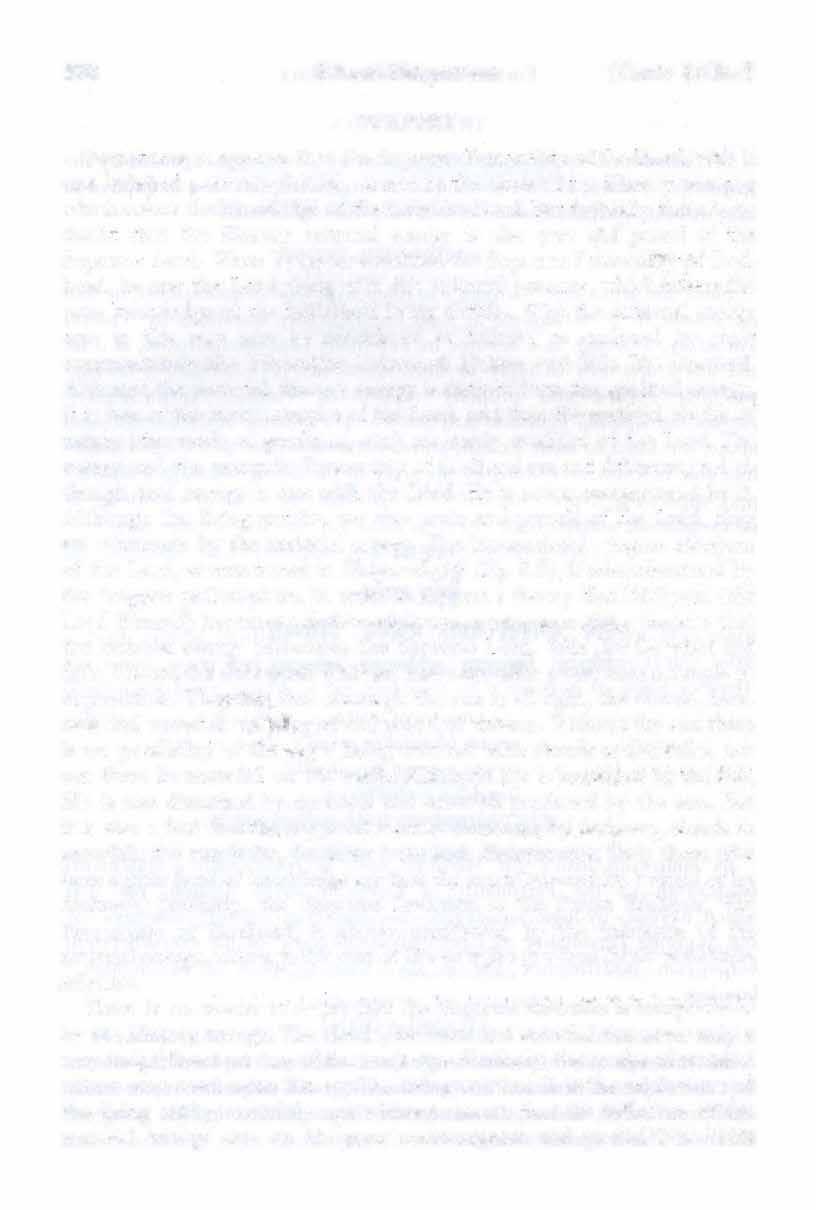
270 Srimad-Bhagavatam [Canto 3, Ch. 7
covering up of pure consciousness and eternal bliss is due to avidyii. karmii-sarhjnii, the energy which acts on the infinitesimal living entities who misuse their minute independence. According to Vi§!tu Puriirw, Bhagavad-gitii and' all other Vedic literatures, the living entities are generated from the tatasthii energy of the Lord, and thus they are always the energy of the Lord and are not the energetic. The living entities are like the sun's rays. Although, as explained above, there is no qualitative difference between the sun and its rays, the sun's rays are sometimes overpowered by another energy of the sun, namely by clouds or by snow· fall. Similarly, although the living entities are qualitatively one with the superior energy of the Lord, they have the tendency to be overpowered by the inferior material energy. In the Vedic hymns it is said that the living entities are like the sparks of a fire. The sparks of fire also are fire, but the burning potency of the sparks is different from that of the original fire. When the sparks fly out of touch with the original fire, they come under the influence of a non-fiery atmosphere; thus they maintain the potency to be again one with the fire as sparks, but not as the original fire. The sparks can everlastingly remain within the original fire as its parts and parcels, but the moment the sparks become separated from the original fire, their misfortunes and miseries begin. The clear conclusion is that the Supreme Lord, who is the original fire, is never overpowered, but the infinitesimal sparks of the fire can become overpowered by the illusory effect of miiyii. It is a most ludicrous argument to say that the Supreme Lord is overpowered by His own material energy. The Lord is the master of the material energy, but the living entities are in the conditioned state, controlled by the material energy. That is the version of Bhagavad-gitii. Thefroggish philosophers whoput forward the argument that the Supreme Lord is overpowered by the material mode of goodness are themselves illusioned by the same material energy, although they think of themselves as liberated souls. They support their arguments by a false and laborious jugglery of words, which is a gift of the same illusory energy of the Lord. But the poor froggish philosophers, due to a false sense of knowledge, cannot understand the situation.
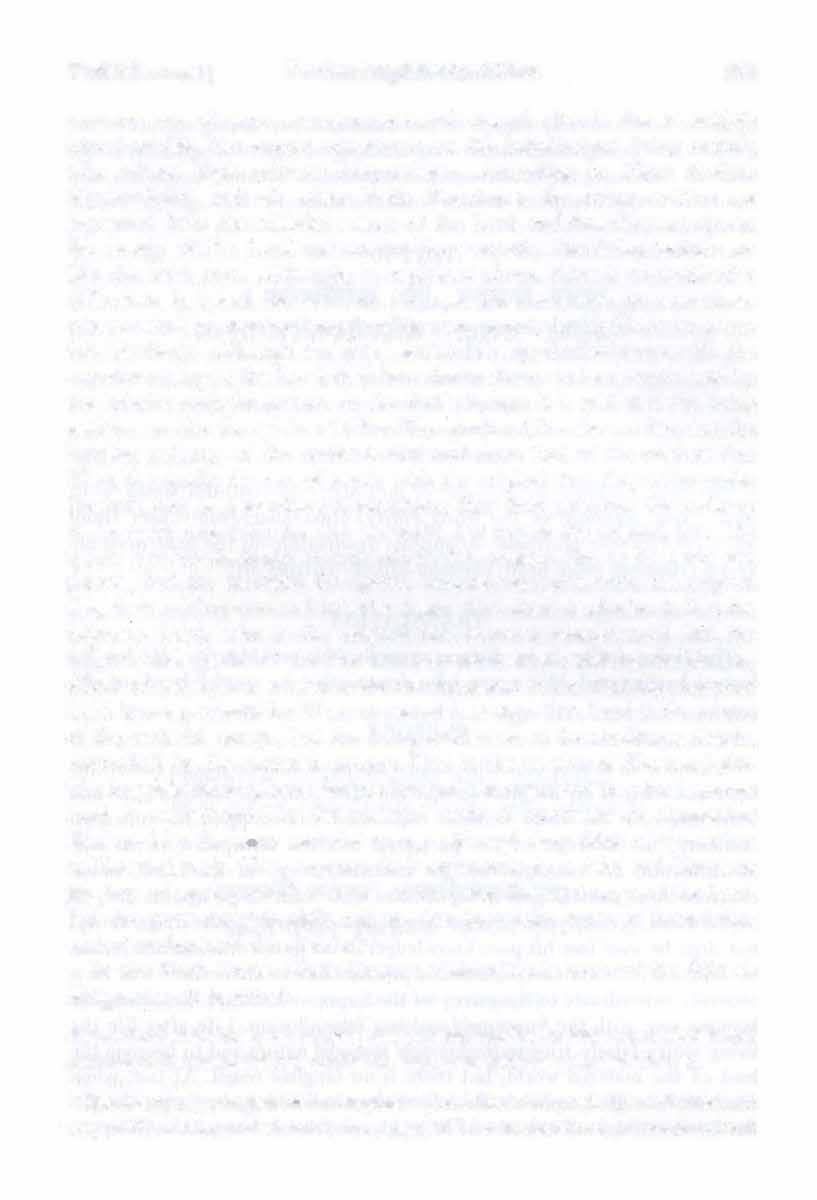
In the Sixth Canto, Ninth Chapter, Thirty-fourth verse of the SrimadBhiigavatam it is stated:
duravabodha iva taviiyarh vihiirayogo yadasararw'sarira idam anavekfiitiismat samaviiya iitmanaiviivi kriyamiirena sagullam aguCta{t srjasi piisiharasi.
"Thedemigods prayed totheSupreme Lord that although His activities are very difficult to understand, they can· still be understood to some extent
Text 9] Further Inquiries by Vidura 271
by those who sincerely engage in the transcendental loving service of the Lord." The demigods admitted that although the Lord is apart from the material influence or creation, He nevertheless creates, maintains and annihilates the complete cosmic manifestation by the agency of the demigods.
TEXT 10

yad arthena vinamu�ya purhsa atma-viparyaya/:1. pratiyata upadra�tu/:1. sva-siras chedanadika/:1.
rat- thus; arthena- by purpose or meaning; vina-without; amu.sya-of such a one; purhsa[t-of the living entity; atma-viparyayaft-upset about self-identification; pratiyate-so appear; upadrafitu{t-of the superficial onlooker; sva-siraft-own head; chedana-adikaft-cutting off.
TRANSLATION

The living entity is in distress regarding his self-identity. He has no factual background, like a man who dreams that he sees his head cut off.
PURPORT
A teacher in school once threatened his pupil that he would cut off his head and hang it on the wall so that the child could see how his head had been cut off. The child became frightened and stopped his mischief. Similarly, the miseries of the pure soul and the disruption of his selfidentification are managed by the external energy of the Lord, which controls those mischievous li�ing entities who want to go against the will of the Lord. Actually there is no bondage or misery for the living entity, nor does he ever lose his pure knowledge. In his pure consciousness, when he thinks a little seriously about his position he can understand that he is eternally subordinate to the mercy of the Supreme and that his attempt to become one with the Supreme Lord is a false illusion. Life after life the living entity falsely tries to lord it over material nature and to become the lord of the material world, but there is no tangible result. At last, when frustrated, he gives up his material activities and tries to become one with the Lord and speculate with much jugglery of words but without success.
272 Srimad-Bhagavatam [Canto 3, Ch. 7
� ��-'*4 � �=
�
These activities are performedunder the dictation of theillusory energy. The experience is compared to the experience of one's having his head cut off in a dream. The man whosehead has been cut offalso sees that his head has been cut off. If a person's head is severed he loses his power to see. Therefore if a man sees that his head has been cut off, it means that he thinks like that in hallucination. Similarly a living entity is eternally subordinate to the Supreme Lord, and he has this knowledge with him, but, artificially, he thinks that he is God himself and that although he is God he has lost his knowledge due to miiyii. This conception has no meaning,just as there is no meaning to seeing one's head being cut off. This is the process by which knowledge is covered. And because this artificial rebellious condition of the living entity gives him aU troubles, it is to be understood that he should take to his normal life as a devotee of the Lord and be relieved from the misconception of being God. The so-caUed liberation of thinking oneself God is that last reaction of avidyii by which the living entity is entrapped. The conclusion is that a living entity deprived of eternal transcendental service to the Lord becomes illusioned in many ways. Even in his conditional life he is the eternal servant of the Lord. His servitude under the spell of illusory miiyii is also a manifestation of his eternal condition of service. Because he has rebelled against the service of the Lord, he is therefore put in the service of the miiyii. He is still serving, but in a perverted manner. When he wants to get out of service under material bondage, he next desires to become one with the Lord. This is another illusion. The best course,therefore,is to surrende� unto the Lord and thus get rid of the illusory miiyii for good, as confirmed in Bhagavad-gitii:

daivi hye�ii gurr-amayi mama miiyii duratyayii
miim eva ye prapadyante miiyam etiim taranti te (Bg. 7_14)
TEXTll

��"'"""�u
¥*'41ta.((l�Wlgar: 1
�� �1€4twtl � gar: II��II
yathii jale candramasa�
kampiidis tat-krto gurr-a�
drsyate' sann api drtl!Jtur
atmano 'niitmano gu!la�
yathii-it is so; jale-in the water; candramasa�-of the moon; kampiidilz,-quivering; tat-krtalz,-done by the water; gu!Ja(l -quality; drsyate-
Text ll] Further Inquiries by Vidura 273
it is so seen;asan api-without existence;dr�tu�-of the seer;iitmana�-of the self;aniitmana[t-of other than the self;gu{lab,-quality.

TRANSLATION
As the moon·reflected on water appears to the seer to tremble due to being associated with the quality of the water, so the self associated with matter appears to be qualified as matter.
PURPORT
The moon in the sky is compared to the Supreme Soul, the Personality of Godhead, and the living entities are compared to the reflection of the moon on water. The moon in the sky is fixed and does not appear to quiver like the moon on the water. Actually, like the original moon in the sky, the moon reflected on the water should also not quiver, but because of being associated with water, the reflection appears to be quivering, although in actual fact the moon is fixed. The water moves, but the moon does not move. Similarly, the living entities appear to be tainted by material qualities like illusion, lamentation, miseries, etc., although in the pure soul such qualities are completely absent. The word pratiyata, which means apparently and not actually (like the experience of having one's head cut off in a dream), is significant here. The reflection of the moon on the water is the separated rays of the moon and not the actual moon. The separated parts and parcels of the Lord entangled in the water of material existence have the quivering quality, whereas the Lord is like the actual moon in the sky, which is not at all in touch with water. The light of .the sun and moon reflected on matter makes the matter bright and praiseworthy. The living symptoms are compared to the light of the sun and the moon illuminating material manifestations like trees and mountains. The reflection of the sun or moon is accepted as the real sun or moon by less intelligent men, and the pure monistic philosophy develops from these ideas. In fact, the light of the sun and the moon are actually different from the sun and moon themselves, although they are always connected. The light of the moon spread throughout the sky appears to be impersonal, but themoon planet, as it is, is personal,and theliving entities on themoon planet are also personal. In the rays of the moon, different material entities appear to be comparatively more or less important. The light of the moon on the Taj Mahal appears tobe more beautiful than the same light in the wilderness. Although the light of the moon is the same everywhere, due lo being differently appreciated, it appears to be different. Similarly,
274 Srimad-Bhagavatam [Canto 3, Ch. 7
the light of the Lord is equally distributed everywhere, but due to being differently received, it appears to be different. One should not, therefore, accept the reflection of the moon on the water as actual and misunderstand the whole situation through �onistic philosophy. The quivering quality of the moon is also variable. When the water is standing still, there is no quivering. A more settled conditioned soul quivers less, but due to material connection the quivering quality is more or less present everywhere.
TEXT 12
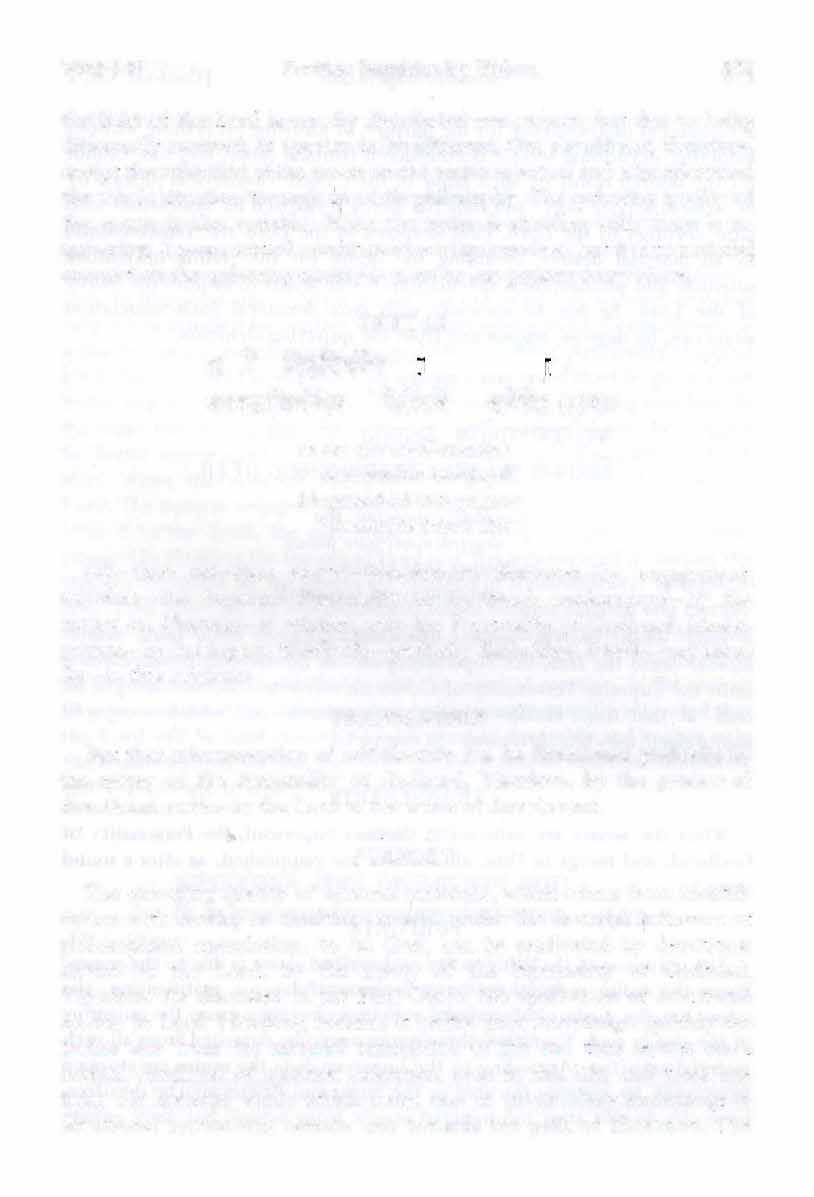
ij' � �IJf I
�•1€f'f:Rtiilli\91 � �Rl II��II

sa vai nivrtti-dharmer-a viisudeviinukampayii bhagavad-bhakti-yogena tirodhatte sanair iha
sa�-that; vai-also; nivrtti-detachment; dharmena-by engagement; viisudeva-the Supreme Personality of Godhead; anukampayii-by the mercy of; bhagavat-in relation with the Personality of Godhead; bhaktiyogena-by linking up; tirodhatte- gradually diminishes; sanai�-very soon; iha-in this existence.


TRANSLATION
But that misconception of self-identity can be diminished gradually by the mercy of the Personality of Godhead, Vasudeva, by the process of devotional service to the Lord in the mode of detachment.
PURPORT
The quivering quality of material existence, which comes from identification with matter or thinking oneself, under the material influence of philosophical speculation, to be God, can be eradicated by devotional service to the Lord, by the mercy of the Personality of Godhead, Vasudeva. As discussed in the First Canto, the application of devotionaJ service to Lord Vasudeva; because it invites pure knowledge, quickly detaches one from the material conception of life and thus revives one's normal condition of spiritual existence, even in this life, and frees one from the material winds which cause one to quiver. Only knowledge in devotional service can elevate one towards the path of liberation. The
Text 12] Further Inquiries by Vidura 275
development of knowledge for the purpose of knowing everything without rendering devotional service is considered fruitless labor, and one cannot get the desired result by such labor of love. Lord Vasudeva is pleased by devotional service only, and thus His mercy is realized by association with pure devotees of the Lord. Pure devotees of the Lord are transcendental to all material.desires, including the desire for the results of fruitive activities and philosophical speculation. If one wants to acquire the mercy of the Lord, he has to associate wilh pure devotees. Such association alone can, by degrees, release one from the quivering elements.
TEXT 13


yadendriyopariimo 'tha dra§triitmani pare harau viliyante tadii klesii� sarhsuptasyeva krtsnasa�
yadii-when; indriya- senses; upariima�-satiated; atha-thus; dra�.taiitmani-unto the seer, the Supersoul; pare-in the transcendence; harauunto the Supreme Personality of Godhead; viliyante-becomes merged in; ta.dii-at that time; kldii�-miseries; sarhsuptasya-one who has enjoyed sound sleep; iva-like; krtsnasa�-in complete.
TRANSLATION
When the senses are satisfied in the seer-Supersoul, the Personality of Godhead, and merge in Him, all miseries are vanquished, as after a sound sleep.
PURPORT
The quivering of the living entity as described above is due to the senses. Since the entire material existence is meant for sense gratification, the senses are Lhe medium of material activities, and they cause the quivering of Lhe steady soul. Therefore, these senses are to be detached from all such material activities. According to the impersonalists the senses are stopped from work by merging the soul in the Supersoul Brahman. The devotees, however, do not stop the material senses from acting, but they engage
276 Srimad-Bhiigavatam [Canto 3, Ch. 7
��(;( � ro I
� �n �ml�tf-���r: IIZ �II
;:r��iJtq�HUStr
f.m;:r�
their transcendental senses in the service of the Transcendence, the Supreme Personality of Godhead. In either case, the activities of the senses in the material field are to be stopped by cultivation of knowledge, and, if possible, they can be engaged in the service of the Lord. The senses are transcendental in nature, but their activities become polluted when contaminated by matter. We have to treat the senses to cure them of the material disease, not stop them from acting, as suggested by the impersonalist. In Bhagavad-g"ita (2.59) it is said that one ceases all material activities only when satisfied by contact with a better engagement. Consciousness is active by nature and cannot be stopped fromworking. Artificially stopping a mischievous child is not the real remedy. The child must be given some better engagement so that he will automatically stop causing mischief. In the same way, the mischievous activities of the senses can only be stopped by better engagement in relation with the Supreme Personality of Godhead. When the eyes are engaged in seeing the beautiful form of the Lord, the tongue engaged in tasting prasiidam or remnants of foodstuff offered to the Lord, the ears engaged in hearing His glories, the hands engaged in cleaning the temple of the Lord, the legs engaged in visiting His temples-or when all the senses are engaged in transcendental variegatedness-then only can the transcendental senses become satiated and eternally free from material engagement. The Lord, as the Supersoul residing in everyone's heart and as the Supreme Personality of Godhead in the transcendental world far beyond the material creation, is the seer of all our activities. Our activities must be so transcendentally saturated that the Lord will be kind enough to look upon us favorably and engage us in His transcendental service; then only can the sensesbe satisfied completely and be no longer troubled by material attraction.
TEXT 14

31itJ•Hit�l�l+i�
guu�li(�ofum: I
fc\i i(1 {'1(ijit4(Uii(Pf9'G\q(l•l�€4idtto�+t<?;$1fl II� 'JII
ase�a-sa;tklesa-samarh vidhatte gur-iinuviida-sravar-arh murare� kim viipunas tac-carar-aravindaparaga-seva-ratir atma-labdhii
ase�a-unlimited; sanklesa-miserable conditions; samam-cessation; vidhatte-can perform; gur-a-anuvada-description of the transcendental name,
Text 14] Further Inquiries by Vidura 277
form, quality' pastimes, entourage and paraphernalia, etc; sraval)amhearing and chanting; muriirel;t-of Murari (Sri KpJQa), the Personality of Godhead; kim vii-what to speak of; punal;t -again; tat-His; caral)aaravinda-lotus feet; pariiga-sevii- service of the dust of flavor; ratil;tattraction; iitma-labdhii-those who have gained such self-achievement.
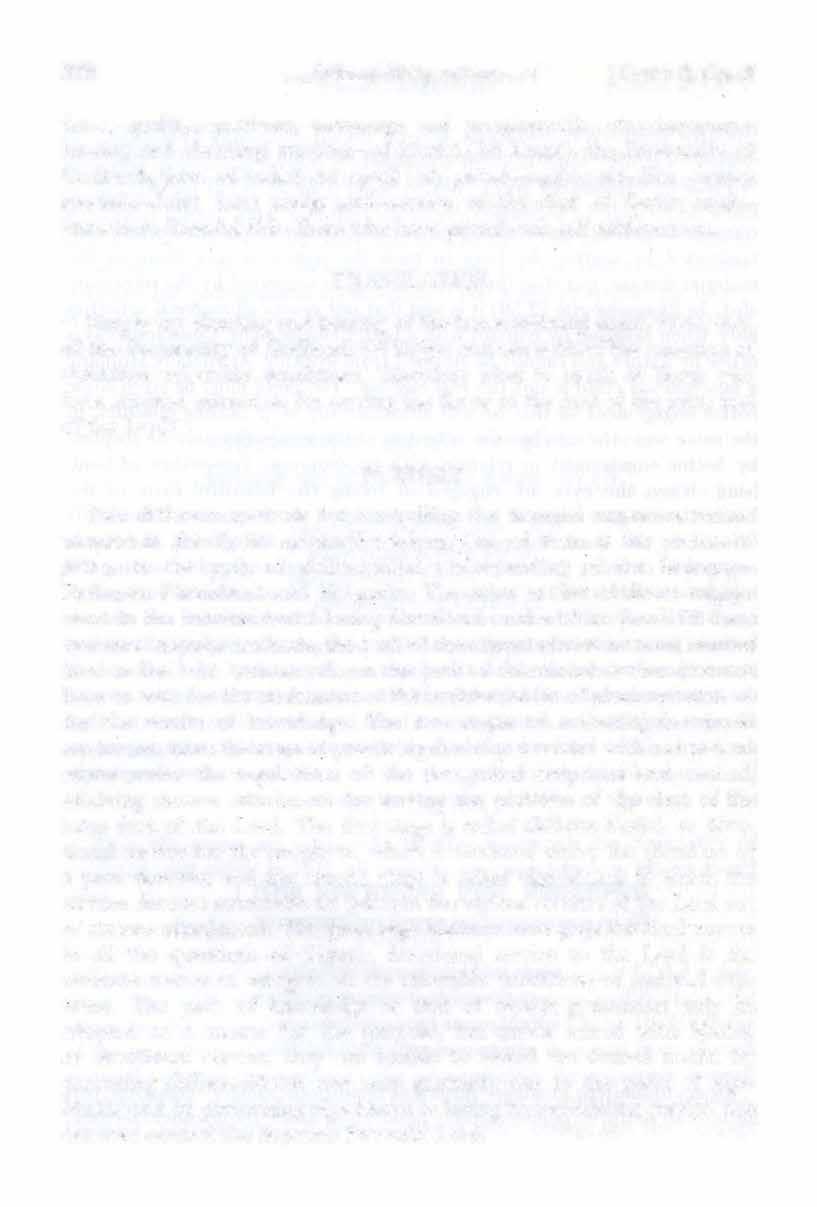
TRANSLATION
Simply by chanting and hearing of the transcendental name, form, etc., of the Personality of Godhead, Sri K{�Q.a, one can achieve the cessation of unlimited miserable conditions. Therefore what to speak of those who have attained attraction for serving the flavor of the dust of the lotus feet of the Lord?
PURPORT
Two different methods for controlling the material senses are recommended in the Vedic scriptural wisdom. One of them is the process of jiiiina, or the path of philosophical understanding of the SupremeBrahman, Paramatma and Bhagavan. The other is that of direct engagement in the transcendental loving devotional service of the Lord. Of these two most popular methods, the path of devotional service is recommended here as the best because one on the path of devotional service does not have to wait for the attainment of the fruitive results of pious activities or for the results of knowledge. The two stages of executing devotional service are, first, the stage of practicing devotional service with our present senses under the regulations of the recognized scriptures and, second, attaining sincere attachment for serving the particles of the dust of the lotus feet of the Lord. The first stage is called siidhana-bhakti, or devotional service for the neophyte, which is rendered under the direction of a pure devotee, and the second stage is called riiga-bhakti, in which the mature devotee automatically takes to the various services of the Lord out of sincere attachment. The great sage Maitreya now gives the final answer to all the questions of Vidura: devotional service to the Lord is the ultimate means to mitigate all the miserable conditions of material existence. The path of knowledge or that of mystic gymnastics may be adopted as a means for the purpose, but unless mixed with bhakti, or devotional service, they are unable to award the desired result. By practicing siidhana-bhakti one may gradually rise to the point of riigabhakti, and by performing riiga-bhakti in loving transcendental service one can even control the Supreme Powerful Lord.
278 Srimad-Bhagavatam [Canto 3, Ch. 7
TEXT15

�:�� � ��1R1c:t1mit I � �•lt4ri4'1l it ��51� II Z �II
vidura uviica
sanchinnatt sarhsayo mahyarh
lava siiktiisinii vibho
ubhayatriipi bhagavan
mano me sampradhiivati
sri viduratt uviica- Sri Vidura said; sanchinnatt-cut off; sarhsayal;tdoubts; mahyam-unto me; tava-your; siikta-asinii-by the weapon of convincing words; vibho-0 my lord; ubhayatra-api-both in God and the living entity; bhagavan-0 powerful one; manal;t -mind; me-my; sampradhiivati-perfectly getting in.
TRANSLATION
Vidura said: 0 powerful sage, my lord, all my doubts about the Supreme Personality of Godhead and the living entities have nowbeen removed by your convincing words. My mind is now perfectly entering intothem.
PURPORT
The science of Kn>Qa, or the science of God and the living entities, is so subtle that even a personality like Vidura has to consult persons like the sage Maitreya. Doubts about the eternal relationship of the Lord and the living entity are created by mental speculators in different ways, but the conclusive fact is that the relationship of God and the living entity is one of the predominator and the predominated. The Lord is the eternal predominator, and the living entities are eternally predominated. Real knowledge of this relationship entails reviving the lost consciousness to this standard, and the process for such revival is devotional service to the Lord. By clearly understanding from authorities like the sage Maitreya, one can become situated in real knowledge, and the disturbed mind can thus be fixed on the progressive path.
Text16] FurtherInquiriesbyVidura·
��
279
TEXT16 ��� � MGI'SII€+4'41tlp:r;f �: I � �N�;:( t1m: ������
siidhv etad vyiihrtam vidvan niitma-miiyiiyanam harel;t iibhiity apiirtharh nirmiilarh viSva-miilam na yadbahil;t
siidhu-as good as it should be; etat-all these explanations; vyiihrtam;_ thus spoken; vidvan-0 learned one; na-not; iitma- the self;miiyii-energy; ayanam- movement; harel;t-of the Personality of Godhead; iibhiitiappears; apiirtham-without meaning; nirmiilam-without basis; visvamiilam-the origin is the Supreme; na- not; yat - which; bahi/;t-outside.
0 learned sage, your explanations are very good, as they should be. Disturbances to the conditioned soul have no other basis than the movement of the external energy of the Lord.
PURPORT
A living entity's unlawful desire to become one with the Lord in every respect is the root cause of the entire material manifestation, for otherwise the Lord has no need to create such a manifestation, even for His pastimes. The conditioned soul, under the spell of the external energy of the Lord, falsely suffers many unfortunate incidents in material life. The Lord is the predominator of the external energy, miiyii, whereas the living entity is predominated by the same miiyii. under the material condition. The false attempt of the living entity to occupy the predominating post of the Lord is the cause of his material bondage, and the conditioned soul's attempt to become one with the Lord is the last snare of miiyii.
TEXT17


�� � � �� rt: q( lRf: I
� t!(flil�� ���tt;ijf«t( �;:r: II �\911

JaS ca miiifhatamo loke
yaS ca buddhel;t param gatal;t tii.v ubhau sukham edhete
kliJyaty antarito janal;t
yaf&-one who is; ca-also; mu{lhatamal;t-the lowest of the fools; lokein the world; yal;t ca-and one who is; buddhel;t-of intelligence; paramtranscendental; gata/;t-gone ; tau-all of them; ubhau-both; sukham-
280 Srimad-Bhagavatam
[Canto 3, Ch. 7
. TRANSLATION
happiness; edhete - enjoy; klisyati-suffer; antarita�-via media; jana!tpersons.
TRANSLATION

Both the lowest of fools and he who is transcendental to all intelligence enjoy happiness, whereas persons who are between them suffer the material pangs.
PURPORT
The lowest of fool.s do not understand materiaJ miseries; they pass their lives merrily and do not inquire into the miseries of life. Such persons are almost on the level of the animaJs, who, although in the eyes of superiors are always miserable in life, are unaware of material distresses. A hog's life is degraded in its standard of happiness, which entails living in a filthy place, engaging in sex enjoyment at every opportune moment and laboring hard in a struggle for existence, but this is unknown to the hog. Similarly, human beings who are unaware of the miseries of material existence and are happyin sex l.ife and hard labor are the lowest of fools. Yet because they have no sense of miseries, they supposedly enjoy so-called happiness. The other class of men, those who are liberated and are situated in the transcendental position above intelligence, are really happy and are called paramahamsas. But persons who are neither like hogs and dogs nor on the level of the paramahamsas feel the material pangs, and for them inquiry on the Supreme Truth is necessary. The Vediinta-sutras state, athiito brahma-jijniisii: "Now one should inquire about: Brahman." This inquiry is necessary for those who are between the pararnahamsas and the fools who have forgotten the question of self-realization in the midst of life in sense gratification. TEXT
Text 18] Further Inquiries by Vidura 281
18 3l�fcrf;(f�stJ\<t�lfq�: I � � !I"'IQ(UI�\lltll( ��11��11 arthiibhiivam viniscitya prafitasyiipi niitmanafl tiim ciipi yu�mac-cara!la sevayiiham parii!lude artha-abhiivam-without substance; viniscitya-being ascertained; pratitasya-of the apparent values; api- also; na-never; iitmanafl-of the self;
tam-that; ca-also; api-thus; yu�mat-your; cara!la-feet; sevaya-by service;aham-myself; parii!'lude-shall be able to give up.
TRANSLATION
But, my dear sir, I am obliged to you because now I can understand that this material manifestation is without substance although it appears to be real. I am confident that by serving your feetitwillbepossiblefor meto giveupthefalseidea.
PURPORT
The sufferings of the conditioned soul are superficial and have no intrinsic value, like the cutting off of one's head in a dream. Yet although this statement is theoretically very true, it is very difficult for the common man or the neophyte on the transcendental path to realize practically. However, by serving the feet of great transcendentalists like Maitreya Muni and by constantly associating with them, one is enabled to give up the false idea that the soul suffers from material pangs.
TEXT 19

�: �l>�� �:I
�: qj�i{l��;J: 11��11
yat-sevaya bhagavata�
kiita-sthasya madhu-dvi�a�
rati-raso bhavet fivra�
padayor vyasanardana�
yat-which; sevaya-by service; bhagavata�-of the Personality of Godhead; kii{a-sthasya-of the unchangeable; madhu-dvi�a�-the enemy of the Madhu asura; rati-rasa�-attachment in different relationships; bhavetdevelops; tzvra�-highly ecstatic;padayo�-of the feet; vyasana-distresses; ardana�-vanquishing.
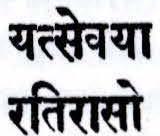
TRANSLATION
By serving the feet of the spiritual master, one is enabled to develop transcendental ecstasy in the service of the Personality of Godhead, who is the unchangeable enemy of the Madhu demon and whose service wnquishesone's materialdistresses.
282 Srimad-Bhagavatam [Canto 3,Ch . 7
PURPORT
The association of a bona fide spiritual master like the sage Maitreya can be of absolute help in achieving transcendental attachment for the direct service of the Lord. The Lord is the enemy of the Madhu demon, or in other words He is the enemy of the sufferings of His pure devotee. The word rati-riisa� is significant in this verse. Service· to the Lord is rendered in different transcendental mellows (relationships): neutral, active, friendly, parental and nuptial. A living entity in the liberated position of transcendental service to the Lord becomes attracted to one of the above-mentioned mellows, and when one is engaged in transcendental loving service to the Lord, one's service attachment in the material world is automatically vanquished. As stated in Bhagavad-gitii (2.59), rasa-varjam raso'py asya param dr�tvii nivartate.

TEXT 20
� GCN6q(1;
duriipii hy alpatapasa� sevii vaiku[l-tha-vartmasu yatropagiyate nityam deva-devo janiirdana�
duriipii- rarely obtainable; hi-certainly; alpa-tapasab,-of one whose austerity is meager; sevii-service; vaiku!l-tha-the transcendental kingdom of God; vartmasu-on the path of; yatra-wherein; upagiyate-is glorified; nityam-always; deva-Lord; deva�-of the demigods; janiirdanab,-the controller of the living entities.
TRANSLATION
Persons whose austerity is meager can hardly obtain the service of the pure devotees who are progressing on the path back to the kingdom of Godhead, the Vaiklll,lthas. Pure devotees engage one hundred percent in glorifying the Supreme Lord, who is the Lord of the demigods and the controller of all living entities. '
PURPORT
The path of liberation, as recommended by all authorities, is to serve the mahatma transcendentalists. As far as Bhagavad-gitii is concerned, the
Text 20] Further Inquiries by Vidura 283
. {Rr ��oaq� I
��q•fhi� � � -;ll�oll
mahatmas are the pure devotees who are on the path to VaikuJ:ttha, the kingdom of God, and who always chant and hear the glories of the Lord rather than talk of dry profitless philosophy. This system of association has been recommended since time immemorial, but in this age of quarrel and hypocrisy it is especially recommended by Lord Sr"i Caitanya Mahaprabhu. Even one who has no assets of favorable austerity, if he nevertheless takes shelter of the mahatmas who are engaged in chanting and hearing the glories of the Lord, is sure to make progress on the path back home, back to Godhead.
TEXT 21
mtvagre mahad-iidini sa-vikara[ly anukramat tebhyo virajam uddhrtya tam anu pravisad vibhu�
mfvii-after creating; agre-in the beginning; mahad-adini-the total material energy; sa-vikariirti-along with the sense organs; anukramat- by a gradual process of differentiation; tebhya� -out of that; virajam-the gigantic universal form; uddrtya-manifesting; tam-into that; anu-later on; pravisat-en t ered; vihhu� -the Supreme.
TRANSLATION
After creating the total material energy, the mahat-tattva, and thereby manifesting the gigantic universal form with senses and sense organs, the Supreme Lord entered within it.
PURPORT
Fully satisfied by the answers of the sage Maitreya, Vidura wanted to understand the remaining portions of the creative function of the Lord, and he look the clue from the previous topics.
TEXT
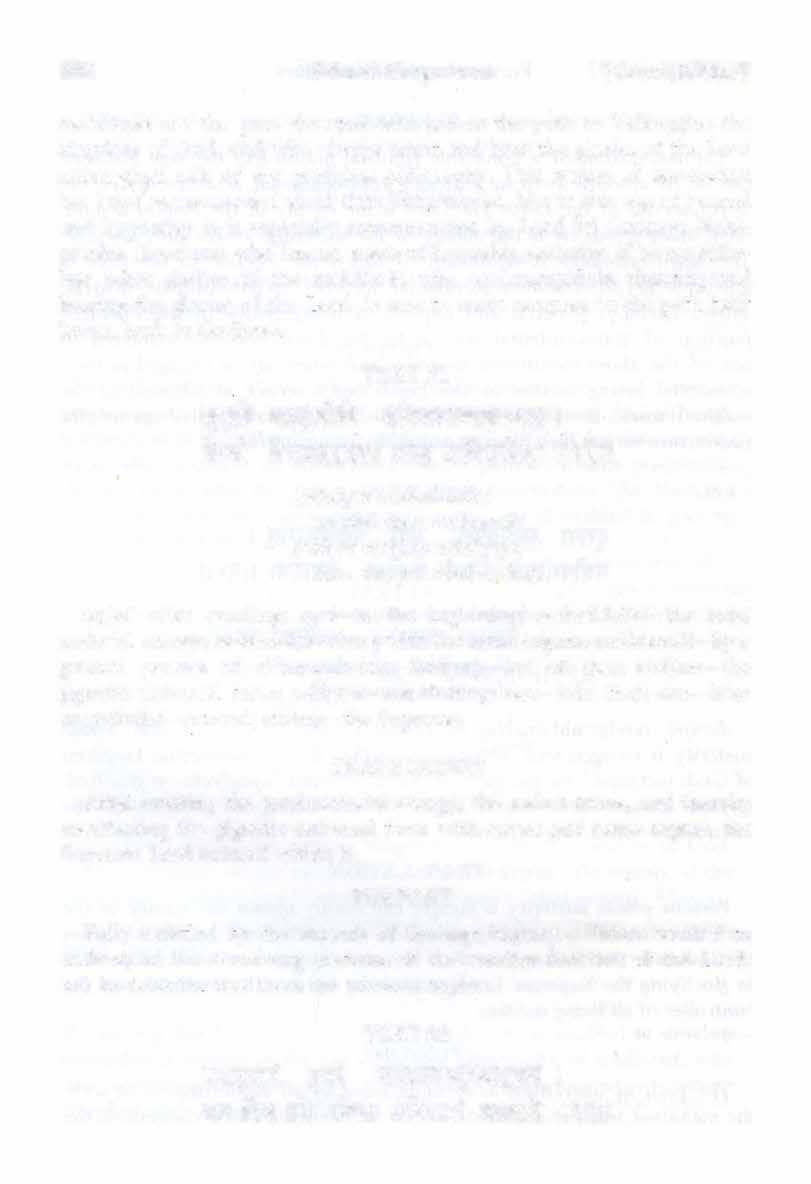
284 Srimad-Bhagavatam [Canto 3, Ch. 7
�R..+t(�I�PI ijfc\1Jhi(IIA4�4i'ffi{_ I � f.m��m�:11��11
lflt� � ij&�l�t{�ll€h� I � ft11e1{il' �: mm« ij+clij� ������
22
yam iihur iidyam puru�am
sahasriinghry-uru-biihukam yatra visva ime lokii�
savikiisarh sam iisate
yam-who; iihu� - is called; iidyam- original; puru,sam-incarnation for cosmic manifestation; sahasra-thousand; anghri-legs; uru-thighs; biihukam-hands; yatra-wherein; visva�-the universe; ime-all these; lokii�planets; sa-vikiisam-with respective developments;sam-allofthem; iisate -living.
TRANSLATION
The puru�a incarnation lying on the Causal Ocean is called the original puru�a in the material creations, and in His virata form, in whom all the planets and their inhabitants live, He has many thousands of legs and hands.
PURPORT
The first puru�a is Karat;�odakasayl Vi�t;�u, thesecond puru�a is Garbho· dakasay! Vi�t;�u, and the third puru�a is K�rodakasay! Vi�t;�u, in whom iscontemplated the viriita-puru�a, thegigantic forminwhich all the planets withtheir different developmentsand inhabitants are floating.
TEXT 23

·���: snur: m�1�-w:rf'�I
�ffl �(f) ffUil��'!_({t� ;r: ����II
yasmin dasa-vidha� priirw�
sendriyiirthendriyas trivrt
tvayerito yato v'arrtiis
tad-vibhutir vadasva na�
yasmin-inwhich; dasa-vidha�-ten kindsof; priirta�-airoflife;sa-with; indriya-senses; artha-interest; indriya�- of thesenses; trivrt- three kinds oflifevigor; tvayii-byyour; irita�-explained; yat��-wherefrom; varrtabfour specific divisions; tat-vibhutil;t-prowess; vadasva - please describe; na�-unto me.
TRANSLATION
0 great brahmar.ta, you have told me that the gigantic virata form, and His senses, sense objects and ten kinds of life air, exist with three kinds of
Text 23] Further
Inquiries by Vidura
285
life vigor. Now, if you will, kindly explain to me the different powers of the specific divisions.
TEXT24
� �tt �tt �:��:I
� ·f4�'!41t)ij� �Rr-1. ������II
yatra putrai.S ca pautrais ca naptrbhi[l. saha gotrajai[l. prajii vicitra-krtaya
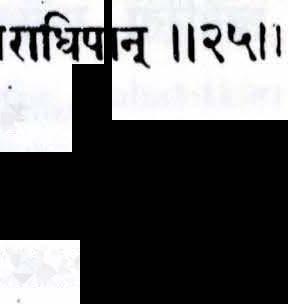
·a. san yiibhir idam tatam
yatra-wherein; putrai�-along with sons; ca-and;pautrai�-along with grandsons; ca-also; naptrbhi[l.-with grandsons from daughters; sahaalong with; gQtrajai[l.-of the same family; praja[l.-generations; vicitra-of different kinds; krtaya[l.-so done; asan-exist;yabhi[l.-by whom; idam-all these planets; tatam-overcast.
TRANSLATION
0 my lord, I think that the prowess manifest in the forms of sons, grandsons and family members has spread all over the universe in different varieties and species.
TEXT25

�:itN('f"i•dij'�����I


prajii-pati:niim sa patis
cak{pe kiin prajiipati:n sargiims cawanusargiims ca maniin manvantariidhipiin
11�"'11
prajii-pati:niim-of the demigods like Brahma and others; sa�-he; pat*leader; cakJpe-decided; kiin-whomsoever; prajiipati:n-father of the living entities; sargan-generations; ca- also; eva-certainly; anusargiin-later generations; ca-and; manun-the Manus; manvantara-adhipiin-and the changes of such.
TRANSLATION.
0 learned briihmat;ta, please describe how the leader of all the demigods, namely Prajapati, Brahmii, decided to establish the various Manus, the

286 Srimad-Bhagavatam [Canto 3, Ch. 7
� � • tt ��(U'flF{
heads of the ages. Please describe the Manus also, and pleasedescribethe descendants of those Manus.
PURPORT
The human race, or manu�ya-sare, descends from the Manus, sons and grandsons of the Prajapati, Brahma. The descendants of Manu reside in all the different planets and rule all the universe.
TEXT 26
upary a�has ca ye lokii bhumer mitriitmajiisate te�iirh sarhsthiirh pramiirtarh ca bhiir-lokasya ca var[laya
upari-on the head; adhaft-underneath; ye ca-also; lokaft- planets; bhiimeft-of the earth; mitra-iitmaja-0 son of Mitra (Maitreya Muni); iisate-do exist; tefiiim-their; sarhstham-situation; pramiit;wm ca-also their measurement; bhiift- lokasya-of the earth planets; ca-also; var[layaplease describe.





TRANSLATION
0 son of Mitra, kindly describe how the planets are situated above the earth as well as underneath it, and also please mention their measurement as well as that of the earthly planets.
PURPORT
Yasmin vijiiiite sarvam eva vijiiiitaft bhavanti. This Vedic hymn declares emphatically that the devotee of the Lord knows everything material and spiritual in relationship with the Lord. Devotees are not simply emotional, as is ill-conceived by certain less intelligent men. Their direction is practical. They know everything that is and all the details of the Lord's domination over the different creations.
TEXT 27


Text 27] Further Inquiries by Vidura 287
��-.t� � � I rn � Sl10Ut � i.Jtt.� Tl �tru����
.. ��qqaf5'fUTT'll. � ;J: (1.f('(ol!��f4a,ri::stifi;:G;I'(������
ti,yan-manu�a-deviinam
saiisrpa-patattrirtiim vada na� sarga-samvyiiham
giirbha-sveda-dvijodbhidam
tiryan-subhuman;manu�a-human beings;devanam-of the superhuman beings or demigods; sarisrpa-reptiles; patattrirtiim-of the birds; vadakindly describe; na�-unto me; sarga-generation; samvyiiham-specific divisions; garbha-embryonic; sveda-perspiration; dvija-twice-born; udbhidam-planets, etc.
TRANSLATION
Also please describe the living beings under different classifications: subhumans, humans, those born of the embryo, those born of perspiration, those who are twice born [birds], and the plants and vegetables. Kindly describe their generations and subdivisions also.
TEXT 28


�: mP.Eia«��·������
gurtiivatarair visvasya
sarga-sthity-apyayasrayam srjatafl srinivasasya
vyiicak�vodiira-vikramam
gurw-modes of material nature;avatiirai{l-of the incarnations;viSvasya -of the universe;sarga-creation;stithi-maintenance;apyaya-destruction; iiSrayam-and ultimate rest; srjata[l-of the one who creates;sriniviisasyaof the Personality of Godhead; vyiicak.sva-kindly describe; udiiramagnanimm_Js;vikramam-specific activities.
TRANSLATION
Please also describe the incarnations of the material modes of natureBrahma, Vi!!QU and Mahesvara-and please describe the incarnation of the Supreme Personality of Godhead and His magnanimous activities.
PURPORT
Although the three incarnations of the material modes of nature, Hrahma, Vi�QU and Mahesvara, are the principal deities for the creation,
288
Srimad-Bhagavatam
3, Ch. 7
[Canto
gOMffi�f.f� «•iRt4���1� I
maintenance and destruction of the cosmic manifestation, they.are not the final authority. The Supreme Personality of Godhead Lord Kr�l).a is the ultimate goal, the cause of all causes. He is the iisraya, or the final rest of everything.
TEXT 29

t{111\�'( �q�ft�€4+tl!ifij: I
� i:t"'i�R � � NcMUI'( 11��11
var[liisrama-vibhiigiirhs ca riipa-sila-svabhiivata� [�t[liirh janma-karmiidi vedasya ca vikar�a[lam
var[la-iisrama- the four divisions of social statuses and orders of spiritual culture; vibhiigiin-respective divisions; ca-also; riipa-personal features; sua-svabhiivatab,-personal character; !§t[liim-of the sages; janma-birth; karmiidi-activities; vedasya-of the Vedas; ca-and; vikar,5a[tam-categorical divisions.
TRANSLATION
0 great sage, kindly describe the divisions and orders of human society in terms of symptoms, behavior and the characteristics of mental equilibrium and sense control. Also please describe the births of the great sages and the categorical divisions of the Vedas.
PURPORT
The four statuses and orders of human society-briihma[las, k�atriyas, vaisyas and siidras, as well as brahmaciiris, grhasthas, viinaprasthas and sannyiisis-are all the divisions of quality, education, culture and spiritual advancement attained by practicing control of the mind and the senses. All these divisions are based on the particular nature of each individual person, not on the principle of birth. Birth is not mentioned in this verse because birth is immaterial. Vidura is famous· in history as born of a siidrii[lt mother, yet he is more than a briihma[la by qualification because he is seen here to be the disciple of a great sage, Maitreya Muni. Unless one achieves at least the brahminical qualifications one cannot understand the Vedic hymns. Mahiibhiirata is also a division of the Vedas, but it is meant for women, siidras and dvija-bandhus, the worthless children of the higher section. The less intelligent section of society can avail themselves of the Vedic instructions simply by studying the Mahiibhiirata.
Text'29) Further Inquiries by Vidura 289
TEXT 30
�� fil61wt1PI� � q1(: SlitI
C' . • • �('ti(QI�6;;r�¥ttiEIM«4(II"( o II

yajnasya ca vitiiniini
yogasya ca pathal), prabho nai§karmyasya ca siinkhyasya
tantrarh vii bhagavat-smrtam
yajnasya-of sacrifices; ca-also; vitanani-expansions; yogasya-of the mystic powers;ca-also;patha�- ways;prabho- 0 my lord;na(!karmyasya -of knowledge; ca-and; sankhyasya-of analytical studies; tantram-the path of devotional service; va-as well as; bhagavat-in relation with the Personality of Godhead;smrtam-regulative principles.

TRANSLATION
Please also describe the expansions of different sacrifices and the paths of mystic powers, analytical study of knowledge, and devotional service, all with their respective regulations.
PURPORT
The word tantram is significant herein. Sometimes tantram is mis· understood to be the black spiritual science of materialistic persons engaged in sense gratification, but here tantram means the science of devotional service compiled by Srila Narada Muni. One can take advantage of such regulative explanations of the path of devotional service and make progressive advancement in the devotional service of the Lord. Sari.khya . philosophy is the basic principle of acquiring knowledge, as will be explained by the sage Maitreya. The Sari.khya philosophy enunciated by Kapiladeva, the son of Devahiiti, is the real source of knowledge about the Supreme Truth. Knowledge not based on the Sari.khya philosophy is mental speculation and can yield no tangible profit.
TEXT 31


'{lqo;gqtt�tt.-4
Slf6itt�PI���-.(I
� � ��� �wHftgoiEh4�t: II��II
pii§ar.{la-patha-vai§amyarh pratiloma-nivesanam

290 Srimad-Bhagavatam [Canto 3, Ch. 7
fivasya gatayo yiis ca yiivatir gul).a-karmajii�
piiftart!Ia-patha-the path of the faithless; vai§amyam-imperfection by contradiction; pratiloma-cr'ossbreeding; nivesan am-situation; j ivasya-of the living entities; gataya�-movements; ya�-as they are; ca- also; yiivati�as many as; gu"[la-modes of material nature; k armajii�-generated by different work.

TRANSLATION
Please also describe the imperfections and contradictions of the faithless atheists, the situation of crossbreeding; and the movements of the living entities in various species of life' according to their particular modes of nature and work.
PURPORT
The combination of living entit�es in different modes of material nature is called crossbreeding. The faithless atheists do not believe in the existence of God, and thus their paths of philosophy are contradictory. Atheistic philosophies never agree with one another. Different species of life are evidence of varieties of mixtures of the modes of material nature.
TEXT 32



�+fil+t¥41�1Uii MPt'Etl;:iiNU�.,�{: I
�-<(O:S;f\�f(��RN �...����II
dharmiirtha-kiima-mok�iil).iirh nimittiiny avirodhata� viirtiiyii dal).l)a-nites ca srutasya ca vidhirh prthak
dharma-religiosity; artha-economic development; kama-sense gratification;mok�iil).iim-salvation;nimittiini-causes; avirodhata�-without being contradictory; viirtiiyii�-on the principles of the means of livelihood; dal).l)a-nite�-of Jaw and order; ca-also; srutasya- ofthe codes of scriptures; ca-also ; vidhim�regulations ; prthak.:-"- dlfferen t . .
TRANSLATION
You may also describe the noncontradictory causes of religiosity, economic development, sense gratification and salvation and also the

Text 32] Further Inquiries by Vidura
291
different means of livelihood and different processes of law and order as mentioned in the revealed scriptures.
TEXT33
sraddhasya ca vidhirh brahman pitf"rtiirh sargam eva ca graha-nak�atra-tiiriirtiirh kiilavayava-sarhsthitim
sriiddhasya-of the periodical offerings of respects; ca-also; vidhimregulalions; brahman-0 briihma[la; pitfrziim- of the forefathers; sargamcreation; eva-as; ca-also; graha- planetary system; nak�atra-the stars; tiiriirtiim-l uminaries; kiila- time; avayava-duration; sarhsthitim- situations.


TRANSLATION
Please also explain the regulations for offering respects to the forefathers, the creation of the Pitrloka, the time schedule in the planets, stars and luminaries, and their respective situations.
PURPORT
The time durations of day and night as well as of months and years are different in the different planets, stars and luminaries. The higher planets like the moon and Venus have different time measurements than the earth. It is said that six months of this planet earth is equal to one day of the higher planets. In Bhagavad-gita theduration of one dayin Brahmaloka is measured to be 1,000 times the four yugas, or 4,300,000 multiplied by 1,000. And the month and year in Brahmaloka are calculated in that measure.
TEXT34

� � tnR ��'!1\��i: � I
!lCII('t�� � � lf� �� �fflm: ����II
diinasya tapaso viipi
yac-cc.stii piirtayoft phalam
praviisa-sthasya yo dharmo
yas ca purhsa utiipadi
292 Srimad-Bhiigavatam [Canto 3, Ch_ 7
�� AA;m;{_murr� � 1 • i �muo�T II��II
diinasya-of charity; tapasa�-of penance; viipi-lake; yat- that which; ce§tii-endeavor; piirtayo�-of reservoirs of water; phalam-fruitive result; praviisa-sthasya-one who is away from home; yaft-that which; dharma�du ly ; ya/l c a-and which; purhsap-ofman; uta-described; apadi-in danger.
TRANSLATION
Please also describe the fruitive results of charity and penance and of digging reservoirs of water. Please describe the situation of persons who are away from home and also the duty of a man in an awkward position.
PURPORT
The digging of reservoirs of water for public use is a great work of charity, and retiring from family life after fifty years of age is a great act of penance performed by the sober human being.
TEXT35

yena vii bhagaviirhs tu�yed dharma-yonir janiirdanaft samprasidati vii ye§iim etad iikhyiihi menagha
yena-by which; vii-either; bhagaviin-the Personality of Godhead; lufiyet- is satisfied; dharma-yon*- the father of all religion; janiirdanaftthe controller of all living beings; samprasidati- completely satisfied; viieither, or; yefiiim-of those; etat-all these; iikhyiihi-kindly describe; meunto me; anagha-0 sinless one.
TRANSLATION
0 sinless one, because the Personality of Godhead, the controller of all living entities, is the father of all religion and all those who are candidates for religious activities, kindly describe how He can be completely satisfied.
PURPORT
All religious activities are meant ultimately to satisfy the Supreme Personality of Godhead. The L ord is the father of all re ligious principles. As stated in Bhagavad-gitii (Bg. 7.16), four kinds of pious men-the needy,
Text 35] Further Inquiries by Vidura 293
lr.l en �•lii4i�:§:�4\PI��wt: I �st«lG:R1 en �"lll(tG\RaqiR it;rq U�'-\11
the distressed, the enlightened and the inquisitive-approach the Lord in devotional service, and their devotion is mixed with material affection. But above them are the pure devotees whose devotion is not tainted by any material tinges of fruitive work or speculative knowledge. Those who are only miscreants throughout their lives are compared to demons (Bg. 7.15). They are bereft of all knowledge, in spite of any academic educational career they may pursue. Such miscreants are never candidates for satisfying the Lord.
TEXT 36

anuvratiiniim siuii[!iirh putrii[Liim ca dvijottama aniipr�tam api briiyur guravo dina-vatsaliift
anuvratiiniim-the followers; si�yii"[!iim-of the disciples; putrii[Liim-of the sons; ca-also; dvija-uttama-:0 best amongst the briihma1Jas; aniipr�tam -that which is not asked for; api-in spite of; briiyu"(t-please describe; guravab,-the spiritual masters; dina-vatsaliib,-who are kind to the needy.





TRANSLATION
0 best among the brahmaQas, those who are spiritual masters are very kind to the needy. They are always kind to their followers, disciples and sons, and without being asked by them, the spiritual master describes all that is knowledge.
PURPORT
There are many subjects to be known from the bona fide spiritual master. The followers, disciples and sons are all on one level for the bona fide spiritual master, and he is always kind to them and always speaks to them on transcendental subjects, even though he is not asked by them. That is the nature of the bona fide spiritual master. Vidura appealed to Maitreya Muni to speak on subjects about which he might not have asked.
294 $rimad-Bhagavatam [Canto 3, Ch. 7
31�t4<11Wii � � ffi\:Jtl�'i I 31Wii'lf!'4N i{�tclt i{lws�ffl<M: II�� II
37 � � sffi\'m: 1 �if � aqiOO(i{ � � R4a.��(ij 11�\911
TEXT
tattviiniirh bhagavarhs te�iirh
katidhii pratisankrama�
tatremarh ka upiisiran
ka u svid anuserate

tattviiniim-of the elements of nature; bhagavan-0 great sage; te�iimof them; katidhii-how many; pratisahkrama� - dissolutions; tatra-thereupon; imam-unto the Supreme Lord; ke-who are they; upiisiran-being saved; ke-who are they; u-who; svit-may; anuserate-serve the Lord while He sleeps.

TRANSLATION
Please describe how many dissolutions there are for the elements of material nature and who survives after the dissolutions to serve the Lord while He is asleep.
PURPORT
In the Brahma-samhitii it is said that all the material manifestations with innumerable universes appear and disappear with the breathing of the Mahii- Vi§!I-U lying in Y()ga-nidrii, or mystic sleep.
ya� kiira!tiin:wva-jale bhajati sam yoganidriim ananta-jagada!tt)a-saromakiipa� iidhiira-saktim avalambya pariim sva-miirtim govindam iidi-puru§am tam aham bhajiimi
yasyaika-nisvasita-kiilam athiivalambya fivanti loma-vilajii jagada!tt)a-niithii� vi�r-ur mahiin sa iha yasya kalii-vise�o govindam iidi-puru�am tam aham bhajiimi
"Govinda, the ultimate and Supreme Personality of Godhead [Lord l(r�l)a], lies sleeping unlimitedly on the Causal Ocean in order to create unlimited numbers of universes during that sleep. He lies on the water by His own internal potency, and I worship that original Supreme Godhead.
"Due to His breathing, innumerable universes come into existence, and when He withdraws His breath there occurs the dissolution of all the lords of the universes. That plenary portion of the Supreme Lord is called Mahii- Vi�r-u, and He is a part of the part of Lord Kr�qa. I worship Govinda, the original Lord."
(Bs.5.47-5.48)

After the dissolution of the material manifestations the Lord and His kingdom beyond the Causal Ocean do not disappear, nor do the inhabitants, the Lord's associates. The associaies of the Lord are far more

Text 37]
Further Inquiries by Vidura
295
numerous than the living entities who have forgotten the Lord due to material association. The impersonalist's explanation of the word aham in· the four verses of the original Bhiigavatam-aham eviisam eviigre etc.-is refuted here. The Lord and His eternal associates remain after the dissolution. Vidura's inquiry about such persons is a clear indication of the existence of all the paraphernalia of the Lord. This is also confirmed inthe Kiisi-kharz!fa, as quoted by both Jiva Gosvam1 and Srila Visvanatha Cakra�arfi, who follow in the footsteps of Srila Sridhara Svaml.
na cyavante ca yad-bhaktii
mahatyiirh pralayiipaditi
ato ,cyute ,khile loke sa eka� sarvavago ,vyayam
"The devotees of the Lord never annihilate their individual existences even after the dissolution of the entire cosmic manifestation. The Lord and the devotees who associate with Him are always eternal, both in the material and spiritual worlds."
TEXT 38

puru�asya ca sarhsthiinarh

svariiparh vii parasya
jniinarh ca naigamarh yat tad
guru-si�ya-prayojanam
pum�asya--of the living entity; ca-also; sarhsthiinam-existence; svarupam-identity; vii-either, or; parasya-of the Supreme; ca-also; jiiiinam-knowledge; ca-also; naigamam-in the matter of the Upani�ads; yat-that; tat--,the same; gum-spiritual master; siflya-disciple; prayojanam-necessity.
TRANSLATION
What are thetruths regarding the living entitiesand the Supreme Personality of Godhead? What are their identities? What are the specific values in the knowledge in the Vedas, and what are the necessities for the spiritual master and his disciples?
296 Srimad-Bhagavatam [Canto 3, Ch. 7
PURPORT
The living entities are constitutionally servitor of the Lord, who can accept all kinds of services from everyone. It is clearly declared (Bg. 5.29) that the Lord is the supreme enjoyer of the benefits of all sacrifices and penances, the proprietor of all that is manifested and the friend of all living entities. That is His real identity. Therefore, when the living entity accepts this supreme proprietorship of the Lord and acts in that attitude, that is his real identity. ln order to elevate the living entity to this standard of knowledge, there is the necessity of spiritual association. The bona fide spiritual master desires that his disciples know the process of rendering transcendental service to the Lord, and the disciples also know that they have to learn about the eternal relationship between God and the living entity from a self-realized soul. To dis·eminate transcendental knowledge one must retire from mundane activities on the strength of enlightenment in knowledge in term of Vedic wisdom. That is the sum and substance of all the questions in this verse.
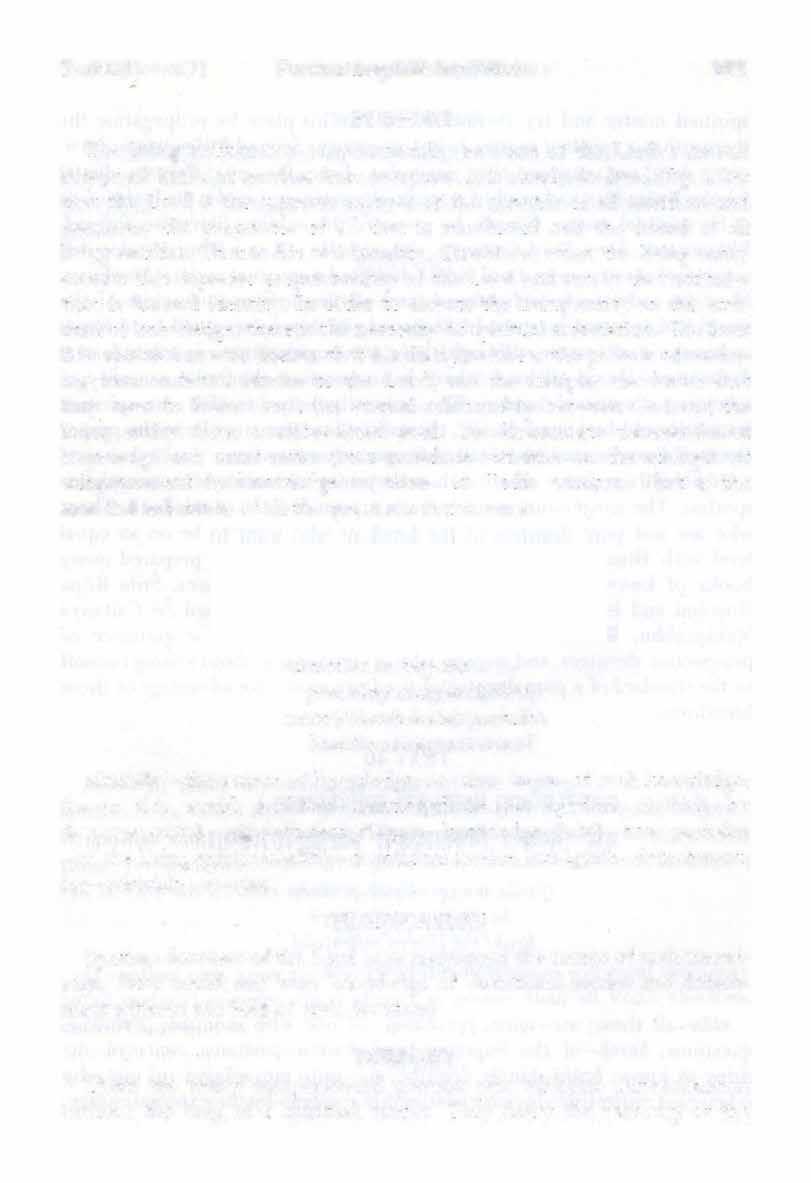
nimittiini ca tasyeha
proktiiny anagha siiribhi!t svatojiiiinam kutaftpurhsiirh
bhaktir vairiigyam eva vii
nimittiini-the source of knowledge; ca-also; tasya-of such knowledge; iha-in this world; proktiini-mentioned; an.agha-spotless; suribhift-by devotees;svataft-self-sufficient;jtiiinam-knowledge; kutaft-how;pumsiim -of the living entity;bhakti!J,-devotional service;vairiigyam-detachment; eva-certainly; ca-also.

TRANSLATION
Spotless devotees of the Lord have mentioned the source ofsuch knowledge. How could one have knowledge of devotional service and detachment without the help of such devotees?
PURPORT
There are many inexperienced persons who advocate self-realization without the help of a spiritual master. They decry the necessity of the
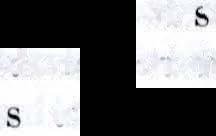
Text 39] Further Inquiries by Vidura 297
spiritual master and try themselves to take his lace by propagating the theory that a spiritual master is not necessary. Srimad-Bhiigavatam, however, does not approve this viewpoint. Even the great transcendental scholar Vyasadeva had need of a spiritual master, and under the instruction of his spiritual master, Narada, he prepared this sublime literature, Srimad-. Bhiigavatam. Even Lord Caitanya, although He is Kflll}a Himself, accepted a spiritual master; even Lord Kflll}a accepted a spiritual master, Sandipani Muni, in order to be enlightened; and all the iiciiryas and saints of the world had spiritual masters. In Bhagavad-gitii Arjuna accepted Lord Kflll}a as his spiritual master, although there was no necessity of such a formal declaration. So, in all cases, there is no question about the necessity of accepting a spiritual master. The only stipulation is that the spiritual masfer should be bona fide; i.e., the spiritual master must be in the proper �hain of disciplic succession called the paramparii system.
Suribhifl. are great scholars, but they may not always be anagha, or spotless. The anaghci-suri is one who is a pure devotee of the Lord. Those who are not pure devotees of the Lord, or who want to be on an equal level with Him, are not anagha-suri. Pure devotees have prepared many books of knowledge on the basis of authorized scriptures. Sr1la Riipa Gosvam1 and his assistants, under the instructions of Lord:,Sr1 Caitanya Mahaprabhu, have all written various literatures for the guidance of prospective devotees, and anyone who is very serious about raising himself t� the standardof a pure devotee of the Lordmust take advantage of those literatures. ·

TEXT40


��:51�{(::�fij'� 1·
\� lt� fltst�IG\��1 W\e<ql'f: 11\loll

etiin me prcchata� prasnan hare� karma-vivitsayii
briihi me)iiasya mitratviid ajayii na�ta-cak�u�a�
etan-all these; me-mine; prccha.ta[l�of one who inquires; prasniinquestions; harep-of the Supreme Lord; karma-pastimes; vivitsaya-desiring to know; briihi-kindly describe; me-unto mei ajiiasya-of one who is ignorant; mitmtvat-because offriendship; ajayii-bythe external energy; nafla-cakiUfap-those who have lost their vision.



298 Srimad-Bhigavatarn [Canto 3, Ch. 7
My dear sage, I have put all these questions before you with a view to know the pastimes of Hari, the Supreme Personality of Godhead. You are the friend of all, so kindly describe them for all those who have lost their vision.
PURPORT
Vidura put forward many varieties of questions with a view to understand the principles of transcendental loving service to the Lord. As stated in Bhagavad-gitii (Bg. 2.41), devotional service to the Lord is one, and the mind of the devotee is not diverted to the many branches of uncertainties. Vidura's purpose was to be situated in that service to the Lord, wherein one merges undivertedly. He claimed the friendship of Maitreya Muni, not because he was Maitreya's son but because Maitreya was actually the friend of all who have lost their spiritual vision due to material influence.
TEXT41 ����������

iiiFmt�st� ;J �Rot Ehcil'iN II�Z II
sarve vediis ca yajniis ca tapo diiniini ciinagha jiviibhaya-pradiinasya na kurvzran kaliim api
sarve-al.l kinds of; vedafi,-divisions of the Vedas; ca-also; yajfiii/1sacrifices; ca-also; tapafi,-penances; diiniini-charities; ca-and; anagha0 spotless one; jiva-the living entity; abhaya- immun ity from material pangs; pradanasya-of one who gives such assurance; na-not; lcurvirancan be equalized; kaliim-even partially;api-certainly.
TRANSLATION
0 spotless one, your answers to all these questions will grant immunity to all material miseries. Such charity is greater than all Vedic charities, sacrifices, penances, etc.
PURPORT
The highest perfectional work of charity is to give people in general immunity from the anxieties of material existence. This can be done only
Text41] Further Inquiries by Vidura 299
TRANSLATION
by performing activities in devotional service to the Lord. Such knowledge is incomparable. Cultivation of the knowledge in the Vedas, performance of sacrifice and distribution of munificent charities all together cannot form even a part of the immunity from the pangs of material existence that is gained from devotional service. The charity of Maitreya will not only help Vidura, but, due to its universal nature, will deliver all others in all times. Thus Maitreya is immortal.
TEXT42 ��


sri suka uviica
sa ittham iipr�ta-puriirw-kalpa� kuru-pradhiinena muni-pradhiina�
pravrddha-har�o bhagavat-kathiiyiim saiicoditas tam prahasann-iviiha
sri suka(t uviica-Sr! Sukadeva Gosvami said; sa�-he; ittham-thus; iiprfita-being questioned; puriirw-kalpa�-one who knows how to explain the supplementsof the Vedas (the Puriir-as); kuru-pradhiinena-by the chief of the Kurus; muni-pradhiina�-the chief amongst the sages; pravrddhasufficiently enriched; har,5a�-satisfac tion; bhagavat-the Personality of Godhead; kathiiyiim-in the topics of; saiicodita�-being so infused; tamunto Vidura; prahasan-with smiles; iva-like that;aha-replied.
TRANSLATION
Sri Sukadeva Gosvami said: Thus the chief of the sages, who was always enthusiastic about describing topics regarding the Personality of Godhead, began to narrate the descriptive explanation of the PuraJ.las, being so infused by Vidura. He was very much enlivened by speaking on the transcendental activities of the Lord. . ·
PURPORT
Great learned sages like Maitreya Muni are always very enthusiastic about describing the transcendental activities of the Lord. Maitreya Muni,
300 Srimad-Bhiigavatam [Canto 3, Ch. 7
�\�(tl+(lft�IUIEfm:l�
st'U�tfl+c•N��Ittf�i(t��� st(�AlEII'( 11\l�ll
�:I
being t hus invited by Vidura to peak, appeared to be smiling because he actually felt transcendental bli ss .
Thus end the Bhaktivedanta purports of the Third Canto, Seventh Chapter, of the Srimad-Bhiigavatam, entitled "Further inquiries b_y Vidura."

Text 42] Further Inquiries by Vidura 301
CHAPTER. EIGHT
Manifestation of Brahma from. GarbhodakasayT Vi$rJU
maitreya uviica sat-sevani"yo bata puru-varhso yal loka-piilo bhagavat-pradhiinab. babhuvithehiijita k""irti-miiliirh pade pade nutanayasy abh""ik§rtam



sri maitreya� uvaca-Sri Maitreya Muni said; sat-sevaniya�-worthy to serve the pure devotees; bata- oh, certainly; puru-varhsa�-the des cendants of King Puru; yat-in which; loka-piila�-the kings are; bhagavatpradhiina�-chiefly devoted to the Personality of Godhead; babhiivithayou are also born; iha-in this; ajita- the Lord, who is unconquerable; kirti-miilam-chain of transcendental activities; pade pade-step by step; natanayasi- becoming newer and newer; abhikfll)am-always.
TRANSLATION
The great sage Maitreya Murii said to Vidura: The royal dynasty of King Pnru is worthy to serve the pure devotees because all the descendants of that family are devoted to the Personality of Godhead. You are also born in that family, and it is wonderful that because of your attempt the transcendental pastimes of the Lord are becoming newer and newer at every moment.

r.
TEXT
�" "!I� ::s'CIF!l 'M � ttMlEMIJl �: ��(���EtftlkhU("Sf � � i.�"'tt�¥1�
� II
1
II
303
PURPORT
The great sage Maitreya thanked Vidura and praised him by reference to his family glories. The Puru dynasty is full of devotees of the Personality of Godhead and i therefore glorious. Because they are not attached to impersonal. Brahman or to the localized Paramatma but are directly attached to Bhagavan, the Personality of Godhead, they are therefore worthy to render service to the Lord and His pure devotees. Because Vidura was one of the descendants of that family, naturaiJy he engaged in spreading wide the ever new glories of the Lord. Maitreya felt happy to have such glorious company as Vidura. He considered the company of Vidura to be most desirable because such association can accelerate one's dormant propensities for devotional service.
so 'harh nntarh k�ulla-wkhaya du�kharh
mahadgatiiniirh viramiiya tasya pravartaye bhiigavatarh purii!larh yad iiha siik�iid bhagaviin r�ibhyatt
sa�-that; aham-I; nrriim-of the human being; k§ulla-very little; sukhaya-for happiness; du�k ham-distress; mahat-great; gatiiniimentered into; viramiiya-for mitigation; tasya-his;pravartaye-shall begin; bhiigavatam-Srimad-Bhiigavatam; puriiram- Vedic supplement; yatwhich; aha-said ; siik�iit-directly ; bhagaviin-the Personality of Godhead; !§ibhya�-unto the sages .

TRANSLATION
Let me now begin speaking on the Bhagavata Pura!la, which was directly spoken to the great sages by the Personality of Godhead for the benefit of those who are entangled in extreme miseries for the sake of very little pleasure.
PURPORT
The sage Maitreya proposed to speak on Srimad-Bhiigavatam because it is especially compiled, and traditionally comes down in the disciplic

304 Srimad-Bhagavatam [Canto 3, Ch. 8
TEXT2 ' . . . m� �orr �ij(cu:q�:(CI 'iiiAAI•d � �I
� ��tui
���:
JJm
�<:Jii
II � II
succession, for the solution of all the problems of human society . Only one who is fortunate tan have the opportunity to hearSrimad-Bhiigavatam in the association of pure devotees of the Lord . Under the spell of material energy, the living entities are entrapped in the bondage of many difficulties simply for the sake of a little bit of material happiness. They engage in fruitive activities,not knowing the implications. Under thefalse impression that the body is the self, the Living entities foolishly relate to so many false attachments. They think that they can engage with materialistic paraphernalia forever. This gross misconception of life is so strong that a person suffers continually, life after life, under the external energy of the Lord. lf one comes in contact with the book Bhiigavata as well as with the devotee Bhagavata who knows what the Bhiigavatam is, then such a fortunate man gets out of the material entanglement. Therefore Sri Maitreya Muni, out of compassion for the suffering men in the world, proposes to speak on the Srimad-Bhiigavatam first and last.
as!nam urvyam bhagavantam adyam

sankar�ar:tarh devam akur.tha-sattvam vivitsavas tattvam ata� parasya
kumara-mukhyii munayo'nvaprcchan
iisinam-seated; urvyiim-down the universe; bhagavantam-unto the Lord; iidyam-the original; sankar�ar.am-Sarikar�al]a; devam-Personality of Godhead; akur.tha-sattvam-undeterred knowledge ; vivitsava[l-being inquisitive to know; tattvam ata[l-truth like this; parasya-regarding the Supreme Personality of Godhead; kumiira-the boy saint; mukhyii[l-the chief; munayaft-: preat sages; anvaprcchan-inquired like this.
TRANSLATION
Some time ago, being inquisitive to know, Sanatkumlira, the chief of the boy saints, accompanied by other great sages, inquired exactly like you about the truths regarding Vasudeva, the Supreme, from Lord Saitkar�a�a, who is seated at the bottomofthe universe.
Text 3] Manifes tat ion of Brahma from Garbhodaka�ayi Vi�!J.U 305 ·
an«lwt�Ftl �oi Af?lffl'4����n t�l(l\*11 TEXT3 �··'4��l'i �'4�t066'*4'( I � ���11�11
PURPORT
This is in clarification of the statement that the Lord spoke directly on the Srimad-Bhiigavatam. When and unto whom t he Bhiigavatam was poken is explained herewith. Questions similar to those put forward by Vidura were asked by greal sages like Sanatkumiira, and Lord Sankar�al}a, Lhe plenary expansion of the Supreme Lord V iisudeva, answered them.
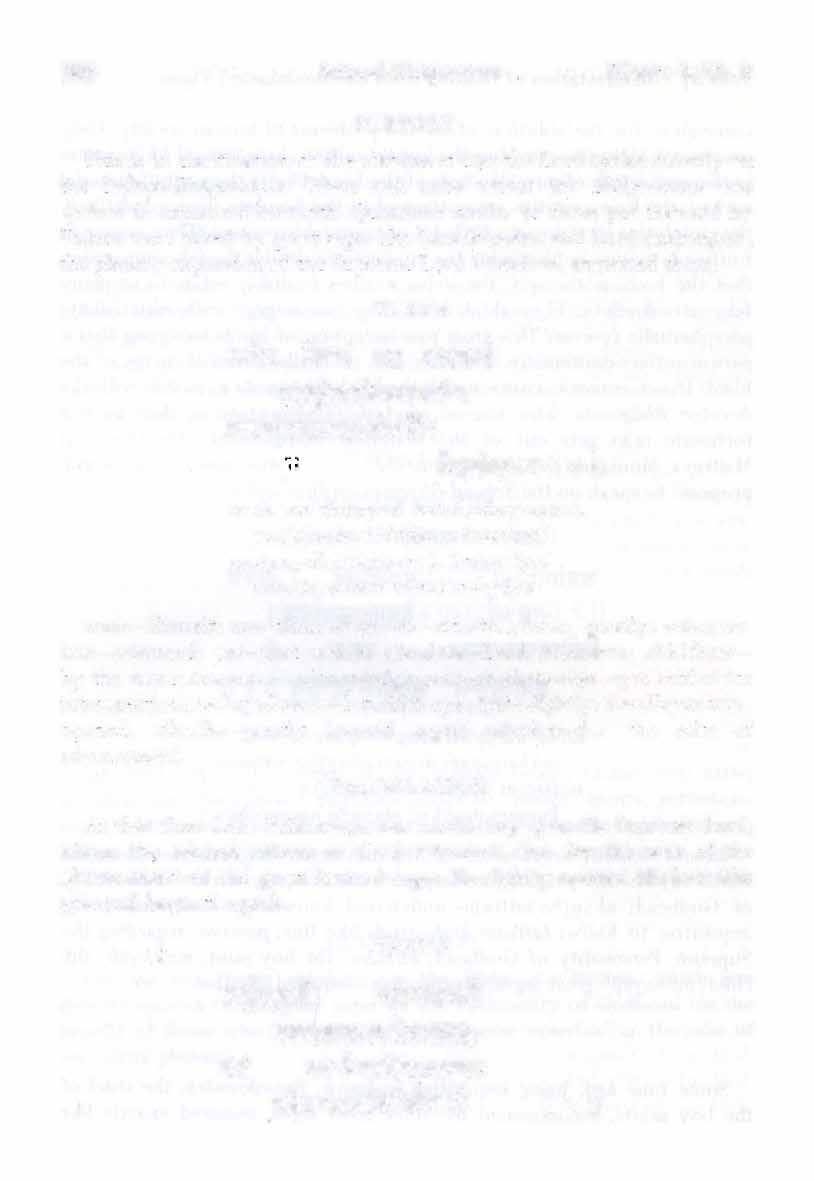
TEXT4


II \1 II
svam eva dhi§t;tyarh bahu miinayantarh yad viisudeviibhidham iimananti pratyag-dhrtiik�iimbuja-kosam "i§ad Lutmuayantarh vibudhodayiiya
svarn-Himself; eva-thus; dhi�11yarn-situated; bahu-greatly; miinayantam- esteem ed; yat- t hat which; viisude va- Lord Vasudeva; abhidhamby the name; amananti-acknowledge; pratyak-dhrta-ak§a-eyes settled for inLrospection; ambuja-kosarn...:..lotuslike eye; Zsat-slightly; unmilayantamopened; vibudha-greatly learned sages; udayiiya-for the sake of advancement.


TRANSL ATION
At that time Lord Sailkar�a�a was meditating upon His Supreme Lord, whom the learned esteem as Lord Vasudeva, but for the sake of the advancement of the great learned sages He slightly opened His lotuslike eyes and began to speak.
306 Srimad-Bhagavatam [Canto 3, Ch. 8
��q��
�l� �'�A�
((«iJt!ICh�R�''l'��
�a:��(liJI�: �:
TEXTS �:
�
11�11
svar-dhunyudiirdrai(t svajatii-kaliipair upasprsantas cara(wpadhiinam

padmarh yad arcanty ahi-riija-kanyiib.
sa-prema niinii-balibhir variirthiib

sva�-dhuni-u.da- by the water of the Ganges; iirdrai(t- being moistened; svajatii-bunch of hairs; kaliipai(t- situated on the head; upasprsanta(t- by sotouching; cara(la-upadhiinam- the shelter of His feet; padmam- thelotus shelter; yat- that which; arcanti- worships; ahi-riija- the serpent king; kanyii�-daughters; sa-prema-withgreatdevotion; niinii- variou ; balibhi�paraphernalia; vara-arthii�- being desirous of husbands.
TRANSLATION
The sages came from the highest planets down to the lower region through the water of the Ganges, and therefore the hair on their heads was wet. They touched the lotus feet of the Lord, which are worshiped with various paraphernalia by the daughters of the serpent king when they desire good husbands.
PURPORT
The Ganges water flows directly from the lotus feel of Vi�t;�u, and ils course runs from the highest planet of the universe down lo the lowe t. The sages came down from Satyaloka by taking advantage of the flowing water, a process of transportation made possible by the power of mystic yoga. If a river flows thousands and thousands of miles, a perfecl yogi can at once tran port himself from one place to another simply by dippingin it· water. The Ganges is the only celestial river which flows throughout the universe, and great sages travel all over the universe via this sacred river. The statement that their hair was wet indicates thal it was direclly moistened by the water originating from the lotus feet of Vi9t;�u (the Ganges). Whoever touches the water of the Ganges to his head surely touches the lotJJ,S feet of the Lord directly and can become free from aU effects of sinful acts. If after taking a Lath inthe Ganges or being washed of all sins, a man guards himself against committing further sinful acts, then certainly he is delivered. But if he againtakes up sinful activities,his hath in the Ganges is as good as thatof the elephant, who nicely takes his hath in a river but later spoils the whole thing by covering himself with dustonthe land.
Text 5 J Manifestation of Brahma from Garhhodakasay'i Vi��u 307
� �: 1 �mm�tu·Sf��JI';i1ftrm�'f.UII«�(ltl{_ II � II
muhur gnwnto vacasiinuriigas
khalat-pa.deniisya krtiini taj-nii�
kir"ita-siihasra-ma.rti-pravekapradyotitoddiima-phartii-saha.sram

muhu� - again and again; gnwnta[t-glorifying; vacasa-by words; a.nuraga.[t- with great affection; khalat-padena-with symmetrical rhythm; asya-of the Lord; krtani- activities; tat-jiia[t- onewhoknows the pastimes; kiri[a-helmets; sahasra- thousands ; mar-i-praveka- glowing effulgence of the valuable stones; pradyotita-emanating from; uddama-raised; phar-ahoods; sahasram-thousands.


TRANSLATION
The four Kumaras, headed by Sanat-kumara, who all knew the transcendental pastimes of the Lord, glorified the Lord in rhythmic accents with selected words full of affection and love. At that time Lord Sarikar�aJ.la, with His thousands of raised hoods, began to radiate an effulgence from the glowing stones on His head.
PURPORT
The Lord is sometimes addressed as uttamaslo1w, which means "one who is worshiped with selected words by devotees." A profusion of such selected words comes from a devotee who is fully absorbed in affection and love for the devotional service of the Lord. There are many instances in which even a small boy who was a great devotee of the Lord could offer excellent prayers in the choicest words for glorification of the pastimes of the Lord. In other words, without the development of fine affection and love, one cannot offer prayers to the Lord very suitably.
308 Srimad-Bhagavatam
l!·lur�
TEXT6
q.q(il�(l41-
[Canto 3, Ch. 8
TEXT7 � ��� �ij'(tf ij;{ I
proktarh kilaitad bhagavaltamena
nivrtti-dharmiibhiratiiya tena
sanat-kumiiriiya sa ciiha pr�ta/:t siinkhyiiyaniiyiinga dhrtavratiiya
proktam-was said; hila-certainly; etat-this; bhagavattamena-by Lord Satikaq;al)a; nivrtti-renunciation; dharma-abhiratiiya-unto one who has taken this religious vow; tena-unto him; sanat-kumiiriiya-unto SanatKumara; sa�-he; ca-al o; aha-said; pr.sta[l - when inquired of; siihkhyiiyaniiya-unto the great sage Sarikhyayana; anga-my dear Vidura; dhrtavratiiya-unto one who has taken such a vow.


TRANSLATION
Lord Sarikar�at:J.a thus spoke the purport of Srimad-Bhagavatam to the great sage Sanat-kumiira, who had already taken the vow of renunciation. Sanat-kumiira als</,' in his turn, when inquired of by Siirikhyiiyana Muni, explained Srimad-Bhagavatam as he had heard it from Sarikar�at:J.a.
PURPORT
This i the way of the paramparii system. Although Sanat-kumiira, the weU-known great saintly humiira, was in Lhe perfect stage of life, still he heard the message of Srimad-Bhiigavatam from Lord Sarikar�at:J.a. Similarly, when he was questioned by Sarikhyayana ��i, he spoke to him the same message which he heard from Lord Sar'lkar�ar;ta. In other words, unless one hears from the proper authority one cannot become a preacher_ In devotional service, therefore, two items out of the nine, namely hearing and chanting, are most important_ Without hearing nicely, one cannot preach the message of Vedic knowledge .

Text 8] Manifestation of Brahma from GarbhodakaSayi Vi��u 309
TEXTS . . � �r;r;r: ql{+i�U(�T ��Taft ��'1: I ill�TR\ ms�<;_!j(�Sf�ijl� 'Hl�Ttfl?.f �� II � II
Srimad-Bhagavatam
siinkhyiiyana[L piiramahamsya-mukhyo
vivak�amiif}O bhagavad-vibhiiti'ft
jagiida so'smad-gurave'nvitiiya pariisariiyiitha brhaspates ca
siinkhyiiyana{t-the great sage Sankhyayana;piiramaha.msya-mukhya.{tthe chief of all transcendentalists; vivak§amiirw{t-while re ci ting ; bhagavatvibhutf{t-the glories of the Lord;jagiida-it came to;sa{1-he;asmat-mine; gurave-unto my spiri tual master; anvitiiya-followed;pariisariiya-unto the sage Par a sara;atha brhaspate[L ca.-also to Brhasp ati .
TRANSLATION
The great sage Siirikhyayana was the chief amongst the transcendentalists, and when he was describing the glories of the Lord in terms of Srimad-Bhagavatam, it so happened that my spiritual master, Parasara, and Brhaspati both heard him.
proviica mahyam sa dayiilur ukto munil}pulastyena puriif}am iidyam so'harit tavaitat kathayiimi vatsa sraddhii-lave nityam anuvratiiya

proviica-said; mahyam-unto me; sa{t-he; dayiilu{t-kindhearted; ukta[L-aforementioned; muni{t-sage; pulastyena-by the sage Pulastya; puriicwm iidyam-the foremost of all the Puriirws; sa{! aham-that also I; tava-unto you; etat-this; kathayiimi-shall speak; vatsa-my dear son; sraddhii-lave-unto one who is faithful; nityam-always;anuvrataya-unto one who is a follower.





TRANSLATION
The great sage Parasara, as aforementioned, being so advised by the great sage Pulastya, spoke unto me the foremost of the PuriiJ;tas [ Bhagavatam]. I shall also describe this before you, my dear son, m terms of my hearing, because you are always my faithful follower.

310
[Canto 3, Ch. 8
TEXT9 sittTR � « �: ���'1 �Oliml'{ I «�� ·��llfittttlfit � �� M�tt¥{��(11� II � II
The great sage of the name Pulastya is the father of all demoniac descendants. Once upon a time Pariisara began a sacrifice in whic, all the demons were to be burnt to death because his father had been killed and devoured by one of them. The great sage Vasi��ha Muni arrived at the sacrifice and requested Pariisara to stop the deadly action, and Pariisara could not deny the request because of Vasi�tha's position and respect in the community of sages. Pariisara having stopped the sacrifice, Pulastya, the father of the demons, appreciated his brahminical temperament and gave the blessing that in the future he would be a great speaker on the Vedic literatures called the Puriir-as, the supplements of the Vedas. Parasara's action was appreciated by Pulastya because he forgave the demons out of his brahminical power of forgiveness. Pariisara was able to demolish all the demons in the sacrifice, but he considered: "Demons are so made that they devour living creatures, men and animals, but why on that account should I withdraw my brahminical qualification of forgiveness?" As the great speaker of the Puriirws, Pariisara first of all spoke on the Srimad-Bhiigavata Puriirza because it is the foremost of· all the Puriir-as. Maitreya Muni desired to narrate th� same Bhiigavatam which he had heard from Parasara, and Vidura was qualified to hear it because ofhis faithfulness and his following the instructions received from superiors. So Srimad-Bhiigavatam was being narrated frorrl time immemorial by the disciplic succession, even before the time of Vyasadeva. The so-called historians calculate the Puriirzas to be only a few hundred years old, but factually the Puriir-as existed from time immemorial, before all historical calculations by the mundaners and speculative philosophers. TEXT




Text 10] Manifestation of Brahma from GarbhodakaSayi Vi�!lu 311
PURPORT
10 :a�d ft� �s� �f1l��t¥flf{.sijt�.. ��I 31tl�ij(!q�,; �iii: �: �mroft Rfu:: II� oII udiiplutarh visvam idarh tadasid yannidrayiimilitadrn nyamuayat ahindra-talpe 'dhiSayiina eka� krtak§arta� sviitma-ratau ninna� uda-water; iiplutam- submerged in; vi.ivam-the three worlds; idamthis; tadii- at that time; iisit-it so remained; yat- in which; nidraya-in
slumber; arm1ita-closed; drk-eyes; nyamilayat-not completely closed; ahindr.a-the great snake Ananta; talpe- on the bed of; adhisayanafi.lying on; ekafi.-alone; krta-k�artafi.-being engaged; svatma-ratau-enjoying in His internal potency; ninnafi.-without any part of external energy.
TRANSLATION
At that time when the three worlds were submerged in water, Garbhodaka8ayi Vi!p.u was alone, lying on His bedstead the great snake Ananta, and although He appeared to be in slumber in His own internal potency, free from the action of the external energy, His eyes were not completely closed.
PURPORT
The Lord is eternaly enjoying transcendental bliss by His internal potency, whereas the external potency is suspended during the time of the dissolution of the cosmic manifestation.
TEXT ll



so 'ntal,l. saTire'rpita-bhiita-siik§mal,l. kiiliitmikiirh saktim udirayiir.wl,l.
uviisa tasmin salile pade sve yathiinalo diirurti ruddha-v'iryal,l.
safi.- the Supreme Lord; antafi.-within; sarire-in the transcendental body; arpita-kept; bhiita-material elements; siik§ma[l -subtle; kalaatmikam-the form of time; saktim-energy; udiraya!lalt-invigorating; uvasa-resided; tasmin-therein; salile-in the water; pade- in the place; sve-His own; yatha-llll much llll; analafi, -fire ; daru!li-in the fuel wood; ruddha-viryafi.-submerged strength.
TRANSLATION
Just like the strength of fire within fuel wood, the Lord remained within the water of dissolution, submerging all the living entities in their subtle bodies. He lay in the self-invigorated energy called kala.
312 Srimad-Bhigavatam (Canto 3, Ch. 8
ms;ij':ms��: �� fi�'W.nor: 1 �m \!�� ��� �1'1�1 � ��: II��II
PURPORT
After the three worlds-the upper, lower and middle planetary systemsmerged into the water of dissolution, the living entities of all the three worlds remained in their subtle bodies by dint of the energy called kala. In this dissolution, the gross bodies became unmanifest, but the subtle bodies existed, just like the water of the material creation. Thus the material energy was not completely wound up, as is the case in the full dissolution of the material world.
TEXT 12

catur yugiiniim ca sahasram apsu svapan svayodiritayii svasaktyii kiiliikhyayii "siidita-karma-tantro lokiin apltiin dadrso svadehe
catu�-four·; yugiiniim-of the millenniums; ca-also; sahasram-one thousand; apsu-in the water; svapan-dreaming in sleep; svaya-with His internal potency; udiritayii-for further development; svasaktyii-by His own energy; kiila-iikhyayii-by the name kala; iis iidita-being so engaged; karma-tantra[!-in the matter of fruitive activities; lol.an-the total living entities; apitiin-bluish; dadrse-saw it so; svadehe-in His own body.
TRANSLATION
The Lord lay down for four thousand yuga cycles in His internal potency, and by His external energy He appeared to be sleeping within the water. When the living entities were coming out for further development of their fruitive activities, actuated by the energy called kiila-sakti, He saw His transcendental body as bluish.
PURPORT
In the Vi�rzu Puriirw, kiila-sakti is mentioned as avidyii. The symptom of the influence of the kiila-sakti is that one has to work in the material world for fruitive results. The fruitive workers are described in Bhagavad-gitii as muflhas, or foolish. Such foolish living entities are very enthusiastic to


Text 12) Manifestation of Brahma from GarbhodalWilyi Vi!�u 313
� . "'tt�•nwtr :q �.:u � (CI�ICW41
'llel\iti�ISS(11ta.(t�4(t;:s(\ it�awt4\(tl�t� �11��11
I
work for some temporary benefit within perpetual bondage. One thinks himself very clever throughout his life if he is able to leave behind him a great asset of wealth for his children, and to achieve this temporary benefit he takes the risk of all sinful activities, without knowledge that such activities will keep him perpetually bound by the shackles of material bondage. Due to this polluted mentality and due to material sins, the aggregate combination of living entities appeared to be bluish. Such an impetus of activity for fruitive result is made possible by the dictation of the external energy of the Lord, kiila.
TEXT 13

tasyiirthasiik�miibhinivi�ta-dr�ter antar-gato 'rtho rajasii taniyiin gu(lena kiiliinugatena viddhal;t sii�yarhs tadiibhidyata niibhidesiit
tasya- His; artha- subj ect; siik§ma-subtle; abhinivi§ta-d!§te[l-of one whoseattention was fixed; anta[l-gata�-internal; artha[l-purpose; rajasiiby the mode of passion of material nature; taniyiin-very subtle; gurenaby the qualities; kiila-anugatena-in due course of time; viddha[l-agitated; sii§ya[1 -gener ating; tat-that; abhidyata-pierced into; niibhidesiit-from the abdomen.






TRANSLATION
The subtle subject matter of creation, on which the Lord's attention was fixed, was agitated by the material mode of passion, and thus the subtle form of creation pierced through His abdomen.
TEXT 14

314 Srimad-Bhigavatam [Canto 3, Ch. 8
-�·ifflSlif
��II��II
mfl (t;ft�l't.I gUR ifMH�I�"l fq:
i."f«tG:I��
� qt..zt'ij: � (ijar,.,. ij�ree .aistf6\1'4�'1 � II �\lll
sapadma-kosaft sahasodati�that kiilena karma-pratibodhanena sva-roci�iitat salilam visiilarh vidyotayannarka iviitma-yon*
sa{t-that; padma-lcosa{t-bud of a lotus flower; sahasa-suddenly; udati§that-appeared; kalena-by time; /wrma-fruitive activities; pratibodhanena-aw*ening; sva-roci§a-by its own effulgence; tat-that; salilam-water of devastation; visalam-vast; vidyotayan-illuminating; arka{t-the sun; iva-like; atma-yoni[!-generating from the Personality of Vi�ru.
TRANSLATION
Piercing through, this sum total form of the fruitive activity of the living entities took the shape of the bud of a lotus flower generated from the Personality of Vi��u, and by His supreme will it illuminated everything, like the sun, and dried up the vast waters of devastation.
TEXT 15


� � � �:
Sllqj ¥tlij4(
tal loka-padmam sa u eva vi�rtu/:t priiv"ivisat sarva-gurtiivabhiisam tasminsvayam veda-mayo vidhiitii
11��11
_ svayam-bhuvam yam smavadantiso 'bhut
tat-that; loka-universal; padmam-lotus flower; saJ:t-He; u-certainly; eva-factually; vi§"!tu/:t-the Lord; pravivisat-entered into; sarva-all;gu[taavabhasam-reservoir of all modes of nature; tasmin-in which; svayamin person; veda-mayaJ:t-the personality of Vedic wisdom; vidhata-con· troller of the universe; svayam-bhuvam-self-born; yam-whom; sma-in the past;vadanti-do say;saJ:t-he;abhiit-generated.

TRANSLATION
Into that universal lotus flower Lord Vi�!�U personally entered as the Supersoul, and when it was thus impregnated with all the modes of material nature, the personality of Vedic wisdom, whom we call the self-born, was generated.
Text 15] Manifestation of Brahma from Garbhodakasayi Vi��u 315
ijtf1•qv
-��� �� � � ij)�
PURPORT
This lotus flower is the universal viriita form, or the gigantic form of the Lord in the material world. It becomes amalgamated in the Personality of Godhead VigtU, in His abdomen,atthetime of dissolution,and it becomes manifest at the time of creation. This is due to Garbhodakasiiyi Vi�p.u, who enters into each of the universes. In this form is the sum total of all the fruitive activities of the living entities conditioned by material nature, and the first of them, namely Brahmii, or the controller of the universe, is generated from this lotus flower. This first-born living being, unlike all the others, has no material father, and thus he is called self-born or svayambhu. He goes to sleep with Niiriiyap.a at the time of devastation, and when there is another creation, he is born in this way. From this description we have the conception of three-the gross viriita form, the subtle Hira!tyagarbha and the material creative force, Brahma.
TEXT 16

tasyiirh sa ciimbho-ruha-kar!tikiiyiim avasthito lokam apasyamiinatt parikraman vyomni vivrtta-netras catviiri lebhe 'nudisarh mukhiini
tasyam-in that; ca-ambho-water; ruha-kan:tikayam-whorl of the lotus; avasthitaft- being situated; lokam-the world; apasyamana[t-without being able to see; parilcraman- c ircumambulating ; vyomni- in space; vivrttanetraft- while moving the eyes; catvari-four; lebhe-achieved; anudisamin terms of direction; mulchani-mouths.
TRANSLATION
Brahmii, born out of the lotus flower, could not see the world, although he was situated in the whorl. He therefore circumambulated all of space, and while moving his eyes in all directions he achieved four heads in terms of the four directions.
316 Srimad-Bhagavatam [Canto 3, Ch. 8
� � �·wtl�ii4ififl4iltll�� J\4i+iQ-w+4liH · I qf(4+4� � fclt"ii�� �� �(;{����II
TEXT 17 1\4

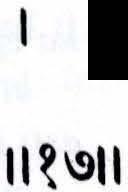

iiii1�"4¥1tttRRJSifA:�«(

�: wq J\4iij�
wm+tl'1+t4J�a:a:lfd:�Cf:
tasmad yugiinta-svasanava-ghun;wjalormi-cakrat salilad virii�ham
upasrita� kanjam u loka-tattvarh natmanam addhavidad iidi-deva�
tasmiit-from there; yugiinta-at the end of the millennium; svasaniivathe air of devastation; ghuqw-because of movement; jala-water; urmicakriit-out of the circle of waves; saliliit-from the water; virnflhamsituated on them; upiisrita[t -having the shelter of; lc aiijam-lotus flower; u-in astonishment; loka-tattvam-the mystery of creation; na-not; iitmiinam-himself; addha-perfectly ; avidat-could understand; iidi-deva�the first demigod.




TRANSLATION
Lord Brahma, situated in that lotus, could not perfectly understand the creation, the lotus or himself. At the end of the millennium the air of devastation began to move the water and the lotus in great circular waves.
PURPORT
Lord Brahma was perplexed about his creation, the lotus and the world, even though he tried to understand them for one millennium, which is beyond calculation in the solar years of human beings. No one, therefore, can know the mystery of the creation and cosmic manifestation simply by mental speculation. The human being is so limited in his capacity that without the help of the Supreme he can hardly understand the mystery of the will of the Lord in terms of creation, continuance and destruction.
Text 18) Ma,nifestation of Brahma from GarbhodakasAyi Vi�!lu 317
'ti � QJI€tffl 1"31¥4'1�4\'{! I
TEXT 18
� Q\?.1�1�� �����fg6 � m ��11�<;11
ka e�a yo 'siiv aham abja-pr�tha etat kuto viibjam ananyad apsu asti hy adhastiid iha kincanaitad adhi�thitarh yatra satii nu bhiivyam
ka�- who; e�a�-this; ya� asau aham-that I am; abja-pr§the-on top of the lotus; etat-this; kuta�-wherefrom; va- either; abjam-lotus flower; ananyat- otherwise; apsu- in the water; asti-there is; hi-certainly; adhastiit-from below; iha-in this; kifi cana- a nything; na-not; etat-this; adhi�thitam-situated; yatra-where in; satii-automatically; nu- or not; bhiivyam-must be.



TRANSLATION
Lord Brahma, in his ignorance, contemplated: Who am I that am situated on the top of this lotus? Wherefrom has it sprouted? There must be something downwards, and that from which this lotus has grown must be within the water.
PURPORT
The subject matter of the speculations of Brahmii in the beginning regarding the creation of the cosmic manifestation is still a subject matter for mental speculators. The most intelligent man is he who tries to find the cause of his personal existence and that of the whole cosmic creation and thus tries to find the ultimatecause.lfhis attempt is properlyexecuted with penances and perseverance, it is sure to be crowned with success.
TEXT 19

sa ittham udvik§ya-tad-abja-niilanaifibhir antar-jalam iivivesa
niirviig-gatas tat-khara-nala-nala-niibhirh vicinvarhs tad avindataja�
318
Srimad-Bhagavatam
[Canto 3, Ch. 8
� ��Ul� ���ii�" ;nflr �����Nt:������
sa�-he (Brahma); ittham-in this way; udvik §ya-contemplating; tatthat; abja- lotus; nala-stem; na�ibhi�-by thepipe; anta�-jalam-withinthe water; avivesa-entered into; na-not; arviik-in spite of going inside, nearby; gata� tat-going into;khara-nala-thestem of the lotus; nala-pipe; nabhim-of the navel; vicinvan-thinking much of it; tat- that; avindataunderstood; aja�-theself-born.
TRANSLATION
Lord Brahma, thus contemplating, entered the channel of the stem of the lotus. But in spite of his entering the stem and going nearer to the navel of Vi�!J.U, he could not trace out the root.
PURPORT
By dint of one's personal endeavor one may go nearer tothe Lord, but without the Lord's mercy one cannot reach the ultimate point. Such understanding of the Lord is possible only by devotional service, as confirmed in Bhagavad-gita: bhaktya mam abhijanati yaviin yas casmi tattvata�. (Bg.l8.55)
TEXT 20


NPl;qffisl{�"''�.qflt: � �41Nii ·�444\(4101:

qftRiuft�lg;(ISI� �: II� o II
tamasy apare viduratma-sargarh
vicinvato 'bhiit sumaharhs triremit£ yo deha-bhiijarh bhayam irayara�
parik�ir:wty ayur ajasya hetit£
tamasi apare-becauseofanignorantway ofsearching; vidura- 0 Vidura; atma-sargam-the cause of his creation; vicinvata�-while contemplating; abhut-it so became; sumahan-very great; trirem*-time of three dimensions; ya�- which; deha-bhiijiim-of the embodied; bhayam-fearfulness; irayara�-generating; parik�iroti-diminishing the one hundred year ; ayu�-duration of life; ajasya-of theself-born; heti�-the wheel ofeternal time.
TRANSLATION
0 Vidura, while searching in that way about his existence, Brahma reached his ultimate time, which is the eternal wheel in the hand of Vi�!J.U
Text 20] .Manifestation of Brahma from Garbhodakasl'lyi Vi�!J.U 319
and which generates fear in the mind of the living entity like the fear of death.
TEXT 21
� filrit�:
�Nwq¥41(11Q
�: � �: I
ta'tonivrtto'pratilabdha-kiima�
svadhi§(tyamiisiidyapuna�sadeva� sanairjita-sviisa-nivrtta-citt 0 nya§"idadiiriit;lha-samiidhi-yoga�
tataft - thereafter; nivrtta{t - retired from that endeavor; apratilabdhakiima{t- without achievement of the desired destination; svadhi§[Lyamown seat; iisiidya- reaching; puna[t - again ; saft - he; devaft - the demigod; sanaift-without delay; jita-sviisa-controlling the breathing; nivrtta- retired; c itta {t- inte lligence; nya§ idat-sat down; iirut;lha- in confidence; samiidhiyoga{t- in meditation on the Lord.





TRANSLATION
Thereafter, being unable to achieve the desired destination, he retired from such searching and came back again to the top of the lotus. Thus, controlling all objectives, he concentrated his mind on the Supreme Lord.
PURPORT
Samiidhi involves concentrating the mind upon the supreme cause of all, even if one is unaware of whether His actual nature is personal, impersonal or localized. Concentration of the mind on the Supreme is certainly a form of devotional service. To cease from personal sense endeavors and to concentrate on the supreme cause is a sign of self-surrender, and when self-surrender is present, that is a sure sign of devotional service. Each and every living entity needs to engage in devotional service to the Lord if he wishes to understand the ultimate cause of his existence.
TEXT 22
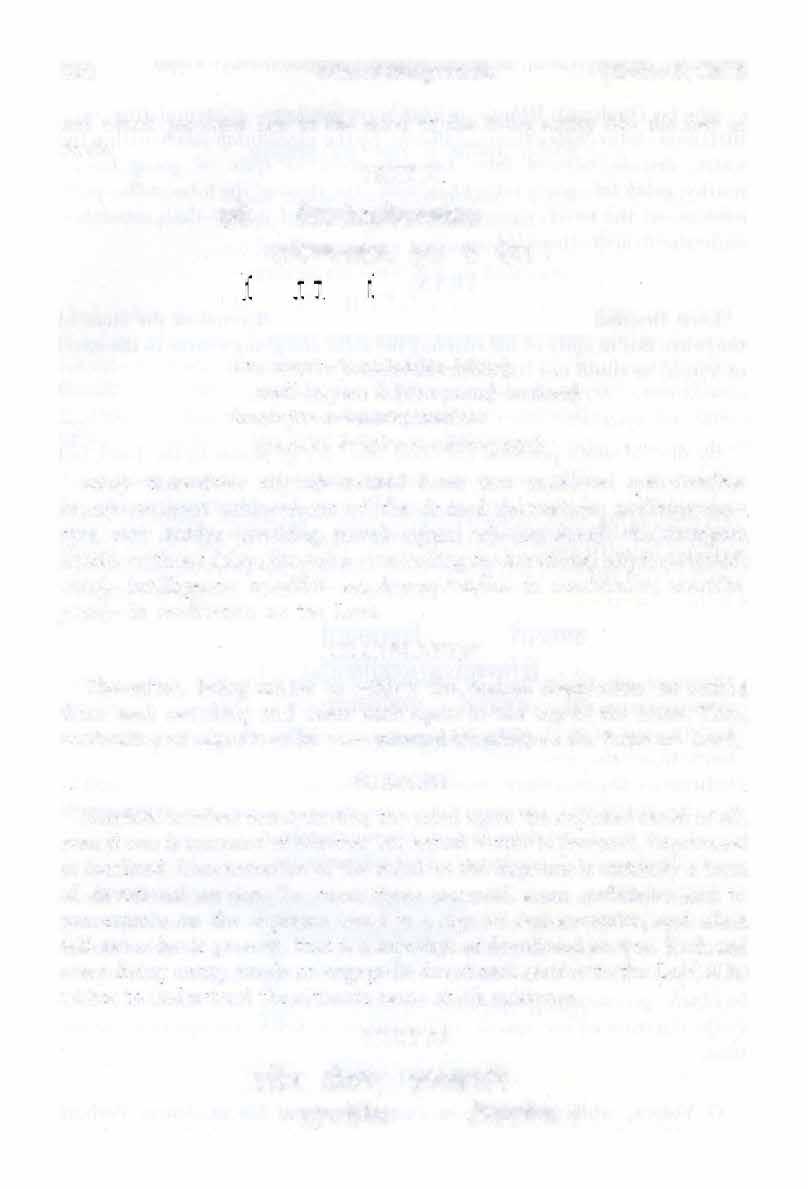
320 Srimad-Bhagavatam [Canto 3, Ch. 8
� (i)s�: �Fl'fliliSit'ijtiti\wt ��tt: I
q�(l·q�(l � � ������
kiilena so 'ja� puru§iiyu§iibhipravrtta-yogena viriit;lha-bodha�
svayarh tad antar hrdaye 'vabhiitam apasyatiipasyata yan na piirvam
kiilena-in due course of time; sa[l-he; aja[l-the self-born Brahmii; puru§a-iiyu§ii-by the duration of his age; abhipravrtta-being engaged; yogena-in meditation; virut;lha-develo ped; bodhalt-intelligence; svayamautomatically; tat anta[l-inside his; hrdaye-in the heart; avabhiitammanifested; apasyata-which he did not see before; apasyata-saw it; yatwhich; na-not; piirvam-before.


TRANSLATION
At the end of Brahma's one hundred years, when his meditation was complete, he developed the required knowledge, and as a result he could see in his heart the Supreme within himself, whom he could not see before with the greatest endeavor.
PURPORT
The Supreme Lord can be experienced only through the process of 'devotional service and not by one's personal endeavor in mental speculation. The age of Brahma is calculated in terms of divya years, which are distinct from the solar years of human beings. The divya years are calculated in Bhagavad-gitii: sahasra-yuga-paryantam ahar yad brahma[IO vidu[l (Bg. 8.17). Brahma's one day is equal to one thousand times the aggregate of the four yugas (calculated to be 4,300,000 years). On that basis, Brahmii meditated for one hundred years before he couldunderstand the supreme cause of all causes, and then he wrote the Brahmii-sarhhita, which is approved and recognized by Lord Caitanya and in which he sings, govindam adi-puru§arh tam aham bhajami. One has to wait for the mercy of the Lord before one can either·render service unto Him or know Him as He is.
TEXT 23

Text 23] Manifestation of Brahm! from GarbhodakaSiyi V��u 321
tt«:;:ijta:4�-
�
'l'IIIC.''Hn(l4tt�N�� ����
mrT).iila-gauriiyat ase�abhogaparyanka ekam puru�am sayiinam phartiitapatriiyuta-miirdha-ratnadyubhir. hata-dhviinta-yugiinta-toye
mnu1la-lotus flower; gaurayat-white all over; ase§abhoga-body; paryanke-on the bed; ekam-alone; puru§am-the Supreme Person; sayanamwas lying; pharta-atapatra-umbrella of a serpent hood; ayuta-bedecked with; murdha-head; ratna-jewels;, dyubhifi.-by the rays; hata-dhvantadarkness dissipated; yuganta-devastation; toye-in the water.
TRANSLATION
Brahma could see that on the water there was a gigantic lotuslike white bedstead, the body of Se�anaga, on which the Personality of Godhead was lying alone. The whole atmosphere was illuminated by the rays of the jewels bedecking the hood of Se�anaga, and that illumination dissipated all the darkness of those regions.
TEXT 24



prek�iim k�ipantam haritopaliidre�
sandhyiibhra-n"iver uru-rukma-miirdhnti�
ratnodadhiirau�adhi-saumanasya
vana-srajo vertu-bhujiinghripangre�
prek�am-the panorama; k�ipantam-deriding; harita- green; upalacoral; adre[t-of the hill; sandhyabhra-nive[l-of the dress of the evening cloud on the sky; uru- great; rukma-gold; murdhnaft-on the summit; ratna-jewels; udadhara-waterfalls; au�adhi-herbs; saumanasya-of the scenery; vana-sraja[t_:flower garland; veru- dress; bhuja-hands; anghripa-trees; anghreft-legs.


322 Srimad-Bhagavatam
'fiOIR'N�I9�- . cmttfEtl�9•11�ffl4 ����II �
[Canto 3, Ch. 8
� �- �f(«fq�·�: �-
ii4wt�li11���·�qleW: "' "'-
The luster of the transcendental body of the Lord mocked the beauty of the coral mountain. The coral mountain is very beautifully dressed by the evening cloud, but the yellow dress of the Lord mocked its beauty. There is gold on the summit of the mountain, but the Lord's helmet, bedecked with· jewels, mocked it. The mountain's waterfalls, herbs, etc., with a panorama of flowers, seem like garlands, but the Lord's gigantic body, and His hands and legs, decorated with jewels, pearls, tulasi leaves and flower garlands, mocked the scene on the mountain. '
PURPORT
The panoramicbeauty of nature, which strikes one with wonder,may be taken as aperverted reflectionof the transcendentalbody of the Lord. One who is therefore attracted by the beauty of the Lord is no longer attracted by the beauty of material nature, although he does not minimize its beauty. In Bhagavad-gitii (Bg. 2.59) it is described that one who is attracted by param, the Supreme, is no longer attracted by anything inferior.
TEXT 25
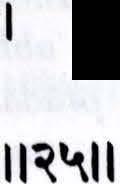

31141+tffl �: �m JtifiS14(f""'•


�M��oqi�(Oii@hlwti
iiyiimato vistarata� svamiinadehena lokatraya-sangrahel)a vicitra-divyiibharal)iimsiikiiniim krta-sriyiipiisrita-ve�a-deham
iiyiiTIUlt�-by length; vistarata{£-by breadth; svamana-by His own measurement; dehena-by the transcendental body; lokatraya-the three (upper, middle and lower) planetary systems; sangrahe'(la�by total absorption; vi citra-variegated; divya-tJ::anscendental; abhara'(la-amsukiiniim-rays of the ornaments; krta-sriyii-apiisrita_beauty created by those dresses and ornaments; ve�a-dressed;deham-transcendental body.
Text 25] Manifestation of Brahma from Garbhodakasay1 Vi��u 323
TRANSLATION
P�«
TRANSLATION
His transcendental body, unlimited in length and breadth, occupied the three planetary systems, upper, middle and lower. His body was selfilluminated by unparalleled dress and variegatedness and was properly ornamented.
PURPORT
The length and breadth of the transcendental body of the Supreme Personality of Godhead could only be measured by His own measurement because He is all-pervading throughout the complete cosmic manifestation. The beauty of material nature is due to His personal beauty, yet He is always magnificently dressed and ornamented to prove His transcendental variegatedness, which is so important in the advancement of spiritual knowledge.
TEXT 26


pumsiim svakiimiiya vivikta-miirgair abhyarcatiim ·kiima-dughiingri-padmam pradarsayantam krpayii nakhendumayiikha-bhinniinguli-ciirupatram
pumsam-of the human being; svahamaya- according to his desire; vivikta-margaifl-by the path of devotional service; abhyarcatam-worshiped; kama-dugha-mighri-padmam-the lotus feet of the Lord,which can award all desired fruits; pradarsayantam-whileshowing them; krpaya-by causeless mercy; nakha-nails ; indu -moonlike; mayukha- r ays; bhinnadivided; anguli-figures; ciirupatram-very beautiful.


TRANSLATION
The Lord showed His lotus feet by raising them. His lotus feet are the source of all awards achieved by devotional service which is free from material contamination. Such awards. are for those who worship Him in pure devotion. The splendor of the transcendental rays from His moonlike toenails and fingernails appeared like the petals of a flower_
324 Srimad-Bhigavatam [Canto 3, Ch. 8
� (qEfii+tltt
� �-
Iff{+4'*'i Efil+t�}:Ue�q'it4( I st«:titt�
I�N'3C
·
The Lord fulfills the desires of everyone just as one desires. Pure devotees are interested in achieving the transcendental service of the Lord, which is nondifferent from Him. Therefore, the Lord is the only desire of the pure devotees, and devotional service is the only spotless process for achieving His favor. Srila Riipa Gosvami says in his Bhakti-rasiimrta-sindhu that pure devotional service· is jfiiina-karmiidy-aniivrtam: pure !devotional service is without any tinge of speculative knowledge and fruitive activities (B.R.S. 1.11). Such devotional service is able to award the pure devotee the· highest result, namely direct association with the Supreme Personality of Godhead, Lord Kr�J]a. According to the Gopiila-tiipani Upan4ad, the Lord showed one of the many thousands of petals of His lotus feet. It is said: briihmapo 'siivanavaratarh me dhyiita� stuta� pariirdhiinte so'budhyata gopaveso me purastiit iivirvabhuva. After penetrating for millions of years, Lord Brahmii could understand the transcendental form of the Lord as Sri Kr�pa, in the dress of a cowherd boy, and thus he recorded his experience in the Brahma-samhitii in the famous prayer, govindam iidi-puru§arh tam aharh bhajiimi.
TEXT 27


w;.n 11�\SII
mukhena lokiirti-hara-smitena parisphurat-ku[!�ala-mar4itena so[Iiiyiteniidhara-bimba-bhiisii pratyarhayantarh sunasena subhrvii
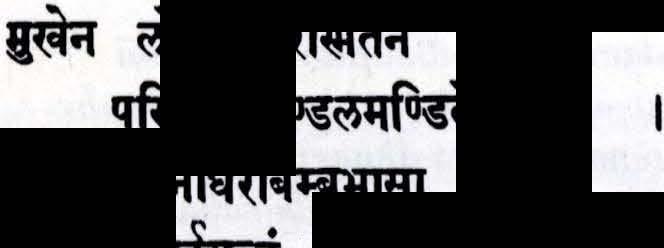
mukhena-by a gesture of the face; loka-arti-hara-vanquisher of distress of the devotees; smitena-by smiling; parisphurat-dazzling ; kup�alaearrings; map{litena-decorated with; soriiyitena-acknowledging; adharalips; bimba-reflection; bhiisii- rays; pratyarhayantam-reciprocating; sunasena-by His pleasing nose; subhrvii-and pleasing eyebrows.


TRANSLATION
He also acknowledged the service of the devotees by His beautiful smile. The reflection of His face was so pleasing because it dazzled with the rays from His earrings and the beauty of His nose and eyebrows.
Text 27] Manifestation of Brahm! from Garbhodakajiyi Vi!pu 325
PURPORT
� . �
PURPORT
Devotional service to the Lord is very much obliging to Him. There are many transcendentalists in different fields of spiritual activities, but devotional service to the Lord is unique. Devotees do not ask anything from the Lord in exchange for their service. Even the most desirable liberation is refused by devotees although offered by the Lord. Thus the Lord becomes a kind of debtor to the devotees, and He can only try to repay the devotees' service with His ever-enchanting smile. The devotees are ever satisfied by the smiling face of the Lord, and they become enlivened. And by seeing the devotees so enlivened, the Lord Himself is further satisfied. So there is continuous transcendental competition between the Lord and His devotees by such reciprocation of service and acknowledgement.
kadamba-kiiijalka-pisa;tga-viisasii w-alarikrtarhmekhalayiinitambe hiire[taciinanta-dhanenavatsa srivatsa-vakfia�-sthala-vallabhena
kadamba-kinjalka-saffron dust of the kadamba flower; pisahga-dress of the color; vasasa- by clothing; su-alahkrtam-well decorated; mekhalaya -by the belt; nitambe-on the waist; hare[ta-by the garland; ca-also; ananta-highly ; dhanena-valuable;vatsa-my dear Vidura; srivatsa-of the transcendentalstone; vah.sa�-sthala-on thechest; vallabhena-verypleasing.




TRANSLATION
0 my dear Vidura, the Lord's waist was covered with yellow colored cloth resembling the saffron dust of the kadamba flower, and it was encircled by a well·decorated belt. His chest was decorated with the highly valuable srivatsa jewel and a necklace of unlimited value.
TEXT29



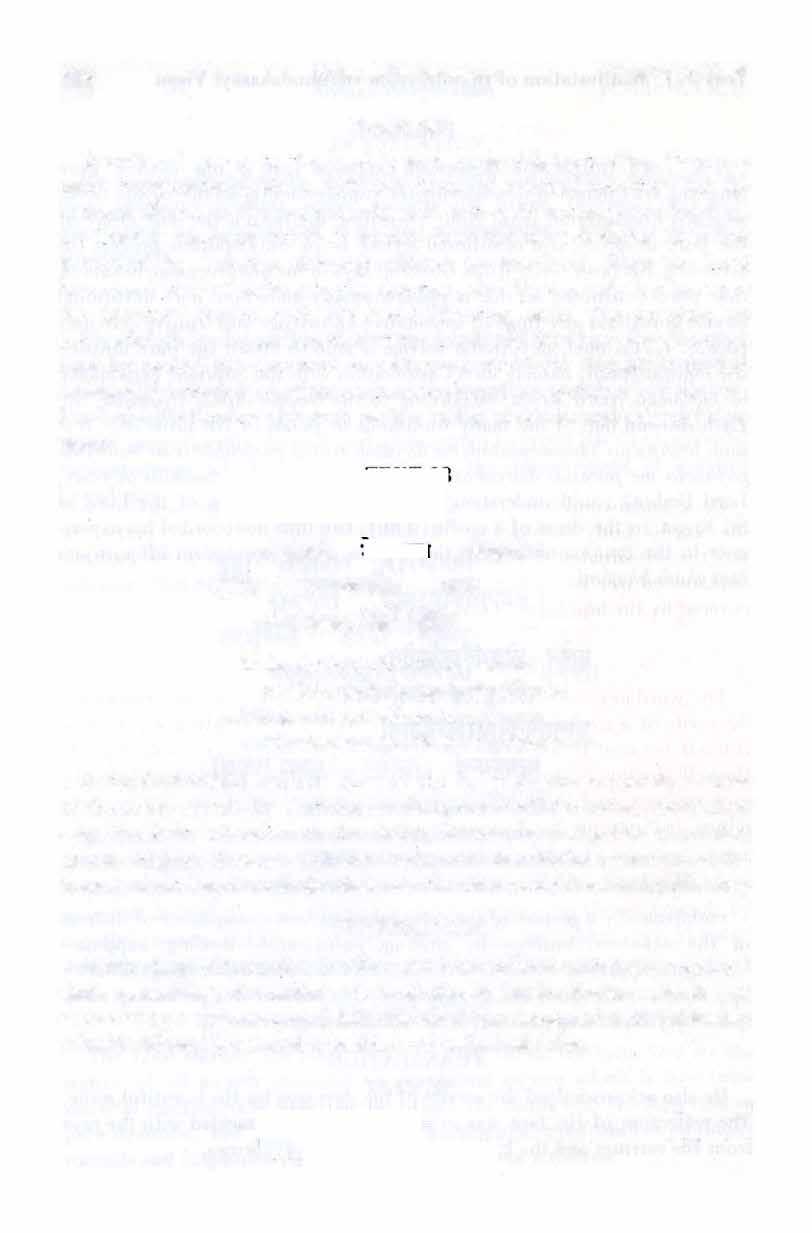
326 Srimad-Bhagavatam [Canto 3, Ch. 8
I • • ((t�ti� it(ctW'II �I mar� tffil ��Hijct�:��ct(!J�WI
TEXT28
parardhya-keyii.ra-ma(tipravekaparyastadordaru;la-sahasra-sakham avyakta-mularit bhuvaniinghripendram

ahTndra-bhogair-adhivi:ta-valSam
pariirdhya- very high; keyU:ra-ornaments; maripraveka-highly valuable jewels; paryasta t a-disseminating; urdarfla-very high; sahasra-siikhamwith thousands of branches; avyakta-niiilam- self -situated; bhuvana-universal; ahghripa-trees; indram-the Lord; ahindra- A nantadeva; bhogai[Lby hoods; adhivita-surrounded; valSam-branches.


TRANSLATION
As a sandalwood tree is decorated with fragrant flowers and branches, the Lord's body was decorated with valuable _jewels and pearls. He was the self-situated tree, the Lord of all others in the universe. And as a sandalwood tree is covered with many snakes, so the Lord's body was also covered by the hoods of Ananta.
PURPORT
The word avyakta-mulam is significant here. Generally, no one can see the roots of a tree. But as far as the Lord is concerned, He is the root of Himself because there is no other separate cause of His standing but He Himself. In the Vedas it is said that the Lord is sviisrayiisraya; He is His own support, and there is no other support for Him. Therefore, avyakt a means the Supreme Lord Himself and no one else .


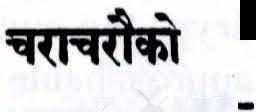
TEXT

Text 30] Manifestation of Brahma from Garbhodakasayi Vi��u 327
30 �u�a� ¥ttl�·1 e�Jtq•l4t( 1 Mae•wfbo4sttII� o II
bhagavan mahTdhram
salilopagu�ham
caracarauko
ah"indra-bandhum
kir"ita-sahasra-hirar_Lya-spigam avirbhavat-kaustubha-ratna-garbham
cara-moving animals; acara- nonmoving trees; olca[l-the place of situation; bha$"avan-the Personality of Godhead; mahidram-the mountain; ahindra-Sri Anantadeva; bandhum-friend; salila-water; upagii{lhamsubmerged; kirita- helmets; sahasra-thousands; hira[lya-gold; sriftgampeaks; avirbhavat- manifested; kaustubha-the Kaustubha jewel; ratnagarbham-ocean.

TRANSLATION
Like a great mountain, the Lord stands as �he abode for all moving and nonmoving living entities. He is the friend of the snakes because Lord Ananta is His friend. As a mountain has thousands of golden peaks, so the Lord was seen with the thousandsofgoldenhelmetedhoods ofAnantanaga; and as a mountain is sometimes filled with jewels, so also His transcendental body was fully decorated with valuable jewels. As a mountain is sometimes submerged in the ocean water, so the Lord is s9metimes submerged in the water of devastation.
TEXT

II��II
niv"itam iimniiya-madhu-vrata-sriyii sva-kirtimayyii vana-miilayii harim suryendu-viiyv-agny-agamarh tridhiimabh* parikramat-priidhanikair duriisadam

nivitam-so being enclosed; amnaya-Vedic wisdom; madhu-vrata-sriyasweet sound in beauty; sva-kirtimayya-by His own glories; vana-malayaflower garland; harim-unto the Lord; siirya-the sun; indu-the moon; vayu-the air; agni-the fire; agamam-unapproachable; tridhamabhi[l-by the three planetary systems; arikramat-circumambulating; pradhanikai[lfor fighting; durasadam-very difficult to reach.
TRANSLATION
Lord Brahma, thus looking upon the Lord in the shape of a mountain, concluded that He was Hari, the Personality of Godhead. He saw that the garland,of flowers on His chest glorified Him with Vedic wisdom in sweet
328 Srimad-Bhaga.vatam [Canto 3, Ch. 8
�I
31 f.IGJ16¥41tli44¥4!Jf4ij� ((tEt\Mqun GJ-ttil��·
��qjv�li;:q4jq m•qrlf: qRJti¥4d1Nf.t4i�I6G>t(
Text 33] Manifestation of Brahmli from Garbhodakasayi

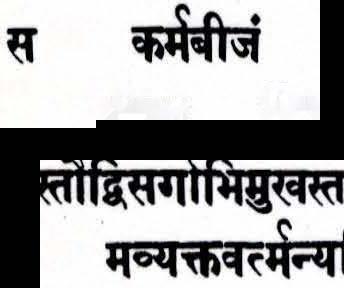

songs and looked very beautiful. He was protected by the Sudarsana wheel for fighting, and even the sun, moon, air, fire, etc., could not have access to Him.
TEXT 32 ijastifllttU�
tarhy-eva tan-niibhi-saral;l-sarojam iitmiinam ambhal;l svasanarit viyac ca dadarsadevo jagato vidhiitii niital;l-pararitloka-visarga-dr�ti{t

tarhi-therefqre; e va-certainly; tat-that; ruibhi-navel; sara[t-lake;sarajam-lotus flower; atmanam-Brahma; ambha[l-the devastating water; svasanam-the drying air; viyat-the sky; ca-also; dadarsa-looked upon; deva{l-demigod; jagata[l-of the universe; vidhiita-maker ofthedestination; nata[l-param-the Supreme; loha-visarga-creation of the cosmic manifestation; drflti[l-glance .

TRANSLATION
When Lord Brahma, the maker of the universal destination, thus saw the Lord, the Lord simultaneously glanced over creation. The Lord saw the lake in His navel, and the lotus flower, as well as the devastating water, the drying air and the sky. All became , visible to the Lord.
TEXT 33 : 500: � qll
sa karma-bijarit rajasoparaktafi. prajiil;l sisrk�ann iyad eva dr�tvii astaud visargiibhimukhas tamTf)yam avyakta-vartmanj-abhivesitii.t mii.

Vi�!J.U 329
��1 �� � � ��
������
�lwt+t+¥1:
;m: tR JtitiNe•ltf!:
salt-he ( Brahm a ); harma-bijam-seed of worldly activities; rajasa-uparaktaft-initialed by the mode of passion;prajaft-living entities; sisrkflanwilling to create progeny; iyat- all the five causes of creation; eva- thus; dr.stv('i-looking on; astaut- prayed for; visarga-creation after the creation by the Lord; abhimukhaft-towards;tam-that;ipyam-worshipable; avyakta- transcendental; vartmani-on the path of;abhivesita- fixed;atma- mind.
TRANSLATION
Lord Brahmii, thus being surcharged with the mode of passion, became inclined to create, and after seeing the five causes of creation indicated by the Personality of Godhead, he began to offer his respectful prayers on the path of the creative mentality.
PURPORT
Even if one is in the material mode of passion to createsomething in the world, he has to take shelter of the Supreme for the necessary energy. That is the path of the successful termination of any attempt.
Thus end the Bhaktivedanta purports of the Third Canto, Eighth Chapter, of the Srimad-Bhagavatam, entitled "Manifestation of Brahma from Garbhodakasayi V4rw."

330 Srimad-Bhagavatarn [Canto 3, Ch. 8








 Plate 1 Vidura placed his bow at the door and quit his brother's palace for good. (p. 15)
Plate 1 Vidura placed his bow at the door and quit his brother's palace for good. (p. 15)



 Plate 4 Kr�Q.a is known as Ranchor, or one who fled from fighting. (p. 1 00)
Plate 4 Kr�Q.a is known as Ranchor, or one who fled from fighting. (p. 1 00)
 Plate 5
Plate 5
 Plate 6 Seated at the mouth of the celestial Ganges River, Vidura inquired from the great learned sage Maitreya. (p. 159)
Plate 6 Seated at the mouth of the celestial Ganges River, Vidura inquired from the great learned sage Maitreya. (p. 159)










































































































































































































































































































































































































































































































































































































